featured
Bill To Ban Hemp Products With THC Is Filed In Texas House, As Governor Continues To Call For Regulations Instead
Published
22 hours agoon
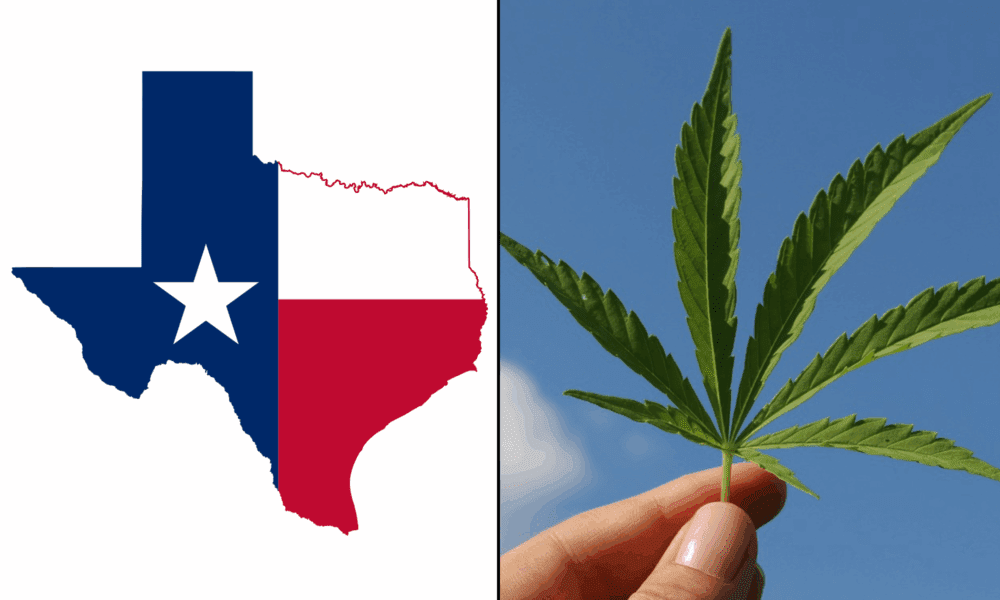
As Texas’s special legislative session enters its second week, a Republican House member on Monday filed companion legislation to a Senate bill that would ban consumable hemp products with any detectable level of THC.
Meanwhile, Gov. Greg Abbott (R), who vetoed an earlier version of the ban during the state’s regular legislative session, is continuing to call for a compromise that would allow small amounts of THC in hemp products.
“We want to make sure adults still have the liberty to be able to have access to non-intoxicating hemp-based products,” Abbott said in an interview with The Texan last week.
He said, however, that “as long as
-

(10 Pack) Top Rolling Papers – 70mm Single Wide Cigarette Papers – Package of 10
$16.56 Buy Now -
Sale!

(10) Bob Marley King Rolling Paper 110mm Cigarette Smoking Paper
$12.99Original price was: $12.99.$9.90Current price is: $9.90. Buy Now -

(100 Rolls) 2 1/4 x 150 ft White Adding Machine Tape Paper Rolls Premium One Ply Register/Adding Machine/Calculator Paper Rolls Printing Calculator 10 Key
$59.99 Buy Now -

(2 Count) Grove Bag Terploc 1/2 Lb (8 Ounce) Window Pouch – Curing Cultivation and Storage Bags 12″ x 15″
$15.44 Buy Now -

(25 Pack BUSHMAKER Low Stress Plant Training Clip
$19.99 Buy Now -
Sale!

(50 Rolls) 3″ x 165′ Kitchen Register Rolls,1 Ply Bond Printer Receipt Paper POS Cash Register Paper (Non –Thermal Kitchen Printer Paper) for TMU200 SRP275 from Pony Packaging
$62.99Original price was: $62.99.$43.49Current price is: $43.49. Buy Now -
Sale!

(55 GSM Solid Tube Core) DropShip 3 1 8 x 230 thermal paper (50 Rolls – 1 Case) bpa free – thermal printer paper ct-s801 – BuyRegisterRolls
$59.99Original price was: $59.99.$56.99Current price is: $56.99. Buy Now -
Sale!

(6 Rolls) 2 1/4 x 150 ft, White, adding machine tape Paper Rolls, Premium One Ply Cash Register/Adding Machine/Calculator Roll Printing Calculator 10 key adding machine tape
$84.99Original price was: $84.99.$16.99Current price is: $16.99. Buy Now -
Sale!
![[Pack of 100 Rolls] Adding Machine Tape/Calculator Paper Rolls 2-1/4 x 150 Feet 1 Ply White Bond Paper for El-1750 1801 P23 Printing Calculator 10 Key](https://mscannabiz.com/wp-content/uploads/2025/05/1747038639_51mDWymaDuL._AC_-300x300.jpg)
[Pack of 100 Rolls] Adding Machine Tape/Calculator Paper Rolls 2-1/4 x 150 Feet 1 Ply White Bond Paper for El-1750 1801 P23 Printing Calculator 10 Key
$84.99Original price was: $84.99.$59.99Current price is: $59.99. Buy Now -
Sale!

【More Larger Size】A-LUGEI【69Pcs】【5 Size】 Tool Box Organizer Tray Divider Set, 【Black】 Desk Drawer Organizer, Garage Organization and Storage Toolbox for Rolling Tool Chest Cart Cabinet WorkBench Parts
$35.99Original price was: $35.99.$27.99Current price is: $27.99. Buy Now -
Sale!

#RP221 24pk Job Orange Slow-Burning 1 1/4 Rolling gcytmOh Papers 2wdZJ Display hatyrjknmbcdf kow smoking smoke tobacco fire pipe cigar 24pk Job Orange HOxHXMFpG Slow-Burning 1 1/4 Rolling Papers
$28.99Original price was: $28.99.$20.36Current price is: $20.36. Buy Now -
Sale!

1 1/2 Rolling Papers 6 BOOKLETS
$16.99Original price was: $16.99.$15.53Current price is: $15.53. Buy Now -

1 1/4 Size Rolling Paper, 1.25 6 Colors Paper with 1 Filter, 78x44mm 7 Pack Premium Cute Rolling Paper, Ultra-thin & Slow Burn Tobacco Cigarette Tools
$6.30 Buy Now -

1 1/4 Size Rolling Paper, 10 Pack Mixed Flavor Rolling Paper, Different Fruit Flavor Cigarette Paper, 500pcs Fruit Attraction Fragrance Paper
$9.99 Buy Now -
Sale!

1 box – OCB Single Premium No1 rolling paper regular size 70mm – 2500 papers
$19.75Original price was: $19.75.$16.04Current price is: $16.04. Buy Now -

1 box – OCB Ultimate size 1 1/4 (77mm) paper – 1250 papers
$24.02 Buy Now -
Sale!

1 Box – OCB Virgin Slim Unbleached Rolling Paper King Size + Filter Tips
$31.52Original price was: $31.52.$30.00Current price is: $30.00. Buy Now -
Sale!
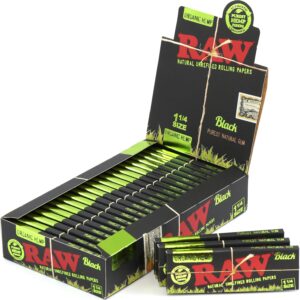
1 box – RAW Black Organic size 1 1/4 (78mm) rolling paper – 1200 papers
$51.99Original price was: $51.99.$18.34Current price is: $18.34. Buy Now -

1 box – Smoking Thinnest King size rolling paper 24 booklets + tips
$36.31 Buy Now -

1 Box Elements Connoisseur Size 1 1/4 Ultra Thin Rolling Papers+Tips
$31.03 Buy Now -
Sale!

1 box OCB Perforated FILTER TIPS 25 booklets x 50 Paper Filters
$18.00Original price was: $18.00.$14.31Current price is: $14.31. Buy Now -

1 Ounce Bags,20 Pack Lock & Seal Storage & Curing Bags Heat Sealable upright bags 5.9″ x 9.8″ x 3.15″ Inch (28g)
$16.97 Buy Now -

1 Ounce Bags,50 Pack Lock & Seal Storage & Curing Bags Heat Sealable upright terp bags 5.9″ x 9.8″ x 3.15″ Inch (28g)
$26.97 Buy Now -
Sale!

1 Ounce bags,Lock & Seal Storage & Curing terp Bags,Reusable Heat Sealable Bags for Food Storage (1 oz/28g) Sized at 6″ x 9.8″ x 3.15″ Inches (20)
$15.99Original price was: $15.99.$15.95Current price is: $15.95. Buy Now -
Sale!

1 OZ Storage Terp Bag 58%-62% RH 2-Way Humidity Control Bags for for Curing & Storage Resealable Humidity Bags Lock & Seal Bag, 20 PCS,6″ x 9.8″ x 3.15″
$17.88Original price was: $17.88.$8.99Current price is: $8.99. Buy Now -
Sale!

1 Pack Good Times 1 ¼ Size Rolling Paper + Beamer Smoke Sticker
$16.45Original price was: $16.45.$2.99Current price is: $2.99. Buy Now -

1 Pound Storage Terp Bags, 5 Pack Lock & Seal Heat Sealable Humidity Curing Bags, 16 Ounce, Black
$25.48 Buy Now -

1-1/4 Rolling Papers Pre Rolled Cones | 152 Pack | Natural Pre Rolled Rolling Paper with Tips | Easy to Use and Convenient
$15.99 Buy Now -

1-1/4 Rolling Papers Pre Rolled Cones | 72 Pack | Natural Pre Rolled Rolling Paper with Tips | Easy to Use and Convenient
$7.59 Buy Now -
Sale!

1.25 JOB Rolling Papers, 5 Pack Bundle, 120 Paper Leaves Total
$54.00Original price was: $54.00.$12.06Current price is: $12.06. Buy Now -

1.5 JOB Rolling Papers, 5 Pack Bundle, 120 Paper Leaves Total
$12.67 Buy Now -

1.5”x 1.5”, (Pack of 100) 2 mil Thick Clear Plastic Reclosable Zip Poly Bags with Resealable Lock Seal Zipper for Photo, Jewelry, Bakery, Treats, Travel, Storage, Packaging & Shipping…
$3.99 Buy Now -
Sale!

1/2 LB Curing & Storage Bags Double-Tracked Zip Closure Heat Sealable, Reusable Humidity Control Bags (13.8 x 10.4 in, 5 Pack)
$14.99Original price was: $14.99.$12.88Current price is: $12.88. Buy Now -

10 booklets – Zig Zag Red Regular Multipack Rolling Papers – total 500 papers
$8.99 Buy Now -

10 booklets OCB VIRGIN Regular size UNBLEACHED Rolling paper – total 500 papers
$5.97 Buy Now -

10 booklets rolling paper OCB PREMIUM SLIM King Size – 320 papers
$16.70 Buy Now -

10 Grams/Pack – Green Weed Leaf Glitter – Festival Rave Beauty Makeup Face Body Nail Art Decoration- Pot Weed & Marijuana Leaves
$7.90 Buy Now -
Sale!

10 Pcs 1/2 LB Lock & Seal Storage & Curing Bags 8oz (10)
$19.99Original price was: $19.99.$16.99Current price is: $16.99. Buy Now -
Sale!

10 Rolls Mini Printer Sticker Paper Refill for Most Mini Thermal Printers, 57 x 25mm for T02/M02 (need remove paper holder)Thermal Sticker Paper Rolls for Study Notes Photos Journals Memo Lists
$12.99Original price was: $12.99.$11.95Current price is: $11.95. Buy Now -
Sale!

10 Rolls Thermal Sticker Paper for Most Mini Thermal Printers, 57mm x 25mm 5 Rolls White 5 Rolls Colorful Mini Printer Sticker Paper Rolls for Study Notes Photos Journals Memo Lists
$13.99Original price was: $13.99.$12.87Current price is: $12.87. Buy Now -

10 x Expandable Stand-Up & Fill REUSABLE Storage Bags for Food Designed & Mfg in US by Smelly Proof, NO PEVA, BPA FREE, Reusable Snack Bags, Dishwasher-Safe, Clear 3 mils STAND & FILL 6″ x 4″ – 10pk
$11.99 Buy Now -

100 Pack 1 1/4 Size Cones – Pre Rolling Rolled Preroll Pre Rolls Papers Cone – Cones with Filter Tips and Packing Tubes Included, Pink
$13.99 Buy Now -
Sale!

100 Pack 1 1/4 Size Cones Rolling Papers Pre Rolled Paper Cones – Preroll Pre Rolls Paper with Filter Tips and Packing Tubes Included
$13.99Original price was: $13.99.$12.59Current price is: $12.59. Buy Now -

100 Pack 4 x 4.9 Inches Storage Bags, 3.5g Resealable Leakproof Smell-Proof Bags with Clear Window for Home, Office, and Travel, Great for Snacks, Candy, Jewelry, and Seeds
$15.99 Buy Now -
Sale!

100 Pack 7.5″x11.5″ Mylar Clear/Black Nylon Resealable Stand Up Bags Heat Seal Zipper Lock Reusable Storage Pouches for Zip Food Storage Lock Packaging with Tear Notches
$39.99Original price was: $39.99.$31.99Current price is: $31.99. Buy Now -
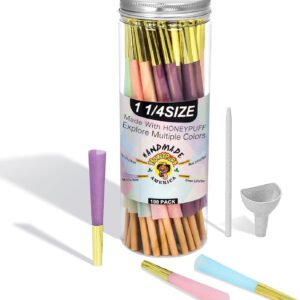
100 PACK Colorful Pre Rolled Cones With Golden Tips, 1 ¼ Size Rainbow Preroll Cones Rolling Papers(Include Loader and Packing Sticks)
$10.99 Buy Now -
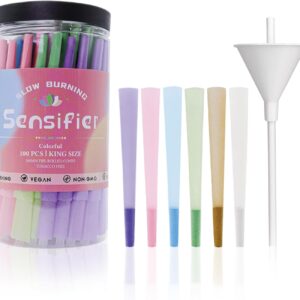
100 PACK Colorful Pre Rolled Cones| King Size Rolling Paper Cone with Loader and Packing Sticks
$9.99 Buy Now -

100 Pack Matte Black Stand Up Bags – 5 Mil 6.3×8.6 Inches Resealable Smell Proof Food Storage Zipper Pouch Bag, Large Heat Sealable Plastic Foil Packaging Pouches, Sample Pouch
$24.87 Buy Now -

100 Pack Money Design Resealable Paper Food 3.5 Storage Snack Bags 3×6 in
$24.99 Buy Now -

100 Pack Mylar Bag 3.5 Gram,4.7 Mil Thickness Smell Proof Bag,Stand-up Packaging Pouch,Resealable Ziplock Foil Food Storage Baggies Safe Material,4×5 Inches,Matte Black
$18.98 Buy Now -

100 Pack Mylar Bag,7 Gram Stand-up Packaging Pouch, 4.72 Mil Thickness Resealable Zip Lock Foil Food Storage Baggies Safe Material,4X6 Inches,Matte Black
$20.98 Buy Now -

100 Pack Mylar Bags for Zip Reusable Small Aluminum Foil Lock Package Bag Candy DIY Chocolate Coffee Nut Food Long Term Storage Zipper Lock Packaging Bag with Tear Notch (Black, 2.3×3.1 inch)
$7.99 Buy Now -

100 Pack Mylar Smell Proof Bags, Resealable Black Stand Up Pouch Bags Foil Sealable Bags for Packaging, 4.72×7.87 Inch
$15.98 Buy Now -

100 Pack Resealable Holographic Bags for Small Business, Iridescent Mylar Bags with Clear Front Smell Proof Foil Packing Pouches for Multipurpose Storage (6.3 X 9.5 inches)
$15.99 Buy Now -

100 Pack Resealable Packaging Bags for Small Business Double-Sided Color Smell Proof Bags for Food Storage Flat Bags (Black, 2.7″ x 3.8″)
$7.99 Buy Now -
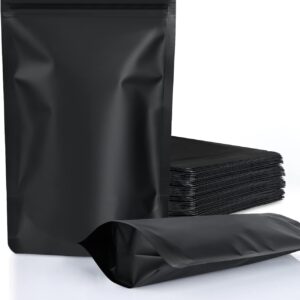
100 Pack Resealable Stand Up Bags,Smell Proof Pouch Sealable Foil Pouch Bags for Packaging (Black, 3.5″ x 5.1″)
$9.99 Buy Now -
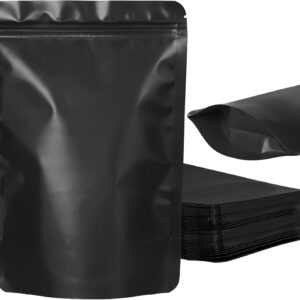
100 Pack Resealable Stand Up Bags,Smell Proof Pouch Sealable Foil Pouch Bags for Packaging(Black,3.5″ x 5.1″)
$9.99 Buy Now -

100 Pack Reusable Aluminum Foil Mylar Bags – 5.5 x 7.8 Inch, Resealable Zip Lock, Clear, Waterproof, Long Term Food Storage
$13.15 Buy Now -
Sale!

100 Pack Smell Proof Bags 3 x 4 Inch Resealable Mylar Bags Foil Pouch Bag Flat Bag Matte Black
$9.99Original price was: $9.99.$7.89Current price is: $7.89. Buy Now -

100 Pack Smell Proof Bags, Resealable Bags with Matte Window, Foil Pouch Stand Up Sealable Bags for Packaging(Gold,4″ x 6″)
$13.99 Buy Now -

100 Pack Smell Proof Bags, Resealable Mylar Bags with Matte Window, Foil Pouch Stand-up Bags for Food Self Sealing Storage, Scratch Resistant Hand Storage Bags.(Black, 3.9×5.9 Inch)
$9.98 Buy Now -

100 Pack Stand Up Pouch Bags, Zip Lock Resealable Mylar Bags for Food Storage, Heat Sealable Foil Packaging Baggies 4 x 5 Inches Cosmic Black
$17.99 Buy Now -

100 Pcs 5×7 inch Smell Proof Bags Resealable Mylar Bags Zip lock Foil Pouch Bags Clear Window Matte Black Food Safe Storage Packing
$11.99 Buy Now -
Sale!

100 Pcs Holographic Resealable Packaging Bags for Small Business Supplies, Cute Small Color Smell Proof Foil Pouch Plastic Baggies for Lip Gloss Soap Party Food Storage (4×6 inch)
$9.99Original price was: $9.99.$9.29Current price is: $9.29. Buy Now -
Sale!

100 Pcs Small Resealable Seed Envelopes, Mini Zip Lock Kraft Bags with Window, 3.5″x5.5″ Coffee Sample Bags Resealable Ziplock Bags, Small Business for Samples Bags, Food Storage Bags
$9.99Original price was: $9.99.$8.99Current price is: $8.99. Buy Now -

100 PCS Smell Proof Holographic Packaging Bags, Resealable Foil Freshies for Food Storage & Small Business – Sample Pouch for Eyelash, Jewelry, Valentines Day Gifts
$6.99 Buy Now -

100 Pcs With Design Patterns Kraft paper Packaging Bags3.94×4.92In,Clear Window Resealable Bags Foil Pouch Bags for Food Storage and Tea,Coffee Bean,Snack Candy for Small Business (JKH8004)
$22.85 Buy Now -
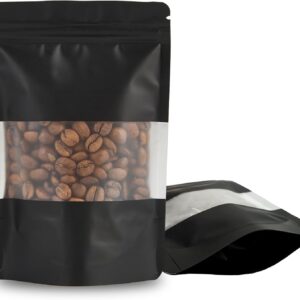
100 Pieces Resealable Mylar Bags, Stand Up Smell Proof Bags with Matte Window, Zipper Lock Foil Pouch Packaging (Black, 3.5 X 5.1 Inch)
$9.99 Buy Now -
Sale!

100-Pack Mylar Bags Resealable Sealable Holographic Zip Bag Jewelry Candy Sample Product Small Bussiness Packaging Supplies 3×3 Inch,Black
$5.99Original price was: $5.99.$5.39Current price is: $5.39. Buy Now -
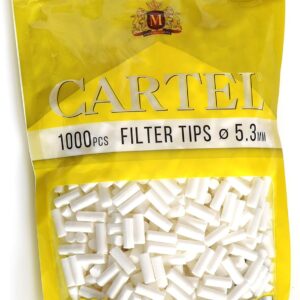
1000 filters – Cartel Extra Slim 5.3mm Filter Tips + Extra Rolling Paper
$17.72 Buy Now -

101 Best Budtending Practices: The Handbook That Will Guide The Cannabis Industry Into A New Age
$19.99 Buy Now -

10PCS 1 Pound Storage Terp Bags 58%-62% RH 2-Way Humidity Control Bags for Curing & Storage Resealable Humidity Bags (16 Ounce, 1lb)
$58.99 Buy Now -

10PCS 1/2 LB Storage Terp Bags 8oz 58%-62% 2-Way Humidity Control Packs, Reusable Heat Sealable Bags for Seal Storage & Curing & Lock
$13.98 Buy Now -

10PCS Reusable Glass Filter Tips for Pre Rolled Rolling Paper Cones, Slim Cigarettes, Glass Rolling Tip Mouthpieces (Grey)
$11.98 Buy Now -

10pk 4-MIL Reusable Food Storage Bags, Reusable Sandwich Bags, Reusable Freezer Bags, BPA Free, No PEVA, Non-Silicone Bags for Food Storage, Reusable Snack Bags, 10 Black Smelly Proof Bags 6.5″ x 7.5″
$12.99 Buy Now -

10pk 4-MIL Thick HEAVY DUTY Smelly Proof Reusable Bags Black, USA-Made, Reusable Food Storage Bags, Reusable Sandwich Bags, Reusable Freezer Bags, Non-Silicone Bags, 10 x Reusable Ziplock Bag, 6″ x 4″
$11.99 Buy Now -

10pk LARGE Black Reusable Bags, Washable Ziplock Bags, US-Made, BPA & PEVA FREE, Non-Silicone Zip Lock Reusable Food Storage Bags, 4-MIL Reusable Freezer Bags, 10 x Smelly Proof Bags Quart 8.5″ x 10″
$24.95 Buy Now -
Sale!

11.5 Inches Dice Rolling Tray, Leather Dice Tray, Felt Lined PU Leather Octagon Dice Tray (Brown)
$17.99Original price was: $17.99.$15.99Current price is: $15.99. Buy Now -

110mm Rolling Papers, 8 Pack Color Ultra thin Cigarette Paper, Kingsizeslim 6 Colors Cone Rolling Paper with Filter x2, Slow Burn & Natural Arabic Gum Smoking Accessories
$6.99 Buy Now -

12 Pack of 2 Way Humidity Control Packs, Size 8, 62% RH by ONGROK, Each Pack for up to 1 oz
$9.99 Buy Now -

12″ x 1200″ (100 ft) Natural Kraft Paper Roll – USA Made Non-Toxic, Odorless, 100% Recyclable Brown Wrapping Paper for Shipping, Packaging, Crafting & Gift Wrapping
$11.95 Buy Now -

12”x200’ Honeycomb Packing Paper for Moving plus Fragile Stickers and Jute Twine. Eco Friendly Packing Materials Alternative to Bubble Plastic Packing Wrap. Kraft Paper Packaging Roll
$18.99 Buy Now -

120 PCS Smell Proof Mylar Bags Resealable Odor Proof Bags Holographic Packaging Pouch Bag with Clear Window for Food Storage Jewelry Candy Electronics Storage, 4 Sizes
$12.59 Buy Now -

120-Pack Pre-Rolled Cones 1 1/4 Size – 84mm Organic Hemp Rolling Papers with Tips | Natural Brown Unbleached Paper | Slow Burning Preroll Tubes for Cigarette Rolling
$6.99 Buy Now -

12Inch x 50FT Honeycomb Packing Paper Sheets for Moving Sustainable Alternative to Bubble Cushioning Wrap for Shipping Box Protective Roll
$6.99 Buy Now -

12pc Randy’s 79mm Handheld Roll-Your-Own Cigarette Pocket Hand Rollers Display
$49.95 Buy Now -
Sale!

13 inch Large Resin Tray Silicone Oval Rolling Mold for DIY Handmade Decoration Crafting Gift, Big Jewelry Holder Container Plates Tray Mould【Huge Bigger Mold】
$9.99Original price was: $9.99.$8.99Current price is: $8.99. Buy Now -
Sale!

14-in-1 Upgraded Metal Rolling Tray Set – Dual 9.2×6.3 Expanded Trays with 4 Slots Cone Loader, Portable Pre Roll Machine Kit with Lid, Foldable Stand, Cone Roller, Cone Fillers & Funnel (Einstein)
$59.99Original price was: $59.99.$18.99Current price is: $18.99. Buy Now -

14.2 Inch Planter Caddies Rolling Saucer Caddy with Wheels, Heavy Duty Wheeled Stand for Potted Plant, Round Coaster Roller Base Tray with Casters, Flower Pot Dolly Holder for Indoor Outdoor
$22.99 Buy Now -
Sale!

15 Pack – 1/2 Pound Terpene Curing Bags 58%-62% Humidity Control – Lock & Seal Storage Heat Sealable 14x12x5 Inch (8oz, 1/2 lb)
$24.99Original price was: $24.99.$22.99Current price is: $22.99. Buy Now -

15 Rolls Instant Camera Refill Print Paper, HD Kidizoom Print Camera Paper Refill for Most Kids Instant Camera (57X25mm)
$13.99 Buy Now -
Sale!

15 Rolls Thermal Sticker Paper 53x28mm for Phomemo T02/M02/M02S/PRO Mini Printers, 3.75m Mini Colorful Self-adhesive Mini Printer Paper for Memoking Mini Printer, Study Notes, Journals, Photos
$22.99Original price was: $22.99.$18.99Current price is: $18.99. Buy Now -

15″ x 164′ Honeycomb Packing Paper Bubble Wrap Alternative, Recyclable Moving and Shipping Cushion Material for Fragile Items with 12 Fragile Stickers
$17.99 Buy Now -

150 Pack Mylar Zip Lock Bags Aluminum Foil Bags Durable Double-Sided Metallic Foil Mylar Flat Mini Ziplock Bag 7.5 x 12 cm/ 3 x 4.7 Inch (Gold)
$9.99 Buy Now -

16inch Manual Bud Trimmer – Visual Cutting Leaf Trimmer with Outlet Port for Hydroponic Trim Twisted Spin Cut Plant Bud Leaf and Flower
$265.95 Buy Now -

18″ x 5700″ (475 feet) Natural Brown Kraft Paper Roll, 75 Lb Extra Heavy-Duty (Grocery Bag Grade) – Made in USA Large Size Roll of Brown Wrapping Paper, 3-inch Core – for Packaging, Shipping
$59.95 Buy Now -

2 1/4″ x 150′ One Ply Bond Receipt Paper Rolls Compatible with most Citizen and Royal Cash Registers (Non-Thermal – Pack of 100)
$69.99 Buy Now -

2 1/4″ X 85′ Thermal Paper Receipt Rolls Fits Clover Mini and Credit Card Machines and Cash Registers 2.25 x 85 ft 50 Per Box for Use in Omni, Verifone FD50 T4220 VX510 VX570 FD50 BPA Free
$24.99 Buy Now -

2 in 1 DND Dice Tray – Metal Dice Sets With Wooden Box – Holder & Storage Organizer | Rolling Tray for RPG Table Games – Box for Dungeons & Dragons Players
$38.95 Buy Now -

2 PCS 1/8 inch Heavy Duty Adjustable Grow Light Rope Hanger, 150 lbs Light Rope Hangers for Grow Plant Fan Filter Light Room Equipment
$5.99 Buy Now -

2 Pcs Portable Folding Dice Rolling Tray Set for RPG DND Table Games – PU Leather and Velvet Holder Storage Box – Navy Blue and Camel
$7.99 Buy Now -

2.5 Inch Hand Crank Grinder, Potable Large Grinder With Clear Top Cover, Best Gift(Yellow)
$17.98 Buy Now -

200 Mylar Zip Lock Bags, Aluminum Foil Flat ZipLock Food Storage Bags Pouch 7.5 x 12 cm/ 3 x 4.7 Inch (Blue)
$9.99 Buy Now -

200 PCS Vinyl Waterproof Weed Stickers Aesthetic for Adults – Cool Funny DIY Marijuana Stickers Decals Accessories – Stoner Mary Jane 420 Stickers for Laptop Water Bottles Journaling
$8.99 Buy Now -

200 Pieces Film Resealable Bags Polyester Odor Proof Bags Aluminum Foil Food Storage Metallic Flat Zipper Sealable Pouch for Small Business Packaging Weed Candy Sample(3.1 x 5.1 Inch,Multicolor)
$9.79 Buy Now -

200 Pieces Resealable Mylar Bags(4.3×6.3inch, Matte Gold), Stand Up Zipper Lock Aluminum Foil Bag, Packaging for Small Businesses, Packaging Bags for Food/Nuts Storage
$21.99 Buy Now -

200pcs 3″X 4″ Smell Proof Bags Resealable Mylar Bags Foil Pouch Double-Sided Flat Zip lock Bag Matte Black…
$13.59 Buy Now -

200Pcs Resealable Bags 3.5g, Ziplock Leakproof Reusable Storage Bags with Clear Window for Food Snack Jewelry Storage Supplies
$9.99 Buy Now -

200Pcs Trippy Stickers for Laptop, Alien Leaves Waterproof Stickers for Water Bottles, Skateboard, Guitar, Helmet, Gift for Teen, Kids, Adults
$8.99 Buy Now -

24″ x 1200″ (100 ft) Natural Kraft Paper Roll – USA Made Non-Toxic, Odorless, 100% Recyclable Brown Wrapping Paper for Shipping, Packaging, Crafting & Gift Wrapping
$25.45 Buy Now -

24″ x 5700″ (475 feet) Natural Brown Kraft Paper Roll, 75 Lb Extra Heavy-Duty (Grocery Bag Grade) – Made in USA Large Size Roll of Brown Wrapping Paper, 3-inch Core – For Packaging, Shipping
$74.59 Buy Now -

24pc Display – OCB Organic Hemp Papers & Tips – 50pk / 1 1/4″
$53.99 Buy Now -

25 Pack – 2 Ounce Terpene Curing Bags 58%-62% Humidity Control – Lock & Seal Storage Heat Sealable 12x9x5 Inch (2oz, 56g)
$24.99 Buy Now -
Sale!

25 x rolling paper OCB Premium Black 1 1/4-78mm
$25.04Original price was: $25.04.$23.80Current price is: $23.80. Buy Now -

25PCS Reusable Glass Filter Tips for Pre Rolled Rolling Paper Cones, Slim Cigarettes, Flat Glass Rolling Tip Mouthpieces(I.D 6mm and 7mm)
$17.99 Buy Now -
Sale!

260 Sq.Ft Unbleached Parchment Paper for Baking – Roll with Cutter, Heavy Duty Non-Stick Brown Parchment for Baking, Cooking, Grilling, Steaming and Air Fryer, 15in x 210ft by Baker’s Signature
$15.47Original price was: $15.47.$13.92Current price is: $13.92. Buy Now -

2×3 inch 100PCS Resealable Smell Proof Bags,Holographic Packaging Bags,Foil Pouch Baggies Clear Small Mylar Ziplock Bag for Jewelry,Candy,Food Storage,Business
$6.99 Buy Now -

3 1/8 x 190 Thermal Receipt Paper Rolls For Most POS Systems and Receipt Printers, Compatible With Clover Station, Square Station, Toast Station, TM-T88, TSP Series (30 Rolls)
$59.99 Buy Now -
![3 1/8 x 230 Thermal Paper Receipt Rolls (10 PACK) [USA Based Brand] 55 GSM - Compatible with All POS Systems, Cash Registers - BPA Free, Premium Quality Receipt Paper Rolls](https://mscannabiz.com/wp-content/uploads/2025/05/71wvowCOUFL._AC_SL1500_-300x300.jpg)
3 1/8 x 230 Thermal Paper Receipt Rolls (10 PACK) [USA Based Brand] 55 GSM – Compatible with All POS Systems, Cash Registers – BPA Free, Premium Quality Receipt Paper Rolls
$23.50 Buy Now -

3 Pack – Green, Rainbow & Silver Holographic Leaf Glitter – Solvent Resistant & Cosmetic Grade – Face Body Nails Resin Arts & Crafts, Tumblers, Bath Bombs, Resin – Weed Pot Marijuana Leaf
$9.95 Buy Now -

3 Pack Professional Medical Surgical Stainless Steel Dental Procedure Tray Thickening Lab Instrument Tools Trays -Flat Type (8.6″ * 4.3″ * 0.8″, 3)
$9.99 Buy Now -

3 Packs Stainless Steel 3 In1 Tamper Tool Reamer Cleaner Cleaning Tool
$5.99 Buy Now -

3 Pcs Safety T Shirts Reflective High Visibility Hi Vis Long Sleeve Construction Work Shirts for Men (Black,2XL)
$65.99 Buy Now -

3 Pieces Wall Art Marijuana Plants Canvas Wall Art Cannabis Sativa Wall Painting Cannabis Cultivation Wall Decor Wall Art for Living Room Framed Wall Art Ready to Hang 20X40INCH X3
$85.99 Buy Now -
Sale!

3 Tier Black Metal Rolling Cart with Lockable Wheels and Cups, Three Tiered Utility Storage Organizer on Wheels for Bathroom, Kitchen, Laundry, Garage, Office, Craft, Art, Baby Diaper, Snacks, Books
$49.99Original price was: $49.99.$29.97Current price is: $29.97. Buy Now -
Sale!

3 Tier Rolling Cart, with Table Top, Rolling Storage Cart with Handles and Locking Wheels, Utility Cart with 2 Small Baskets and 4 Hooks for Bathroom. Office, Balcony, Living Room (Grey)
$29.99Original price was: $29.99.$24.99Current price is: $24.99. Buy Now -
Sale!

3 Tier Rolling Utility Cart with Drawer,REBECAT Utility Cart Made of Multifunctional Storage Organizer Tool for Kitchen,Bathroom,Living Room,Office(White)
$22.49Original price was: $22.49.$21.36Current price is: $21.36. Buy Now -
Sale!

3-Tier Utility Rolling Cart with Cover Top Board, Mobile Utility Cart with Lockable Casters Multi-Functional Storage Trolley for Office, Bathroom, Kitchen, Garden, Laundry Room (White)
$23.99Original price was: $23.99.$19.99Current price is: $19.99. Buy Now -

3.5g 3.94×4.92In 100 Pcs Kraft Paper Reusable Resealable Zipper Bags, Kraft Paper with PE Laminate, Ideal for Food Storage, Coffee, Tea, Snack, Candy, Small Business Packaging
$19.99 Buy Now -
Sale!

30 x 200 Kraft Paper
$35.00Original price was: $35.00.$20.76Current price is: $20.76. Buy Now -

300 Pack 3 Sizes Resealable Mylar Holographic Bags Food Storage Smell Proof Bags with Front Window Packaging Pouch for Cookies Sample Jewelry (Red to Yellow, 3″ x 4.7″,4″ x 6″,4.7″ x 7.9″)
$21.98 Buy Now -

300 PCS Vinyl Waterproof Weed Stickers for Adults – Cool Funny DIY Marijuana Stickers Decals Accessories – Stoner Mary Jane 420 Stickers for Laptop Water Bottles Computer Cellphone
$15.99 Buy Now -

350 Pack- Smell Proof Resealable Mylar Pouch Bags, 3 x 4 Inches, Black with Food Grade Interior, Zero BPA, Candy, Eyelashes, Jewelry and More
$19.99 Buy Now -

36″ x 1200″ (100 ft) Dark Blue Construction Paper Roll, (Pack of 1 Roll, Dark Blue Color) – Made in USA Construction Kraft Paper Roll for School Projects – Color Paper for Crafts, Art Paper
$47.95 Buy Now -

36″ x 2520″ (210′) White Wrapping Paper Jumbo Rolls, White Kraft Paper Roll, Easel Painting Drawing Paper Roll Art Supplies, Gift Wrapping Chart Poster Bulletin Board Paper Roll 80GSM 55LB
$39.99 Buy Now -
Sale!

360° Appliance Sliding Tray for Coffee Maker, Bamboo Rolling Tray with Universal Wheels, Heavy Duty Countertop Slider Mat for Kitchen Appliances, 13” x 16”
$49.99Original price was: $49.99.$19.99Current price is: $19.99. Buy Now -
Sale!

360° Rolling Tray Bamboo Appliance Slider for Kitchen Appliances, for Breville Espresso Machine Accessories, Sliding Tray for Coffee Maker Appliances Mat Easily from Under The Cabinet Black 12.8″×15.8
$34.48Original price was: $34.48.$28.99Current price is: $28.99. Buy Now -
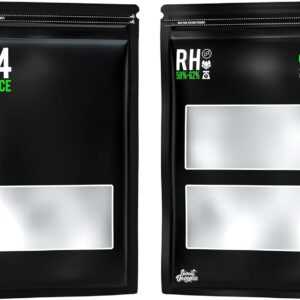
4 Ounce Bags – 25 Pack Lock & Seal Storage Curing Bags 58%-62% RH Humidity 2-Way Control Heat Sealable 8.1″ x 12″ x 3.78″ Inch (4oz, 1/4LB)
$24.99 Buy Now -

4 Pack Black Grow Tent Fan Accessories Mount Silicone Pole Mount for Clip on Fans Oscillating Clip Fan Oscillating Fan for Grow Tents Grow Tent Corner Shelf for Pole Fly Strips Lights Tent Poles
$12.99 Buy Now -
Sale!

4 Packs Booklets of Big Bambu Cigarette Rolling Papers
$8.99Original price was: $8.99.$8.21Current price is: $8.21. Buy Now -
Sale!

4 PACKS OF EZ WIDER 1 1/2 CIGARETTE ROLLING PAPERS,EZWIDER.
$51.99Original price was: $51.99.$9.95Current price is: $9.95. Buy Now -

4:19 Give Me A Minute 420 Weed Cannabis Stoner Gift PopSockets Standard PopGrip
$14.99 Buy Now -
Sale!

400 Pack 4 Size Bags with Clear Window,Scratch Resistant Hand Holographic Packaging Pouch,Resealable Bag for Small Bussiness Cookies Jewelry Candy Sample (Red Yellow, 2.4×3.9,3×4.7,4×7,5.5×7.9 inch)
$20.98Original price was: $20.98.$18.98Current price is: $18.98. Buy Now -

400 Pcs Small Plastic Bags, Resealable Clear Jewelry Bags, Small Baggies, Poly Reclosable Mini Bag, 4 Assorted Sizes 6×3.9 4.7×3.1 3.5×2.3 2.7x2IN, 2 Mil Zipper Bag for Jewelry Pill Packaging VOPTON
$6.99 Buy Now -

420 Pack | 7mm Pre Rolled Tips | Rasta Color Filter Tips | Natural Unbleached Rolling Papers | Suitable for King Size / 110mm / 1 1/4 Size Rolling Paper
$13.99 Buy Now -

420 Roman Numerals Weed Marijuana Cannabis April 20 Design T-Shirt
$13.99 Buy Now -

5 booklets – Rizla Silver Combi Pack King Size Slim Rolling Paper + Filter Tips
$7.75 Buy Now -

5 booklets Elements King Size (NOT Slim) Ultra Thin Rice rolling paper
$6.30 Buy Now -
Sale!

5 booklets OCB PREMIUM SLIM Rolling paper King Size + filter tips
$9.99Original price was: $9.99.$8.99Current price is: $8.99. Buy Now -

5 booklets OCB Ultimate Slim Thinnest Rolling Paper King Size
$6.09 Buy Now -
Sale!

5 booklets OCB Virgin Slim Unbleached Rolling Paper King Size + Filter Tips
$9.99Original price was: $9.99.$9.47Current price is: $9.47. Buy Now -
Sale!

5 Booklets x GLASS Clear Rolling Paper King Size – 100% Natural – 200 Papers
$6.49Original price was: $6.49.$6.17Current price is: $6.17. Buy Now -

5 booklets x GLASS Clear Rolling paper size 1 1/4-100% Natural – 250 papers
$5.57 Buy Now -
Sale!

5 booklets x OCB Virgin King Size Slim UNBLEACHED Rolling paper – 160 papers
$51.99Original price was: $51.99.$5.77Current price is: $5.77. Buy Now -
Sale!

5 Pack 1 Pound Terpene Curing Bags 58%-62% RH Humidity 2-Way Control Lock & Seal Storage & Curing Heat Sealable 14×18.5×6 Inches (16 Ounce, 1lb)
$25.99Original price was: $25.99.$23.99Current price is: $23.99. Buy Now -
Sale!

5 PCS Resin Molds Silicone Molds for Epoxy Resin with Large Rolling Tray Mold and Grinder Mold for Grind and Storage DIY Resin Casting
$34.99Original price was: $34.99.$19.99Current price is: $19.99. Buy Now -

5 Various Gallon Size Zip Plastic Bags (Pack of 100), 1/1.3/1.5/2/3 Gal, 2 mil each 20 Count Food Grade Reclosable Zip Top Lock Bags for Home & Kitchen
$23.09 Buy Now -

50 Ginzis Slim Rolling Kit – Filter Tips for Rolling Papers & Pre Rolls, 40mm Long Cardboard Filters & 109x33mm Narrow Rolling Papers in Durable Metal Tin Box for Smoother & Cleaner Experience, Black
$9.99 Buy Now -
Sale!

50 Pack 1 1/4 Size Cones – Pre Rolling Rolled Preroll Papers with Filter Tips and Packing Tubes Included
$7.99Original price was: $7.99.$6.99Current price is: $6.99. Buy Now -
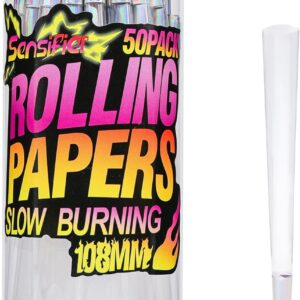
50 PACK Clear Pre Rolled Cones| King Size Rolling Paper Cone 108 MM
$7.99 Buy Now -
Sale!
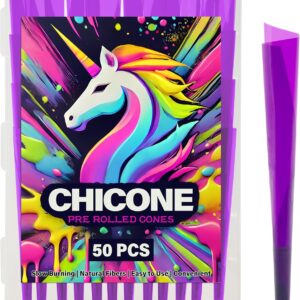
50 Pack Unbleached Pre Rolled Cones with W-Shaped Tips & Packing Tubes | King Size 108mm rolling paper cones| Slow Even Burning Preroll Cones & Packing Tubes (purple)
$9.99Original price was: $9.99.$5.99Current price is: $5.99. Buy Now -

50 SMOKING MASTER KING SIZE EXTRA SLIM Rolling Papers
$39.99 Buy Now -
Sale!

50pc Display – Elements Pink Rolling Papers – King Size Slim
$49.95Original price was: $49.95.$32.19Current price is: $32.19. Buy Now -

50PCS 90 PCS Plant Stem Trainer Plant Bender Low-Stress Training Clips Adjustable Plant Stem Training Clips Adjustable Plant Bender for Climbing Plants Plant Bender
$8.99 Buy Now -

50pcs Storage Terp Bags – 58%-62% RH 2-Way Humidity Control Resealable Bags for Curing & Storage (1/8 oz)
$15.99 Buy Now -

5PCS Reusable W’cked Glass Filter Tips for Pre Rolled Rolling Paper Cones, Slim Cigarettes, Glass Rolling Tip Mouthpieces (Green)
$13.97 Buy Now -
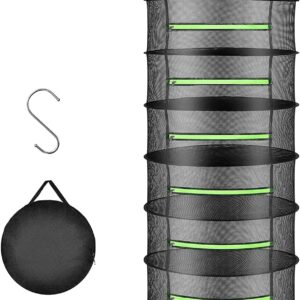
6 Layer Herb Drying Rack Net Mesh with Green Zippers,Bonus Hook Drying Rack Herbs for Hydroponics Plant Bud Seed, Mesh Hanging Plant Dry,Herb Dry Net for Garden (Zipper Type)
$23.69 Buy Now -

6 PCS Silicone Molds for Resin – Large Resin Molds with Rolling Tray Mold and Resin Grinder Mold for Grind and Storage, DIY Resin Epoxy Kit
$32.99 Buy Now -

6.8 oz. Hemp Baseball Cap (EC7090)
$11.28 Buy Now -

6″ x 9″ Black Resealable Zip Lock Bags -100 Pack of Opaque Plastic Storage Bags for Privacy, Light Protection, and Food Storage Ideal for Crafts, Tools, Office Supplies SKU r69bk-100
$19.70 Buy Now -

7 Chakras Stones Healing Crystals Tree of Life Wall Hanger Tumbled Gemstones Meditation Hanging Ornament Christmas Tree Memorial Hanging Pendant Xmas Gift
$12.93 Buy Now -

7 Pack Colors Rolling Paper with Filter Tip, Kingsizeslim 110MM Cigarette Smoking Paper, Slow Burning Natural Arabic Gum Tobacco Accessories
$4.80 Buy Now -
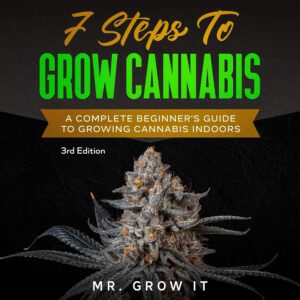
7 Steps to Grow Cannabis: A Complete Beginner’s Guide to Growing Cannabis Indoors
$0.00 Buy Now -

8 1/2″ x 100′ Brother Thermal Paper – Fits: PocketJet 6, 7, 8 Series Printers – 6 Rolls/Case
$59.95 Buy Now -
Sale!

8 Pcs Weed Car Air Fresheners Marijuana Leaves Pot Cannabis Smoking Happy 420 Have a Dope Incense Chips Scented Diffuser Rearview Mirror Hanging Pendant Ornaments Automotive Interior Accessories Gifts
$10.99Original price was: $10.99.$8.99Current price is: $8.99. Buy Now -
Sale!

90 Degree Plant Bender, Plant Trainer, for Low Stress Training, 100 Pack, Green
$13.99Original price was: $13.99.$11.99Current price is: $11.99. Buy Now -

90 pcs Smoking Green Sticker Pack – Use as Cannabis Weed Leaf Stickers, Trippy Stoner Stickers, Marijuana 420 Theme Decors on Bong, Skateboard, Laptop, Hemp Accessories Graffiti Decals (Matte Finish)
$13.99 Buy Now -

A Comprehensive Guide To Cloning Cannabis Plants
$2.99 Buy Now -
Sale!
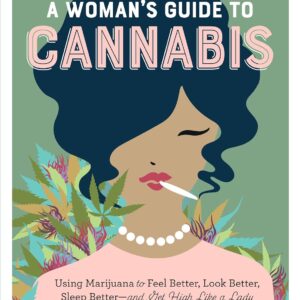
A Woman’s Guide to Cannabis: Using Marijuana to Feel Better, Look Better, Sleep Better–and Get High Like a Lady
$16.95Original price was: $16.95.$14.49Current price is: $14.49. Buy Now -

A-SAFETY Safety Shirt,High Visibility Work T Shirt Long Short Sleeve Class 3 (XS-6XL)
$14.99 Buy Now -

Abadie Paris Cigarette Paper – 1 1/4 (79mm), 3 Pack (96 Leaves), Natural, French Paper
$9.99 Buy Now -

Abctec 2PCS Roller Smoker Wall Art Print, Weed Posters, Pink Stoner Girl,Pothead Accessories, Cannabis Art, Marijuana, 420 Gifts,Unframed 12×16 Inch
$6.97 Buy Now -

AC Infinity 6.6” Stainless Steel Pruning Shear with Cleaning Kit, Lightweight Ergonomic Design, Nonstick Titanium Coated Blades for Gardening, Hydroponics, Grow Tents
$13.99 Buy Now -

Accounting Fundamentals: A Non-Finance Manager’s Guide to Finance and Accounting
$19.99 Buy Now -

Acid Alkaline Food List Healthier Shopping Using Alkaline Food Chart Food Ph Guide Nutrition Educational Poster Living Room Bedroom Aesthetic Wall Decor Canvas Wall Art Gift 12x18inch(30x45cm)
$20.50 Buy Now -

Acrylic Appliance Slider with 360° Rolling Wheels, Sliding Tray for Coffee Maker, Countertop Moving Tray Accessories for Kitchen Counter 13″ x 14″(Clear)
$31.99 Buy Now -

Acrylic Appliance Slider with Rubber Wheels, Sliding Tray for Heavy Kitchen Appliances, Coffee Maker Slider Tray for Counter, Countertop Moving Tray Accessories for Kitchen – 13″ x 14″ (Clear)
$34.99 Buy Now -
Sale!

Adjustable Kermit The Frog Embroidered Baseball Cap – Unisex Classic Dad Trucker Hat
$12.99Original price was: $12.99.$9.99Current price is: $9.99. Buy Now -

Adjustable Low Stress Training Plant Support Clips for Plant Training Plant Stem Bending Grow Tent Accessories Plant Ties Plant Training Grow Clips (50, Blue)
$16.99 Buy Now -
Sale!

Adjustable Overbed Bedside Table, Hospital Bed Table with Wheels, Portable Rolling Desk, Mobile Small Standing Desk, Rolling Laptop Stand, Computer Cart
$179.98Original price was: $179.98.$39.99Current price is: $39.99. Buy Now -
Sale!

Adjustable TV Tray Table – TV Dinner Tray on Bed & Sofa, Comfortable Folding Table with 6 Height & 3 Tilt Angle Adjustments (Black)
$45.99Original price was: $45.99.$38.99Current price is: $38.99. Buy Now -

Airtight Glass Storage Jar Medium 3.75″ Tall (Frosted Hi Maintenance)
$16.95 Buy Now -

AlexHome Honeycomb Packing Paper,15″ W x 200′ L,Eco Friendly Biodegradable Bubble Cushioning Wrap,Honeycomb Wrapping Paper,Recyclable Cushioning Packing Material,Packing Paper Roll, Packing Supplies
$21.99 Buy Now -

Alien Tattooist Astronaut Tattooing UFO Lover Tattoo Artist T-Shirt
$19.99 Buy Now -
Sale!

All-in-One Metal Rolling Tray Set with Cone Loader – Premium Foldable Tray, Pre Roll Machine, Ashtray, Candy Grinder & Storage – Fits King Size & 1 1/4 Papers
$139.00Original price was: $139.00.$14.99Current price is: $14.99. Buy Now -

ALLNTRENDS Trucker Hat Weed Smile Snapback 420 Cap
$19.94 Buy Now -
Sale!

Aluminum Foldaway Folding Service Tray on Wheels
$109.47Original price was: $109.47.$94.47Current price is: $94.47. Buy Now -

ALVIN 55W-B Lightweight Tracing Paper Roll, White, Suitable with Ink, Charcoal, Felt Tip Pen, for Sketching or Detailing – 14 Inches, 20 Yards, 1-inch Core
$13.25 Buy Now -
Sale!

Amazon Basics 3-Tier Metal Rolling Cart, Black
$37.97Original price was: $37.97.$34.17Current price is: $34.17. Buy Now -
Sale!

Amazon Basics 3-Tier Rolling Utility or Kitchen Cart, Lockable Wheels, Multifunctional Storage, Dusty Pink
$37.51Original price was: $37.51.$34.17Current price is: $34.17. Buy Now -
Sale!

Amazon Basics Parchment Paper, 90 Sq Ft Roll (Pack of 2)
$19.99Original price was: $19.99.$14.40Current price is: $14.40. Buy Now -

Anime Ball Grinder, Large Spice Grinder 2.2 Inch
$14.75 Buy Now -

Anime Grinder – 2.2 inch 3 Pieces, Yellow
$15.99 Buy Now -

ANLEY Fly Breeze 3×5 Foot Marijuana Leaf USA Polyester Flag – Vivid Color and Fade proof – Canvas Header and Double Stitched – US Marijuana Leaves Flags with Brass Grommets 3 X 5 Ft
$6.95 Buy Now -

ANNCED Beanie Hat Knitted Cap for Men Women,Thin Warm Knit Slouchy Cancer Hat Ski Cap Winter Warm Hip Hop Soft Skull Cap
$11.99 Buy Now -

Anrapley Lighter, 6.0in Long Butane Torch Lighter with Fuel Level Window, Windproof Pen Lighter Adjustable Jet Flame for Candle Fireplace Grill Kitchen BBQ, Dad Gifts, Black(Gas not Included)
$9.98 Buy Now -
Sale!

Apple Brand Bags 1515 Original Apple Brand Zip Top Baggies Mix 26 Designs 104 bags 1.5 x 1.5
$9.99Original price was: $9.99.$8.45Current price is: $8.45. Buy Now -
Sale!

Appliance Slider 360° Rolling Tray for Coffee Maker Bamboo Coffee Pot Slider Tray Countertop Rotation Sliding Tray with Wheels, Small Appliances Mat Black(Small 13.9″×9.4″)
$30.99Original price was: $30.99.$24.64Current price is: $24.64. Buy Now -
Sale!

Appliance Slider 360° Rolling Tray for Coffee Maker, Wooden Sliding Tray for Coffee Maker Countertop, Coffee Maker Tray for Counter & Heavy Kitchen Appliances (16.8 x 12.8 inch)
$31.98Original price was: $31.98.$27.99Current price is: $27.99. Buy Now -
Sale!

Appliance Slider, Sliding Tray for Coffee Maker, Coffee Pot Slider for Countertop, Kitchen Appliance Rolling Tray with Rubber Wheels (Rustic Brown, Medium – Wide (13” x 9.5”))
$25.99Original price was: $25.99.$21.99Current price is: $21.99. Buy Now -

Appliance Slider, Wooden Sliding Tray for Coffee Maker, Coffee Pot Slider for Counter, Kitchen Caddy Rolling Tray (Classic Black- Deep)
$31.99 Buy Now -
Sale!

Appliance Slider, Wooden Sliding Tray for Coffee Maker, Coffee Pot Slider for Counter, Kitchen Caddy Rolling Tray (Classic Black- Wide)
$34.99Original price was: $34.99.$31.99Current price is: $31.99. Buy Now -
Sale!

Appliance Sliders for Kitchen Appliances, 360° Rolling Coffee Tray for Countertop, Bamboo Sliding Tray for Coffee Maker, Large Coffee Pot Slider Tray for KitchenAid Stand Mixer, Air Fryer, Toaster
$32.99Original price was: $32.99.$28.99Current price is: $28.99. Buy Now -
Sale!

Appliance Sliders for Kitchen Appliances, Sliding Tray for Coffee Maker, Coffee Pot Slider Tray with Rubber Rolling Wheels for Heavy Kitchen Appliances like Blender (colorless, 10″D x 12″W)
$22.99Original price was: $22.99.$21.84Current price is: $21.84. Buy Now -

Appliance Sliding Tray, Kitchen Coffee Maker Sliding Caddy with Rolling Wheels for Countertop Coffee Maker Kitchen Aid Mixer Blenders and Air Fryer(16.1″W x11.8″D)
$18.99 Buy Now -

ARGOMAX Appliance Rolling Tray, Coffee Maker Slider, coffee pull out tray, sliding coffee maker tray, Suitable for coffee machines, air fryers and other appliances (10.3” W × 15.3”D)
$23.99 Buy Now -

Around the World in 40 Desserts – Sweet Cannabis-Infused Edible Treats : CBD, THC & Hemp Infused Mouth Watering and Unique Recipes with Easy Extraction methods
$2.99 Buy Now -
Sale!

Ashtray Mold for Resin, Large Leaf Silicone Mold for Epoxy Resin, Maple Leaf Rolling Tray for Jewelry Storage Box, DIY Craft Gift, Home Decoration
$11.24Original price was: $11.24.$8.99Current price is: $8.99. Buy Now -
Sale!

Ask Ed: Marijuana Success: Tips and Advice for Gardening Year-Round
$19.99Original price was: $19.99.$18.22Current price is: $18.22. Buy Now -

Astronaut Cottagecore frog Aesthetic Men Women Graphic T-Shirt
$16.99 Buy Now -

Athletic Sports High Crew Socks for Men Women Leaf Cotton Sock
$13.99 Buy Now -

Backwoods Bags Smell Proof Bags Deodorant bags Storage Bags Travel Bags with Combination Lock- IndoorOutdoor (A9), 23*12*16cm
$21.99 Buy Now -

Bag with Combination Lock Travel Bag with Lock
$18.99 Buy Now -

Bag with Combination Lock, Medicine Container Case For Your Accessories (8.5×5.5×4, Black)
$19.99 Buy Now -

BALEINE Large Storage Bag with Combination Lock, Water-resistant Travel Organization Case (Lilac)
$19.95 Buy Now -

Bamboo Appliance Slider, Sliding Tray for Coffee Maker, Kitchen Countertop Appliance Rolling Tray, Coffee Pot Slider Tray with Rubber Wheels, Wide – Medium (13″D x 14″W)
$24.99 Buy Now -
Sale!

Bamboo Appliance Sliders for Kitchen Appliances, Sliding Tray with Silent Rubber Wheels for Coffee Maker, Kitchen Countertop Appliance Rolling Tray (Large 13″ x 14″)
$49.99Original price was: $49.99.$21.99Current price is: $21.99. Buy Now -
Sale!

Bamboo Box Tray Set with Combination Lock, Decorative Box with Accessories,Tray and Glass Jars, Lockable Decorative Box Set with Exquisite Handles,Ideal for Home Storage and Great Gift(Black)
$69.99Original price was: $69.99.$39.99Current price is: $39.99. Buy Now -
Sale!

Bamboo Rolling Tray, Large Cigarette Tray, Decorative Tray with Rolling Paper Grinder Cigarette Slot(Guitar – 9.06” x 7.29”)
$59.99Original price was: $59.99.$7.99Current price is: $7.99. Buy Now -
Sale!

Bamboo Sliding Appliance Tray,Coffee Maker Slider Tray with Rubber Wheels, Countertop Pull Out Organizer for Coffee Machines,Air Fryers and Other (Natural, Small-Long(7.5”W x 14.5”L))
$57.99Original price was: $57.99.$20.99Current price is: $20.99. Buy Now -
Sale!

Bamboo Stash Kit, Storage Box, Rolling Tray, Rolling Kit, Rolling Tray Box with Lock, Smell Proof Box, Bamboo Rolling Tray Bundle, Lock Box
$37.95Original price was: $37.95.$34.95Current price is: $34.95. Buy Now -
Sale!

Bambu – Big Bambu Pure Hemp Rolling Paper (10 Booklets)
$19.99Original price was: $19.99.$17.90Current price is: $17.90. Buy Now -

Bambu – Big Bambu Pure Hemp Rolling Paper (3 Booklets)
$8.10 Buy Now -

Bambu – Big Bambu Pure Hemp Rolling Paper (4 Booklets)
$9.77 Buy Now -
Sale!

Bambu Big Cigarette Paper 50-Count
$83.95Original price was: $83.95.$74.07Current price is: $74.07. Buy Now -
Sale!

Bambu Regular 1-1/4″ Rolling Paper, Pack of 5 Booklets
$9.46Original price was: $9.46.$8.34Current price is: $8.34. Buy Now -

Banking Cannabis: A Comprehensive Guide to Cannabis and Compliance
$29.95 Buy Now -

Baseball Cap Snapback Hats Adjustable Trucker Hat for Men Women
$18.98 Buy Now -

Bates- Paint Tray Liner, 9 Inch, 10 Pack, Paint Roller Tray, Disposable Plastic Paint Trays, Paint Pans Trays, Paint Supplies for House Painting, Roller Tray
$13.85 Buy Now -

Beamer Candle Co. Smoke Killer Collection – Blueberry High Pie Large Candle
$23.99 Buy Now -

Beauty of Cannabis: 200 Strains of Marijuana, A Visual Guide
$24.95 Buy Now -

Bee Paper Company Watercolor Paper 100% Cotton Roll
$39.79 Buy Now -

Bee’s Wrap Beeswax Wraps for Food – Honeycomb Cut to Size Wax Paper Roll – Made in USA Reusable Waxed Paper & Bowl Covers – Organic & Eco-Friendly Alternative to Aluminum Foil & Plastic Wrap
$24.00 Buy Now -

Beginner’s Guide to Growing Medical Cannabis: Unlock the Secrets to Successfully Cultivating Your Own Medicinal Cannabis Plants
$12.95 Buy Now -

Beric Honeycomb Paper Cushioning Wrap – Packing – Shipping Supplies – Packing Paper – Boxes For Packaging – Alternative To Bubble Wrap Roll – Packing Paper For Moving – 15″ X 328′
$39.95 Buy Now -

Besshopie Womens Halter Tops Summer Sleeveless Shirts Sexy High Neck Fitted Tops Racer Back Tank Tops Blouses
$32.99 Buy Now -

Best Pops Ever for Dad Graphic Sarcastic Funny T Shirt
$14.99 Buy Now -
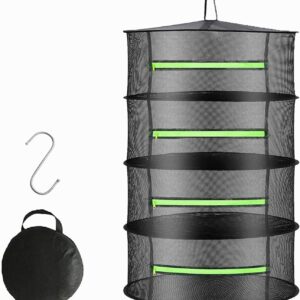
Bestio Herb Drying Rack, 4 Layer Hanging Drying Rack Mesh for Plants with Zipper, Pruning Scissors, Hook, Black Weed Drying Rack Net, for Drying Herb Flowers Buds Fish Vegetables
$17.99 Buy Now -

Betterway Unbleached Bamboo Toilet Paper Rolls – Eco-Friendly 3 Ply Toilet Tissue – 12 Double Rolls – 360 Sheets/Roll – Organic, FSC Certified, Septic Safe TP – Lint-Free, PFA-Free Bath Tissue
$29.99 Buy Now -
Sale!

Beyond Buds, Next Generation: Marijuana Concentrates and Cannabis Infusions
$29.95Original price was: $29.95.$24.06Current price is: $24.06. Buy Now -
Sale!

Big Bambu Papers – 24 pack
$51.99Original price was: $51.99.$39.50Current price is: $39.50. Buy Now -

Big Bambu Rolling Papers (50 Booklets)
$75.49 Buy Now -

Bigfoot Starry Night Sasquatch Van Gogh Sky Painting Art T-Shirt
$19.95 Buy Now -

BIOBROWN Floral Wrapping Paper Jumbo Roll – 30 Inch X 33 Feet (82.5 sq. ft. ttl.) Blue White Peony Design Chinoiserie Gift Wrap Stone Paper for Wedding, Bridal Shower, Mother’s Day
$23.99 Buy Now -
Sale!

BIOBROWN Kraft Wrapping Paper Roll Colorful Stars Design Perfect for Birthday Holiday Wrap 17 inch X 33 feet
$13.99Original price was: $13.99.$11.89Current price is: $11.89. Buy Now -
Sale!

BIOBROWN Kraft Wrapping Paper Roll Colorful Text Happy Birthday Design Perfect for Birthday Holiday Wrap 17 inch X 33 feet
$13.99Original price was: $13.99.$11.19Current price is: $11.19. Buy Now -

Black Cuff Marijuana Leaf Knitted Beanie
$14.95 Buy Now -
Sale!

Black Metal Tray 2 Pack 11″x7″ and 7″x5.5″ (Black)
$19.97Original price was: $19.97.$9.99Current price is: $9.99. Buy Now -
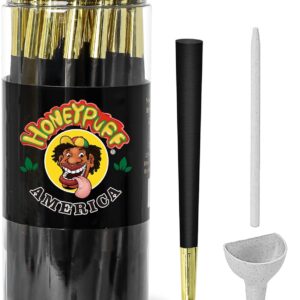
Black Pre Rolled Cones With Goled Filter Tips, 50 PACK King Size Back Prerolled Rolling Paper Cones(Include Loader and Packing Sticks)
$6.99 Buy Now -
Sale!

Black Pre-Rolled Filter Tips, 7mm – Bottle of 500 Tips
$55.00Original price was: $55.00.$12.90Current price is: $12.90. Buy Now -

Black Resealable Bags Packaging Bags 3×4 Inch 300 Pieces Double-Sided Matte Black
$17.99 Buy Now -

Black Rolling Papers, 1 1/4 Inches, 50 Count, 5 Pack
$8.00 Buy Now -

Black Rolling Tray Set with Magnetic Lid 7″x5″ – Smoking Accessories by Gray Oval
$12.99 Buy Now -
Sale!

Black Rolling Tray with Magnetic Lid & Cool Ashtray for Outside Patio Outdoor Home Cute Decor,Metal Ash tray Set for Storage or Travel- Set of 3 (Funny Turtle Design)
$32.99Original price was: $32.99.$8.56Current price is: $8.56. Buy Now -
Sale!

Black Scrapers, Brushes & Spoons Kit with 3 in 1 cleaning tool for Spice Grinder include 4 Pcs Scrapers,6 Pcs 3 Types of Brushes,2 Spoons,1 Pcs Plastic Jar and A Storage Box
$9.99Original price was: $9.99.$9.49Current price is: $9.49. Buy Now -
Sale!

Black Treehouse Rolling Tray Set with PVC Soft Magnetic Lid, Ashtray Included for Home Storage or Travel – 7″ x 5.5″, Small, Cute
$37.99Original price was: $37.99.$9.99Current price is: $9.99. Buy Now -
Sale!

Black Walnut Rolling Tray 11″x7″ Tray Rolling Tray Set with Cleaning Brush and Scoop Card – Accessories for Rolling Papers, Grinders – Tray with Smooth Rounded Edges
$19.98Original price was: $19.98.$14.98Current price is: $14.98. Buy Now -

black white Cannabis accessories Marijuana Leaf Weed Drugs PopSockets PopGrip: Swappable Grip for Phones & Tablets
$11.72 Buy Now -
Sale!

Blazy Pink Cones 50ct Pack | Pink Rolling Cones | Vegan & Smooth Burning | Blazy Susan Quality Smoking Accessories
$19.99Original price was: $19.99.$12.99Current price is: $12.99. Buy Now -
Sale!
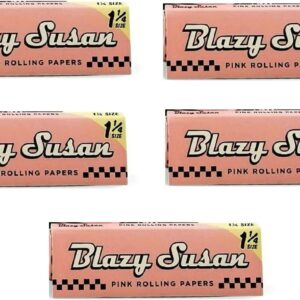
BLAZY Susan King Size Slim Rolling Papers 5 Packs 50 Sheets PER Pack + DSS Scoop Card
$5.99Original price was: $5.99.$5.70Current price is: $5.70. Buy Now -
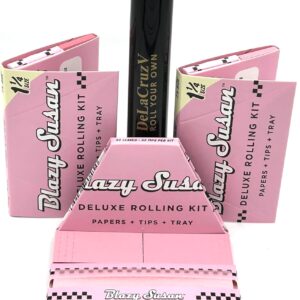
Blazy susan Pink Deluxe Rolling Kit 1 1/4 paper+tips 3 packs and Tube.
$12.99 Buy Now -
Sale!

Blazy Susan Purple Pre-Rolled Cones, 50 Count (98mm) – Slow-Burning Rolling Paper & Ultra-Thin Natural Preroll Cones with Filter Tips – Vegan, GMO-Free, Convenient & Easy-To-Use Prerolled Cones
$13.85Original price was: $13.85.$11.97Current price is: $11.97. Buy Now -

Blueberry Flavored Rolling Papers, King Size 109x44mm
$17.00 Buy Now -

Blulu 100 Pieces Resealable Foil Proof Bag Foil Pouch Flat Bag for Party Favor Food Storage(4 x 6 Inches,Black)
$11.99 Buy Now -

Boao 100 Pieces Resealable Foil Food Storage Bags with Clear Window Coffee Beans Candy Packaging Pouch for Food Small Business Supplies for Jewelry Self Sealed Storage Bags(4.7 x 7.9 Inch,Black)
$11.49 Buy Now -
Sale!

Bob Marley Natural Cigarette Rolling Papers with Tips (24 Booklets)
$39.90Original price was: $39.90.$37.98Current price is: $37.98. Buy Now -
Sale!

Bob Marley Pure Hemp Cigarette Rolling Papers Combo Pack – All Natural – with Tips (5 Pack)
$15.99Original price was: $15.99.$11.73Current price is: $11.73. Buy Now -

Bob Marley Rolling Paper – 1 1/4″ Medium Size (78mm) Paper – Box of 25 Booklets! (50 Leaves Per Book)
$24.99 Buy Now -

Bob Marley Rolling Paper – 1 1/4″ Medium Size (78mm) Ultra Thin Paper – Box of 25 Booklets! (50 Leaves Per Book)
$23.99 Buy Now -

Bob Marley Rolling Paper – King Size (110mm) Cigarette Paper – Box of 50 Booklets (33 Leaves Per Book)
$39.95 Buy Now -
Sale!

Bob Marley Rolling Paper – King Size Extra Long (110mm) Pure Hemp Paper – Full Box of 50 Booklets!
$51.99Original price was: $51.99.$38.99Current price is: $38.99. Buy Now -

Bob Marley Rolling Paper Unbleached – King Size (110mm) Cigarette Paper – Box of 50 Booklets (33 Leaves Per Book)
$39.99 Buy Now -
Sale!

Bob Marley Rolling Papers Unbleached Organic 1 1/4 Rolling Paper – 1 Box (25 Booklets)
$51.99Original price was: $51.99.$27.98Current price is: $27.98. Buy Now -

Booda Brand Stoner Avenue Street Sign 4 Signs of Exit 420 /High St/Mary Jane Lane/Stoner Ave for Room Decor, Duplex Printed Anti-Fade Trippy Room Decor for Stoner, Vintage Rustic Retro Street Sign
$12.99 Buy Now -

Boveda 62% RH Size 8-10 Pack Two-Way Humidity Control Packs – For Storing 1 oz – Moisture Absorber for Small Storage Containers – Humidifier Packs – Hydration Packets w/Resealable Bag
$16.50 Buy Now -

Boveda 62% Two-Way Humidity Control Packs For Storing ½ oz – Size 4 – 10 Pack – Moisture Absorbers for Small Storage Containers – Humidifier Packs – Hydration Packets in Resealable Bag
$14.99 Buy Now -

Box 24 Cyclones TIKI TANGO King Size Flavored Pre Rolled Cones Reusable Wood Tip by Cyclones
$17.62 Buy Now -

BOX USA Kraft Brown Paper Roll, 50#, 12″ x 720′, 100% Recycled Paper, Ideal for Shipping, Packing, Moving, Gift Wrapping, Craft, Dunnage and Parcel
$39.99 Buy Now -
Sale!

BOYISTARGLarge Storage Bag with 10 Small Items ,Combination Lock, Portable Lock Bag Set Travel Case Great Christmas Gifts for Men, Black
$49.94Original price was: $49.94.$36.99Current price is: $36.99. Buy Now -
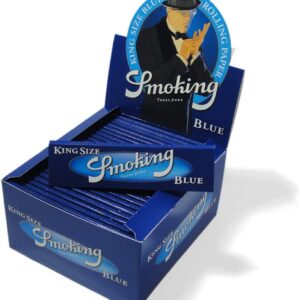
Brand Rolling Paper – Blue – King Size (Full Box)
$38.99 Buy Now -
Sale!

Brand Rolling Paper – Brown Unbleached – 1 1/4 Full Box
$19.93Original price was: $19.93.$15.35Current price is: $15.35. Buy Now -

Brand Rolling Papers – Red Regular (70mm)
$24.99 Buy Now -

Brando Moon Smell Proof Makeup Bag with Moon – Carbon Neutralizing Fabric – Air Tight Zippers (Purple)
$20.99 Buy Now -
Sale!

Brccee AC Kitchen Apron I’d Hit That Marijuana Pot Weed Stoner Apron Adult Women Unisex Durable Comfortable Washable for Baking, Crafting, Gardening, Cooking Kitchen
$15.99Original price was: $15.99.$12.99Current price is: $12.99. Buy Now -
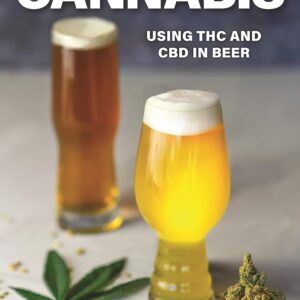
Brewing with Cannabis: Using THC and CBD in Beer (Volume 1)
$19.95 Buy Now -

Brown Kraft Paper Roll – Extra Long, Durable & Recycled Paper – Ideal for Packing, Gift Wrapping, Postal, Shipping, Artwork, Crafts, Bulletin Boards & Covering Floor (17.5” x 1800” (150’)
$15.99 Buy Now -
Sale!

Brown Kraft Paper Roll 17.75” x 1200” (100ft) Made in USA- Ideal for Gift Wrapping, Packing Paper for Moving, Art Craft, Shipping, Floor Covering, Table Runner, 100% Recycled Material
$39.99Original price was: $39.99.$11.97Current price is: $11.97. Buy Now -

Brown Kraft Paper Roll- GLAMFIELDS 20″ x 1,200″ (100′) Brown Paper Roll for Packing, Moving, Gift Wrapping, Postal, Shipping, Parcel, Wall Art, Crafts, Bulletin Boards, Floor Covering, Table Runner
$19.99 Buy Now -

Brushes Scrapers Spoons Set for Herb Grinder Pipe Cleaners Tool Pollen Kit for Herb Grinder (17)
$6.99 Buy Now -
Sale!

Bryco Goods (Pack of 2) Brown Kraft Packing Paper Rolls – 18″ x 100′ (1200”) – Moving Supplies, Gift Wrapping, Arts & Crafts, Bulletin Board Paper – Made in The USA
$22.97Original price was: $22.97.$20.49Current price is: $20.49. Buy Now -
Sale!
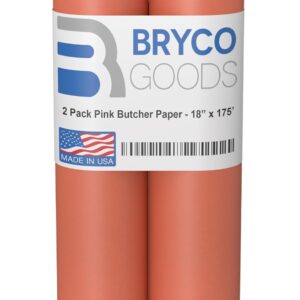
Bryco Goods (Pack of 2) Pink Butcher Paper Rolls, 18″x175′ (2100 Inch) Food-Grade Peach Butcher Paper for Smoker, BBQ, Grilling, Smoking Meat – USA Made – Unbleached, Uncoated and Unwaxed
$33.97Original price was: $33.97.$29.99Current price is: $29.99. Buy Now -

Bryco Goods 24 Inch x 175 Feet, Brown Butcher Paper Roll, Unbleached, Uncoated, Unwaxed, Food-Grade, Wide Kraft Paper for BBQ, Smoking, Grilling, Wrapping Meat, Table Covering – USA Made
$27.97 Buy Now -

Bryco Goods Pink Butcher Paper Roll with Dispenser Box, 18″ x 175′ (2100”) Food-Grade Peach Butcher Paper for Smoker, BBQ, Grilling, Smoking Meat – USA Made – Unbleached, Uncoated and Unwaxed
$20.97 Buy Now -

Bucket Hat for Men Women – Famous Us Route 66 Fashion Sun Cap Unisex Fisherman Hat
$6.99 Buy Now -

Bucket Hats Fashion Sun Cap Packable Outdoor Fisherman Hat for Women and Men
$13.99 Buy Now -

Budding Success: Your Essential Cannabis Cultivation Companion
$13.99 Buy Now -
Sale!

BudMan 1 1/4 Size Green Rolling Papers, 78mm Premium Rolling Papers, 25 Packs rolling papers with filters, Natural Arabic Gum, Tobacco Tools
$8.59Original price was: $8.59.$7.80Current price is: $7.80. Buy Now -
Sale!

BudMan Rolling Papers, Color Rolling Papers, 7 packs 110mm kingsizeslim Ultra-Thin papers, Easy To Carry, Slow Burn, Tobacco Tools
$4.99Original price was: $4.99.$4.50Current price is: $4.50. Buy Now -

Budtender Education: Cannabis Education for Budtenders from an Oakland Equity Perspective.
$13.90 Buy Now -

Budtender Gift Cannabis Dispensary Just Another Bud Tender PopSockets PopGrip: Swappable Grip for Phones & Tablets
$12.99 Buy Now -
Sale!

Bugler Cigarette Rolling Paper Gummed Box, 24 Count (Pack of 1)
$31.99Original price was: $31.99.$29.27Current price is: $29.27. Buy Now -
Sale!

Bugler Cigarette Rolling Papers Single Wide(70mm) – Pack of 5
$51.99Original price was: $51.99.$9.64Current price is: $9.64. Buy Now -

Bugler Orange Slow Burning Cigarette Rolling Papers 1 1/4 (78mm) – 24 Booklets
$19.79 Buy Now -

Bugler Original Cigarette Papers, 3pk
$6.26 Buy Now -

BUGLER ROLLING PAPERS SW 115 LEAVES UNFLAVORED FLAVOR PACK OF 24
$34.65 Buy Now -

Building a Successful Cannabis Testing Laboratory : A Comprehensive Guide
$49.99 Buy Now -

Bundle – 5 Items – Juicy Jay’s Juicy Jones Pre-Rolled Cone Sampler Pack (1 Pack of 4 Flavors) with Authentic Rolling Paper Depot KewlTube
$9.98 Buy Now -

Bungee Smell Proof Backpack – Large Odorless Travel Backpack for Men & Women, Carry-On, Work, Stylish & Spacious Bag – Red Camo
$128.00 Buy Now -

Burp Lids 12 Pack Curing Kit – Fits All Wide Mouth Mason Jar Containers – A Home Harvesting Essential. 12 lids + extraction pump. Vacuum sealed for successful cure.
$69.98 Buy Now -

Burp Lids Automatic Pump | for Curing, Harvesting & Automatic Burping | Fits All Wide Mouth Jars
$39.99 Buy Now -
Sale!

C Shaped End Table with Rolling Wheels, Height Adjustable Sofa Side Table for Small Space Bedroom, Industrial TV Tray Couch Table Cart for Living Room, Retro Brown & Black
$37.99Original price was: $37.99.$36.00Current price is: $36.00. Buy Now -
Sale!

C Shaped End Table with Rolling Wheels, Height Adjustable Sofa Side Table for Small Spaces, Tiltable Surface for Tablets or Laptops, Industrial TV Tray Cart for Living Room, Retro Brown
$47.99Original price was: $47.99.$36.00Current price is: $36.00. Buy Now -
Sale!

C Shaped Sofa Side Table: Couch End Table with Drawer – Bedside Table with Wheels – 19.7”L x 11.8”W x 28”H – C Mobile Tables with Storage Basket for Living Room Bedroom
$39.99Original price was: $39.99.$37.99Current price is: $37.99. Buy Now -
Sale!

C Table End Table Adjustable Height, 360°Swivel TV Tray Table for Small Spaces, Couch Tables That slide under, C Shaped Side Tables living room and bedroom for Sofa, Bed,Chair, Snack (Walnut Brown)
$59.64Original price was: $59.64.$44.99Current price is: $44.99. Buy Now -
Sale!

C Table End Table Adjustable Height, 360°Swivel TV Tray Table for Small Spaces, Couch Tables That Slide Under, C Shaped Side Tables with Wheels for Living Room and Bedroom, Bed
$49.99Original price was: $49.99.$44.99Current price is: $44.99. Buy Now -

Califari Hat – Features Unique Strain Art – Ideal for Outdoor Fun
$24.20 Buy Now -
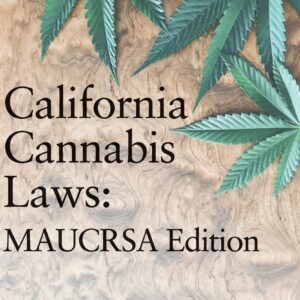
California Cannabis Laws: MAUCRSA Edition (Cannabis Codes of California)
$60.00 Buy Now -
Sale!

Calmootey 3-Tier Rolling Utility Cart with Drawer,Multifunctional Storage Organizer with Plastic Shelf & Metal Wheels,Storage Cart for Kitchen,Bathroom,Living Room,Office,White
$26.97Original price was: $26.97.$25.19Current price is: $25.19. Buy Now -

Cannabinoids Cannabis Education Poster – Dispensary Decor Wall Hanging Decor Living Room Poster And Canvas
$17.99 Buy Now -
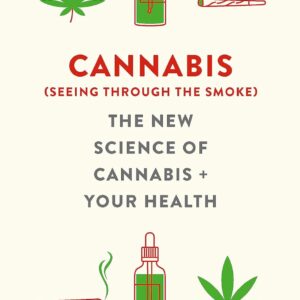
Cannabis (seeing through the smoke): The New Science of Cannabis and Your Health
$21.63 Buy Now -

Cannabis | PSHE Posters | Gloss Paper measuring 33” x 23.5” | PSE Classroom Posters | Education Charts by Daydream Education
$7.95 Buy Now -

Cannabis 101 – Quick Reference Guide – Cannabis Educational Series by Permacharts
$7.95 Buy Now -
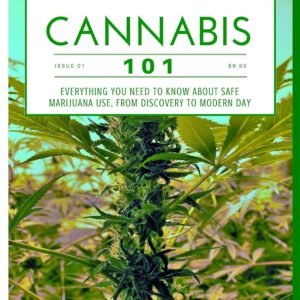
Cannabis 101: Everything You Need To Know About Safe Marijuana Use
$5.99 Buy Now -

Cannabis 101: Understanding (and breaking into) the Industry
$2.99 Buy Now -

Cannabis 420 Flex Fit Hat
$24.95 Buy Now -

Cannabis 420 Weed THCHealthcare- Sun Hat Garden Hat Pigment Black Mens Beach Hat Gifts for Girlfriends Golf Hats
$14.99 Buy Now -

Cannabis accessories Marijuana Leaf Smoke Weed Drugs | gift PopSockets PopGrip: Swappable Grip for Phones & Tablets
$11.72 Buy Now -

Cannabis accessories Marijuana Leaf Smoke Weed Drugs | gift PopSockets PopGrip: Swappable Grip for Phones & Tablets
$11.72 Buy Now -

Cannabis accessories Marijuana Leaf Smoke Weed Drugs | gift PopSockets PopGrip: Swappable Grip for Phones & Tablets
$11.72 Buy Now -

Cannabis accessories Marijuana Leaf Smoke Weed Drugs | gift PopSockets Swappable PopGrip
$14.99 Buy Now -

Cannabis accessories Marijuana Leaf Smoke Weed Drugs | gift PopSockets Swappable PopGrip
$11.99 Buy Now -

Cannabis accessories Marijuana Leaf Smoke Weed Drugs | gift PopSockets Swappable PopGrip
$11.99 Buy Now -

Cannabis accessories Marijuana Leaf Smoke Weed Drugs | gift PopSockets Swappable PopGrip
$11.99 Buy Now -
Sale!

Cannabis and CBD for Health and Wellness: An Essential Guide for Using Nature’s Medicine to Relieve Stress, Anxiety, Chronic Pain, Inflammation, and More
$16.99Original price was: $16.99.$11.00Current price is: $11.00. Buy Now -

Cannabis and the Christian: What the Bible Says about Marijuana
$12.99 Buy Now -

CANNABIS BREEDING : The Essential Guide To Cultivation And Propagation Of Cannabis
$18.99 Buy Now -

Cannabis Breeding: The Art and Science of Crafting Distinctive Cultivars
$9.99 Buy Now -

CANNABIS BUSINESS STARTUP: Easy and complete beginner’s guide to legally start, run and grow your successful marijuana business from scratch. Everything … in the cannabis industry (Marijuana guide)
$4.99 Buy Now -

Cannabis Cloning: the Easy, Cheap, and Effective Way to Get It Right Every Time
$6.99 Buy Now -
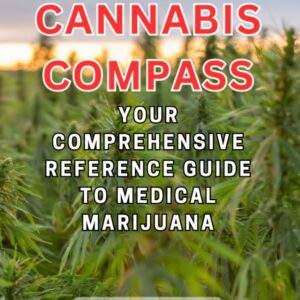
Cannabis Compass: Your Comprehensive Reference Guide to Medical Marijuana: Navigating Uses, Benefits, and Legality for Informed Wellness Decisions
$11.95 Buy Now -

Cannabis Connoisseur: A Concise Grow Guide For 2024
$9.99 Buy Now -

Cannabis Connoisseurs: The Unofficial Budtending Handbook
$9.99 Buy Now -
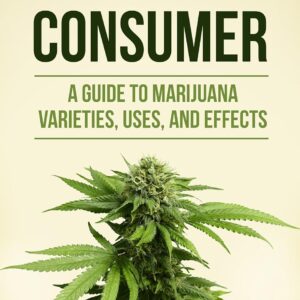
Cannabis Consumer: A Guide to Marijuana Varieties, Uses, and Effects
$3.99 Buy Now -

Cannabis Crossbreeding: Creating Your Strain Library: Techniques for breeding cannabis to create unique strains
$3.99 Buy Now -
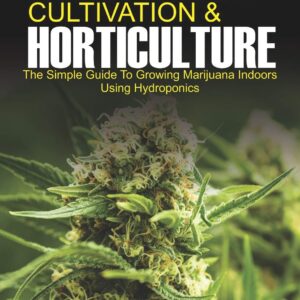
Cannabis Cultivation and Horticulture: The Simple Guide to Growing Marijuana Indoors Using Hydroponics
$12.99 Buy Now -

Cannabis Cultivation Codes: An Advanced Grow Guide with Techniques for 2024
$29.99 Buy Now -
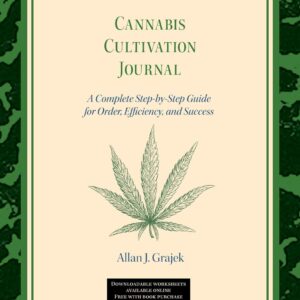
Cannabis Cultivation Journal: A Complete Step by Step Guide for Order, Efficiency, and Success
$19.76 Buy Now -
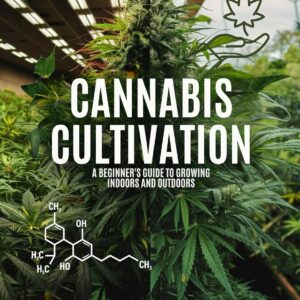
CANNABIS CULTIVATION: A BEGINNER’S GUIDE TO GROWING INDOORS AND OUTDOORS
$3.99 Buy Now -

Cannabis Cultivation: A Complete Grower’s Guide
$14.74 Buy Now -

Cannabis Cultivation: Growing Marijuana Indoors (from Sourcing Seed to Harvesting Weed)
$2.99 Buy Now -

Cannabis Education ‘endocannabinoid System’ Poster – Decoration Home Dispensary Wall Decor Poster And Canvas
$17.99 Buy Now -
Sale!
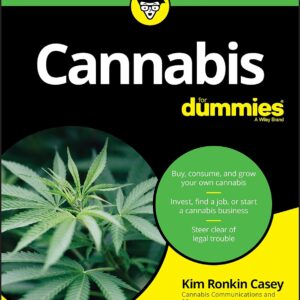
Cannabis For Dummies
$26.99Original price was: $26.99.$24.11Current price is: $24.11. Buy Now -
Sale!

Cannabis for Health: The Essential Guide to Using Cannabis for Total Wellness (Volume 2) (Cannabis Wellness)
$24.95Original price was: $24.95.$12.21Current price is: $12.21. Buy Now -
Sale!

Cannabis for Seniors
$18.95Original price was: $18.95.$13.63Current price is: $13.63. Buy Now -

CANNABIS GROW BOOK: THE COMPLETE STEP BY STEP GUIDE TO MARIJUANA CULTIVATION
$2.99 Buy Now -
Sale!

Cannabis Grower’s Handbook: The Complete Guide to Marijuana and Hemp Cultivation
$44.95Original price was: $44.95.$36.55Current price is: $36.55. Buy Now -

Cannabis growers Guide: The complete guide to marijuana Cultivation (Everything gardening)
$13.99 Buy Now -

Cannabis Growers Journal: Marijuana Growing & Harvesting Log, Grow, Keeping Track Of Details, Record Strains, Medical & Recreational Weed Reference, Notebook
$19.99 Buy Now -

Cannabis Growers Journal: Weed Growing Journal Log Book Sized 6″x9″ (150 Pages) – Keep Track of Your Marijuana Cultivation – A Record Keeping Cannabis Log for Marijuana Farmers
$9.99 Buy Now -

Cannabis High Time Old 420 Indica & Sativa Weed retro T-Shirt
$13.38 Buy Now -

Cannabis High Time Old 420 Quality Indica & Sativa Weed T-Shirt
$17.99 Buy Now -
Sale!

Cannabis Is Medicine: How Medical Cannabis and CBD Are Healing Everything from Anxiety to Chronic Pain
$22.99Original price was: $22.99.$17.18Current price is: $17.18. Buy Now -
Sale!

Cannabis Jobs: How to Make a Living and Have a Career in the World of Legalized Marijuana
$16.99Original price was: $16.99.$15.97Current price is: $15.97. Buy Now -
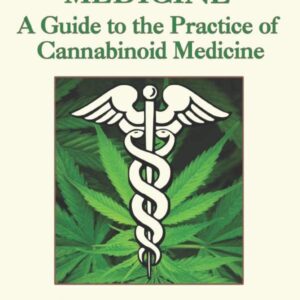
Cannabis Medicine: A Guide to the Practice of Cannabinoid Medicine
$25.00 Buy Now -

Cannabis Periodic Table Education Science Plaque Poster Metal Tin Sign 8″ x 12″ Vintage Retro Wall Decor
$9.97 Buy Now -
Sale!
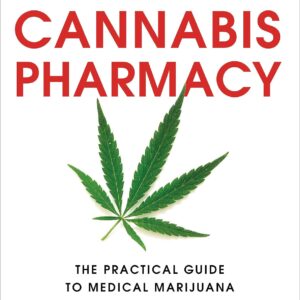
Cannabis Pharmacy: The Practical Guide to Medical Marijuana — Revised and Updated
$22.99Original price was: $22.99.$19.35Current price is: $19.35. Buy Now -

Cannabis Rasta Jamaican Weed Figurine Double Ashtray – Jamaican Man Smoking Marijuana Joint Ashtray Holding 2 Ashtrays- Weed Hemp Pot Party Accessory
$24.99 Buy Now -
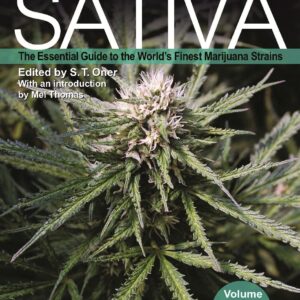
Cannabis Sativa Volume 2: The Essential Guide to the World’s Finest Marijuana Strains
$19.99 Buy Now -

Cannabis Shirt Weed Pot Molecule THC Marijuana Stoner Gift T-Shirt
$16.90 Buy Now -

Cannabis Strain Weed T-Shirt
$14.99 Buy Now -

Cannabis Supreme: A Comprehensive Grow Guide for Sativa and Indica
$9.99 Buy Now -

Cannabis T-Shirt – Sour Diesel Weed Funny Stoner Shirt Gift
$17.90 Buy Now -

Cannabis THC Marijuana Weed 420 CBD Caps Gym Hat AllBlack Trucker Hats Women Gifts for Mom Baseball Hats
$15.99 Buy Now -

Cannabis THC Marijuana Weed 420 CBD Trucker Hat Mom Hat AllBlack Womens Beach Hat Gifts for Girlfriends Cool Cap
$15.99 Buy Now -
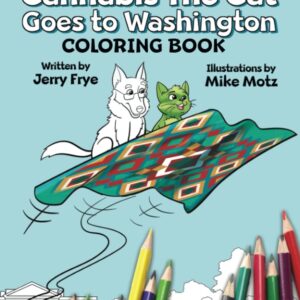
Cannabis The Cat Goes to Washington Coloring Book (The Adventures of Cannabis The Cat)
$6.99 Buy Now -
Sale!
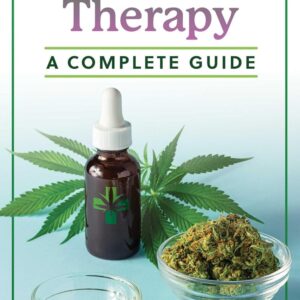
Cannabis Therapy: A Complete Guide (Sacred Planet)
$22.99Original price was: $22.99.$18.68Current price is: $18.68. Buy Now -
Sale!

Cannabis Tie – Marijuana Necktie – Stoner Gift for men – 420 Gift for men – Pot Smoker gift for Men
$34.88Original price was: $34.88.$29.88Current price is: $29.88. Buy Now -
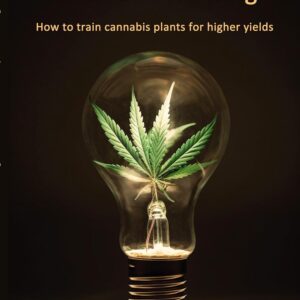
Cannabis Training: How to train cannabis plants for higher yields (Teddy’s green pages: Die Cannabis Edition)
$7.99 Buy Now -

Cannabis vs. Marijuana: Language, Landscape and Context
$24.95 Buy Now -

Cannabis Weed 4:20 THC Healthcare Sun Hat Womens Summer Hat Pigment Black Mens Baseball Cap Gifts for Grandpa Golf
$14.99 Buy Now -

Cannabis Weed Fun – Sativa To Change The Things I Can Indica T-Shirt
$16.99 Buy Now -

Cannabis Weed Marijuana notebook: Cannabis Weed Blunt Theme | Ruled White Paper | Blank Lined Workbook for Writing Notes | Large Marijuana Note Book (6 x 9 in) 120 Pages
$6.99 Buy Now -

Cannabis Weed Racoon I Don’t Do Drugs I Set Plants On Fire PopSockets Standard PopGrip
$14.99 Buy Now -

Cannabis: A Beginner’s Guide to Growing Marijuana
$16.95 Buy Now -
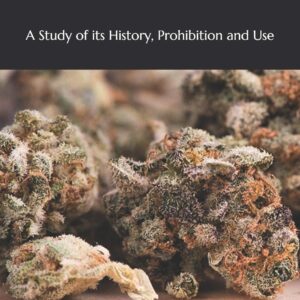
Cannabis: A Study of its History, Prohibition and Use
$14.99 Buy Now -

Cannabis: All that You Wanted to Know and May not have Known about Marijuana.
$14.15 Buy Now -
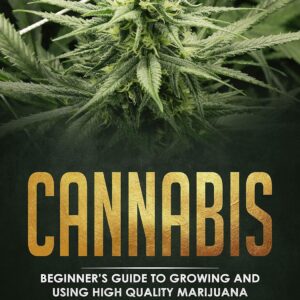
Cannabis: Beginner’s Guide to Growing and Using High Quality Marijuana
$4.99 Buy Now -

Cannabis: Growing Cannabis Indoors And Outdoors 2 Books BONUS Bundle Set: The Ultimate Simple Guide To Producing Top-Grade Dank Marijuana Cannabis Indoors … Growing weed, Growing marijuana Book 1)
$2.99 Buy Now -

Cannabis: Growing Cannabis Outdoors: The Ultimate Simple Guide To Producing Top-Grade Dank Marijuana Outdoors (How to grow weed, Growing marijuana outdoors, … book, Medical marijuana, Cannabis Book 1)
$3.49 Buy Now -

CANNABIS: Marijuana Growing Guide – Grow Lights (CANNABIS SCIENCE, Cannabis Cultivation, Grow Ops, Medical Marijuana Book 2)
$2.99 Buy Now -
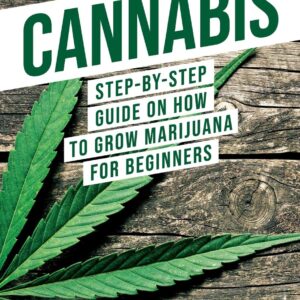
Cannabis: Step-By-Step Guide on How to Grow Marijuana for Beginners
$19.99 Buy Now -
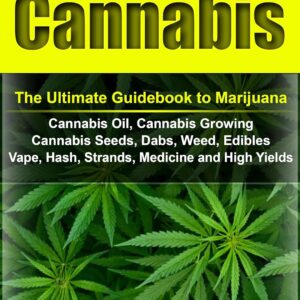
Cannabis: The Ultimate Guide to Marijuana, Cannabis Oil, Cannabis Growing, Cannabis Seeds, Dabs, Edibles, Vapes, Hash, Strands, Medicine and High Yields (Cannabis, Weed, Marijuana, Drugs)
$2.99 Buy Now -

Cannabis: The Untold Story of Our Greatest Plant
$4.99 Buy Now -
Sale!

Cannabolish Smoke Odor Eliminating Candle, 7 oz, Natural Ingredients, Wintergreen scent
$16.99Original price was: $16.99.$12.74Current price is: $12.74. Buy Now -
Sale!

Cannabolish Wintergreen Smoke Odor Eliminator Spray and Air Freshener, 8 fl. oz, Natural Ingredients
$23.98Original price was: $23.98.$11.99Current price is: $11.99. Buy Now -

Car Steering Wheel Cover Protector, Blue Cannabis Leaf Weed Plants Upgrade Thicken,Durable Soft Universal 15 Inch,Car Accessories for Diverse Cars for Men Women
$6.99 Buy Now -
Sale!

Carbon Lined Bags Airtight Waterproof Zipper Bag with Pocket Size, Durable Water Resistant Bag Portable Travel Pouch Great Gifts for Friends (Purple)
$18.99Original price was: $18.99.$9.99Current price is: $9.99. Buy Now -
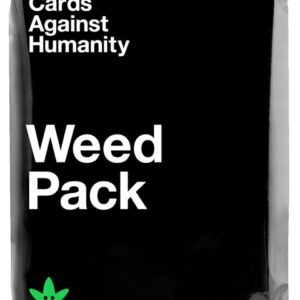
Cards Against Humanity: Weed Pack • Mini Expansion
$9.99 Buy Now -
Sale!

Carson MicroBrite Plus 60x-120x LED Lighted Pocket Microscope, Portable Handheld Microscope for Adults, Mini Microscope for Student Science Lab, STEM Educational Portable Microscope (MM-300)
$17.00Original price was: $17.00.$14.99Current price is: $14.99. Buy Now -

CASEMATIX Dice Tray and Dice Storage Case for Up to 115 RPG Dice – Dice Tray for Rolling with Magnetic Snaps, Embossed Tree of Life Design and Non-Scratch Interior for Random Rolls Dice Protection
$29.99 Buy Now -

Casual Scarf Bandana Loose Hat Stretch Headwear Beanie Hat
$13.99 Buy Now -
Sale!
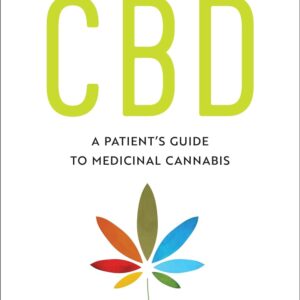
CBD: A Patient’s Guide to Medicinal Cannabis–Healing without the High
$21.95Original price was: $21.95.$16.95Current price is: $16.95. Buy Now -

CHEEMAR Rolling Tray Cone Loader for King Size&1 1/4 Size Pre Rolled Cone,Cute Decorative Cone Filler – Perfect for Home or Travel-7.28” x 3.74”
$9.98 Buy Now -

Chicken Pot Pie design Marijuana Cannabis Funny Pun design T-Shirt
$17.95 Buy Now -

ChoKoLids Budtender Dad Hat Cotton Baseball Cap Polo Style Low Profile
$19.99 Buy Now -

Cigarette Rolling Machine Filter Tips – Rolls King Size & 78mm Paper Fits Easily On Rolling Tray Rolled Cone Loader Funnel Tool Load Raw Tobacco Evenly in Seconds Easy Packing Perfect for Glass Tips
$4.99 Buy Now -
Sale!

CiyvoLyeen Rolling Black Drawstring Bag with Felt DND Dice Tray – Perfect for RPG Players, Tabletop Gamers, DND Accessories Gifts – Ideal for Jewelry, Coins, Keys
$38.95Original price was: $38.95.$13.99Current price is: $13.99. Buy Now -

Clear Zip Bags 14 x 16 Inch. Pack of 100 Plastic Reclosable Zipper Bags 2 Mil. Resealable Plastic Bags. Waterproof Poly Bags Reclosable. Baggies for Weed, Pills, Jewelry, Samples
$34.99 Buy Now -

Cloudstyle Men’s Dress Floral Suit Notched Lapel Slim Fit Stylish Blazer Dress Suit
$60.99 Buy Now -

CO2 Bags for Grow Tent – Set and Forget Generator Plants | Mushroom Bag Booster, Great Indoor Growing Rooms Preactivated 5LB
$34.21 Buy Now -

Coco For Cannabis: A Grower’s Guide
$11.99 Buy Now -
Sale!

Colorful Pre Rolled Cones | Colorful Rolling Papers |100 Pack(4.2inches/108mm) Colorful King Size Pre Rolled Cones | Pre-Rolled Cones | Rolling Papers Cones | Rolling Paper with Tips |
$21.00Original price was: $21.00.$6.99Current price is: $6.99. Buy Now -
Sale!

Colorful Pre Rolled Cones King Size 100 Pack, Natural Unbleached Cones Rolling Paper with W-shaped Tips, Slow & Even Burning Preroll Cones Packing Tubes Included for Party Gift (109mm)
$99.99Original price was: $99.99.$9.99Current price is: $9.99. Buy Now -

COLSEN Smell Proof Resealable Bags – Matte Black Mylar Bag 3×4 Inches (1oz) Strong Zipper Seal Clear Window Pouch for Food Storage, Candy, Snacks, Jewelry, Pills, Party Favors Packaging (100pack)
$10.99 Buy Now -

Combo Storage Box – Multipurpose Decorative Box with Removable Tray, Magnetic Lock, 2 Glass Jars – Bamboo Box (Natural Box) (Foldable Tray)
$19.99 Buy Now -
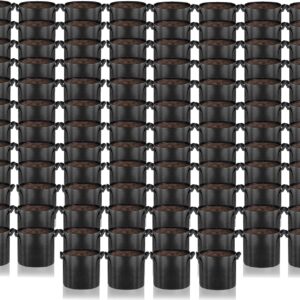
Commercial Grade Grow Bags – Pack of 100 15 Gallon Fabric Planters with Aeration and Handles, Perfect for Cannabis Cultivation
$289.99 Buy Now -

Complete Cannabis Grower’s Handbook : Quick and Easy Marijuana Cultivation for Beginners
$9.99 Buy Now -

Composition Notebook: A Vibrant Journal for the Free-Spirited Cannabis Enthusiast
$5.99 Buy Now -

Composition Notebook: Pink girly cannabis composition book
$6.99 Buy Now -
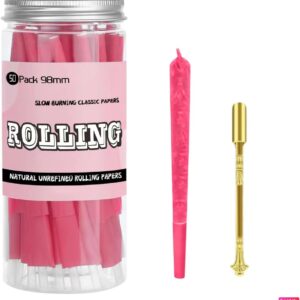
Cones Rolling Paper Pre Rolled Cones 98mm | Special Size | 50 Pack | Natural Rolling Papers with Tips & Golden Packing Spoon Kit (Special Size, 50)
$6.99 Buy Now -

Cones Rolling Papers Pre Rolled Cones 1 1/4 Size – 50 Pack Preroll Pre Rolls Paper with Filter Tips and Packing Tubes Included
$7.99 Buy Now -

Cones Rolling Papers Pre Rolled Cones King Size – 100 Pack Colorful Preroll Pre Rolls Paper with Filter Tips and Packing Tubes Included
$9.99 Buy Now -

Cones Rolling Papers Pre Rolled Paper Cones 1 1/4 Size – 100 Pack Preroll Pre Rolls Paper with Filter Tips and Packing Tubes Included
$9.99 Buy Now -

Considering Cannabis: The Mass Suffering of Humanity Depends On It!
$1.99 Buy Now -

COOFANDY Men’s Muscle T-Shirt Pleated Raglan Sleeve Bodybuilding Gym Tee Short Sleeve Fashion Workout Shirts Hipster Shirt
$23.99 Buy Now -
Sale!

Cool Jay’s Menthol Rolling Papers 6 Pack 1.5, White
$51.99Original price was: $51.99.$4.97Current price is: $4.97. Buy Now -
Sale!
![COOL KNIGHT Herb Grinder [large capacity/fast/Electric ]-Spice Herb Coffee Grinder with Pollen Catcher/- 7.5" (Black)](https://mscannabiz.com/wp-content/uploads/2024/05/61ds5SPU0rL._AC_SL1500_-300x300.jpg)
COOL KNIGHT Herb Grinder [large capacity/fast/Electric ]-Spice Herb Coffee Grinder with Pollen Catcher/- 7.5″ (Black)
$51.97Original price was: $51.97.$21.99Current price is: $21.99. Buy Now -

Cool Stoner Bear Polyresin Ashtray for Smoker Gifts – 4″x6″
$13.99 Buy Now -

Copco Coffee Cab Rolling Countertop Small Appliance Stand – 2555-0217,Black
$17.99 Buy Now -

Copper Tobacco Pipes Nozzle Tamper Flameout Prevention Tobacco Smoking Pressure Rod Tool (Skeleton)
$14.99 Buy Now -

Cottagecore Mushroom Mycologist Goblincore T-Shirt
$18.95 Buy Now -
Sale!

Could Be Makeup Could Be Weed Funny Makeup Bag Friend Gifts Funny Weed Leaf Cosmetic Bag Travel Accessories Organizer Bag Toiletry Case For Women Best Friends Sister Weed Gifts(Balck)
$9.99Original price was: $9.99.$5.99Current price is: $5.99. Buy Now -

Crazy Dog Mens Callahan Auto Parts T Shirt Funny Graphic Novelty Tee
$12.99 Buy Now -

Crop Steering/Stress Steering 101 and Indoor Commercial Cannabis Cultivation Practices: based on one-gallon Coco and Athena Pro Line Salts for indoor cultivation with LED’s
$14.74 Buy Now -
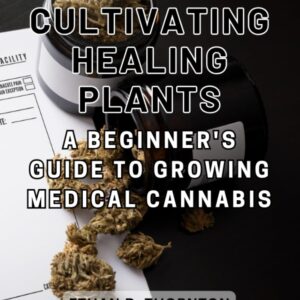
Cultivating Healing Plants: A Beginner’s Guide to Growing Medical Cannabis: Navigate the World of Medical Marijuana Cultivation with Confidence and Responsible Practices
$12.95 Buy Now -

Curious About Cannabis (3rd Edition): A Scientific Introduction to a Controversial Plant (Cannabis Science Textbook)
$54.99 Buy Now -

Curious About Cannabis Educator Workbook: Games, Activities, Lessons and Resources for Cannabis Educators
$17.25 Buy Now -
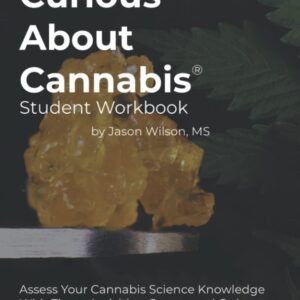
Curious About Cannabis Student Workbook: Exercise Your Cannabis Science Knowledge With Activities, Games, Experiments and Quizzes
$14.20 Buy Now -

Custom Baseball Cap with Your Text,Personalized Adjustable Trucker Caps Casual Sun Peak Hat for Gifts
$6.00 Buy Now -

Custom Faces T-Shirt for Men, Customized Funny Picture Shirts for Dad Husband Boyfriend, Personalized Tee Great Gift
$19.99 Buy Now -

Cute Pink Cartoon Metal Rolling Tray 7”x5.5” – Perfect Smoke Accessories for Rolling Papers, Grinders, Set and PreRolled Cones – Original Custom Fan Art
$14.95 Buy Now -

Cute Puzzles for Women Be Kind to Your Mind Vintage Cannabis Art Cannabis Marijuana Love Weed Art Jigsaw Puzzles Family Puzzle to Enjoy Decompression Education Gift Intellective Game 1000 Pieces
$21.99 Buy Now -
Sale!

Cute Rolling Tray Pink Metal Tray, Metal Small Tray, Premium Storage Tray, 7.1×5.51inches
$9.99Original price was: $9.99.$7.99Current price is: $7.99. Buy Now -

Cybrtrayd Life of the Party Bud Vase Flower Chocolate Candy Mold in Sealed Protective Poly Bag Imprinted with Copyrighted Cybrtrayd Molding Instructions
$8.95 Buy Now -

Cybrtrayd Life of the Party F075 Rose Bud Flower Chocolate Candy Mold in Sealed Protective Poly Bag Imprinted with Copyrighted Cybrtrayd Molding Instructions ,
$8.95 Buy Now -

De Luxe Rolling Paper Pack of 24
$29.99 Buy Now -

Decorative Metal Tray Set – Includes Foldable Stand & Accessories, Multi-Functional Large Tray with Stylish Pattern
$12.99 Buy Now -

Decorative Serving Tray for Bathroom, Small Jewelry Tray, Black Jewelry Bowl Dish 8.9′
$9.48 Buy Now -
Sale!

Decorative Tray Metal Tray Set Includes Foldable Stand and Accessories,Multi-Functional Large Tray with Cool Pattern,11.9″x6.5″
$29.99Original price was: $29.99.$14.99Current price is: $14.99. Buy Now -
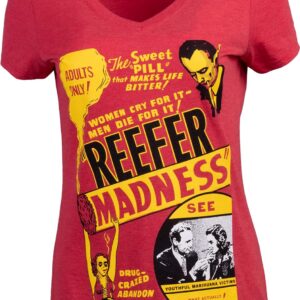
Devil’s Harvest (1942 Poster) | Funny Absurd Vintage Drug War Marijuana Weed Pot Propaganda Women’s V-Neck T-Shirt
$14.99 Buy Now -

DiBanGu Mens Long Sleeve Dress Shirts,Classic Button Down Dress Shirt Regular Fit Casual Cotton Shirt Formal Business
$31.99 Buy Now -

Dice Rolling Tray, Felt Lined PU Leather Octagon Dice Tray for Dungeon Crawler Games, Red
$22.95 Buy Now -

Dime Bags – Outfit – Carbon-Lined Waist Bag with Combination Lock (Black)
$59.99 Buy Now -
Sale!

DIME BAGS All-in-One Padded Pouch with and Carbon Filter
$52.99Original price was: $52.99.$16.99Current price is: $16.99. Buy Now -

DIME BAGS Goodfella with Lock | Carbon Filter Locking Padded Pod | Activated Carbon Technology and TSA-Approved Combination Lock
$54.99 Buy Now -

DIME BAGS Omerta Boss with Lock Padded Pouch with Activated Carbon Technology | 3-Digit Combo Lock | Low-Profile, Sleek Design
$29.99 Buy Now -

Dish Packing Kit Glassware Moving Supplies for Friagle Items 15″x500′ Honeycomb Packing Paper Roll Recyclable Moving Paper with Fragile Stickers Alternative to Bubble Cushioning Wrap for Shipping
$35.99 Buy Now -
Sale!

Dish Packing Kit Moving Supplies 15″ x660′ Honeycomb Wrapping Paper, Large Recyclable Expandable Bubble Cushion Wrap Roll Packing Material for Fragile Items Breakables Plate Glassware Bottle, 80GSM
$65.89Original price was: $65.89.$49.99Current price is: $49.99. Buy Now -
Sale!

Diteje Kitchen Appliance Sliding Tray,Appliances Rolling Slider Moving Caddy Under Cabinet Countertop Compatible with Ninja Grill,KitchenAid Stand Mixer,Keurig Coffee Maker,Instant Pot,Blender
$34.99Original price was: $34.99.$22.99Current price is: $22.99. Buy Now -
Sale!

DIY Autoflowering Cannabis: An Easy Way to Grow Your Own (Homegrown City Life, 7)
$29.99Original price was: $29.99.$27.89Current price is: $27.89. Buy Now -

Dlite 1¼ Size Pre-Rolled Cones, 150 Pack, 84 MM, Unbleached Natural Rolling Paper, Vegan, Classic Pre rolled paper with Tip, Includes Packing stick
$12.99 Buy Now -

Dlite King Size Pre-Rolled Cones, 100 Pack, 109 MM, Unbleached Natural Rolling Paper, Vegan, Classic Pre rolled paper with Tip, Includes Packing stick
$9.99 Buy Now -
Sale!

DMI Walker Tray, Rollator Tray, Mobility and Walker Accessory Tray Table Fits Most Standard Walkers, Folding with Two Cup Holders and Tool Free Assembly, 16 x 11.8 inch
$44.99Original price was: $44.99.$29.99Current price is: $29.99. Buy Now -

DOCILA Fashion Women’s White Bucket Hat Men’s Foldable Green Leaf Print Sunshade Cap Two Sided Travel Fisherman Hat
$13.99 Buy Now -
Sale!

Dog Lover Gifts Cute Makeup Bag Accessories for Women Girl Funny Dog Mom Gifts Cosmetic Bag for Female Her Girl Niece Travel Toiletry Bag for Dog Owner
$11.99Original price was: $11.99.$8.99Current price is: $8.99. Buy Now -
Sale!

Dreo 4L Smart Humidifiers for Bedroom, Quiet Supersized Cool Mist Ultrasonic Humidifier with Diffuser and Nightlight, 32 Hour Long Runtime for Home, Indoor, Nursery, Plant(Black)
$63.95Original price was: $63.95.$61.06Current price is: $61.06. Buy Now -
Sale!

Drive Medical 13067 Non Tilt Top Overbed Table with Wheels and Secure Height Adjustment,Tray Table for Hospital or Home Use, Bedside Rolling Overbed Table, Silver Vein
$99.99Original price was: $99.99.$54.98Current price is: $54.98. Buy Now -

DTK 3 Tier Metal Utility Rolling Cart with Table Top and Side Bags, Tray Storage Organizer Wheels, Art Craft 4 Hooks for Kitchen Bathroom Office Living Room (Black)
$35.00 Buy Now -

DUDHUH Mens Hoodie Fashion Pullover Letter Print Tracksuit Techwear Casual Coat Hip-Hop Sweatshirt
$39.99 Buy Now -

E-Z Wider Bamboo Cigarette Rolling Paper 1 1/4 (78mm) – Box of 24
$46.84 Buy Now -

E-Z Wider Bamboo Cigarette Rolling Paper 1 1/4 (78mm) – Pack of 5
$15.99 Buy Now -

E-Z Wider Organic Hemp Cigarette Rolling Paper 1 1/2 – Pack of 5
$15.99 Buy Now -
Sale!

Easter Art Easel Paper Roll for Crafts, Drawing & Painting, 17.75″x1200″ (100′) White Gift Wrapping Craft Kraft Bulletin Board Poster Banner Coloring Paper, Kids Art Supplies, Wedding Floral Supplies
$14.99Original price was: $14.99.$9.99Current price is: $9.99. Buy Now -

Eco Friendly Honeycomb Packing Paper, 15″ x 820′ Honeycomb Cushioning Wrap Roll for Moving Shipping Packaging Gifts, Recyclable Paper Bubble Wrap Alternative
$60.99 Buy Now -
Sale!

Edibles: Small Bites for the Modern Cannabis Kitchen
$19.95Original price was: $19.95.$17.91Current price is: $17.91. Buy Now -

Egooz Large Smell Proof Stash Bags with 11 items – Waterproof Smell Proof Containers Case for Travel and Home, Kitchen Smell Proof Box for Storing Your Products, Grey
$29.95 Buy Now -
Sale!

ELAFROS Tool Creeper Rolling Tool Tray With 4 Swivel Casters Caddy Tray For Automotive, Mechanics, DIY enthusiasts, and garages,55 lbs Capacity
$49.99Original price was: $49.99.$29.99Current price is: $29.99. Buy Now -
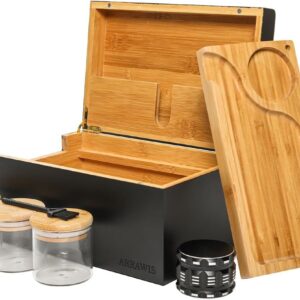
Elegant Bamboo Storage Box with Removable Tray and Glass Jars – Perfect for Tea, Coffee, and Small Items Stylish Decorative Organizer with Magnetic Lid – Ideal Gift for Home or Office Use
$39.99 Buy Now -

Elements 1 1/4 Rice Paper Pre-Rolled Cones (900 Pack)
$68.93 Buy Now -

Elements 1.25 1 1/4 Size Ultra Thin Rice Rolling Paper Full Box Of 25
$18.50 Buy Now -

Elements 1.25 1 1/4 Size Ultra Thin Rice Rolling Paper, 50 Count (Pack of 10)
$9.99 Buy Now -
Sale!

ELEMENTS 300 Ultra Thin Rice Rolling Paper 1.25 1 1/4 Size, 1 Pack = 300 Leaves
$4.69Original price was: $4.69.$4.27Current price is: $4.27. Buy Now -
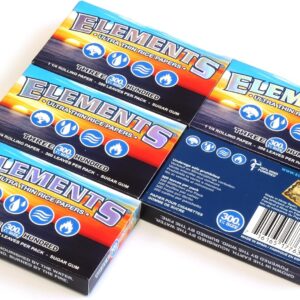
ELEMENTS 300 Ultra Thin Rice Rolling Paper 1.25 1 1/4 Size, 5 Pack = 1500 Leaves
$9.99 Buy Now -
Sale!
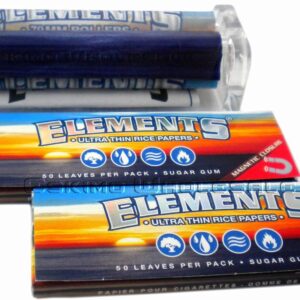
Elements 79mm Cigarette Rolling Machine + 2 Packs of Elements Ultra Thin Rice 1¼ Rolling Papers
$49.98Original price was: $49.98.$5.86Current price is: $5.86. Buy Now -

Elements Cones King Size | 50 Pack | Natural Pre Rolled Rice Rolling Paper with Tips and Packing Sticks Included
$13.99 Buy Now -

Elements King Size Slim Ultra Thin Rice Rolling Paper Full Box of 50 Packs
$27.90 Buy Now -

Elements PINK Connoisseur Thin King Size Slim Papers + Tips – 5 booklets
$9.99 Buy Now -

Elements PINK size 1 1/4 rolling paper – 10 booklets / 500 papers
$8.69 Buy Now -

Elements Pre-Rolled Filter Tips Prism Design – Perforated – 10 Pack Bonus ESD Scoop Card – 50 Tips Per Pack = 500 Tips – Rolling in Style
$8.99 Buy Now -
Sale!
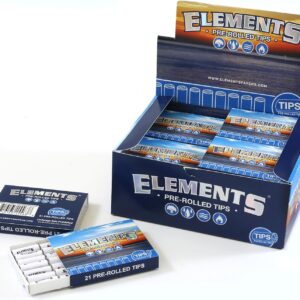
Elements Pre-Rolled Tips – 20 Pack with 21 Tips per Pack
$21.34Original price was: $21.34.$17.85Current price is: $17.85. Buy Now -

ELEMENTS Premium Rolling Tips box of 50
$18.00 Buy Now -

Elements Single Wide Rice Thin Cigarette Rolling Papers, Sugar Gum, 100 Count (Pack of 25)
$21.98 Buy Now -
Sale!

ELEMENTS Slim King Size ULTRA THIN RICE rolling paper – 5 booklets, total 160 papers
$9.99Original price was: $9.99.$7.89Current price is: $7.89. Buy Now -

Elements Ultra thin King Size Slim PINK rolling paper – 5 booklets / 160 papers
$5.64 Buy Now -

Elements Ultra Thin Rice Connoisseur King Size Slim With Tips Rolling Paper 5 Pack
$9.91 Buy Now -

Elements Ultra Thin Rice Rolling Papers – King Size Cones 40 Per Pack (1 Pack)
$9.05 Buy Now -

Elements Ultra Thin Rice Rolling Papers – King Size Roller 110mm Rolling Machine (1 Roller)
$6.99 Buy Now -

Elements Ultra Thin Rolling Paper Cones King Size | 100 Pack | Pre Rolled with Tips and Packing Tubes Included
$21.99 Buy Now -
Sale!

Empire Rolling® Benny Original 4-Pack – King Size Ultra-Thin Rolling Papers with Tips, $100 Bill Design, Natural Fibers, 111mm x 44.5mm (80 Papers + 80 Tips)
$9.99Original price was: $9.99.$9.49Current price is: $9.49. Buy Now -

Encouragement Gifts for Women Inspirational Gifts Makeup Bag Funny Birthday Gift for Sister Cosmetic Bag Motivational Gift for Best Friend Travel Cosmetic Pouch Graduation Christmas Gift
$7.99 Buy Now -

Enjoy The Harvest: A simple Guide To Cannabis Consumption
$2.99 Buy Now -
Sale!

EOOXEKFX Weiliya UNRRZLCA Kitchen Drawer Organizer Tray,Drawer Organiser,Cutlery Tray,Expandable Utensil Tray for Kitchen,Compact Plastic Storage Organisation for Spoons
$26.98Original price was: $26.98.$19.99Current price is: $19.99. Buy Now -

Epakh 2 Pack Blank Paper Scrolls 9 x 144 Inches Wrapped on Wood Rod for Writing, Drawing, Calligraphy, Wedding Vows, Cosplay Prop, Renaissance Festivals, Tabletop Role Playing Game(Old Color)
$16.99 Buy Now -

Epulse Smell Proof Box, Smell Proof Bag Case, Stash Containers, Small Lock Box, Vape Case, Pouch Travel, Smellproof Stash Bag for Accessories, Anti Smell Bags (8×6 in, Grey)
$24.99 Buy Now -

Evil Smile Face Graphic Novelty Sarcastic Funny T Shirt
$14.95 Buy Now -

Exodus Storage Travel Bag with Combination Lock Water Resistant Organizer Case Toiletry Bag Dopp Kit Makeup or Toiletry Bag for Men & Women (Grey)
$39.99 Buy Now -
Sale!

EZ WIDER 1 1/2 Rolling Papers 24 BOOKLETS
$53.70Original price was: $53.70.$47.69Current price is: $47.69. Buy Now -

Fantasy Gifts, Ornament, Alien Smoking Ashtray, Home Décor, Multicolor, 4 inches
$11.99 Buy Now -
Sale!

Farkel Game Set with Deluxe Dice Rolling Tray, Built-in Dice-Collection Channel, 2 Sets of Dice, 40-Sheet Scorepad, Classic Family Game
$29.99Original price was: $29.99.$26.99Current price is: $26.99. Buy Now -
Sale!

FASTPACK | Natural Pre Rolled Rolling Paper with Tips & Packing Tubes Included
$51.99Original price was: $51.99.$11.97Current price is: $11.97. Buy Now -

Father The Noble Element Joke Humor Step Father Funny T Shirt
$14.99 Buy Now -

FERENLI 100 Pcs Mylar Zipper Lock Bag Food Storage Matte Foil Airtight Bags with Front Window Plastic Candy Packaging Pouch for Zip Flat Heat Seal Lock Resealable (7.5x10cm (3×3.9 inch), Black)
$9.39 Buy Now -

FERENLI 100 Pieces Stand Up Clear Front Zipper Lock Resealable Aluminum Mylar Foil Plastic Packaging Bag for Zip Heat Seal Package Lock with Tear Notch Long Term Food Storage 3.5×5.5 inch
$9.89 Buy Now -

Fiber optic cap LED hat with 7 colors luminous glowing EDC baseball hats USB Charging light up caps even party led Halloween cap for event holiday
$39.95 Buy Now -

FIREDOG Mini Smell Proof Backpack with Lock for Men Women, Smell Proof Bookbag for Travel (Black)
$36.99 Buy Now -
Sale!

FIREDOG Mini Smell Proof Backpack with Lock, Smell Proof Bag for Men Women Travel (Grey)
$75.00Original price was: $75.00.$36.99Current price is: $36.99. Buy Now -
Sale!

FIREDOG Odor Proof Bags, Smell Proof Pouch Carbon Lined Travel Stash Storage Smellproof Bags (Grey, 6.5″x4″)
$18.99Original price was: $18.99.$12.99Current price is: $12.99. Buy Now -
Sale!

FIREDOG Smell Proof Backpack with Lock for Men Women Travel (Pink, 9.5x5x13 Inch)
$119.89Original price was: $119.89.$41.99Current price is: $41.99. Buy Now -

FIREDOG Smell Proof Bag with Combination Lock, Large Odor Proof Case Containers Pouch for Travel Storage(Gray)
$34.99 Buy Now -

FIREDOG Smell Proof Bag, Dog Tested Stash Smell Proof Case Big Odor Proof Pouch for Travel Storage 9x4x5 Inch (Grey)
$18.99 Buy Now -
Sale!

FIREDOG Smell Proof Bag, Odor Proof Pouch Dog Tested Mini Stash Crossbody Bags for Travel Storage(Bright Blue)
$79.00Original price was: $79.00.$15.99Current price is: $15.99. Buy Now -
Sale!

FIREDOG Smell Proof Bags, Carbon Lined Odor Proof Bag for Dog Tested 3″x6″ Stash Travel Storage Pouch Pocket (Black)
$19.99Original price was: $19.99.$11.99Current price is: $11.99. Buy Now -

Flat Bill Hats – Original Baseball Cap Marijuana Cannabis Weed Pot 420 Hat Premium Flat Snapback
$27.00 Buy Now -

Flat Mylar Bags Zipper Lock Foil Bag 4 Mil Silver for Zip Food Storage Lock Resealable Aluminum Mylar Pouch Heat Sealable with Tear Notch (100, 3.3×5.5 inch)
$19.27 Buy Now -

Flavor Rolling Papers, 1 1/4 Size Mixed Ultra Thin Rolling Paper, Individual Sealing Bag Strong Smell, Fruit Attraction Fragrance(7 Packs)
$8.99 Buy Now -

Flavored Pre Rolled Cones | 1 1/4 Size | 60 Pack Colorful Rolling Paper with “W” Filter Tip & Assorted Fruit Flavor Pop Beads | Slow Burn for Easy Filling (K8499B)
$13.98 Buy Now -

Flavored Pre Rolled Pop Cones | Pack of 30 | 6 different flavors | 84mm | Filter Tip with Bursting Flavor Bead for Enhanced Smoking Experience | Just pop it
$11.98 Buy Now -

Flavored Pre-Rolled Pop Cones | 1 1/4 Size | 30 Pack | Orange Rolling Paper | “W” Filter Tip | Easy to Use and Convenient (K8333)
$11.98 Buy Now -

Flavored Rolling Papers Kit | Flavoured Rolling Papers With 6 Different Fruit | 100’s Plastic Cigarette Case | Glass Filter Tip
$9.99 Buy Now -

Flavored Rolling Papers With Glass Filters, Mix Fruit Flavoured King Size Cigarette Paper, 320 PCS Unbleached and Juicy Rolling Papers (10 Juicy Fruit Flavors)
$8.99 Buy Now -

Flavored Rolling Papers with Tips, 15 Gums 750 PCS King Size Papers, Random Mix Flavors (110mm)
$15.99 Buy Now -

Flavored Rolling Papers, King Size Flavored Rolling Paper With 6 Kind Different Fruit, Individually Sealed Packaging (6packs-flavors)
$7.99 Buy Now -

Flavored Rolling Papers, Kingsizeslim 8 Pack Mixed Ultra Thin Rolling Paper, Individual Sealing Bag Strong Smell, Fruit Attraction Fragrance, With Tips
$8.99 Buy Now -
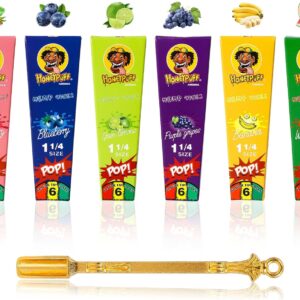
Flavoured Pre Rolled Cones With Pop Filter Tips | 6 Different Flavors | 1 1/4 Size Flavored Pre Rolling Cones, Filter Tip with Bursting Flavor Bead (1 1/4 Size, 6 Different Flavors), White
$8.99 Buy Now -
Sale!

FLEXISPOT H7 Adjustable Overbed Bedside Table with Wheels Pneumatic Mobile Standing Desk Laptop Desk Rolling Computer Cart Movable Overbed Table Hospital Home Use(27.6″ W x 15.7″ D, White)
$99.99Original price was: $99.99.$79.99Current price is: $79.99. Buy Now -
Sale!

FLEXISPOT H7 Adjustable Overbed Bedside Table with Wheels Pneumatic Mobile Standing Desk Laptop Desk Rolling Computer Cart Movable Overbed Tables Hospital Home Use(27.6″ W x 15.7″ D, Black Table)
$119.99Original price was: $119.99.$82.99Current price is: $82.99. Buy Now -
Sale!

Flyhill Red Kraft Paper Roll-12in x 100FT(100sqft)-Recyclable Paper Roll for Valentient’s Day,Craft Studio,Packing, Floor Covering,Dunnage,Parcel,Table Runner
$15.90Original price was: $15.90.$9.99Current price is: $9.99. Buy Now -

FMOST Weed Stickers, 50pcs Adults Vinyl Waterproof Stickers for Laptop, Water Bottles, Bumper,Computer, Phone, Stickers and Decals
$3.99 Buy Now -
Sale!

Foldable Metal Rolling Tray, Large Purple Multi-Purpose Folding Metal Tray, 9.4 x 4.13 inches Table Organizer Kit Including Tools Packer Brush Plugs Purple Leaf
$12.99Original price was: $12.99.$9.99Current price is: $9.99. Buy Now -

FONIRRA Hi Vis Safety T Shirts for Men Class 2 ANSI Reflective High Visibility Short Sleeves Work Shirt
$23.99 Buy Now -
Sale!

FONIRRA Safety Reflective High Visibility T Shirts for Men with Long Sleeve Construction Work Shirts ANSI Class 3(Blue,XL)
$27.99Original price was: $27.99.$26.59Current price is: $26.59. Buy Now -
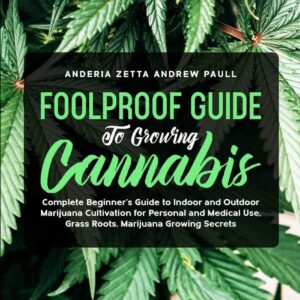
Foolproof Guide to Growing Cannabis: Complete Beginner’s Guide to Indoor and Outdoor Marijuana Cultivation for Personal and Medical Use, Grass Roots, Marijuana Growing Secrets
$19.89 Buy Now -

Formline Smell Proof Bag (7×6 inches) with Double the Odor Proof Technology – Scent Proof Pouch Eliminates All Scents. Perfect for Travel and Easily fits into Backpack or Purse
$18.99 Buy Now -

FoxFarm BushDoctor Cal-Mag Pint
$14.09 Buy Now -
Sale!
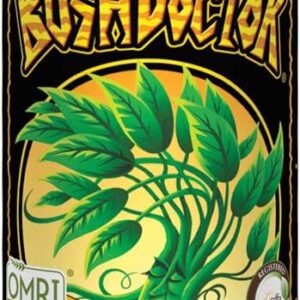
FoxFarm BushDoctor Cal-Mag Quart
$24.99Original price was: $24.99.$19.70Current price is: $19.70. Buy Now -

Foxfarm Cultivation Nation PH Down – 1 Qt.
$17.36 Buy Now -

FoxFarm Cultivation Nation PH Up Quart
$27.99 Buy Now -
Sale!

FoxFarm FX14910 Cultivation Nation, 1 pt Bloom
$9.95Original price was: $9.95.$9.01Current price is: $9.01. Buy Now -

FoxFarm FX15001 Cultivation Nation, 1 lb Veggie, 1 Pound
$12.98 Buy Now -

FoxFarm FX16001 Cultivation Nation, 1 lb Flower
$12.73 Buy Now -

Free Boy 4 Pieces-Black Rolling Tray Set with Spout for Easy Filling and Accessories 7.7″ x 5.5″, Small, Cute
$8.99 Buy Now -

Free Boy 72 Pack Colorful Pre Rolled Cones,King Size Cones Rolling Papers with Tips,Vegan & Smooth Burning
$8.99 Buy Now -
Sale!
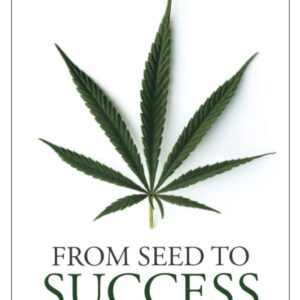
From Seed to Success: How to Launch a Great Cannabis Cultivation Business in Record Time
$34.95Original price was: $34.95.$28.67Current price is: $28.67. Buy Now -

Fruit Flavored Paper Cones 72 Pack King Size Papers Cones with Tips & Packing Tubes Included, Natural Flavor and Chemical-Free Quality Accessories (Watermelon)
$12.99 Buy Now -

Funfery 100 Pack Black Mylar Packaging Bags Resealable Bags Double Sided Color Odor Proof Pouch Baggies Smell Proof Foil Bag for Food Storage,Small Business(Black,3x4inch)
$7.99 Buy Now -
Sale!

Funfery 100 Pack Gradient Holographic Bags,Mylar Resealable Bags with Zipper,Clear Window Packaging Pouch,Smell Proof Bag for Food Storage,Sample Jewelry Baggies(2.7×3.9in,White Black)
$6.99Original price was: $6.99.$6.29Current price is: $6.29. Buy Now -

Funfery 100 Pack Resealable Holographic Bags, Smell Proof Packaging, Mylar Food Storage, Zipper Sealing Bags for Coffee Beans, Cookies, Jewelry – Black, 3×4.7in
$6.99 Buy Now -

Funfery 100 pcs Black Mylar Holographic Bags Packaging Bags,Clear Resealable Bag Foil Pouch Bag for Food Storage and Lipgloss,Jewelry,Eyelash Packaging for Small Business(2.4×3.9Inch)
$6.99 Buy Now -

Funfery 300 Pack 3 Size Mylar Holographic Bags with Clear Window,Resealable Bag Smell Proof Bags Zipper Foil Baggie Packaging Pouch for Food Storage,Sample,Small Business(Black,3×4.7,4×6,4.7×7.9in)
$16.99 Buy Now -

FUNFERY Mylar Resealable Bags Foil Packaging Bags with Clear Window,Zipper Pouch Smell Proof Bag for Food Storage,Cookies,Sample,Small Business(Black,2.4×3.9inch)-98 Pack
$5.79 Buy Now -

Funky Junque Foam Trucker Hat
$19.99 Buy Now -

Funny Bear Smoking Weed Cannabis Marijuana 4:20 Stoner Gift T-Shirt
$16.99 Buy Now -

Funny Leaf Makeup Bag Gift for Mom Women Sister Makeup Lover | Cute Mom Makeup Zipper Pouch Bag Cosmetic Travel Accessories Bag Toiletry Case Humor Gifts for Mother’s Day Birthday Christmas
$9.99 Buy Now -

Funny Leaf Makeup Bag Gift for Women Best Friends Sister Teen Girls | Cute 100% akeup Zipper Pouch Bag Cosmetic Travel Accessories Bag Toiletry Case Gifts for Birthday Christmas
$9.99 Buy Now -

Funny Metal Bathroom Signs Funny Marijuana Signs Dispensary Decor Ca-nna-bis Gift Weed Gift Tin Sign Chic Art Wall Metal Decorations Funny Iron Plaque Signs Gift for Living Room Office 12×8 inch
$9.99 Buy Now -

Funny Retirement Birthday Thanksgiving Gifts Baseball Cap, Don’t Forget My Senior Discount Hat for Dad Grandpa Elders Father’s Grandparents Beige
$19.99 Buy Now -
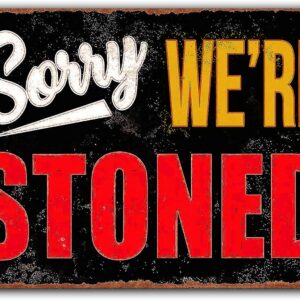
Funny Weed Decor Humor Man Cave Garage Bar Signs, Sorry We’re Stoned, Vintage Metal Tin Sign Smoking Marijuana Home Décor 8×12 Inch
$8.98 Buy Now -
Sale!

Funny Weed Gift Leaf Makeup Bag Cat Lover Gifts Cosmetic Bag for Women Nurse Cat Themed Gifts Zipper Pouch Bag Cat Lady Gifts Weed Stuff Weed Accessories Travel Toiletry Bag for Birthday Christmas
$7.99Original price was: $7.99.$6.99Current price is: $6.99. Buy Now -

Funny Weed Gnome Cannabis Marijuana T-Shirt
$15.99 Buy Now -

Galaxy S10 I’m A Grower Not a Shower Funny Cannabis Cultivation Case
$17.99 Buy Now -
Sale!

Generic Pre Rolled Cones | 60 Pack Natural Fibers Rolling Papers | Classic King Size (1.25-inch) | Tips & Packing Tubes Included (60PCS-Mixed)
$9.79Original price was: $9.79.$6.99Current price is: $6.99. Buy Now -
Sale!

Generic Pre Rolled Cones | 60 Pack Pink Cones Rolling Papers | Classic King Size | Tips & Packing Tubes Included
$53.73Original price was: $53.73.$8.98Current price is: $8.98. Buy Now -

Genuine Fred Super Useful Tray, Mushrooms by Helen Dardik, Melamine Rolling Tray
$20.00 Buy Now -

Gift for Planet Fans, Grinder
$16.88 Buy Now -
Sale!

Glass Clear Rolling Papers 1 1/4 – Full Box – 24 Booklets – 50 Papers per booklet, 100% Natural
$55.00Original price was: $55.00.$15.76Current price is: $15.76. Buy Now -
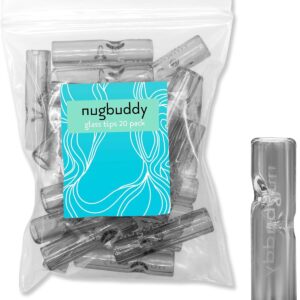
Glass Tips for Joints – 8mm Reusable Glass Rolling Tips – Mouthpiece Filter Crutch Fits in Rolling Machines – 20 Pack
$9.99 Buy Now -

Goblincore Aesthetic Magic Fungi Mushroom Skull Relax T-Shirt
$18.99 Buy Now -
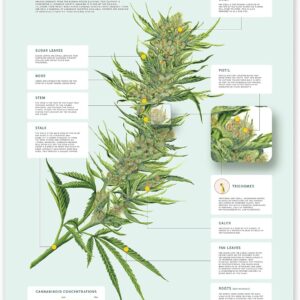
Goldleaf Anatomy of Cannabis Print, Infographic Marijuana Plant Poster, Weed Illustration Wall Art, Educational Dispensary Decor, Unframed (24×36)
$56.99 Buy Now -

Goldleaf Cannabinoid Molecular Structures Chart Print, Minimalist Cannabinoid Chemical Structure Poster, Cannabis Science Art, Cannabinoid Education Poster (18×24)
$49.99 Buy Now -

Goldleaf Grow Planner: A Cannabis Grower’s Weekly/Monthly Journal Planner, Marijuana Growing Notebook, Essential Growing Supplies, A5 Size
$35.00 Buy Now -

Goldleaf Terpene Molecular Structures Chart Print, Minimalist Terpene Chemical Structure Poster, Cannabis Decor, Science Wall Art, Terpene Education Infographic (24×36)
$56.99 Buy Now -
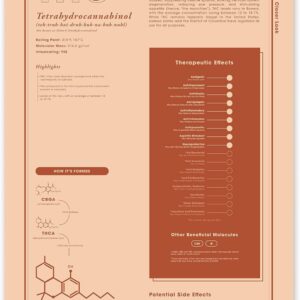
Goldleaf THC Infographic Print, Cannabinoid Education Poster, Tetrahydrocannabinol Chart, Dispensary Decor, Minimalist Cannabis Wall Art, Unframed (THC, 24×36)
$56.99 Buy Now -

GOMMO 50 Pack Pre Rolled Cones King Size Cones Rolling Paper 109mm Natural Purple Rolling Papers with Golden Packing Spoon Included
$6.99 Buy Now -

Good Luck Sock Men’s Marijuana Socks, Adult
$10.95 Buy Now -

GORDON Shorty Cones Rolling Papers, Colorful Pre Rolled Cones, 53mm Mini Rolling Paper, Natural Slow Burning Preroll Cones, 105 Pack
$13.99 Buy Now -

Gorilla Supply Thermal Paper Receipt Roll 3-1/8″ x 230′ BPA Free 50 Rolls
$62.99 Buy Now -
Sale!

Grafix Edge Red Rosin Paper – 36” x 20’ Roll –Alternative to Drop Cloth, Provides a Protective Barrier and Absorbs Spills for Easy Cleanup, Roll
$38.50Original price was: $38.50.$16.32Current price is: $16.32. Buy Now -
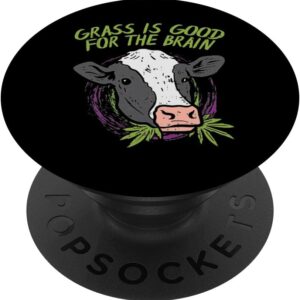
Grass Good Brain Cow Weed Cannabis Funny 420 THC Stoner Gift PopSockets Standard PopGrip
$11.99 Buy Now -
Sale!

GREEN CROSS Medicine Bag with Combination Lock 8.5″ x 5.5″ x 4.5″(Pink Nylon)
$37.99Original price was: $37.99.$9.99Current price is: $9.99. Buy Now -

Green Farmer Cannabis Weed 420 hat Mens Vintage Cotton Washed Baseball Caps Adjustable Dad Hat Crazy
$15.99 Buy Now -
Sale!

Green Haritage 800 9″ Diameter x 3.42″ Width, 2-Ply Jumbo Roll Bathroom Tissue (Case of 12)
$50.70Original price was: $50.70.$39.12Current price is: $39.12. Buy Now -

Green Weed Marijuana Kawaii Cannabis Pattern Flat Bill Hat, Unisex Snapback Baseball Cap Hip Hop Style Flat Visor Blank Adjustable
$11.99 Buy Now -

Greenhouse Cannabis Cultivation: Simple Guide To Commercial Cannabis Grow Operation: How To Build A Greenhouse For Cannabis Production
$8.99 Buy Now -

Grinder 2” Spice Grinder
$9.99 Buy Now -

Grove Bags Terploc Curing Cultivation Pouch 16 Oz (1 lb) Single Bag Grove Bag The Original Terploc Curing Cultivation Pouch
$12.99 Buy Now -
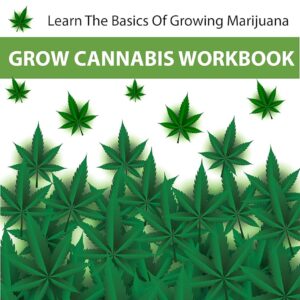
GROW CANNABIS WORKBOOK: Learn How To Grow Marijuana – Grow Cannabis School
$2.99 Buy Now -

Grow Tent for Aerogarden Hydroponic Grow System,18.9”x13.7”x20.8”,High Reflective Mylar for Hydroponic Indoor Plants,Grow Machine Protective Cover,Black Indoor Hydroponic Anti-Light Complete System
$25.95 Buy Now -

Growing Cannabis at Home in Minnesota: A Beginner’s Guide
$5.00 Buy Now -

Growing Cannabis at Home Quick Reference Guide – Cannabis Educational Series by Permacharts
$7.95 Buy Now -

Growing Cannabis Indoors: How To Grow Your Own Marijuana: (Cannabis Cultivation, Medical Cannabis) (How to Grow Marijuana)
$8.99 Buy Now -

Growing Marijuana For Absolute Beginners: A Guide for Beginners-on Growing-Premium Quality, Safe Marijuana-Indoors | Unlock the Secrets of Successful Indoor Cannabis Cultivation and Care
$11.95 Buy Now -

Growing Marijuana: DIY Cannabis Growing and Cultivation from Seed to Harvest – Learn both Indoor and Outdoor Growing Methods used by Professional Cannabis Producers
$2.99 Buy Now -

Growing Weed in the Garden: A No-Fuss, Seed-to-Stash Guide to Outdoor Cannabis Cultivation
$29.99 Buy Now -
Sale!

GROWNEER 3 Packs 6.5 Inch Pruning Shears Gardening Hand Pruning Snips Gardening Scissors with Straight Stainless Steel Precision Blades
$12.99Original price was: $12.99.$11.69Current price is: $11.69. Buy Now -

Grunt Style 1776 Flag
$27.99 Buy Now -

Grunt Style American Acid Men’s T-Shirt
$25.95 Buy Now -

Grunt Style Grumpy Old Vet Men’s Long Sleeve T-Shirt
$29.95 Buy Now -
Sale!

GSlife Appliance Rolling Tray – Sturdy Metal Appliance Slider with Removable Absorption Mat for Countertop Coffee Bar Station Kitchen Office, Vertically or Horizontally Pull, 15.3″x12.2″, Black
$27.99Original price was: $27.99.$25.99Current price is: $25.99. Buy Now -
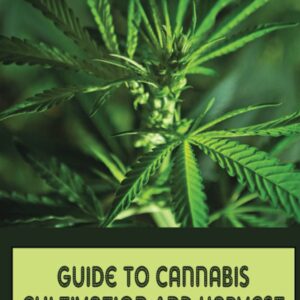
Guide To Cannabis Cultivation And Harvest: Tips And Tricks For Beginners: Save Money On Marijuana
$8.99 Buy Now -

Guitar Heartbeat Hats for Guitarist Musician, Adjustable Embroidered Vintage Cotton Baseball Caps for Men Women
$18.99 Buy Now -
![GUSTO [15 in x 200 ft - 250 Sq.Ft] Kraft Parchment Paper for Baking, Non-Stick Baking Paper - Parchment Paper Roll With Cutter for Air Fryer, Baking & Cooking (Formery Comfy Package)](https://mscannabiz.com/wp-content/uploads/2025/05/51H2FY60t-L._AC_SL1200_-300x300.jpg)
GUSTO [15 in x 200 ft – 250 Sq.Ft] Kraft Parchment Paper for Baking, Non-Stick Baking Paper – Parchment Paper Roll With Cutter for Air Fryer, Baking & Cooking (Formery Comfy Package)
$14.99 Buy Now -
![GUSTO [15 in x 200 ft - 250 Sq.Ft] White Parchment Paper for Baking, Non-Stick Baking Paper - Parchment Paper Roll With Cutter for Air Fryer, Baking & Cooking- Formery Comfy Package](https://mscannabiz.com/wp-content/uploads/2025/05/51zSweVZ73L._AC_SL1200_-300x300.jpg)
GUSTO [15 in x 200 ft – 250 Sq.Ft] White Parchment Paper for Baking, Non-Stick Baking Paper – Parchment Paper Roll With Cutter for Air Fryer, Baking & Cooking- Formery Comfy Package
$15.48 Buy Now -

H5 Large Smell Proof Stash Box Set – Premium YKK Zippers – Odor Proof Dog Tested Bag Plus Smellproof Container, 4X Resealable Pouches, Strap, Combo Lock- Smell Proof Case/No Scent Travel Storage Bag
$27.95 Buy Now -

HABIBI – Prerolled Filter Tips – Rolling Paper Tips – Rolling Crutches- Slim Ø7mm Filter Tips – 120pc Pack, NATURAL
$9.99 Buy Now -

HAKA Lifestyle Trucker Hat for Men & Women, Adjustable Baseball Hat, Mesh Snapback, Sturdy Outdoor Golf Hat
$29.99 Buy Now -
Sale!

Hanamiya Na Funny Weed Leaf Makeup Bag Zipper Pouch Travel Bag Toiletry Bag for Women Stoner Friend Bestie Birthday Gifts, Funny Unique Humor Novelty Sarcasm Magic Makeup Bag – Because M is Wrong
$9.99Original price was: $9.99.$6.99Current price is: $6.99. Buy Now -
Sale!

Handy Sliding Tray for Coffee Maker, Kitchen Appliance Moving Caddy, Countertop Slider with Smooth Rolling Wheels for Blender, Toaster, Air Fryer, Pot, Food Processors, Aid Mixer (Set of 1)
$19.99Original price was: $19.99.$11.98Current price is: $11.98. Buy Now -

HANSER | Smell Proof Odorless Mylar Resealable Foil Pouch Bags with clear Window | Stand up bottom | Airtight | matte black | 100 Pieces | 4.8×8.2 Inches
$21.95 Buy Now -

Happy Kit Secure & Discreet 8x6x4 Smell Proof Pouch Bag with Combination Lock – All-in-One Odor Proof Storage & Organizer Case with Advanced Scent Proof Technology -Men & Women
$29.99 Buy Now -

Hashsquatch Hash Squatch Bigfoot Smoking Weed cannabis PopSockets Standard PopGrip
$14.99 Buy Now -
Sale!

HauSun Handy Sliding tray Sliding Tray Mat for Coffee Maker,Kitchen Appliance Moving Caddy,Countertop Stoage for Air Fryer, Blender, Stand Mixer,Food Processors,1 set
$23.99Original price was: $23.99.$12.99Current price is: $12.99. Buy Now -

Hawaiian Bowling Shirts for Men Short Sleeve Printed Regular Fit Summer Beach Casual Button Down Aloha Shirts
$23.99 Buy Now -

Headrest Paper Rolls, 12-Pack – 12″ x 225′ – Premium Smooth 16 Pound Paper – Disposable Face Cradle Surface Paper Spool for Medical, Exam and Chiropractic Tables
$51.97 Buy Now -
Sale!
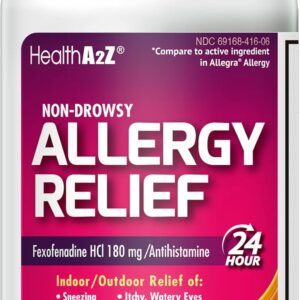
HealthA2Z Fexofenadine Hydrochloride 180mg, Antihistamine for Allergy Relief, Non-Drowsy, 24-Hour Antihistamine for Allergy Relief (120 Count (Pack of 1))
$21.25Original price was: $21.25.$19.95Current price is: $19.95. Buy Now -
Sale!

HealthA2Z Sleep Aid, Diphenhydramine Softgels, 50mg, Supports Deeper, Restful Sleeping, Non Habit-Forming (250 Counts)
$13.85Original price was: $13.85.$9.95Current price is: $9.95. Buy Now -
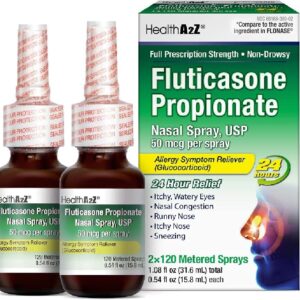
HealthA2Z® Fluticasone Propionate Nasal Sprays | Allery Relief Spray | Runny Nose | Nasal Congestion | Sneezing | Itchy Watery Eyes | 24 Hour Allergy Relief | (2 Packs)
$24.95 Buy Now -
Sale!

HELMET HEAD Smell Proof Bag and Stash Box XL Smell Proof Box with Combo Lock for Your Mylar Bags and Containers. Includes Grinder Card and Metal Tray (Black)
$89.99Original price was: $89.99.$59.99Current price is: $59.99. Buy Now -

HELMET HEAD Smell Proof Bag, Travel Bag with Combination Lock and Grinder Card, Water Repellent Compact Smell Proof Stash Box For Your Herbs and Smell Proof Containers (New Gray)
$19.99 Buy Now -

HEMPER Keeper 3-IN-1 Grinder + Storage System with Smell Proof Storage With Travel Ready Tether Strap | Lightweight
$10.00 Buy Now -
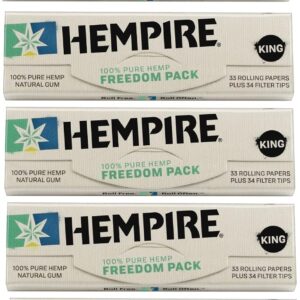
Hempire Rolling Papers King Size (110mm) Freedom Pack (Papers & Tips) – 5 Pack
$10.99 Buy Now -
![Herb Guard - 1 Oz Airtight Jar & Container [3 Pack] (500 ml) Airtight Ultraviolet Protection Keeps Goods Fresh for Months](https://mscannabiz.com/wp-content/uploads/2024/05/61WkbbScYsL._AC_SL1500_-300x300.jpg)
Herb Guard – 1 Oz Airtight Jar & Container [3 Pack] (500 ml) Airtight Ultraviolet Protection Keeps Goods Fresh for Months
$70.99 Buy Now -

Herb Guard Black Mini Locking Backpack – With Built in Tray, YKK Zippers and More – Doubles as a Shoulder Sling Bag
$49.99 Buy Now -

Herb Guard Large Smell Proof Bag & Case with Combination Lock (Holds Up to 3 Ounces) – includes YKK Zippers, 50ml Smell Proof Container and Jar, Built in Tray & Travel Bags (Black)
$44.99 Buy Now -

Herb Guard XL Smell Proof Bag & Airtight Case with Combination Lock (Container Holds Up to 5 Ounces) – Includes YKK Zippers, 250ml / Half oz Smell Proof Jar, Built in Tray & Travel Bags (Black)
$59.99 Buy Now -
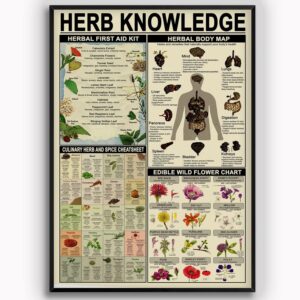
Herb Knowledge Metal Tin Signs Herbal First Aid Kit Infographic Poster Pharmacist Study Guide Tin Plaque Home Pharmacy Office Kitchen Wall Decor 8×12 Inches
$13.86 Buy Now -

hermit crab Unbleached pre Rolled Pen tip | 100 Pen Tips | Ø. 7mm | Rolled Paper Pen tip, (Brown, 100)
$5.99 Buy Now -

Hi Vis Reflective Safety Shirts for Men ANSI Class 2 High Visibility Construction Work T Shirt(Yellow,XL)
$24.99 Buy Now -

Hieroglyphic Hat African Egyptian Culture Bucket Hat Summer Fisherman Cap Outdoor Beach Sun Hat
$18.99 Buy Now -

High Life Marijuana Leaf Weed Design 420 Unstructured Dad Hat Baseball Cap
$11.99 Buy Now -

High Maintenance Weed Cannabis Pocket 420 THC Stoner Gift T-Shirt
$19.99 Buy Now -
Sale!

Higher: The Lore, Legends, and Legacy of Cannabis
$40.00Original price was: $40.00.$23.89Current price is: $23.89. Buy Now -

HOKirin Metal Tray with Soft Magnetic Lid, Small Blank Tray with Spill Proof Cover,Cute Purple Tray,Perfect for Home and On-The-Go,7” x 5.5” x 0.6”
$9.99 Buy Now -
Sale!

HOKirin Metal Tray with Soft Magnetic Lid,Metal Small Tray with Spill Proof Cover,Cute Black Blank Decorative Tray,Perfect for Home and On-The-Go,7” x 5.5” x 0.6“
$21.70Original price was: $21.70.$9.99Current price is: $9.99. Buy Now -

HOMEAL Smell Proof Bag with Combination Lock – Smell Proof Stash Box for Storage and Travel – Gift for Men/Women
$25.99 Buy Now -
Sale!

HOMEAL Smell Proof Bag, Smell Proof Container, Smell Proof Stash Bag, Odor Proof Pouch, Stash Storage Kit (Black)
$75.00Original price was: $75.00.$15.99Current price is: $15.99. Buy Now -

Honeycomb Cushioning Wrap Paper Roll,ULIFESTAR Honeycomb Kraft Packing Paper,Alternative To Bubble Wrap Roll,1PC Recyclable Honeycomb Packing Paper for Shipping Moving Blue, 25cm*100m/9.84″*328ft
$27.00 Buy Now -

Honeycomb Packing Paper 12″x400′ – Honeycomb Wrapping Paper for Moving Packaging and Shipping – Recyclable Protective Roll
$32.99 Buy Now -
Sale!

Honeycomb Packing Paper 15″Wx50’L-Bubble Wrap Substitute Alternative for Shipping, Moving Supplies, Small Business Packaging, Packing Boxes & Gifts Wrapping Paper with 20 Fragile Stickers
$16.99Original price was: $16.99.$9.98Current price is: $9.98. Buy Now -

Honeycomb Packing Paper 15″x400′ Roll with Fragile & Labelling Stickers, Gloves – Eco-Friendly Packing Paper Sheets for Moving Roll | Honeycomb Paper | Packing Bubble Wrap for Moving Supplies
$38.99 Buy Now -

Honeycomb Packing Paper 15″x550″ Packing Paper Substitute Alternative for Moving Shipping Wrapping Eco Protective Packaging Material Bubble Paper Wrapping Protective Roll
$7.99 Buy Now -

Honeycomb Packing Paper for Moving -15 In x 213 Ft, Shock Proof Black Wrapping Paper Roll for Shipping With 20 Fragile Stickers & 100Ft Jute Twine -Sustainable & Recyclable Moving Bubble Packing Roll
$20.99 Buy Now -
Sale!

Honeycomb Packing Paper for Moving Dishes and Glassware 15″x98′ Eco Friendly Packaging Bubble Cushion Wrap Roll Bulk Shipping Supplies for Packages Box Void Filler
$20.97Original price was: $20.97.$19.99Current price is: $19.99. Buy Now -

Honeycomb Packing Paper Roll 15”x230′-Goefun Recyclable Moving Supplies with 30 Fragile Sticker Labels, Shipping Supplies Substitute Alternative for Bubble Wrap for Packing Gift, Shipping, Moving
$20.99 Buy Now -

Honeycomb Packing Paper Roll,Eco-Friendly Bubble Wrap Alternative for Moving.Shipping.Gifts Wrapping Paper,Shock-Proof Recyclable Biodegradable Cushioning Material,Fragile item protection12″×394″
$11.90 Buy Now -

Honeycomb Packing Paper Wrap 15”x328′, Substitute Alternative for Bubble Cushioning Wrap for Moving Shipping Packaging, Recyclable Moving Supplies with 48 Fragile Sticker Labels
$24.99 Buy Now -

Honeycomb Packing Paper Wrap 15”x820′, Substitute Alternative for Bubble Cushioning Wrap for Moving Shipping Packaging, Recyclable Moving Supplies with 48 Fragile Sticker Labels
$59.99 Buy Now -

Honeycomb Packing Paper Wrap 15″ x200′ Sustainable Alternative to Bubble Cushioning Wrap for Moving/shipping/packing Roll with 20 Fragile Sticker Biodegradable & Fully Recylable
$20.99 Buy Now -

Honeycomb Packing Paper Wrap 15″x400′ Sustainable Alternative to Bubble Cushioning Wrap Biodegradable & Fully Recylable for Moving/Shipping/Packing Roll with 20 Fragile Stickers
$39.99 Buy Now -
Sale!

Honeycomb Packing Paper, 15″ x 131′ Packing Paper Substitute Alternative for Bubble Cushioning Wrap for Moving Shipping Packaging, Recyclable Moving Supplies Bubble Packing Wrap Protective Roll
$16.99Original price was: $16.99.$14.44Current price is: $14.44. Buy Now -

Honeycomb Packing Paper, 15″ x 180′ Recyclable Cushion Packing Paper for Moving Shipping Packaging Breakables, Eco Friendly Bubble Wrap Alternative Roll Kraft Honeycomb Paper with 20 Fragile Stickers
$18.99 Buy Now -

Honeycomb Packing Paper, 15″x300′ Honeycomb Cushioning Bubble Wrap Paper Roll for Moving Shipping Breakables Packaging Gifts with 20 Fragile Sticker Biodegradable & Fully Recyclable Brown Kraft
$23.99 Buy Now -
Sale!

Honeycomb Packing Paper, MINHAO 15″x230′ Eco Friendly Packing Paper for Moving Recyclable Honeycomb Paper Moving Supplies Bubble Paper Wrapping Protective Roll, With 36 Fragile Sticker Labels
$20.97Original price was: $20.97.$17.82Current price is: $17.82. Buy Now -

Honeycomb Packing Paper, MINHAO 15″x400′ Eco Friendly Packing Paper for Moving Recyclable Honeycomb Paper Moving Supplies Bubble Paper Wrapping Protective Roll, With 36 Fragile Sticker Labels
$36.99 Buy Now -

Honeycomb Packing Paper,11.5″ x 164′ Honeycomb Cushioning Wrap Roll Honeycomb Packing Paper Wrap,Eco-friendly Packaging Paper Kraft Paper Bubble Paper (Purple)
$25.98 Buy Now -

Honeycomb Packing Paper,15″ x 450″ Packing Paper for Moving Recyclable Honeycomb Paper Moving Supplies Bubble Paper Wrapping Protective Roll, With 36 Fragile Sticker Labels (15″ x 450″)
$12.99 Buy Now -
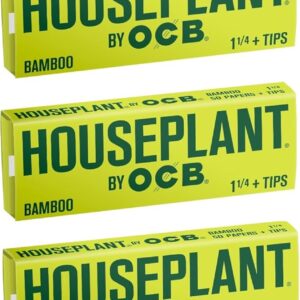
Houseplant Rolling Papers by OCB Bamboo 1 1/4 (78mm) with Tips (5 Pack)
$15.99 Buy Now -

How To Cook With Cannabis: The Ultimate Guide to Preparing Delicious Cannabis-Infused Dishes: A Perfect Gift for Aspiring Culinary Enthusiasts and Wellness Seekers
$11.95 Buy Now -

How to Grow Marijuana: 3 Books in 1 – The Complete Beginner’s Guide for Growing Top-Quality Weed Indoors and Outdoors
$12.97 Buy Now -

How to Grow Marijuana: The Easiest Guide to Growing Weed
$15.99 Buy Now -

How to Grow Organic Cannabis: A step-by-step guide for growing Marijuana outdoors
$9.99 Buy Now -

How to Succeed in the Cannabis Industry: For Professionals, Contractors & Entrepreneurs
$19.99 Buy Now -
Sale!

HP – Q1396A Universal Bond Paper (24 Inches x 150 Feet Roll)
$89.99Original price was: $89.99.$29.95Current price is: $29.95. Buy Now -

HP Wide Format Universal Bond Paper 24 in x 150 ft, 2 Roll Bundle 4.2 mil – 80 g/m² (21 lbs) 2″ Core – Q1396A-2R
$64.75 Buy Now -

HR Matters for Cannabis Companies
$8.99 Buy Now -

HUGLAZY 80s 90s Outfit Hawaiian Shirt for Men Big and Tall Short Sleeve Button Down Shirts Funny Party Outfit
$34.99 Buy Now -
Sale!

Hydroponic 2Pack Microtip Straight blade/Curved Blade Flower Leaf Trimmer Pruning Shears by Yieldcropper
$22.97Original price was: $22.97.$19.97Current price is: $19.97. Buy Now -

Hydroponic Marijuana: A step by step guide to growing cannabis indoor
$9.90 Buy Now -

Hydroponic Mylar Water-Resister Grow Tent Reflective Garden Growing Dark Room with Observation Window, Removable Floor Tray and Tool Bag for Indoor Plant Growing (48″x48″x80″)
$89.99 Buy Now -
Sale!

Hydrostone Terracotta Humidifying Stone (3 Pack)
$6.99Original price was: $6.99.$5.89Current price is: $5.89. Buy Now -

I Took My Meds Today – Vintage Marijuana Weed Cannabis 420 T-Shirt
$14.97 Buy Now -
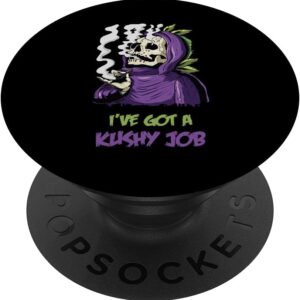
I´ve got a Kushy Job Cannabis Dispensary Budtender CBD Oil PopSockets Swappable PopGrip
$14.99 Buy Now -

I’m A Grower Not a Shower Funny Cannabis Cultivation Throw Pillow
$19.99 Buy Now -

I’m a Proud Dad Shirt Funny Gifts for Dads Grandfather Fathers Day Awesome Grandpa Abuelo Papa Shirts for Men
$15.95 Buy Now -

I’m Not Saying It Was Aliens But It Was Aliens Funny T-Shirt
$19.99 Buy Now -

Ibyx Elegant Sliding Tray for Your Coffee Maker & Heavy Kitchen Appliances – Sturdy, Slides Easily from Under The Cabinet (Black, 16″ W x 13″ D)
$39.99 Buy Now -
Sale!

Ibyx Elegant Sliding Tray for Your Coffee Maker & Heavy Kitchen Appliances – Sturdy, Slides Easily from Under The Cabinet (Natural, 16″ W x 13″ D)
$37.93Original price was: $37.93.$34.14Current price is: $34.14. Buy Now -

Ice Blueberry Flavored Pop Filters for Rolling Papers, 18 Pcs Flavors Ø7mm Tips
$5.99 Buy Now -
Sale!

IDEATECH Smell Proof Bag Stash Box, Smell Proof Containers with Combo Lock, Odorless Travel Storage Bag, Home Organizer Case Lock Box with Accessories, Smell Proof Box Gift for Women/Men
$57.98Original price was: $57.98.$24.99Current price is: $24.99. Buy Now -
Sale!

IDEATECH Smell Proof Bag, Dog-Tested Smell Proof Containers with Lock, Smell Proof Stash Bag, Money Safe Organizer, Odor Proof Case Storage Bags for Your Accessories, Smell Proof Pouch Gifts
$41.98Original price was: $41.98.$18.99Current price is: $18.99. Buy Now -

IDL Packaging 15″ x 1400′ Refill Roll (Pack of 2) for MP-1400USN HexcelWrap Honeycomb Packing Paper Station, Brown – Protective Kraft Paper with Interlocking Slit Design for Shipping
$319.95 Buy Now -

Impressed Trippy Drippy Rolling Tray for Women – Girly Purple 7″ X 5″ Small Mini Size Cute Cigarette Rolling Tray for Girls – Premium Metal Custom Design Raw Tobacco Smoking Accessories Gift
$9.97 Buy Now -

in My Defense I was Left Unsupervised Novelty Gag Gift Funny T Shirt for Anyone
Read more -

Indica Mindset: A comprenhensive guide Covering All aspects of Indica Cannabis Cultivation
$9.99 Buy Now -
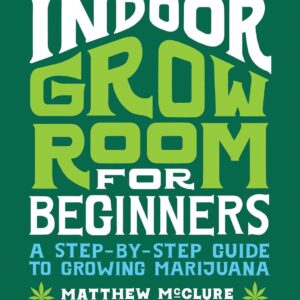
Indoor Grow Room for Beginners: A Step-By-Step Guide to Growing Marijuana
$15.99 Buy Now -

Industrial Grade Paper for Moving & Packing | Shipping, Gift Wrapping, Arts, Crafts & Table Settings | Recycled Kraft Paper Roll | 17.75 inches x 100 feet | by The Paper Factory LLC (17.75 x 100)
$13.99 Buy Now -

Industrial Grade Paper for Moving & Packing | Shipping, Gift Wrapping, Arts, Crafts & Table Settings | Recycled Kraft Paper Roll | 24 inches x 200 feet | by Paper Pros
$22.31 Buy Now -

Industrial Grade Paper for Moving & Packing | Shipping, Gift Wrapping, Arts, Crafts & Table Settings | Recycled Kraft Paper Roll | 30 inches x 150 feet | by The Paper Factory LLC
$27.88 Buy Now -

Inhale Exhale Wall Art – Dope Posters – Black Art – African American Women, Girls – Afro Room Decor – Cannabis Pot Pothead Stoner Gifts – Smoking Marijuana Home Decor – Funny Weed Ganja Decorations
$12.95 Buy Now -
Sale!

INOGIH Reversible Bucket-Hat Marijuana-Cannabis Weed Foldble Fisherman Hat Packable
$12.99Original price was: $12.99.$9.99Current price is: $9.99. Buy Now -
Sale!

INOGIH Reversible Bucket-Hat Marijuana-Cannabis Weed Foldble Fisherman Hat Packable
$12.99Original price was: $12.99.$9.19Current price is: $9.19. Buy Now -

iPhone 13 Pro I’m A Grower Not a Shower Funny Cannabis Cultivation Case
$17.99 Buy Now -
Sale!

IXIGER Rolling Tray Set with Stash Box & Lockable Storage Box – Complete Rolling Tray Set for Cigarette Rolling, Storage & Organization – Durable & Stylish Rolling Tray for Smokers
$43.88Original price was: $43.88.$34.88Current price is: $34.88. Buy Now -

JAM PAPER Honeycomb Packing Paper Roll – 12″ x 328′ – Emerald Green – 328 Sq Ft – 80 GSM – Roll Sold Individually
$29.99 Buy Now -

JARLINK Honeycomb Packing Paper, 12 * 400′ Packing Wrap for Packing/Shipping/Moving, Recyclable Honeycomb Cushioning Wrap Roll, Moving & Gifts Wrapping Paper With 30 Fragile Sticker Labels
$29.99 Buy Now -

JARLINK Honeycomb Packing Paper, 15″x 213′ Bubble Packing Wrap for Packing/Shipping/Moving, Eco-Friendly Bubble Packing Paper Wrapping Roll, Recyclable Moving Supplies With 20 Fragile Sticker Labels
$22.99 Buy Now -

JIUYOTREE 3-Tier Plastic Rolling Storage Cart Utility Cart with Extra Hanging Cups Handles Lockable Wheels for Living Room Bathroom Kitchen Office Black
$26.99 Buy Now -
Sale!
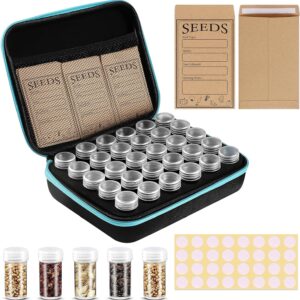
jixsloft 30 Slots Seed Storage Organizer with 20 Seed Envelopes, Sturdy Seed Organizer Storage Box with Zipper Bag Label Stickers(Seeds not Included), Seed Storage Container for Flower Plants Garden
$15.99Original price was: $15.99.$14.99Current price is: $14.99. Buy Now -
Sale!

Job 1 1/2 Cigarette Rolling Paper, 24-Pack (24 leaves per pack)
$51.99Original price was: $51.99.$48.90Current price is: $48.90. Buy Now -

Job 1.0 Single Wide Rolling Papers-10 Packs-32 Leaves each Pack
$15.00 Buy Now -

Job 1.5 Tobacco Cigarette Rolling Papers 10Pack
$22.73 Buy Now -

Job 1.5 Tobacco Cigarette Rolling Papers 3Pack
$12.97 Buy Now -
Sale!

JOB Cigarette Rolling Paper Double Wide Gold – 5 Pack – 120 Leaves total
$21.98Original price was: $21.98.$15.99Current price is: $15.99. Buy Now -

JOB Cigarette Rolling Papers 1 1/4 (3 Pack)
$6.99 Buy Now -

JOB French White 1-1/4 Size Cigarette Papers | Includes JOB Papers and ARC Cigarette Saver (6 Pack)
$8.90 Buy Now -

JOB Gold 1-1/2 Size Rolling Papers Set, 24 Booklets (24 Rolling Papers per Booklet) 100% Natural Wood Fibers, Natural Acacia Gum, Unbleached – Ultra-Thin and Slow-Burning
$46.99 Buy Now -

JOB Orange Slow Burning 1-1/4 Size Cigarette Papers | Includes 24 Packs of JOB Cigarette Papers and ARC Saver
$20.69 Buy Now -
Sale!

Joker Rolling Papers – 1 1/2 (10)
$15.99Original price was: $15.99.$13.10Current price is: $13.10. Buy Now -

Joker White 1 1/4 79mm Cigarette Rolling Papers – Slow Burning (Pack of 24 Booklets)
$20.99 Buy Now -
Sale!

JOSTZHXIN Salon Rolling Tray, Premium Aluminum Tattoo Tray, Salon Rolling Cart Adjustable Height, SPA Service Rolling Trolley Tray for Beauty Hairstylist Dental Clinic,Black
$49.79Original price was: $49.79.$42.99Current price is: $42.99. Buy Now -

JOSTZHXIN Salon Rolling Tray, Tattoo Tray Rolling Cart, Height Adjustable Styling Tray, Service Storage Tray Trolley for Beauty Salon Clinic Spa,Black-with Cup Holder
$40.99 Buy Now -
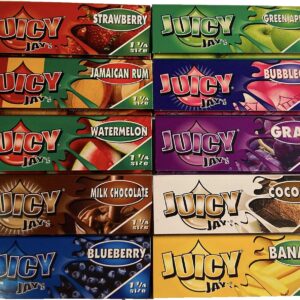
Juicy Jay 10 Pack Mixed Flavor 1 1/4 Size Flavored Rolling Paper 32 Count
$17.98 Buy Now -

Juicy Jay’s Blueberry flavored rolling papers 1 1/4 Size 3 Packs 32 ea Bundle
$12.50 Buy Now -

Just Hit It | Cannabis Smoker T-Shirt
$17.99 Buy Now -
Sale!

JUSTTOP Car Steering Wheel Desk for Laptop,Multipurpose Travel Car Accessories, Car Seat Stand Trays for Eating, Steering Wheel Under Table Console(Black)
$29.99Original price was: $29.99.$9.99Current price is: $9.99. Buy Now -
Sale!

K COOL Windproof Ashtray with Lid Metal Portable Cigarettes Ashtray for Outdoors Indoors Hand Stamped Pattern Smoking Ashtray Fancy Gift for Men Women(Navy Blue)
$15.50Original price was: $15.50.$14.75Current price is: $14.75. Buy Now -
Sale!

KactusKutter K1 Electric Spice Grinder Battery Powered Automatic Portable For Kitchen Herb Grinding – Holds up to 1 Gram
$39.95Original price was: $39.95.$29.95Current price is: $29.95. Buy Now -

Kashmir 100 ct Organic Rolling Paper Cone King Size, Natural Pre Rolled Cones with Filter Tips, 109mm Organic Natural Fibers Easy to Use Convenient Preroll Cones, Classic Cones Rolling Paper – 100 Pcs
$9.49 Buy Now -
Sale!

Kashmir 100% Organic Classic 200ct Pre-Rolled Tubes, Portable, and Easy-Draw Rolling Paper Filter Tubes – Carton of 5
$34.99Original price was: $34.99.$29.91Current price is: $29.91. Buy Now -

Kashmir Pink Pre Rolled Cones King Size 200 Count – Stylish Pink Rolling Cones with Tips, Unbleached Paper, Slow Burning, Easy Fill, Bulk Pack
$16.99 Buy Now -
Sale!
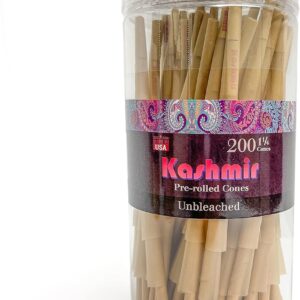
Kashmir Pre Rolled Cones Rolling Papers 1 1/4 Rolling Cones Unbleached Rolling Papers Pre Rolled Cones 78 mm Natural Fibers Easy to Use and Convenient Preroll Cones (1-1/4 200ct)
$18.99Original price was: $18.99.$16.99Current price is: $16.99. Buy Now -
Sale!
![Katbite 12in x 262ft Unbleached Parchment Paper Roll, 260 Sq.Ft, Balanced Series, Non-Stick, Extra Long Parchment Baking Paper with Portable Serrated Cutter for Baking, Cooking [Balanced Series]](https://mscannabiz.com/wp-content/uploads/2025/05/71d9qLYNYOL._AC_SL1500_-300x300.jpg)
Katbite 12in x 262ft Unbleached Parchment Paper Roll, 260 Sq.Ft, Balanced Series, Non-Stick, Extra Long Parchment Baking Paper with Portable Serrated Cutter for Baking, Cooking [Balanced Series]
$15.47Original price was: $15.47.$14.99Current price is: $14.99. Buy Now -

KIBAGA Discrete Smell Proof Odorless Bag With Easy Use Combination Lock – The Perfect Storage Container, Medicine Bag, And Organizer Case For Your Accessories That Blocks Out Smells And Strong Odors
$19.99 Buy Now -

Kids of Cannabis: My mom & dad work in cannabis; this is our story
$13.98 Buy Now -

King Palm Flavored Rolling Papers and Tips – King Size – 32 Papers and Tips per Pack – (Mixed Bundle)
$14.99 Buy Now -
Sale!

King Size Cigarette Roller – Manual Rolling Machine for Perfect Cigarettes, 4 inch Paper Size
$46.99Original price was: $46.99.$16.99Current price is: $16.99. Buy Now -
Sale!

King Size Pre-Rolled Cones | 200 Pack | 110 mm Slow Type Brown Rolling Papers With Tips | Includes Cone Loader
$27.99Original price was: $27.99.$19.99Current price is: $19.99. Buy Now -

King Size Regular rolling paper x 50 booklets x 33 = 1650 papers
$33.83 Buy Now -

KINGFEN Womens Tops 2024 U Neck Short Sleeve Shirts Summer Tshirts Casual Top
$19.98 Buy Now -

Kingsize Slim Pink Rolling Papers – 50 Leaves Per Pack
$4.86 Buy Now -

Kingsizeslim Connoisseur Rolling Paper, 3 Colors 110MM Cigarette Paper with Filter Tips, 99pcs Premium Smoking Paper and 99 Tips, Ultra Thin & Slow Burning
$6.99 Buy Now -

Kitchen Appliance Sliding Tray,Coffee Maker Rolling Tray Under Cabinet Appliance Organizer Toaster Blender Air Fryer Stand Mixer Countertop Storage Moving Slider (Steel, 9″W x 14.5″D)
$45.99 Buy Now -
Sale!

Kitchen Caddy Sliding Tray – Appliance Coffee Maker Slider, Large Rolling Tray Countertop Moving Sliders for Stand Mixer Air Fryer, Toaster, Blender, and More -11.7” W × 13.8”D
$34.99Original price was: $34.99.$28.49Current price is: $28.49. Buy Now -

Kitchen Spice Grinder 2”
$24.99 Buy Now -
Sale!

KitchenAid 9x13in Nonstick Aluminized Steel Baking Sheet, Contour Silver
$10.99Original price was: $10.99.$9.99Current price is: $9.99. Buy Now -
Sale!

Kitsure Toilet Paper Holder Free Standing – Rustproof Metal Toilet Paper Stand for 4 Rolls with Anti-Slip Base and Shelf for Phone & Small Items, Bathroom Organizers and Storage, Black
$24.99Original price was: $24.99.$14.98Current price is: $14.98. Buy Now -

Kool-Aid Mens Oh Yeah Shirt Drink Mix Man Oh Yeah Graphic T-Shirt
$19.99 Buy Now -
Sale!

KOOLSOLY Fishing Hat,Sun Cap with UPF 50+ Sun Protection and Neck Flap,for Man and Women
$14.99Original price was: $14.99.$12.74Current price is: $12.74. Buy Now -
Sale!

KOZUKI Anime Rolling Tray 11×7 Anime Ash Tray Premium Metal Tray Gold Plating Anime Jewelry Tray Anime Decorative Tray Anime Table Tray Trendy Gifts Anime Serving Tray Anime Gifts (ARABASTA)
$29.98Original price was: $29.98.$13.77Current price is: $13.77. Buy Now -
Sale!

KOZUKI Pink Rolling Tray 11 x 7 Pink ASH Tray Anime Rolling Tray Anime Decorative Tray Premium Metal Tray Pink Serving Tray Artistic Multipurpose Tray for Home (BFF), KKTRAY03
$22.98Original price was: $22.98.$15.77Current price is: $15.77. Buy Now -

KTILG Women’s Summer Tops Ruffle Short Sleeve T Shirts Crewneck Pleated Front Blouse Casual
$19.99 Buy Now -

KTILG Women’s V Neck T Shirts 3/4 Sleeve Blouse Summer Tops Dressy Casual Solid Basic Tees
$23.99 Buy Now -
Sale!

Kyodoled Medium Cash Box with Combination Lock Safe Metal Money Box with Money Tray for Security Lock Box 7.87″x 6.30″x 3.54″ Black Medium
$54.60Original price was: $54.60.$13.99Current price is: $13.99. Buy Now -
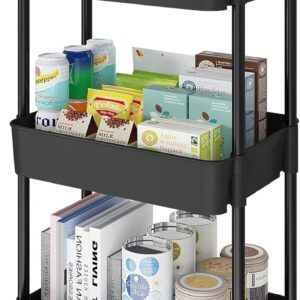
Laiensia 3-Tier Kitchen Storage Cart,Multifunction Utility Rolling Storage Organizer,Mobile Shelving Unit Cart with Lockable Wheels for Bathroom,Laundry,Living Room,With Classified Stickers,Black
$24.99 Buy Now -

Large Bamboo Box Tray Set with Combination Lock Decorative Box with Accessories for Gift, Home and Organization-Bamboo
$42.99 Buy Now -
Sale!

Large Bamboo Box with Combination Lock – Decorative Locking Box with Detachable Compartment, Removable Tray, Jars, Resealable Bags – Great Holidays Gifts
$32.99Original price was: $32.99.$26.99Current price is: $26.99. Buy Now -

Large Bamboo Box with Combination Lock, Wooden Printed Decorative Storage Box with Upgraded Tray, Stash Storage Lock Box with Smell Proof Bags,Glass Jars,Tubes & Brushes as Great Gift Choice(Mushroom)
$45.85 Buy Now -
Sale!
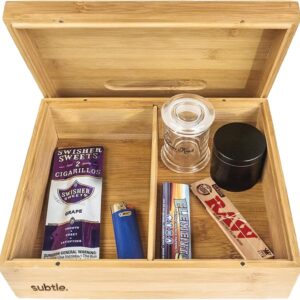
Large Bamboo Stash Box w/Ample Storage Space to Organize Herb Accessories – Comes with Convertible Rolling Tray Lid – (10″ x 8″ x 3.5″)
$43.99Original price was: $43.99.$19.99Current price is: $19.99. Buy Now -
Sale!

Large Cosmetic Organization Bag with 11 Small Items, Portable Cosmatic Makeup Storage Case with Combination Lock For Home and Travel,(Cute Cow Print) Black and white
$45.96Original price was: $45.96.$42.96Current price is: $42.96. Buy Now -
Sale!

Large Stash Box with Rolling Tray with Combination Lock 3 Jars & brush,Home Gifts Locking Storage Bamboo Box Storage (Blue)
$219.99Original price was: $219.99.$29.99Current price is: $29.99. Buy Now -
Sale!

Large Storage Bag ,Medicine Lock Box with Accessories , Portable Lock Bag ,Pouch Water Resistant,Set Travel Case Great for Women, (Cute Cow Print) Pink and White
$45.99Original price was: $45.99.$42.99Current price is: $42.99. Buy Now -

Large Storage Bag ,Medicine Lock Box with Accessories, Portable Lock Bag ,Pouch Water Resistant,Set Travel Case Great Christmas Gifts for Men, Black
$39.99 Buy Now -

Large Storage Case with TSA Combination Lock Bag, Portable Carbon Lined, XL Medicine Lockable Box for Travel & Home Secured Box Organizer Divider Jars Accessories, Removable Tray (Green)
$60.95 Buy Now -

Large Wooden Box Tray Set Storage Decorative Box – Includes Reversible Tray Glass Jar and All Accessories (Walnut)
$41.99 Buy Now -

LARIX Trucker Hat – Tamarack Mountain (No-Sweat Hat Liner Included)
$34.99 Buy Now -
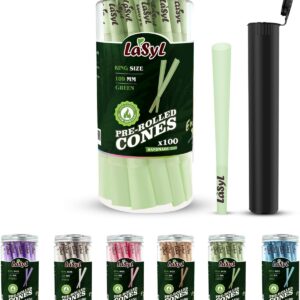
LaSyL Pre Rolled Cones | 100 Pack King Size (Green) | Rolling Paper with Tips and Packing Tubes (4.3inch/109mm) | Burn Slow and Even
$9.99 Buy Now -
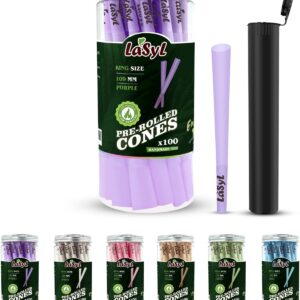
LaSyL Pre Rolled Cones | 100 Pack King Size (Purple) | Rolling Paper with Tips and Packing Tubes (4.3inch/109mm) | Burn Slow and Even
$9.99 Buy Now -
Sale!

LED Rolling Tray Luminous Disk LED Tray Glow Part and Mode White
$31.99Original price was: $31.99.$21.99Current price is: $21.99. Buy Now -
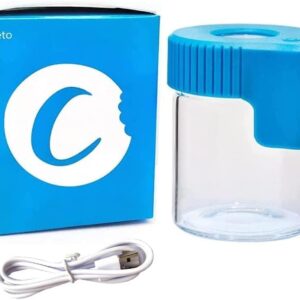
Led Transparent Glass Seal Storage Jar, Light-Up Magnifying Glass Ornamental Glass Bottle (Blue)
$13.99 Buy Now -

Legal Cannabis Will Be Bigger Than Cryptos Learn Why You Should Invest Right Now A Beginner Guide To CBD Investing
$1.50 Buy Now -
Sale!

Legigo 1″ Rockwool Grow Cubes Starter Plugs- Rockwool Stonewool Planting Cubes for Seed Starter Soilless Cultivation Hydroponics, Cuttings, Soilless Culture Plant Propagation(2 Sheet, 100 Plugs Total)
$10.99Original price was: $10.99.$9.99Current price is: $9.99. Buy Now -
Sale!

LET’S RESIN Resin Tray Mold,Rectangle Rolling Tray Molds for Resin,Sturdy Silicone Tray Molds with Edges,Large Rolling Tray Molds for Epoxy Casting,DIY Jewelry Holder,Home Decoration
$46.99Original price was: $46.99.$12.99Current price is: $12.99. Buy Now -

LET’S RESIN Silicone Mold Kit with Rolling Tray, Ashtray Jar with Lid for Casting Epoxy, DIY Storage
$20.99 Buy Now -

Let’s Plant Some Trees Cannabis Humor Marijuana Funny Weed Short Sleeve T-Shirt
$19.98 Buy Now -

Like A BOSS Savage Marijuana Leaf Weed King City Urban Embroidered Fashion Snapback Hat Adjustable Baseball Cap Men Women
$14.99 Buy Now -
Sale!

Little Hippie 13-Pack Trippy Mushroom Aluminum Metal Tray Set
$29.04Original price was: $29.04.$26.99Current price is: $26.99. Buy Now -
Sale!

Lock & Seal 20 Pack Reusable Food Storage Bags – Heat Sealable, 1 oz, 6″ x 9.8″ x 3.15″ Inch
$19.99Original price was: $19.99.$7.99Current price is: $7.99. Buy Now -

Lock Bag with Combination – Portable Travel Organizer Bags with 3-Digit Combination
$19.99 Buy Now -
Sale!

Lock Bag with Combination Medicine Bag Travel Lunch Black
$18.99Original price was: $18.99.$17.99Current price is: $17.99. Buy Now -

LOCOMO Men Women Baseball Cap Marijuana Pot Leaf Weed Cannabis Embroidered Hat Trucker Hat Snapback Brim
$18.99 Buy Now -
Sale!

LOSTABA Rolling Tray for Cigarettes Rolling, Rolling Tray with Magnetic Lid, Cigarette Rolling Metal Tray 11×7 inches.…
$25.99Original price was: $25.99.$12.99Current price is: $12.99. Buy Now -

Loud Box 5 Pack Colorful Metal King Sized pre roll Cone Holder, Cigarette Tube, and Cigarette case, Holds 3 pre Rolled Cones, Convenient Smoking Accessories
$16.95 Buy Now -

Loveternal Mens 3D Print Tank Top Summer Casual Novelty Polyester Gym Workout Bodybuilding Tank Tops
$10.79 Buy Now -

Loveternal Mens 3D Print Tank Top Summer Casual Novelty Polyester Gym Workout Bodybuilding Tank Tops
$14.99 Buy Now -
Sale!

LUCKY BEN 5 Pairs Unisex Marijuana Weed Leaf Boat Warm Cotton Socks US 5-9.5
$13.95Original price was: $13.95.$12.97Current price is: $12.97. Buy Now -

LucyPhy 30 Pack Plant Bender Angle Adjustable Plant Training Clips Low Stress Training Clips 90 Degrees Plant Stem(Circle Style,Red)
$13.99 Buy Now -
Sale!

Lurhonp Novelty Mushroom T-Shirt Hippy Casual Short Sleeve Tee Shirts
$19.99Original price was: $19.99.$15.99Current price is: $15.99. Buy Now -

LUX ACCESSORIES Black Beaded Best Buds Weed 420 Marijuana BFF Best Friends Matching Bracelet Set
$11.99 Buy Now -

Luxe Glass Mini 1 1/4 Clear Cellulose Rolling Paper – Full Box – 24 Packs
$17.14 Buy Now -
Sale!

Made in USA | Bulk Value 18″ x 350 ft (4200 inches) Reli. Brown Butcher Paper Roll | Food Grade Kraft Paper for BBQ | Smoking Meat | Meat Wrapping | Unwaxed (Brown)
$31.99Original price was: $31.99.$29.99Current price is: $29.99. Buy Now -
Sale!

Made in USA | Bulk Value 24 in x 350 ft (4200 in) Reli. Brown Butcher Paper Roll | Food Grade Kraft Paper for BBQ | Butcher Wrap for Smoking Meat | Unwaxed, Meat Wrapping & Smoking (Brown)
$44.47Original price was: $44.47.$40.49Current price is: $40.49. Buy Now -
Sale!

Made in USA Brown Kraft Paper Jumbo Roll 30″ x 2400″ (200ft) Ideal for Gift Wrapping, Art, Craft, Postal, Packing, Shipping, Floor Protection, Dunnage, Parcel, Table Runner, 100% Recycled Material
$33.95Original price was: $33.95.$30.97Current price is: $30.97. Buy Now -
Sale!

Made in USA Kraft Paper Wide Jumbo Roll 48″ x 1200″ (100ft) Ideal for Gift Wrapping, Art, Craft, Postal, Packing, Shipping, Floor Protection, Dunnage, Parcel, Table Runner, 100% Recycled Material
$41.97Original price was: $41.97.$30.97Current price is: $30.97. Buy Now -

MAGICAL BUTTER Smell-Proof Bag with Combination Lock – Portable Smell-Proof Bag with Tray & Smell-Proof Jar – Secure Organizer Bag for Travel Packing, Portable Storage & Lunch – Black
$59.29 Buy Now -

MAGICAL BUTTER Smell-Proof Bag with Combination Lock – Portable Smell-Proof Bag with Tray & Smell-Proof Jar – Secure Organizer Bag for Travel Packing, Portable Storage & Lunch – Pink
$59.22 Buy Now -

Magically High Unicorn Smoke Weed Cannabis Marijuana Stoner PopSockets Swappable PopGrip
$14.99 Buy Now -
Sale!

MAICHENG Smell Proof Bag with Combination Lock – Carbon Lined Odor Proof Pouch – Large Smell Proof Containers – Travel Storage Case Gifts for Women – 6 in1 Kit – Purple
$74.98Original price was: $74.98.$38.99Current price is: $38.99. Buy Now -

Make Money Online With Cannabis Stocks: Learn This Basic Strategy and Build Wealth With Cannabis Stocks Today (Cannabis Education Series)
$15.99 Buy Now -
Sale!

Makeup Bag, Travel Cosmetic Bag, For Women Best Friends Sister Funny Weed Gifts, Small Makeup Zipper Pouch Travel Accessories Organizer Bag Toiletry Case Gifts for Birthday Christmas. Purple
$9.99Original price was: $9.99.$6.99Current price is: $6.99. Buy Now -

Makeup Cosmetic Marijuana Bag For Women – Might Be Makeup Might Be Weed – Zip Travel Bag Humor Weed Leaves Makeup Pack Gifts For Friends Sisters Colleagues Lovers Employees Bosses …
$9.96 Buy Now -
Sale!

Mamba Original 1g Gray Electric Portable Herb Grinder. USB Powered Essential Kitchen Mill for Grinding
$51.99Original price was: $51.99.$32.28Current price is: $32.28. Buy Now -
Sale!

Mardi Gras Orange Wrapping Paper, 17.5″x335″ Construction Bulletin Board Art Poster Kraft Craft Decorative Paper Roll, Perfect for Halloween, Wedding, Birthday, Bouquet Flower Gift Wrap110GSM 75LB
$6.99Original price was: $6.99.$5.99Current price is: $5.99. Buy Now -
Sale!

Marijuana Botany: An Advanced Study: The Propagation and Breeding of Distinctive Cannabis
$24.95Original price was: $24.95.$20.39Current price is: $20.39. Buy Now -

Marijuana Cannabis Hemp Leaf Silicone Molds with 70 Cavities Shaped for Pot Chocolate Candy Gummy, with Baking Scraper
$9.99 Buy Now -

Marijuana Cannabis Shaped (Pot Leaf), Cookie Cutter Set, 3 Piece, Premium Food-Grade Stainless Steel, Dishwasher Safe (1 Pack)
$6.99 Buy Now -

Marijuana Cultivation: Aeroponic Grow
$2.99 Buy Now -
Sale!

Marijuana Edibles: 40 Easy and Delicious Cannabis-Infused Desserts
$14.95Original price was: $14.95.$13.97Current price is: $13.97. Buy Now -

Marijuana Ganja Hemp Cannabis Weed Tie dye Pattern Smoking PopSockets Swappable PopGrip
$16.99 Buy Now -
Sale!
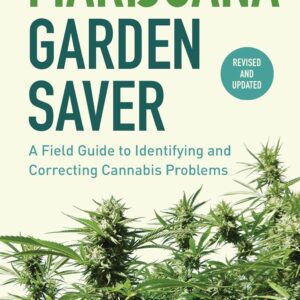
Marijuana Garden Saver: A Field Guide to Identifying and Correcting Cannabis Problems
$24.95Original price was: $24.95.$21.22Current price is: $21.22. Buy Now -

Marijuana Good Buds Stick Together Couples 420 Weed Cannabis T-Shirt
$15.99 Buy Now -
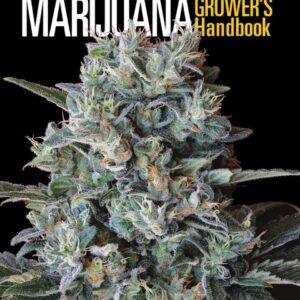
Marijuana Grower’s Handbook: Your Complete Guide for Medical and Personal Marijuana Cultivation
$35.10 Buy Now -

MARIJUANA GROWING SECRETS: The Ultimate Beginner’s Guide to Personal and Medical Marijuana Cultivation Indoors and Outdoors. Discover How to Grow Top Quality Weed and Advanced Cannabis Growing Tips
$0.99 Buy Now -
Sale!

Marijuana Harvest: How to Maximize Quality and Yield in Your Cannabis Garden
$24.95Original price was: $24.95.$20.91Current price is: $20.91. Buy Now -
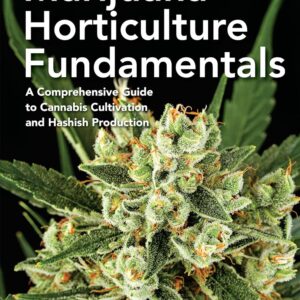
Marijuana Horticulture Fundamentals: A Comprehensive Guide to Cannabis Cultivation and Hashish Production
$30.00 Buy Now -

Marijuana Horticulture: Big Buds, Growers guide to get the biggest yields from your plants (Growing Marijuana, Marijuana Cultivation, Cannabis, Medical Marijuana, Marijuana Horticulture)
$0.99 Buy Now -
Sale!

Marijuana Horticulture: The Indoor/Outdoor Medical Grower’s Bible
$29.95Original price was: $29.95.$23.95Current price is: $23.95. Buy Now -

Marijuana Indoor Grow Guide: Expert Tips and Tricks for Successful Cannabis Cultivation
$3.99 Buy Now -

Marijuana Leaf Adjustable Hat Cap – Black
$11.95 Buy Now -

Marijuana Leaf MJ Mary Jane Smoking Happy Collection Dad Hat Baseball Cap Polo Style Adjustable Unisex
$14.99 Buy Now -

Marijuana Leaf Pot Weed Embroidered Dream Catcher (16 Inches Long)
$13.99 Buy Now -

Marijuana Leafs Pom Pom Acrylic Beanie Hat
$19.99 Buy Now -
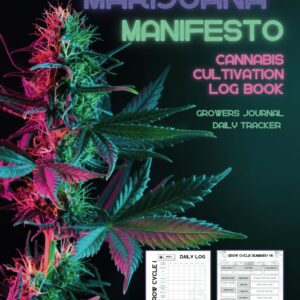
Marijuana Manifesto – Cannabis Cultivation Log Book: Growers Journal – Daily Tracker
$9.99 Buy Now -

Marijuana Pot Leaf Weed Skull Crossbody Chest Bag for Women Men, Daypack Sling Backpack for Travel Sport Running Hiking
$24.99 Buy Now -

Marijuana Skull Smoke Weed Cannabis 420 Pot Leaf Sugar Skull T-Shirt
$15.99 Buy Now -

Marijuana Stoner Cannabis Weed 420 Funny Unisex Adult Fashion Baseball Cap Fashion Adjustable Dad Hat Sport Cap
$20.59 Buy Now -

Marijuana Weed Cannabis Leaf – Joint T-Shirt
$19.99 Buy Now -

Marijuana-Cannabis Weed Bucket Hat Women Men Funny Fisherman Hat for Girls Cute Wide Brim Cap Beach Outdoor
$9.99 Buy Now -

MarkDomain 12 Rolls DK2205 (2.4″ X 100 Ft.) Continuous Length Labels Paper Tape, Compatible Brother Paper Roll (62mm x 30.4m) Use with QL QL-800 QL-820NWB QL-1060N QL-1110NWBC Label Printers
$42.99 Buy Now -

Marley Natural Walnut Tray – Enhancing Experience with Sustainable Craftsmanship and Magnetic Wooden Scraper (Large)
$39.99 Buy Now -
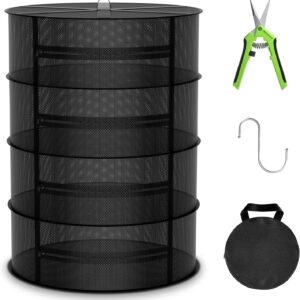
MARS HYDRO Herb Drying Rack, 2 ft 4 Layers Hanging Mesh Plant Racks with Zipper, Grow Tent Drying Rack for Herbs, Flowers, Seeds
$23.99 Buy Now -
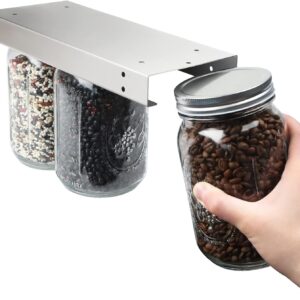
mason jar racks, mason jar holders,mason jar holders for hanging,Stainless Steel Holder with 3 Mounting Options for Kitchen, Shelves and Cabinets,Wide Mouth(2Pack
$22.99 Buy Now -
Sale!

Master Lock Pink Portable Small Lock Box, Set Your Own Lock Combination Portable Safe, Personal Travel Safe for Phone, Passport, Money, 5900DPNK
$25.99Original price was: $25.99.$23.20Current price is: $23.20. Buy Now -

Mastering the Art of Cannabis in Coco: The Ultimate Guide to Growing Premium Cannabis Indoors in Coco
$2.99 Buy Now -

Matace 1 Pack Rubber Large Boot Tray for Entryway,Long Shoe Tray,Slim Boot Mat for Indoor and Outdoor Use, 16×40 in
$32.99 Buy Now -
Sale!

Matte Black Toilet Paper Holder with Shelf, Fits Mega Rolls, Rustproof Stainless Steel, Self Adhesive Wall Mount Toilet Paper Roll Holder, for Bathroom, Washroom, Kitchen, RV
$9.99Original price was: $9.99.$8.99Current price is: $8.99. Buy Now -
Sale!

MAX Houser 3-Tier Rolling Utility Cart with Caster Wheels,Easy Assembly, for Kitchen, Bathroom (White)
$45.88Original price was: $45.88.$29.89Current price is: $29.89. Buy Now -

Maximizing the Power of Medical Cannabis: The Ultimate Handbook: Unlocking the Benefits of Medical Cannabis: A Comprehensive Guide for Optimal Health.
$11.99 Buy Now -
Sale!

MAYPLUSS Black Kraft Paper Roll -Mini Roll- 17in x 32.8ft(46.8sqft) Recyclable Paper Perfect for Gift Wrapping, Craft,Moving Packing,Table Runner,Floor Covering,Dunnage,Parcel,Party,Birthday Wedding
$9.99Original price was: $9.99.$8.99Current price is: $8.99. Buy Now -

MAYPLUSS Green Kraft Paper Roll – Jumbo Roll- 30in x 32.8FT (81.8sqft),Recyclable Wrapping Paper for Gift Wrapping, Craft,Table Runner,Dunnage,Parcel,Party,Birthday Wedding Green St.Patrick’s Day
$21.99 Buy Now -
Sale!
![McKesson Medical Exam Table Paper [12 Rolls] – Bed Table Sheet Cover Ideal for Diaper Changing, Waxing, Nursing, Chiropractor, Patternmaking, Tracing - Smooth Paper Roll - White, 21 in x 225 ft](https://mscannabiz.com/wp-content/uploads/2025/04/51kqKva9LEL._AC_SL1500_-300x300.jpg)
McKesson Medical Exam Table Paper [12 Rolls] – Bed Table Sheet Cover Ideal for Diaper Changing, Waxing, Nursing, Chiropractor, Patternmaking, Tracing – Smooth Paper Roll – White, 21 in x 225 ft
$54.99Original price was: $54.99.$52.24Current price is: $52.24. Buy Now -
Sale!
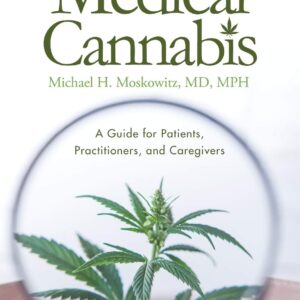
Medical Cannabis: A Guide for Patients, Practitioners, and Caregivers
$24.95Original price was: $24.95.$22.89Current price is: $22.89. Buy Now -

Medical Cannabis: The Beginner’s Handbook
$17.99 Buy Now -
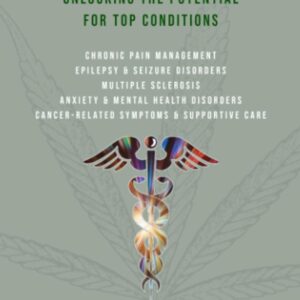
Medical Cannabis: Unlocking the Potential for Top Conditions
$4.99 Buy Now -
Sale!

Medical Rolling Bedside Table with Wheels, Over Bed Table with Storage, Serving Tray, Laptop Computer Desk for Elderly, Hospital Patient, Home Care, White
$99.98Original price was: $99.98.$79.99Current price is: $79.99. Buy Now -

Medusa Hippie Psychedelic Snakes Greek Mythology Women T-Shirt
$19.99 Buy Now -
Sale!

Melissa & Doug Wooden Tabletop Paper Roll Dispenser With White Bond Paper (12 inches x 75 feet) Drawing For Kids Art, Craft Roll For Kids
$24.99Original price was: $24.99.$21.43Current price is: $21.43. Buy Now -

Men Women Baseball Cap Marijuana Pot Leaf Weed Cannabis Embroidered Hat Trucker Hat Snapback Brim
$16.99 Buy Now -

Men’s Casual Polo Shirts Classic Button Basic Short Sleeve Shirt Solid Color Tees Golf Stylish Tops
$25.99 Buy Now -

Men’s Digital Print Sweatshirts Hooded Top Galaxy Pattern Hoodie
$25.99 Buy Now -

Men’s Fashion Henley Shirt Classic Short/Long Sleeve Lightweight Button Cotton T-Shirt Casual Top
$25.99 Buy Now -

Men’s Hawaiian Shirts Casual Button Down Shirt Short Sleeve Aloha Beach Shirts
$19.99 Buy Now -

Men’s High Vis Safety Work T Shirt ANSI Class 2 Reflective Long Sleeve Shirt with Pocket(Black,S)
$25.99 Buy Now -

Men’s White Weed Marijuana Leaf Cannabis 420 Long Sleeve T-Shirt
$11.95 Buy Now -

Mens First Aid T Shirt Funny 420 Marijuana Pot Leaf Graphic Weed Tee for Stoner
$14.99 Buy Now -

Mens It’s 4:20 Somewhere Tshirt Funny Marijuana Weed Smoking Novelty Tee
$11.99 Buy Now -

Mens IVXX 420 T Shirt Funny Graphic Weed Tee Cannabis CBD Pot 420 Gift for Stoners
$14.99 Buy Now -

Mens Need Weed T Shirt Funny 420 Pot Smoking Lovers Joke Tee for Guys
$9.99 Buy Now -

Mens Wake and Bake Tshirt Funny Morning Marijuana Legalization Tee for Guys
$14.99 Buy Now -

Metal Decor For Bathroom Wall Cannabis Knowledge Metal Tin Sign Vintage Decoration Garage Home Garden Cafes Kitchen Wall Antique Tin Signs 8×12 inch
$9.99 Buy Now -
Sale!

Metal Herb Grinder Rolling Tray Set, Bring a Suitcase Premium Grinder 7-in-1 Moisture-Proof Smell-Proof Bag Travel Set
$34.98Original price was: $34.98.$32.98Current price is: $32.98. Buy Now -
Sale!

Metal Marijuana Pot Leaf Weed Cannabis Accessory Jewelry Lapel Pin Perfect for Backpack, Hat or Lanyard by StockPins
$12.95Original price was: $12.95.$8.95Current price is: $8.95. Buy Now -
Sale!

Metal Rolling Tray – 7 x 5.5 inch, Smooth Rounded Corners, Classic Minimalist Aesthetic, Suitable for Home, Outdoor & Kitchen Use (Black)
$9.99Original price was: $9.99.$4.99Current price is: $4.99. Buy Now -

Metal Rolling Tray – Large 13″ x 11″ – Charizard Unique Trays
$18.95 Buy Now -

Metal Rolling Tray – Medium – 7″ x 11″ (Banana)
$12.99 Buy Now -

Metal Rolling Tray with Cone Loader 8.5″x3.8″ for King Size & 1 1/4 Pre Rolled Cones,Pre Rolled Paper & Foldable Stand – Smoking Trays Accessories for Travel & Home
$9.99 Buy Now -
Sale!

Metal Rolling Tray with Cone Loader for King Size &1 1/4 Size Pre Rolled Cones, Pre Roll Machine, Foldable Stand Cone Filler with Brush & Placement Device
$69.99Original price was: $69.99.$9.99Current price is: $9.99. Buy Now -

Metal Rolling Tray with Cone Loader Set 8.5 x 3.8 Inch, for King Size and 1 1/4 Size Cones Rolling Paper, Pre Roll Machine, Foldable Stand Rolling Table with Cone Filler, Brush, Tools
$7.99 Buy Now -
Sale!

Metal Rolling Tray, Foldable Cone Loader Tray Pre Roll Machine for King Size &1 1/4 Size Pre Rolled Cones Filler Funnel Double Rolling Tray with Full Accessoris (Yellow)
$18.99Original price was: $18.99.$15.99Current price is: $15.99. Buy Now -
Sale!

Metal Rolling Tray, Perfect Rolling Station, Easy to Carry, Floral Printing 7″ L x 5.5″ W
$8.99Original price was: $8.99.$6.99Current price is: $6.99. Buy Now -

Metal Tray with PVC Soft Magnetic Lid – Black, Large, Cute Decorative Tray for Home Decor, Coffee Table, Tea, Snacks, Gifts – 11″ x 7″
$14.99 Buy Now -

Metal Tray with PVC Soft Magnetic Lid Black Tray with Lid Cover Large Cute Decorative Tray for Home Decor, Coffee Table, Tea, Snacks, Gifts – 11″” x 7″” (Black-with lid)
$14.99 Buy Now -

Metal Tray with PVC Soft Magnetic Lid, 11″ x 7″ – Large Storage Decorative Tray for Home Decor, Coffee Table, Tea, Snacks, Gifts
$14.99 Buy Now -
Sale!

Metal Tray with Soft Magnetic Lid Black Tray with Spill Proof Cover Small Mini Rolling Trays Storage for Home or On-The-Go
$9.99Original price was: $9.99.$8.99Current price is: $8.99. Buy Now -
Sale!

Metal Tray with Soft Magnetic Lid,Metal Small Tray with Spill Proof Cover,Cute Black Decorative Tray,Perfect for Home and On-The-Go,7” x 5.5”(Black)
$32.99Original price was: $32.99.$9.95Current price is: $9.95. Buy Now -
Sale!

Metal Tray with Soft PVC Magnetic Lid Small Cute Decorative Tray Ideal Storage for Home or on The Go, 7″” x 5.5″” (Multicolor- Skulls)
$14.98Original price was: $14.98.$9.99Current price is: $9.99. Buy Now -

Metal Trays Large Cute Decorative Tray Ideal for Home Storage or on The Go,for Home Decor, Coffee Table, Tea, Snacks, Gifts – 11″ x 7″ (Green)
$9.99 Buy Now -

Metal Trays with PVC Soft Magnetic Lid Metal Tray with Lid Cover Small Cute Decorative Tray Ideal Storage for Home or on The Go, 7″ x 5.5″
$9.99 Buy Now -

METRONIC Brown Kraft Paper Roll 17.5″x 2400″(200′), Craft Wrapping Paper Gift Wrapping Bulletin Board Arts & Crafts, Bouquet Flower Table Covering Poster Packing Shipping Moving Supplies 75GSM
$14.99 Buy Now -

MFLABEL 50 Rolls Thermal Receipt Paper Rolls 3-1/8 x 230ft Thermal Paper Rolls
$127.64 Buy Now -

MicButty 42 Pieces Red Crepe Paper Rolls with Floral Tape, Floral Iron Wire for Crafts Wedding Festival Party Supplies DIY Flower Crafts
$9.99 Buy Now -

Migro Cannabis Grow Contactor 4 Pole, 60 AMP, 110/120 VAC Normally Open Coil Heavy Duty AC Contactor Replaces Virtually All Residential 4 Pole Models. Best On the Market for Cannabis Cultivation!
$67.99 Buy Now -

Migro Cannabis Grow Negative Ion Generator 110/120V High Density Plasma Ionizer Module. Best On The Market for Cannabis Cultivation!
$12.95 Buy Now -
Sale!

MinBoo Bamboo Appliance Slider,Sliding Tray for Coffee Maker, Kitchen Countertop Appliance Rolling Tray,Slides Easily from under the Cabinet,Wide -Black- Large (16″Wx13″D)
$57.99Original price was: $57.99.$33.99Current price is: $33.99. Buy Now -
Sale!
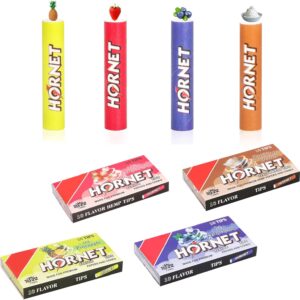
Mix Flavored Pre-Rolled Tips for Rolling Papers, Strawberry Blueberry Pineapple Cream, Ø7mm Filters (4 packs of 10)
$8.99Original price was: $8.99.$7.99Current price is: $7.99. Buy Now -

Mixer Slider for KitchenAid Stand Mixer 4.5-5 Qt,Sliding Tray Kitchen Appliance Slide Tray Mixer Mover with Smooth Rolling Wheels for Tilt-Head Stand Mixer, KitchenAid Artisan Tilt-Head Mixer
$30.99 Buy Now -

Molecule Cannabis Sprout Mesh Hat Outdoor Leisure Adjustable Curved Brim Baseball Cap Unisex
$14.99 Buy Now -

Molokai Surf Button Down Slim Fit Hawaiian Short Sleeve Shirts
$29.99 Buy Now -

MOON Wood Classic Cigarette Rolling Papers Tobacco Smoking Papers (70mm),50 Booklets
$14.99 Buy Now -

Mr Slick Smell Proof Bag 6″ with SK9 Premium odorless Technology US Patent Number D824,672
$14.95 Buy Now -

Multi-Function Salon Tray, Salon Rolling Tray cart (with Wheels), Multi-Function Tray for Hair Stylist, Adjustable Salon Color Tray., Black, DGN-01
$69.90 Buy Now -
Sale!
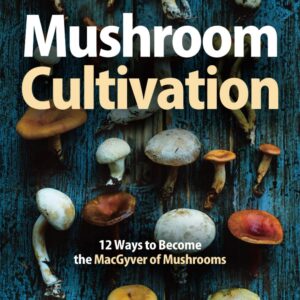
Mushroom Cultivation: 12 Ways to Become the MacGyver of Mushrooms
$16.99Original price was: $16.99.$15.29Current price is: $15.29. Buy Now -

Mushroom Hunting Mycology Foraging Morel Mushroom Hunter T-Shirt
$19.99 Buy Now -

Mushroom Lover, Morel Hunter, Vegan, Gardener, Mushroom T-Shirt
$19.99 Buy Now -

Mushroom Oven Mitts Pot Holders Set Silicone Vintage Magic Leaf Kitchen Gloves Potholders Heat Resistant for Chef Baking Cooking Grilling BBQ 4 Pack Mitt
$24.99 Buy Now -
Sale!

Mushroom Smell Proof Container Half Oz (250ml), Separate Space for Humidity Pack To Keep Herbs Fresh For Months – Cute Girly Stash Jar, Smell Proof Case Airtight Storage Holder Accessories – Purple
$34.98Original price was: $34.98.$15.99Current price is: $15.99. Buy Now -

MUUZLL 3 Pack 4.1Inch Bonsai Pruning Scissors, Bud And Leaves Trimmer Yarn Thread Cutter Snips Trimming Supplies, Garden Plants, Gardening Clippers Flower, Stainless Steel Pruners Trimmers
$5.99 Buy Now -

My Daughter Knows Everything | Funny Dad Father Joke T-Shirt
$14.99 Buy Now -

Mylar Bags with Ziplock 3.3 x 5.5″ | 100 Bags | Robins Blue Egg | Sealable Heat Seal Bags for Candy and Food Packaging, Medications and Vitamins | For Liquid and Solids (Robins Blue Egg, 3.3″ x 5.5″)
$10.99 Buy Now -

Nadex Rolled Coin Storage Organizer Tray Set with Ridges for Loose Coins | Quarters, Dimes, Nickles, and Penny Color Coded Trays
$27.49 Buy Now -

Nakraly Tracing Paper Roll 24 Inch x 60 Yards White Trace Paper Translucent Pattern Paper for Drawing Sewing
$23.99 Buy Now -

Native American Herbalist’s Bible: 14 books in 1: The A-Z Encyclopedia with 500+ Herbal Medicines & Plant Remedies. Grow Your Personal Garden & Herbal Apothecary to Heal Naturally & Regain Vitality
$24.97 Buy Now -
Sale!

Natural Unbleached Pre-Rolled Filter Tips, Ø7mm – Bottle of 500 Tips
$39.99Original price was: $39.99.$12.90Current price is: $12.90. Buy Now -
Sale!

Natural Unbleached Pre-Rolled Filter Tips, Ø8mm – Bottle of 500 Tips
$22.95Original price was: $22.95.$12.90Current price is: $12.90. Buy Now -

New Mexico Zia Sun Marijuana Cannabis Pot Leaf Accessory
$14.98 Buy Now -

New Top-O-Matic Cigarette Rolling Machine
$43.99 Buy Now -

Nicky Bigs Novelties Adult Cannabis Leaf Print Sun Visor Hats Marijuana Cap Sun Protection Outdoor, One Size
$9.99 Buy Now -

Nifty Large Appliance Rolling Tray – Silver, Home Kitchen Counter Organizer, Integrated Rolling System, Non-Slip Pad Top for Coffee Maker, Stand Mixer, Blender, Toaster
$34.99 Buy Now -

NJAN Weed Cannabis 420 Hat USA Hat AllBlack Womens Hat Gifts for Daughter Beach Cap
$17.99 Buy Now -
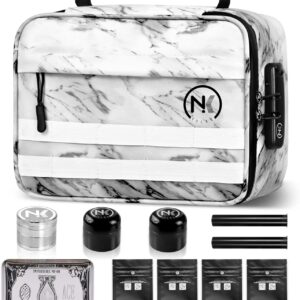
NKTOLEE Smell Proof Bag & Storage Box – Combination Lock, Resealable – Personal Organizer – Marble Case
$28.99 Buy Now -
Sale!

NLP Pre Rolled Cones | King Size Cones | 100 Pack | Organic Cones | Natural Rolling Paper with Tips Pre-Rolled Rolls Papers prerolled cone papers, King Size 109mm
$18.99Original price was: $18.99.$12.90Current price is: $12.90. Buy Now -
Sale!

Nordic Ware Naturals 3 Piece Set – USA Made Aluminum Commercial Quality Sheet Pan for Baking or Roasting, Encapsulated Galvanized Steel Rim Prevents Warping; Half Sheet, Jelly Roll and Quarter Sheet
$34.99Original price was: $34.99.$32.00Current price is: $32.00. Buy Now -

NORTHYARD Men’s UPF 50+ Sun Protection Shirts Swim SPF UV Quick Dry Short Sleeve T-Shirts for Athletic Fishing Rash Guard
$18.99 Buy Now -

NORTHYARD Men’s UPF 50+ Sun Protection Shirts Swim SPF UV Quick Dry Short Sleeve T-Shirts for Athletic Fishing Rash Guard
$18.99 Buy Now -
Sale!

Noverlife Salon Tray Cart on Wheels with Storage Platform, Tattoo Rolling Tray Height Adjustable Salon Service Cart, Iron SPA Rolling Trays Portable Tattoo Table Stand for Dental
$44.89Original price was: $44.89.$39.59Current price is: $39.59. Buy Now -

NY Paper Mill Brown Kraft Paper 17.50″ x 2400″ (200 feet) Jumbo Roll, Ideal for Gift Wrapping, Art & Craft, Postal, Packing, Shipping, Floor Covering, Parcel, Table Runner, 100% Recycled Made in USA
$17.89 Buy Now -

NYEAR 6 Rolls A4 Quick-dry Thermal Paper (210mm/8.27″width/7.6m long,Φ1.18″) for portable printer,thicker brighter and the font is clearer to make the printing quality better, (1 roll-27 Sheets)
$14.99 Buy Now -

OCB Bamboo 1 1/4 Rolling Paper & Tips – 3 Packs – 50 Papers/Tips Each
$9.99 Buy Now -

OCB Bamboo 1 1/4 Size Cones ~ 6 Packs of 6 ~ (36 Cones Total) Unbleached Pre Rolled Rolling Paper with Tips, Includes ARC Saver Tube
$17.24 Buy Now -

OCB Bamboo Pre-Rolled Mini Cones, 2.75 Inch / 70mm (320 Total Cones) Ultra-Thin Natural Rolling Papers with Tips – Slow Burning, 100% Bamboo Fibers, Natural Acacia Gum
$61.80 Buy Now -

OCB Bamboo Rolling Papers ~ 1-1/4 + Tips ~ 6 Pack ~ Includes American Rolling Club Tube
$13.87 Buy Now -

OCB Bamboo Rolling Papers King Slim w/Tips 110mm Ultra Thin (3 Pack)
$8.99 Buy Now -

OCB Bamboo Unbleached Pre-Rolled Rolling Paper Cones 1-1/4 (84mm) Size – 50 Cones
$13.97 Buy Now -

OCB Brown Rice Cigarette Rolling Paper 1 1/4 – Pack of 5
$12.22 Buy Now -

OCB Organic 1 1/4 Rolling Paper & Tips – 3 Packs – 50 Papers/Tips Each
$9.98 Buy Now -

OCB Organic Cigarette Rolling Papers ~ 1-1/4 + Tips ~ 6 Pack ~ Includes American Rolling Club Tube
$14.51 Buy Now -

OCB Organic Cigarette Rolling Papers ~ King Size Slim + Tips ~ 3 Pack ~ Includes American Rolling Club Tube
$9.99 Buy Now -

OCB Organic Hemp 1 1/4 Rolling Papers – 3 Packs – 50 Papers Each
$7.91 Buy Now -

OCB Organic Hemp Unbleached Pre-Rolled Rolling Paper Cones 1-1/4 (84mm) Size – 50 Cones
$12.46 Buy Now -

OCB Organic King Slim Size Ultra thin Rolling Papers with Tips Full Box (24 Pack)
$53.99 Buy Now -

OCB Organic Virgin Hemp Rolling Papers 1 1/4 Stack Pack – 300 Leaves Total!
$5.99 Buy Now -

OCB Premium 1 1/4 Rolling Paper & Tips – 3 Packs – 50 Papers/Tips Each
$8.16 Buy Now -
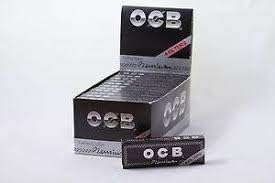
OCB Premium 1 1/4 with Tips – 24pc Display
$43.29 Buy Now -
Sale!

Ocb Premium King Size Slim Rolling Paper Full Box of 50 Packs
$29.54Original price was: $29.54.$28.08Current price is: $28.08. Buy Now -
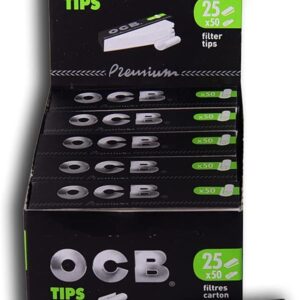
OCB Premium Tips for Cigarette Papers | Full Box = 25 Packs | 1250 Tips Total | Chlorine & Chemical Free | Includes ARC Saver
$25.46 Buy Now -

OCB Slim King Organic Rolling Papers – 3 Packs
$7.97 Buy Now -
Sale!

OCB Solaire Slim Size (110mm) Rolling Papers with Tips (3 Pack)
$29.95Original price was: $29.95.$9.85Current price is: $9.85. Buy Now -

OCB Sophistique 1 1/4 Rolling Paper & Tips – 3 Packs – 50 Papers/Tips Each
$9.88 Buy Now -

OCB Unbleached Organic Single Wide 70mm rolling paper paper – 3 booklets / 150 paper
$6.36 Buy Now -
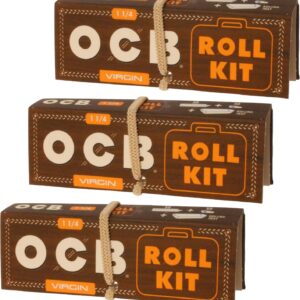
OCB Virgin 1 1/4 Roll Kit incl. Paper/Tips/Rolling Tray (3 Pack)
$3.99 Buy Now -

OCB Virgin 1 1/4 Size Cones ~ 6 Packs of 6 ~ (36 Cones Total) Unbleached Pre Rolled Rolling Papers with Tips ~ Includes American Rolling Club Tube
$17.05 Buy Now -

OCB Virgin King Size Cones | 50ct Pack | Unbleached Pre Rolled Cigarette Paper with Tips and Packing Sticks ~ Includes ARC Saver (50 Count)
$15.99 Buy Now -
Sale!

OCB Virgin King Size Slim Unbleached Rolling Paper – 1 Box (Total 1600 Papers)
$33.91Original price was: $33.91.$29.31Current price is: $29.31. Buy Now -
Sale!
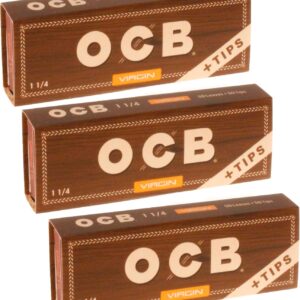
OCB Virgin Organic 1 1/4 Rolling Paper & Tips – 3 Packs – 50 Papers/Tips Each
$29.95Original price was: $29.95.$9.69Current price is: $9.69. Buy Now -

OCB Virgin Prerolled Cones | 1-1/4 Size | 150ct Pack | Unbleached Pre-Rolled Cigarette Paper with Tips and Packing Sticks ~ Includes ARC Saver (150 Count)
$27.91 Buy Now -

OCB Virgin Prerolled Cones | 1-1/4 Size | 75ct Pack | Unbleached Pre-Rolled Cigarette Paper with Tips and Packing Sticks ~ Includes ARC Saver (75 Count)
$19.12 Buy Now -

OCB Virgin”Slim” Roll Kit incl. Paper/Tips/Rolling Tray (3 Pack)
$3.99 Buy Now -

OCB X-Pert 1 1/4 Rolling Papers – 3 packs – 50 papers each
$9.99 Buy Now -
Sale!

Odor Proof Food Storage Bear Bags Reusable Zipper Barrier Bags Airtight Bags Keep Fresh and Waterproof for Backpacking, Camping, Outdoor Bear Proof Refrigerator Freezing (2 Pack)
$12.99Original price was: $12.99.$11.63Current price is: $11.63. Buy Now -
Sale!

Odor Proof Storage Bags – 12x20 Inch Double Seal Odor Barrier Storage Bags for Backpacking, Camping and Household, Lock in Odors Keep Contents Fresh and Waterproof, Reusable Odor Proof Bags (2 Pack)
$14.59Original price was: $14.59.$13.88Current price is: $13.88. Buy Now -

Odor Proof Storage Bags-12x20 Inch, Reusable Double-Tracked Zip Closure Barrier Storage Bags Lock in Odors Keep Contents Fresh and Waterproof, Large No-Odor Bear Bag fit Camping, Hiking, Water Sports and Home Organization(2 Pack)
$15.99 Buy Now -
Sale!

Offical 1 Ounce Bags – 50 Pack Terpene Curing 58%-62% RH Humidity 2-Way Control Lock & Seal Storage & Curing Bags Heat Sealable 6″ x 9.8″ x 3.15″ Inch (1oz, 28g)
$37.99Original price was: $37.99.$19.99Current price is: $19.99. Buy Now -

onesimcr Honeycomb Packing Paper Wrap 15″x131′ Sustainable Alternative to Bubble Wrap for Moving/shipping/packing Roll with 20 Fragile Sticker Biodegradable & Fully Recylable…
$16.99 Buy Now -

ONGROK Carbon Technology Lockable Pouch, Bamboo Derived, Durable Sealed Waterproof Zipper, Combo Locking Wallet to Stash Away Goods with Care | 2.0 Model – Small
$24.99 Buy Now -

ONGROK Glass Storage Jar, 80ml, 6 Pack, Color-Coded Airtight Containers, UV Herb/Spice Jar to with Child Resistant Lid, Perfect Size to Store in a Drawer or Cupboard
$29.99 Buy Now -

only warm Smoke Arsenal Premium Medium Rolling Tray 11×7 Multicolor
$14.98 Buy Now -

Organic Cannabis Cultivation: A Complete Beginner-To-Intermediate Guide For Growing Cannabis Organically
$24.99 Buy Now -

Outlaw Justice Biker T Shirt for Men with Skull and Pistols Graphic – American Patriotic Motorcycle Shirts – 2A Amendment
Read more -

Outlaw Justice Biker T Shirt for Men with Skull and Pistols Graphic – American Patriotic Motorcycle Shirts – 2A Amendment
$23.95 Buy Now -
Sale!

OZCHIN Aluminum Metal Tube Conetainer 4.5-inch Fits King Size, Airtight, Lightweight, Fit in Pocket Great for Traveling
$22.98Original price was: $22.98.$9.99Current price is: $9.99. Buy Now -
Sale!

OZCHIN Aluminum Storage Jar Portable Airtight Smell Proof Container Bottle Multipurpose Storage Container for Spices, Coffee & Teas 80ml (Rose Gold&Purple)
$10.99Original price was: $10.99.$9.99Current price is: $9.99. Buy Now -
Sale!

OZCHIN Aluminum Storage Jar Portable Airtight Smell Proof Container Bottle Multipurpose Storage Container for Spices, Coffee & Teas 80ml (Silver&Black)
$9.99Original price was: $9.99.$8.99Current price is: $8.99. Buy Now -
Sale!

OZCHIN Backpack With Combination Lock, Double Sealed Zipper Classics Carbon Lined Travel Backpack Great Gifts for Men Women (Black)
$45.99Original price was: $45.99.$35.99Current price is: $35.99. Buy Now -
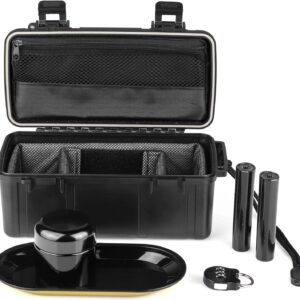
OZCHIN Black Storage Box Resistant Storage Container with Combination Lock ABS Plastic Storage Box (Box Set)
$29.99 Buy Now -
Sale!

OZCHIN Large Bamboo Box with Combination Lock Decorative box for Home Locking Storage Bamboo Box (Nature)
$32.99Original price was: $32.99.$29.99Current price is: $29.99. Buy Now -
Sale!

OZCHIN Large Smell Proof Bag with Combination Lock Odor Proof Lock Box Bag Travel Storage Case Activated Charcoal Bag Great Christmas Gift (Flower)
$32.99Original price was: $32.99.$29.99Current price is: $29.99. Buy Now -
Sale!

OZCHIN Large Smell Proof Bag with Combination Lock Odor Proof Lock Box Travel Storage Case Activated Charcoal Bag Great Christmas Gift (Jet Black)
$75.00Original price was: $75.00.$29.99Current price is: $29.99. Buy Now -

OZCHIN Large Storage Box with Combination Lock Carbon Lining Locking Bag Stylish and Portable Travel Bag Organizer Lockable Box, Great Gift for Mother’s Day(Grey)
$28.99 Buy Now -
Sale!

OZCHIN Smell Proof Bag with Combination Lock 10 X 7 inchs Locking Bag PU Leather Waterproof Lockable Case Great Gift Ideal
$12.99Original price was: $12.99.$11.69Current price is: $11.69. Buy Now -

OZCHIN Smell Proof Bag with Combination Lock 10” X 7” Smell Proof Bag Set PU Leather Lockable Case Great Gifts Ideal (Purple)
$19.99 Buy Now -

OZCHIN Smell Proof Bag with Combination Lock 9.5″ x 6″ x 3.5″ File Organizer Case Container Medicine Lock Bag Travel Storage Case Safe Bag for Documents and Valuables Storage
$19.99 Buy Now -
Sale!

OZCHIN Smell Proof Bag with Combination Lock Certificates Organizer PU Leather Lock Bag Travel Storage Case 10 x 7 inches Great Christmas Gifts for Women(Pink)
$18.99Original price was: $18.99.$12.99Current price is: $12.99. Buy Now -

OZCHIN Smell Proof Bag with Combination Lock Shockproof Hard Shell Carrying Case Smoking Tobacco Bag Odorless Pouch Medicine Organizer Case Container Travel Bag (Grey) 8.07″ x 6.69″ x 3.50″
$19.99 Buy Now -
Sale!

OZCHIN Smell Proof Bag with Combination Lock Tobacco Pipe Pouch Bag File Organizer Case Container Medicine Lock Box Odorless Storage Bag Great Gift for Friend
$39.98Original price was: $39.98.$29.99Current price is: $29.99. Buy Now -
Sale!

OZCHIN Smell Proof Bag with Combination Lock Tobacco Pipe Pouch Bag File Organizer Case Container Medicine Lock Box Odorless Storage Bag Great Gift for Friend
$39.98Original price was: $39.98.$29.99Current price is: $29.99. Buy Now -

OZCHIN Smell Proof Bag with Water Repellent Zipper, Portable & Compact Handheld Pouch, Multi-Use Medicine & Travel Organizer, 8” x 7”, Perfect for Everyday Carry
$9.99 Buy Now -

OZCHIN Smell Proof Bags Money Bag Certificates Organizer Lock Bag Travel Storage Case 11 x 8 inch with Combination Lock
$12.99 Buy Now -
Sale!

PABCK 100 Pack 5.5×7.9 inch (Inside Size 5.1×6.3 inch) Clear Front Resealable Heat Seal Bags for Zip Bulk Food Storage Lock Bag Reclosable Airtight Foil Pouch Zipper Lock Packaging with Tear Notches
$18.99Original price was: $18.99.$16.99Current price is: $16.99. Buy Now -

PABCK 100 Pack Clear WindowBrown Kraft Paper for Zip Seed Packets Lock Food Storage Bags Zipper Lock Seeds Envelopes Resealable Heat Seal Pouch Coffee Packet (3.5×5.1 inch (Inner Size 3.1×3.9 inch))
$17.85 Buy Now -

PABCK 100 Pack Resealable Stand Up Bags Matte Clear Zipper Lock Heat Seal Pouches with Tear Notch for Zip Food Storage Lock Packing 14x20cm (5.5×7.9 inch)
$26.84 Buy Now -

PABCK 100 Pack Small Black Kraft Paper Resealable Bags 2.7×3.5 inch (Inner Size 2.36×2.36 inch) with Clear Window Heat Seal Airtight Pouch for Zip Food Storage Lock Coffee Snack Packaging
$14.58 Buy Now -

PABCK 100 Pcs Clear Mylar Bags Matte Black 2.9×3.9inch (2.5×2.7inch inside size) Heat Seal Resealable Airtight Zipper Lock Pouch for Zip Reclosable Lock Food Storage Grocery Pack
$9.66 Buy Now -

PABCK 100 Pieces Black Reclosable Zip Bags 5.1mil Thickness Poly Plastic Packaging Resealable Zipper Lock Closure Bag for Storage (3.1×4.7 inch)
$7.98 Buy Now -

PABCK 100 Pieces Black Reclosable Zip Bags 5.1mil Thickness Poly Plastic Packaging Resealable Zipper Lock Closure Bag for Storage (3.9×5.9 inch)
$15.08 Buy Now -
Sale!

PABCK 100 Pieces Resealable Airtight Matte Window Zipper Lock Bags with Euro Hang Hole 2.3×3.9 inch(Inside Size 1.9×2.5inch) for Zip Food Storage Lock Pouch
$13.99Original price was: $13.99.$6.89Current price is: $6.89. Buy Now -

PABCK 200 Pcs Clear Mylar Bag 2.3×3.9 inch (Inside Size 1.9×2.5 inch) Resealable Foil Pouch Heat Seal Bags with Hang Hole for Zip Food Storage Lock Bag Reclosable Airtight Zipper Lock Packaging
$0.08 Buy Now -

PABCK Stand-Up Resealable Heat Seal Bags 3.55mil Thick Mylar Frosted Black Foil Sealed Bags 50 Pieces 3.35×5.1 inch for Zip Packaging Lock Food Storage Pouch
$7.66 Buy Now -

Pacific Blue Basic Recycled Paper Towel Roll by GP PRO (Georgia-Pacific), Brown, 26401, 350 Feet Per Roll, 12 Rolls Per Case
$43.89 Buy Now -

Pacific Blue Ultra 8″ High-Capacity Recycled Paper Towel Rolls by GP PRO (Georgia-Pacific), White, 26491, 1,150 Linear Feet Per Roll, 3 Rolls Per Case
$36.71 Buy Now -

Palmyth Men’s Fishing Shirt Short Sleeve Sun Protection UV UPF 50+ SPF T-Shirt
$24.98 Buy Now -
Sale!
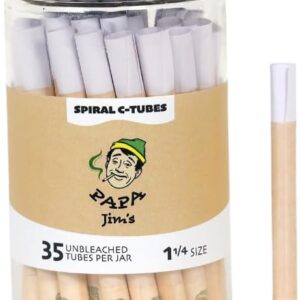
Papa Jims Pre-Rolled Cones C-Tube | 35 tubes | 84mm – 1 1/4″ size | with exclusive premium spiral tips | No debris or residue | Unbleached Classic | Finest Paper from France
$12.99Original price was: $12.99.$9.99Current price is: $9.99. Buy Now -

Parchment Paper – Brown Natural Baking Paper Roll – Unbleached FSC Certified – Non-Toxic, Chlorine Free Non-Stick Silicone Coated Oven-Safe Paper, 70 Sq Ft
$10.81 Buy Now -
Sale!

PerkHomy 17.5″ x 1,200″ (100′) Brown Kraft Paper Roll for Gift Wrapping Bulletin Board Kids Craft Art Bouquet Flower Packing Moving Shipping Floor Covering Table 70GSM 50LB (Brown, 17.5″ x 100′)
$7.99Original price was: $7.99.$6.99Current price is: $6.99. Buy Now -

PerkHomy 36″ x 2,400″ (200′) Light Purple Kraft Paper Roll for Craft Bulletin Board Paper Kids Art Table Covering Crafting Gift Wrapping Bouquet Packing Parcel 80GSM 55LB (Light Purple, 36″ x 200′)
$44.99 Buy Now -

Permacharts CDB Treatments for Pets Quick Reference Guide – Cannabis Educational Series
$7.95 Buy Now -
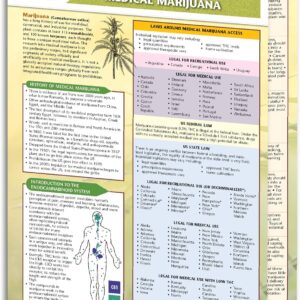
Permacharts Medical Cannabinoids – CBD 101 Quick Reference Guide – Educational Series
$7.95 Buy Now -
Sale!

Pink Butcher Paper Roll 18″x175′ (2100 Inch) – Food-Grade Peach Butcher Paper for Smoker, BBQ, Grilling, Smoking Meat – USA Made – Unbleached, Uncoated and Unwaxed
$23.99Original price was: $23.99.$16.97Current price is: $16.97. Buy Now -
Sale!

Pink Butcher Paper Roll With Dispenser Box – 17.25 Inch by 175 Foot Roll of Food Grade Peach BBQ Butcher Paper for Smoking Meat – Unbleached, Unwaxed and Uncoated – Made in the USA
$27.99Original price was: $27.99.$17.49Current price is: $17.49. Buy Now -

Pink Cones Pre Rolled 1 1/4 Size 50 Pack Classic Rolling Paper Tubes Natural Mystic Cones Prerolls Rolling Papers with Tips Use Cone Loader Packing Sticks
$7.99 Buy Now -
Sale!

Pink Papers – King Size Slim Deluxe Kit, Single Unit
$8.99Original price was: $8.99.$6.99Current price is: $6.99. Buy Now -
Sale!
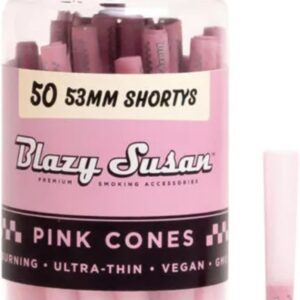
Pink Pre-Rolled Cones, 50 Count (53mm Mini) – Slow-Burning Rolling Paper & Ultra-Thin Preroll Cones with Filter Tips – Vegan, GMO-Free, Convenient & Easy-To-Use Prerolled Shortys
$16.50Original price was: $16.50.$13.15Current price is: $13.15. Buy Now -
Sale!

Pink Pre-Rolled Filter Tips 100ct Ready To Use
$9.99Original price was: $9.99.$9.90Current price is: $9.90. Buy Now -

Pink PU Leather Cosmetic Bag with Combination Lock, Heavy Duty Makeup Box case with Shoulder Strap for Home and Travel, Great Gift for Women.
$24.99 Buy Now -

Pink Ribbon Sugar Skull Smoking Weed Cannabis Mexican Gift PopSockets Grip and Stand for Phones and Tablets
$11.72 Buy Now -

Pink Rolling Papers, 78mm
$20.00 Buy Now -
Sale!

Pink Rolling Tray Anime Ash Tray for Girls Cute Ashtray Premium Metal Kawaii Home Decor Gold Plating Cute Jewelry Holder Japanese Decorative Plate Serving Plate(CAT F)
$11.99Original price was: $11.99.$9.77Current price is: $9.77. Buy Now -

Pink Rolling Tray Girly – Cute Rolling Trays Premium Metal Large Tray with Design – Unique Gifts for Women Girls Mom, Travel Accessories, 11.3” X 7.4” (Large, TPG)
$9.99 Buy Now -

Pink Safe Locking Box With 6 PCS Accessories, Premium Medicine Storage Case,Childproof Pill Box Organizer, Lock box for Valuables, (Pink Set)
$26.99 Buy Now -

Pipe Cleaners Bulk (200 Hard Bristle) Easily Cleans and Craft! Arts and Crafts, Glass and Pipe Smoking, Glass Pipe Cleaner, Pipe Cleaner for Cleaning, Glass Pipes Smoking, Pipecleaners
$6.99 Buy Now -
Sale!

Pipishell 3 Tier Rolling Cart Organizer, Plastic Rolling Cart with Lockable Wheels & Reinforced Handle, Lightweight Utility Cart Storage Cart for Nursery, Kitchen, Bathroom, Craft Room, White, PIUC14W
$23.99Original price was: $23.99.$19.99Current price is: $19.99. Buy Now -
Sale!

Pipishell 3 Tier Rolling Cart with Table Top, Utility Cart with Wheels & 4 Hooks, Rolling Storage Cart for Home Storage and Organization, White, PIUC09W
$36.96Original price was: $36.96.$27.99Current price is: $27.99. Buy Now -

PJ BOLD Marijuana Leaf Silicone Soap Mold Tray, 2 Pack, 12 Cavities
$15.99 Buy Now -

PJ BOLD Marijuana Weed Leaf Gummy Molds Silicone Candy Mold Kit – 3 Pack
$14.99 Buy Now -

PJ BOLD Silicone Butter Mold Tray with Lid, Purple
$13.99 Buy Now -

PM Company Perfection One Ply Blended Bond Paper Rolls, 3 X 165 Feet, White, 50 Rolls Per Carton (07927)
$49.00 Buy Now -
Sale!

PM Company PMC05214 POS/Cash Register 3 1/8 Inch x 230 Feet 50 Rolls Per Unit
$62.99Original price was: $62.99.$41.99Current price is: $41.99. Buy Now -

POARMEEY 3-Tier Tattoo Trolley Holder Stand with Tray and Tool Storage Platform Rolling Cart on Wheels for Tattoo Salon Spa Clinics Office Home Use
$124.99 Buy Now -
Sale!

POARMEEY Salon Tray Cart with Extension Tool Tray Tattoo Rolling Cart on Wheels TattooTable Station Adjustable Height for Tattoo Salon Studio
$119.99Original price was: $119.99.$89.99Current price is: $89.99. Buy Now -
Sale!

POARMEEY Tattoo Tray Cart Salon Tray with Wheels Rolling Tray Table Station Adjustable Height with Multiple Storage for Tattoo Studio Salon Medical
$109.99Original price was: $109.99.$99.99Current price is: $99.99. Buy Now -
Sale!

PODAHO Extra Large Cosmetic Bag with 5 PCS Accessories, Waterproof XL Makeup Box Case with Lock, Premium Kitchen Organizer Storage Containers Box for Storing Your Products, 10 X 8 X 4 Inches, Black
$39.99Original price was: $39.99.$27.32Current price is: $27.32. Buy Now -
Sale!

PODAHO Large Smell Proof Bag Set with 10 Tobacco Items, Carbon Lined Smell Proof Box Case with Combination Lock, Odor Proof Containers Pouch for Smoking Products, Great Gift for Women, (Pink Set)
$75.00Original price was: $75.00.$34.80Current price is: $34.80. Buy Now -
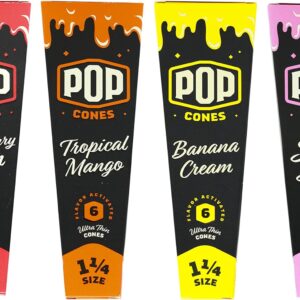
Pop Cones- Cones with a Flavor Burst Pop ( Wraps, Papers, Cones) (All 4 Flavors, 1 1/4), Red, Yellow, Blue, Orange
$12.99 Buy Now -
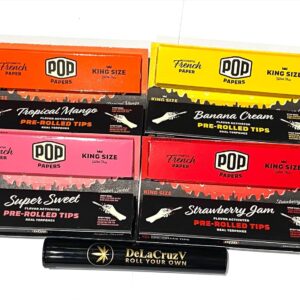
POP King Size Cigarette Rolling paper with Pre-rolle-tips, Mix Flavor (super sweet, banana cream, tropical mango, strawberry), with DeLaCruzV tube.
$14.99 Buy Now -

Popfizzy Livin’ the High Life Sign, Funny Weed Sign, Stoner Room Decor, Weed Decor, Gift for Stoners, Pot Leaf Sign, Marijuana Wall Decor, Cannabis Sign, 420 Decor, Weed Themed Gift, 5×10”
$12.50 Buy Now -

Popfizzy Smoke Weed Every Day, Weed Wall Decor, Funny Marijuana Signs, Funny Stoner Signs, Weed Gifts, Stoner Gifts, Funny Weed Room Decor, Pot Leaf Sign, Funny Wall Decor, Cannabis Sign, 5×10
$12.50 Buy Now -

Popfizzy Weed Hat for Women, Flatbill Marijuana Snapback Cap, Pink Weed Accessories, Pot Leaf Hat, Weed Gifts, Stoner Gifts
$17.50 Buy Now -

Popfizzy Weed Hat, Mens Pot Leaf Hats, Marijuana Snapback Cap, Cannabis Baseball Caps, Hip-Hop Hats, Weed Gifts for Stoners
$17.97 Buy Now -

Popfizzy Weed Hat, Pot Leaf Hats, Cannabis Snapback Cap, Marijuana Baseball Caps, Marijuana Leaf Hat, Weed Gifts for Stoners
$17.75 Buy Now -

Popfizzy Weed Hat, Unisex Cannabis Baseball Caps, Pot Leaf Hats, Marijuana Snapback Cap, Weed Gifts for Stoners, Rapper Hats
$18.79 Buy Now -

Popfizzy Weed Hat, Unisex Pot Leaf Hats, Cannabis Baseball Caps, Hip-Hop Hats, Marijuana Snapback Cap, Weed Gifts for Stoners
$19.56 Buy Now -

Popfizzy Womens Rhinestone Hat, Bling Denim and Diamonds Hat, Bling Gifts, Bedazzled Mom Hat, Fun Womens Baseball Caps Trendy
$17.50 Buy Now -

Popfunk Classic Batman in Japanese T Shirt & Stickers
$23.99 Buy Now -
Sale!

Portable Aluminum Storage Jar 3-Pack, Airtight Smell Proof Metal Bottle, Multipurpose Container for Coffee & Teas, Herb & Spice Screw-Top Lid Lock Odor
$26.99Original price was: $26.99.$7.99Current price is: $7.99. Buy Now -

Portable Mini Hookah Set with Shisha Accessories Handheld Hookahs Set HT9527 Gifts for Boyfriend Father Husband or friends Golden
$15.99 Buy Now -
Sale!

Portable Small Smell Proof Bag – Portable Small Smell Proof Pouch Help Absorb and Lock in Odors Making Them The Perfect Choice for Storing Tobacco Related Accessories and Medical Essentials(Black)
$18.99Original price was: $18.99.$11.97Current price is: $11.97. Buy Now -
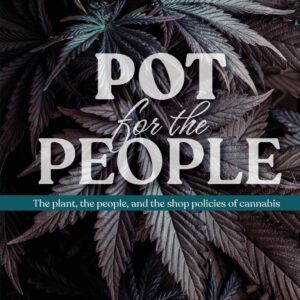
Pot for the People: The plant, the people, and the shop policies of cannabis
$19.54 Buy Now -

Pot Leaf – Marijuana Weed Cannabis Golf Hat
$13.00 Buy Now -

Pre Roll Machine, Mivikee Cigarette Rolling Machine, Rolling Tray Set for Cone, Cone Loader for King Size&1 1/4 Size, Includes Foldable Stand Cone Filler, Cone Funnel & Brush
$7.99 Buy Now -
Sale!

Pre rolled cone |Rolling Papers Cones| (4.33inch/110mm) | 100 Pack | 110mm Slow burning brown rolling papers
$150.00Original price was: $150.00.$5.99Current price is: $5.99. Buy Now -
Sale!

Pre Rolled Cones | 1-1/4 Cones | 100 Pack | Unbleached | Organic Cones | Made in Bali | Natural Rolling Paper with Tips | Pre-Rolled Cones | Pre Rolls | Rolling Papers cones | prerolled cones
$49.97Original price was: $49.97.$9.90Current price is: $9.90. Buy Now -

Pre Rolled Cones | 200 Pack Natural Unbleached cones rolling papers | Classic King Size | Tips and Packing Tubes Included | bong | cones
$13.99 Buy Now -

Pre Rolled Cones | Organic Rolling Papers | 50ct 1 1/4 Size with Tips – Slow Burn, Sturdy Natural Gum Seal, Ultra Thin with Plastic Cone in Popular Colors (Purple, 1 1/4 Size)
$6.99 Buy Now -
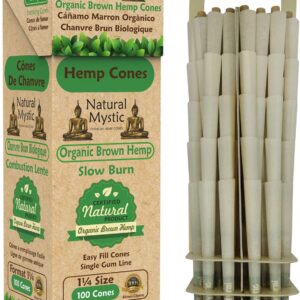
Pre Rolled Cones 1 1/4 Size – 100 Brown Classic Paper Tubes Natural Mystic Organic Rolling Papers With Tips Use Cone Loader Packing Sticks
$21.99 Buy Now -

Pre Rolled Cones 1 1/4 Size – 50 Brown Classic Paper Tubes Natural Mystic Organic Rolling Papers With Tips Use Cone Loader Packing Sticks
$8.99 Buy Now -

Pre Rolled Cones 1 1/4 Size 100 Pack, Natural Unbleached Rolling Papers with W-shaped Tips, Slow & Even Burning Preroll Cones Packing Tubes Included for Party Gift (84mm)
$8.99 Buy Now -

Pre Rolled Cones 1 1/4 Size 1000 Pack | Natural Brown | Bulk Pre-Rolled Cones with “Crown” Filter Tip | Natural Unbleached Rolling Paper (A80C00)
$46.88 Buy Now -

Pre Rolled Cones 1 1/4 Size 50 Pack, Natural Unbleached Rolling Papers with W-shaped Tips, Slow & Even Burning Preroll Cones, Packing Tubes Included for Party Gift (84mm)
$5.99 Buy Now -

Pre Rolled Cones 1 1/4 Size Organic Rolling Papers with Tips 100 ct – Slow Burn, Sturdy Natural Gum Seal, Ultra Thin with Plastic Cone. Unbleached Rolling Cones in Natural Color (1 1/4 Size)
$8.99 Buy Now -

Pre Rolled Cones Cone Loader – 1 1/4 Hemp Cones Funnel Tool For King Size Cones Rolling Papers Prerolled With Tips Packing Stick Cigarette Prerolls Packer | Grinder Brush Cleaner For Herb Grinders
$5.99 Buy Now -

Pre Rolled Cones King Size – 100 Brown Classic Paper Tubes Natural Mystic Organic Rolling Papers With Tips Use Cone Loader Packing Sticks
$21.99 Buy Now -

Pre Rolled Cones King Size – 50 Pack Hemp Rolling Paper Unbleached Brown Organic Fibers Classic Preroll Natural Mystic Pre Roll Papers With Filter Tips Use Cone Loader Filling Packing Sticks
$8.99 Buy Now -
Sale!

Pre-Rolled Green Cone, 4 Packs of 32 PCS Cones of 1 1/4 Size Rolling Papers with Tips (78mm)
$19.99Original price was: $19.99.$15.99Current price is: $15.99. Buy Now -

Pre-Rolled Mini Size Hemp Rolls with Reusable Glass Tips – 4PK | 12ct Display | Hand-Rolled, Natural Hemp Paper Rolls in Protective Case for Smooth, Clean Burn and Freshness – (Grape)
$32.85 Buy Now -
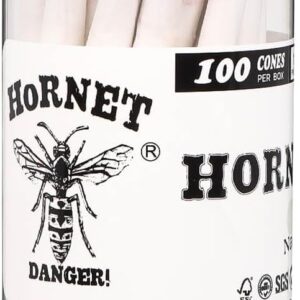
Pre-Rolled White Cone, 100 PCs Cones of 1 1/4 Size, Rolling Papers with Tips (78mm)
$11.99 Buy Now -
Sale!

Premium Aluminum Instrument Salon Tray Tattoo Rolling Tray Station-Silver
$79.47Original price was: $79.47.$46.74Current price is: $46.74. Buy Now -
Sale!

Premium Aluminum Salon Tray, Sturdy Corrosion-Resistant Adjustable Tray is Used for Salon Tray on Wheels, Salon Tool/Color Tray, Beauty Spa Tray, Dentist Tray, Etc.…(Gold)
$49.79Original price was: $49.79.$46.72Current price is: $46.72. Buy Now -
Sale!

Premium Carbon Lined Smell Proof Bag with Combination Lock | Multi-Use Organization Bag with Accessories | Storage and Containers kit | Stash box | Birthday Gifts for Men/Women.
$49.98Original price was: $49.98.$39.98Current price is: $39.98. Buy Now -
Sale!

Premium No Smell Container with Mesh Divider,Smell Proof Bag 7″ x 6″ Smellproof Odorless Stash Storage Pouch & Case – Eliminate Odor, Stink, and Smelly Scent in a Carbon Lined Airtight Storage Sack
$9.99Original price was: $9.99.$7.88Current price is: $7.88. Buy Now -

Premium Portable Air Tight Metal Tube Container, Fits in Pocket or Purse, Lightweight and Travel-Friendly (3 Pack)
$12.99 Buy Now -

Premium Pre Rolled Cones 0.5g (1 1/4, 84mm) – with Reusable Ceramic Tip, Easy Fill & Slow Burn, Comes in a To-Go Tube & Filling Stick – Unrefined Brown Rolling Paper – 6 Count Single Box
$9.98 Buy Now -

Premium Reversible Marijuana Leaf Bucket Hat | Stylish Unisex Fisherman Cap for Sun Protection
$10.95 Buy Now -
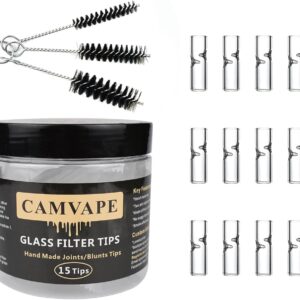
Premium Small Size Glass Filter Tips, Reusable Rolling Filter Tips Mouthpiece for Small Rolls, Great for Hand Roll, Pack of 15(8 * 25mm, Round Mouth)
$14.99 Buy Now -

Premium Vials 30 Ml (1 fl oz) Pocket Size Black Ultraviolet Glass Screw top Jar – pack of 1
$12.99 Buy Now -

Pride T-Shirt
$15.99 Buy Now -

ProCase 41 Slots Seed Storage Organizer Sorter Box, Sturdy Seed Bank Saving Kit Container for Garden Vegetable Plant Flower, Seed Keeper Set with Label Stickers Funnel 3 Size of Bottles 1 oz 3 oz 5 oz
$22.99 Buy Now -

Prowinly Mens Hawaiian Shirt Casual Button Down Shirts Party Shirt Short Sleeve Button Up Shirt
$27.99 Buy Now -

Psychedelic Bucket Hat Fisherman Cap for Women Men, Trippy Art Casual Travel Beach Sun Hats for Summer
$17.50 Buy Now -

Psychedelic Spiral Flat Bill Brim Cap, Cool Hip Hop Trucker Hat Men Women Adjustable Baseball Caps
$20.00 Buy Now -

Psychedelic Trippy Art Bucket Hats for Women Men Fashion Packable Sun Cap Travel Fisherman Hat Beach Hat for Adults Teens
$15.99 Buy Now -
Sale!

PU Large Storage Organization Bag with 8 Small Items, Portable Storage Case with Combination Lock For Bag Set Travel Case Gifts for Women Pink
$45.99Original price was: $45.99.$29.99Current price is: $29.99. Buy Now -
Sale!

PU Leather Pouch, Small Organization Bag with 8 Accessories, Party Kit Portable, Tray Set, Travel Case, 9 Piece Aromatherapy Tools, Gift for Women or Men, Unisex
$47.99Original price was: $47.99.$37.99Current price is: $37.99. Buy Now -

PU Leather Storage Bag with 10 PCS Accessories, Portable Organizer Box Case with Lock and Great Gift for Women, Childproof Storage Container Box 9 X 6 X 4 Inches (Beige)
$39.99 Buy Now -

PU Leather Storage Bag with 10PCS Accessories, Portble Organizers Locking Box Case and Great Gift for Women, Childproof Storage Container Box 9 X 6 X 4 Inches (Pink)
$39.99 Buy Now -

PU Leather Storage Bag with Combination Lock, Premium Cosmetic Storage Box case, Durable Makeup Container Box for Home and Travel (Beige)…
$24.99 Buy Now -

PU Leather Storage Bags with 10 PCS Accessories, Portable Cosmetic Organization Case with Lock and Great Gift for Women, Multi-Use Storage Box Containers 9 X 6 X 4 Inches (Black)
$39.99 Buy Now -

Pure Hemp Air “Worlds’ Thinnest” Cigarette Rolling Paper Medium 1.25 1 1/4 (77mm) 50 Leaves per Booklet – Pack of 5
$9.99 Buy Now -
Sale!

Pure Hemp Rolling Paper – 1 1/2 Size Cigarette Paper – Full Display Box of 25 Booklets (33 Leaves Per Book!)
$32.99Original price was: $32.99.$31.97Current price is: $31.97. Buy Now -

Pure Hemp Rolling Paper – Medium / 1/4″ / 78mm Size Cigarette Paper – Full Display Box of 25 Booklets (50 Leaves Per Book!)
$29.99 Buy Now -

Pure Hemp Rolling Paper – Medium / 1/4″ / 78mm Size Cigarette Paper – Pack of 5 Booklets (50 Leaves Per Book!)
$6.94 Buy Now -

Pure Hemp Unbleached Hemp Rolling Filter Tips 6mm Slim 120ct
$6.99 Buy Now -

Pure Hemp Unbleached Rolling Paper – King Size (110mm) Cigarette Paper – Full Display Box of 50 Booklets (33 Leaves Per Book!)
$34.95 Buy Now -

Pure Hemp Unbleached Rolling Paper – Medium / 1/4″ / 78mm Size Cigarette Paper – Full Display Box of 25 Booklets (50 Leaves Per Book!)
$29.99 Buy Now -

Purple Pre Rolled Cones | Classic King Size Cones |100 Pack(4.2inches/108mm)| Pre-Rolled Cones | Pre Rolls | Rolling Papers Cones | Rolling Paper with Tips | Purple rolling paper|
$7.99 Buy Now -

Purple Pre Rolled Cones | King Size | 50 Pack | Purple Paper | “W” Filter Tip | Natural Purple Rolling Paper (J1440)
$9.99 Buy Now -
Sale!
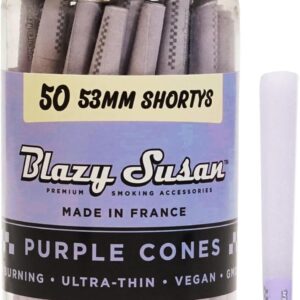
Purple Pre-Rolled Cones, 50 Count (53mm Shorty) – Slow-Burning Rolling Paper & Ultra-Thin Preroll Cones with Filter Tips – Vegan, GMO-Free, Convenient & Easy-To-Use Prerolled Shortys
$49.97Original price was: $49.97.$12.99Current price is: $12.99. Buy Now -

Purple Pre-Rolled Filter Tips, Ø7mm – Bottle of 500 Tips
$12.90 Buy Now -

Purple Rose Supply Rolling Glue – 4ml Glue Pen with Brush Applicator – Natural Plant Cellulose – Spit-Free Rolling Alternative – Glue Stick
$7.00 Buy Now -

Purple Rose Supply Rolling Glue – 4ml Glue Pen with Brush Applicator – Natural Plant Cellulose – Spit-Free Rolling Alternative – Glue Stick
$7.00 Buy Now -

Puzzles for Classroom Decor Medical Cannabis Plant Marijuana Weed Jigsaw Puzzles Family Puzzle to Enjoy Adult Decompression Education Gift for DIY Intellective Educational Game Gift 500 Pieces
$16.99 Buy Now -

QQ Studio 100 Clear/Colored Poly Zip Lock Bags w/Tear Notch 6.5x9cm (2.5×3.5″) (Clear/Silver/Black)
$13.95 Buy Now -

QQ Studio 100 PCS Metallic Mylar Foil Open Top Sealable Bags (12x18cm(4.7×7″), 100x Matte Black)
$21.29 Buy Now -
Sale!

Rainbow Oval Stainless Steel Tray – Mini Coffee Table Tray for Jewelry, Cosmetics & Candles | Vacuum Coating – No Fading, No Discoloration
$29.99Original price was: $29.99.$6.99Current price is: $6.99. Buy Now -

RAW – Elements Ultra Thin Rolling Paper Cones 1 1/4 | 100 Pack | Pre Rolled with Tips and Packing Tubes Included
$21.99 Buy Now -

RAW ‘Fried’ Metal Rolling Tray | Size Small | French Fry Themed Sleek and Elegant Metal Smooth Rolling Station Tray with Rounded Edges
$7.99 Buy Now -
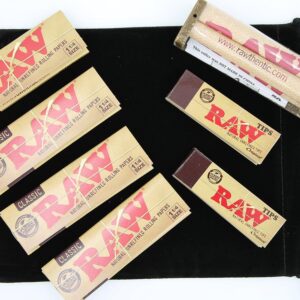
Raw 1 1/4 Deal – 1 1/4 Classic Rolling Papers, 79mm Rolling Machine and Filter Tips – INCLUDES – Black Velvet Pouch
$9.98 Buy Now -

Raw 300 Classic 1.25 1 1/4 Size Rolling Papers 5 Pack = 1500 Leaves
$12.84 Buy Now -

RAW 300 Classic 1.25 1 1/4 Size Rolling Papers, 300 Count (Pack of 1)
$4.23 Buy Now -

RAW 500’s Classic Natural Unrefined Rolling Paper 1 1/4 79mm Size (1 Pack)
$5.02 Buy Now -

RAW 79 mm 1 1/4 Hemp Plastic Cigarette Rolling Machine
$4.67 Buy Now -
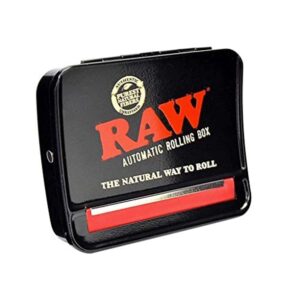
RAW 79mm Adjustable Automatic Cigarette Rolling Box (RED)
$9.99 Buy Now -
Sale!

RAW Backflip Bamboo Magnet Rolling Tray (Limited Edition Striped) with Clear ES Scoop Card
$59.99Original price was: $59.99.$34.75Current price is: $34.75. Buy Now -
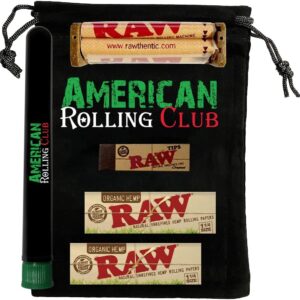
RAW Black Bag Combo | Organic 1-1/4 | Includes RAW Organic Cigarette Papers, Classic Tips, RAW Cigarette Machine, Black Carry Bag and Cigarette Saver
$8.23 Buy Now -
Sale!

RAW Black Cones King Size – 100 Pack – Slow Burning Pre Rolled Cones Pressed Extra Fine for Thin, Naturally Translucent Paper with Tips & Packing Tubes Included
$24.99Original price was: $24.99.$18.99Current price is: $18.99. Buy Now -

RAW Black Cones King Size – 50 Pack – Slow Burning Pre Rolled Cones – Rolling Paper Pressed Extra Fine for Thin, Naturally Translucent Paper with Tips & Packing Tubes Included
$15.29 Buy Now -

RAW Black Extra Wide Pre-Rolled Filter Tips – 1 Bag of 50 Tips – RAW Brand Tips for Perfect Filtered Rolls – Enhanced Smoking Experience – 10 mm Wide
$9.99 Buy Now -
Sale!

RAW Black Glass Rolling Tips – 6 Pack + Limited Edition RAW Tiny Matte Black Murder’d Tray Key Chain and Scoop Card – Reusable, Heat-Resistant, Premium Design
$29.99Original price was: $29.99.$9.99Current price is: $9.99. Buy Now -

RAW Black King Size Rolling Paper | 50 Packs | 32 Sheets Per Pack of Organic King Sized Black Series Rolling Paper Double Pressed
$28.99 Buy Now -
Sale!

RAW Black Organic 1 1/4 Rolling Papers – 10 Pack – 50 Leaves per Pack = 500 Leaves
$9.49Original price was: $9.49.$9.06Current price is: $9.06. Buy Now -

Raw Black Rolling Papers Tips (10 Pack) with American Rolling Club Tube
$7.99 Buy Now -

RAW Black Rolling Tips 10 Pack 50 Tips Per Pack = 500 Tips – Taste the Terps with Classic Thin Black Tips
$8.49 Buy Now -

RAW Black Rolling Tray – Limited Edition Monster Design for Pre-Rolled Cones, Wrap Papers, and Accessories – Large – 14 x 11 inches
$9.99 Buy Now -
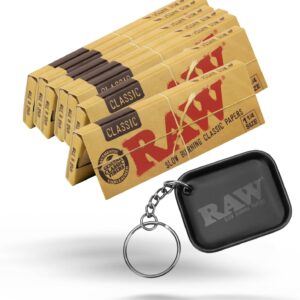
RAW Classic 1 1-4 Rolling Papers – 7 Pack – 50 Leaves per Pack – Includes Collectible Matte Black Murder’d Mini Tray Keychain
$8.39 Buy Now -

Raw Classic 1 1/2 Size Rolling Paper, 33 Count (Pack of 25)
$21.60 Buy Now -
Sale!

RAW Classic 1 1/4 Size Natural Unrefined Ultra Thin 79mm Rolling Papers, Black, 24 Count
$29.99Original price was: $29.99.$19.70Current price is: $19.70. Buy Now -
Sale!

RAW Classic 1-1/4 Slow Burning Pre-Rolled Cones – 100 Pack with Tips & Packing Tubes Included
$24.99Original price was: $24.99.$18.99Current price is: $18.99. Buy Now -

RAW Classic 1-1/4 Slow Burning Pre-Rolled Cones – 50 Pack and Cone Loader – Bundle
$19.99 Buy Now -
Sale!

RAW Classic 200 King Size Slim uncreased Rolling Paper, Brown, 200 Count (Pack of 3)
$9.99Original price was: $9.99.$9.01Current price is: $9.01. Buy Now -

RAW Classic Black 1 1/4 Size Natural Unrefined Ultra Thin 79mm Rolling Papers (12 Packs)
$9.89 Buy Now -
Sale!

RAW Classic Black 1 1/4 Size Natural Unrefined Ultra Thin 79mm Rolling Papers (6 Packs)
$6.47Original price was: $6.47.$6.13Current price is: $6.13. Buy Now -
Sale!

RAW Classic Black King Size Slim Natural Unrefined Ultra Thin 110mm Rolling Papers (12 Packs)
$9.99Original price was: $9.99.$8.89Current price is: $8.89. Buy Now -

RAW Classic Black King Size Slim Natural Unrefined Ultra Thin 110mm Rolling Papers (50 Packs)
$29.97 Buy Now -
Sale!

RAW Classic Black King Size Slim Natural Unrefined Ultra Thin 110mm Rolling Papers (6 Packs)
$5.99Original price was: $5.99.$5.58Current price is: $5.58. Buy Now -

RAW Classic Cigarette Papers King Size Slim 5 Pack with ARC Saver
$8.29 Buy Now -
Sale!

Raw Classic Connoisseur 1.25 1 1/4 Rolling Paper With Tips (24)
$38.76Original price was: $38.76.$33.99Current price is: $33.99. Buy Now -
Sale!

Raw Classic Connoisseur 1.25 1 1/4 Rolling Paper with Tips 1 Pack
$9.99Original price was: $9.99.$5.99Current price is: $5.99. Buy Now -

RAW Classic Connoisseur King Size Slim Paper + Prerolled Tips -1 Box
$33.77 Buy Now -
Sale!

RAW Classic Connoisseur Kingsize Slim Skin Rolling Papers with Tips (3 Packs)
$9.69Original price was: $9.69.$8.79Current price is: $8.79. Buy Now -

RAW Classic King Size Slim Rolling Paper – 6 Pack – 32 Leaves per Pack = 192 Leaves
$8.99 Buy Now -
Sale!
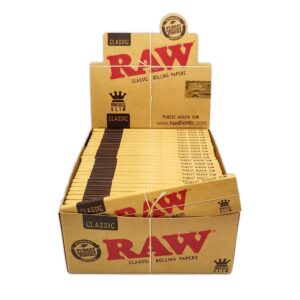
Raw Classic King Size Slim Rolling Paper Full Box of 50 Packs
$29.99Original price was: $29.99.$23.15Current price is: $23.15. Buy Now -

RAW Classic King Size Slim Rolling Paper, Brown, 5 Count
$5.72 Buy Now -

RAW Classic Natural Unrefined Rolling Paper 70mm Single Wide Size – 100 Leaves Per Pack – (3 Packs)
$7.99 Buy Now -

Raw Classic Natural Unrefined Rolling Paper 70mm Single Wide Size 10 Packs
$10.99 Buy Now -

RAW Classic Natural Unrefined Rolling Papers – Perfecto Pre Rolled Cone Tips – 6 Packs Per Box – 100 Tips Per Pack
$46.99 Buy Now -

RAW Classic Natural Unrefined Rolling Papers 79mm 1 1/2 Size Pack (6 Packs)
$7.03 Buy Now -

RAW Classic Pre-Rolled Papers 84mm Packed Inside a RAW Metal Tin Container with Packing Tubes | 20 Pack |
$7.99 Buy Now -

RAW Classic Rolling Tray | Size – Mini | Quality Metal and Curved Corners – No Creases
$5.99 Buy Now -

RAW Classic Tray Combo | Includes RAW King Size Slim Classic Cigarette Papers, Original Tips, Classic Task Tray, 110mm Cigarette Machine and ARC Saver (Mini)
$9.99 Buy Now -

RAW Classic Tray Cover | Size – Large | Magnetic Cover to Help Store Tray Contents Quickly | No More Lost Lighters
$9.99 Buy Now -

RAW Cones 1 1/4 Size: 100 Pack Patented Slow Burning Pre Rolled Rolling Papers & Tips, Classic Raw Paper, 84mm
$18.99 Buy Now -

RAW Cones 1 1/4 Size: 250 Pack Rawthentic Slow Burning Pre Rolled Rolling Papers & Tips, Classic Raw Paper, 84mm, Green Blazer Loader
$39.99 Buy Now -

RAW Cones 1 1/4 Size: 50 Pack Patented Slow Burning Pre Rolled Rolling Papers & Tips, Classic Raw Paper, 84mm
$9.99 Buy Now -
Sale!

RAW Cones 98 Special 100 Pack Patented Slow Burning Pre Rolled Cones Rolling Papers & Tips – All Natural Classic Rawthentic Paper, 98mm
$22.49Original price was: $22.49.$18.99Current price is: $18.99. Buy Now -
Sale!

RAW Cones 98 Special 150 Pack Rawthentic Slow Burning Pre Rolled Cones Rolling Papers & Tips – All Natural Classic Rawthentic Paper, 98mm
$29.99Original price was: $29.99.$24.99Current price is: $24.99. Buy Now -

RAW Cones 98 Special: 50 Pack Patented Slow Burning Pre Rolled Cones Rolling Papers & Tips – All Natural Classic Rawthentic Paper, 98mm
$12.49 Buy Now -

RAW Cones Classic 1 1/4 Size: 150 Pack Patented Slow Burning Pre Rolled Rolling Papers & Tips, All Natural Raw Paper, 84mm
$24.99 Buy Now -

RAW Cones Classic 1 1/4 Size: Box of 225 – Pre Rolled Rawthentic Cones Rolling Papers & Tips, 84mm, All Natural, Green Blazer Sticker
$39.99 Buy Now -

RAW Cones Classic 1-1/4 Size – 150 Pack – Slow Burning Pre Rolled Cones with Tips & Packing Tubes Included
$29.99 Buy Now -
Sale!

RAW Cones Classic 1-1/4 Size – 50 Pack – Slow Burning Pre Rolled Cones made of Paper with Tips & Packing Tubes Included
$14.99Original price was: $14.99.$9.99Current price is: $9.99. Buy Now -

RAW Cones Classic 70/24 Sized Pre Rolled Cones Bundle | 50 Pack | Shorter than 1 1/4 Slow-Burning Rolling Paper with Tips Included
$19.99 Buy Now -

RAW Cones Classic 98 Special – 50 Pack – Slow Burning Pre Rolled Cones with Tips & Packing Tubes Included – Rolling Papers
$12.99 Buy Now -

RAW Cones Classic Black 1-1/4 Size – 50 Pack – Slow Burning Pre Rolled Cones – Rolling Paper Pressed Extra Fine for Thin, Naturally Translucent Paper with Tips & Packing Tubes Included
$15.99 Buy Now -
Sale!

RAW Cones Classic Black 1-1/4 Size | 100 Pack | Slow Burning Pre Rolled Cones – Rolling Paper Pressed Extra Fine for Thin, Naturally Translucent Paper with Tips & Packing Tubes Included
$25.99Original price was: $25.99.$22.99Current price is: $22.99. Buy Now -
Sale!

RAW Cones Classic King Size – 100 Pack – Slow Burning Pre Rolled Paper with Tips and Packing Tubes Included
$21.99Original price was: $21.99.$18.99Current price is: $18.99. Buy Now -
Sale!

RAW Cones Classic King Size – 20 Pack – Pre Rolled RAWthentic Cones Rolling Papers with Tips, All Natural, Green Blazer Sticker
$9.99Original price was: $9.99.$8.49Current price is: $8.49. Buy Now -

RAW Cones Classic King Size | 32 Packs | Natural Pre Rolled Rolling Paper with Tips | 3 Cones per Pack
$37.99 Buy Now -
Sale!

RAW Cones Classic King Size | 50 Pack | Natural Pre Rolled Rolling Paper with Tips & Packing Tubes Included
$15.99Original price was: $15.99.$14.99Current price is: $14.99. Buy Now -

RAW Cones Classic King: 50 Pack Patented Slow Burning Cones Rolling Papers with Tips, All Natural RAW Paper, 109mm, Green Blazer Preroll Loader
$14.99 Buy Now -

RAW Cones Classic Lean Size – 100 Pack – Slow Burning Pre Rolled Cones with Tips & Packing Tubes Included
$24.99 Buy Now -
Sale!
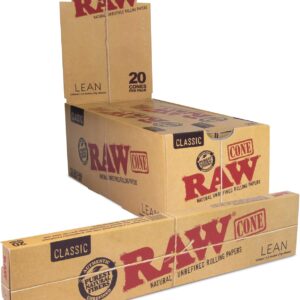
RAW Cones Classic Lean Size | 12 Packs | Natural Pre Rolled Rolling Paper with Tips | 20 Cones per Pack
$48.00Original price was: $48.00.$44.00Current price is: $44.00. Buy Now -

Raw Cones Classic Lean: 50 Pack Slim Pre Rolled Cones Rolling Papers and Tips, Rawthentic Slow Burning, 109mm Unbleached, Green Blazer Loader & Packing Sticks
$14.49 Buy Now -

RAW Cones Dogwalker 70/30 Size 100 Pack: Mini Pre Rolled Cones with Tips, Classic, Rawthentic Rolling Paper, 70mm
$22.98 Buy Now -
Sale!

Raw Cones King Size Classic: 100 Pack – Patented Slow Burning Cones Rolling Papers & Tips – All Natural Raw Paper
$21.69Original price was: $21.69.$18.99Current price is: $18.99. Buy Now -

Raw Cones King Size Classic: 200 Pack – Patented Slow Burning Pre Rolled Papers & Tips – All Natural Raw Paper
$34.99 Buy Now -
Sale!

RAW Cones King Size: 100 Pack – Organic Cones with Tips, Patented Slow Burning Pre Rolled Rolling Papers, 109mm
$22.99Original price was: $22.99.$20.99Current price is: $20.99. Buy Now -

RAW Cones Lean Size Classic – 50 Pack -Slow Burning Rolling Cones with Tips
$14.99 Buy Now -

RAW Cones Lean Size: 100 Pack Slim Pre Rolled Rolling Papers & Tips, Classic Flavor, Slow Burning Rawthentic Paper, 109mm
$24.49 Buy Now -

RAW Cones Organic 1-1/4 Size | 100 Pack | Pre Rolled Rolling Paper with Tips & Packing Tubes Included
$21.99 Buy Now -

RAW Cones Organic 1-1/4 Size | 50 Pack | Pre Rolled Rolling Paper with Tips & Packing Tubes Included
$12.99 Buy Now -
Sale!

RAW Cones Organic 1-1/4 Size: 150 Pack – Patented Slow Burning Pre Rolled Rolling Papers with Tips, Organic Raw Paper, 84mm
$26.99Original price was: $26.99.$24.99Current price is: $24.99. Buy Now -

RAW Cones Organic King Size – 100 Pack – Slow Burning Pre Rolled Cones with Tips Included
$20.99 Buy Now -
Sale!

RAW Cones Organic King Size | 50 Pack | Pre Rolled Rolling Paper with Tips & Packing Tubes Included
$13.99Original price was: $13.99.$12.98Current price is: $12.98. Buy Now -

RAW Cones Organic King Size: 50 Pack – Pre Rolled Papers & Tips, Patented Slow Burning Rolling Papers, 109mm
$12.98 Buy Now -

RAW Cones Single Size 70/24: 100 Pack – Mini Pre Rolled Cones Rolling Papers & Tips, Classic RAW Paper, 70mm
$23.48 Buy Now -

RAW Cones Single Size Dogwalker: 50 Pack – Mini Pre Rolled Cones Shorter Than 1 1/4 Size (70/30) Classic Rolling Papers & Tips, 70mm
$15.09 Buy Now -

RAW Cones Small Single Size Dogwalker Mini Cones Rolling Papers 70/30 Size 50 Pack – Smaller than 1 1/4 – Slow Burning Rolling Paper – Great for Quick Sessions
$15.10 Buy Now -
Sale!

RAW CONNOISSEUR 5 booklets King Size Natural UNREFINED Rolling papers ORGANIC with TIPS. The word hemp needs to be removed.
$16.99Original price was: $16.99.$8.59Current price is: $8.59. Buy Now -

RAW CONNOISSEUR size King SIze Unrefined ORGANIC Hemp Rolling papers + TIPS – 1 Box
$26.44 Buy Now -
Sale!

RAW Gold and Black Metal Rolling Tray – Limited Edition – 11” x 7” Size
$9.99Original price was: $9.99.$6.29Current price is: $6.29. Buy Now -
Sale!
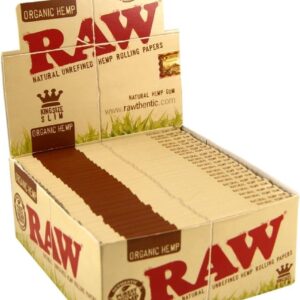
Raw King Size Slim Organic Hemp Rolling Papers Full Box of 50 Packs, 32 Count (Pack of 50)
$35.94Original price was: $35.94.$26.78Current price is: $26.78. Buy Now -

Raw King Size Slim Organic Hemp Rolling Papers, 32 Count (Pack of 4)
$6.73 Buy Now -
Sale!

RAW Large Black Limited Edition RAWthentic Rolling Tray – 13.5″ x 11″
$69.99Original price was: $69.99.$9.54Current price is: $9.54. Buy Now -
Sale!

RAW Matte Black Murder’d Cigarette Rolling Tray | Size – Small | Elegant and Sleek Black on Black Finish with Smooth Rounded Edges
$17.98Original price was: $17.98.$9.99Current price is: $9.99. Buy Now -
Sale!

RAW Metal AF Rolling Tray | Size – Small | Polished Chrome Top | Rust and Wear Resistant Clear Coating
$11.99Original price was: $11.99.$9.99Current price is: $9.99. Buy Now -
Sale!

Raw Metal Rolling Tray Large 14 x 11 Inch
$9.99Original price was: $9.99.$9.71Current price is: $9.71. Buy Now -
Sale!

Raw Natural Paper Tips, Brown, Pack of 50
$19.99Original price was: $19.99.$12.47Current price is: $12.47. Buy Now -

RAW Natural Rolling Cone Tips -1 box – 24 booklets
$18.62 Buy Now -
Sale!

Raw Natural Rolling Papers Hemp Plastic Cigarette Rolling Machine, 110mm King Slim Size, 2 Count (Pack of 1)
$7.99Original price was: $7.99.$6.95Current price is: $6.95. Buy Now -
Sale!

Raw Natural Rolling Papers Hemp Plastic Cigarette Rolling Machine, 79mm 1 1/4 Inch Size (2 Pack)
$9.99Original price was: $9.99.$5.78Current price is: $5.78. Buy Now -
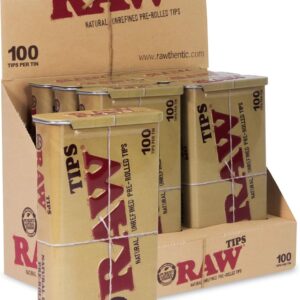
RAW Natural Unrefined 100 Tip Pre-Rolled Tin – (6)
$25.66 Buy Now -
Sale!

RAW Natural UNREFINED ORGANIC Rolling paper ROLLS 1 box – 24 x 5m papers
$23.42Original price was: $23.42.$18.95Current price is: $18.95. Buy Now -
Sale!

RAW Natural Unrefined Pre-Rolled Filter Tips – 1 Bag of 200 Tips
$33.29Original price was: $33.29.$8.60Current price is: $8.60. Buy Now -
Sale!

Raw Natural Unrefined Pre-Rolled Filter Tips 21 Count (Pack of 3)
$5.27Original price was: $5.27.$3.79Current price is: $3.79. Buy Now -

RAW Natural Unrefined Pre-Rolled Perfecto Cone Tips 100 Tips per Pack (1 Pack)
$9.99 Buy Now -

RAW Natural Unrefined Rolling Papers – Slim Cellulose Filters – (1) 200 pc Bag
$7.14 Buy Now -
Sale!

RAW Organic 300 1.25 1 1/4 Size Rolling Papers 1 Pack = 300 Leaves, 300 Count (Pack of 1)
$5.99Original price was: $5.99.$5.32Current price is: $5.32. Buy Now -

RAW Organic 300’s 1 1/4 Size Cigarette Papers | Includes ARC Saver Tube (5 Pack)
$16.07 Buy Now -
Sale!

RAW Organic Connoisseur 1.25 1 1/4 Rolling Paper with Tips (5 Packs)
$29.95Original price was: $29.95.$8.54Current price is: $8.54. Buy Now -

RAW Organic Connoisseur, Rolling Paper with Tips Full, Brown, 1 Count (Pack of 1)
$28.95 Buy Now -
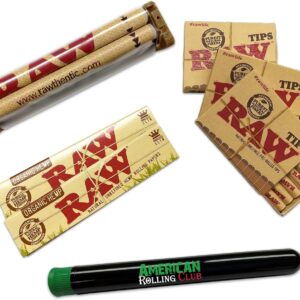
RAW Organic King Size Cigarette Papers Combo Includes: 2 Packs Of RAW Organic King Size Slim Papers, 3 Boxes RAW Pre Rolled Tips, RAW 110MM Cigarette Machine and ARC Cigarette Saver
$9.99 Buy Now -

RAW Phatty 125 mm Crystal Clear Tripple Strength Cigarette Rolling Paper Machine – Roll Up Your Favorite Smoking Contents Quick and Easy with This See Through Roller
$9.99 Buy Now -
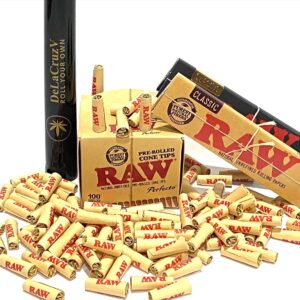
Raw Pre-Rolled Perfecto Cone Tips 1 pack of 100 tips and Two packs of raw King Size Paper and DeLaCruzV Tube.
$11.99 Buy Now -

RAW Pre-Rolled Tips + Tin Storage – Single Unit – 100 Tips per Tin
$6.67 Buy Now -
Sale!

RAW Rawlbook | 10 Pages of Classic Original RAW Paper Tips – All Laid out in Tearable Sheets | Made for Insanely True Smokers
$9.99Original price was: $9.99.$6.30Current price is: $6.30. Buy Now -

Raw Rolling Paper Perfecto Cone Tips 5 packs = 160 Tips
$5.18 Buy Now -

RAW Rolling Papers Gold Poker with Woven Natural Hemp Necklace
$19.99 Buy Now -
Sale!

RAW Rolling Papers Original Roll-Up Tips 6 Pack – 50 Tips per Pack = 300 Tips
$5.99Original price was: $5.99.$5.03Current price is: $5.03. Buy Now -

Raw Rolling Papers Perforated Wide Cotton Filter Tips 10 Pack = 500 Tips, 50 Count (Pack of 10)
$6.38 Buy Now -
Sale!

Raw Rolling Papers Perforated Wide Cotton Filter Tips 6 Pack = 300 Tips
$5.89Original price was: $5.89.$5.19Current price is: $5.19. Buy Now -
Sale!

Raw Rolling Papers Perforated Wide Cotton Filter Tips Full Box Of 50 Packs
$26.99Original price was: $26.99.$23.43Current price is: $23.43. Buy Now -
Sale!

Raw Rolling Papers Unbleached Filter Tips 10 Pack = 500 Tips
$7.99Original price was: $7.99.$6.01Current price is: $6.01. Buy Now -

RAW Rolling Tray Glass Star Tray | Size Mini | Shatter Resistant and Extremely Durable That is Elegant Sleek and Transparent Heat Resistant Glass
$21.99 Buy Now -

Raw Rolls Classic Natural Unrefined Rolling Paper King Size 3 Meter ( 9 Feet ) 1 Pack
$6.29 Buy Now -
Sale!

Raw Rolls Classic Rolling Paper King Size 55mm 3 Meter (9′) Full Box of 12 Pack
$19.45Original price was: $19.45.$18.51Current price is: $18.51. Buy Now -

RAW Single Wide Cones 70/45 Sized | 720 Count | Natural Prerolled Rolling Paper with Tips with Tips and ESD Scoop Card
$76.49 Buy Now -

RAW Slim Natural Unrefined Cotton Filter Tips 200pc – 6mm 1 Pack
$8.99 Buy Now -

RAW Smell-Proof Jar & Cozy w/Lock (16oz), Black, 16 Ounce
$33.99 Buy Now -
Sale!

Raw Supernatural 12″ Inch Foot Long Rolling Paper Classic 1 Pack
$51.99Original price was: $51.99.$6.48Current price is: $6.48. Buy Now -

RAW Tray Combo Includes RAW Tray, RAW 1 1/4 Cigarette Papers, RAW Tips, RAW 79mm Roller and ARC Cigarette Saver (Large)
$15.99 Buy Now -
Sale!

RAW Tray Combo Includes Tray, 1 1/4 Cigarete Papers, Original Tips, and RAW 79mm Machine and ARC Cigarette Saver (Small)
$13.99Original price was: $13.99.$12.99Current price is: $12.99. Buy Now -
Sale!

Raw Unrefined Classic 1.25 1 1/4 Size Cigarette Rolling Papers Full Box of 24 Pack
$24.99Original price was: $24.99.$16.00Current price is: $16.00. Buy Now -
Sale!

Raw Unrefined Classic 1.25 1 1/4 Size Cigarette Rolling Papers, 50 Count (Pack of 6)
$6.99Original price was: $6.99.$6.45Current price is: $6.45. Buy Now -
Sale!

RAW Unrefined Organic 1.25 1 1/4 Size Cigarette Rolling Papers Full Box of 24 Packs, Yellow, 50 Count (Pack of 24)
$34.99Original price was: $34.99.$18.28Current price is: $18.28. Buy Now -

Raw Unrefined Organic 1.25 1 1/4 Size Cigarette Rolling Papers, 50 Count (Pack of 6)
$6.47 Buy Now -

RAW Wood Rolling Tray | Size – Small | Sturdy RAW Designed Wood with Curved Corners – No Creases!
$29.99 Buy Now -

RAW Zombie Metal Rolling Tray – Size – Large – Polished Smooth Edges Simple Maintenance – Rust and Wear Resistant Clear Coating
$11.99 Buy Now -
Sale!

RAW, ES Distributions – RAW Cones Classic 98 Special – Slow Burning Pre Rolled Cones – Rolling Papers with Tips & Packing Tubes Included – Pack of 100
$23.99Original price was: $23.99.$18.99Current price is: $18.99. Buy Now -
Sale!

RAW® Rolling Mat ‘Natural Bamboo ‘2 Mats’ (for use w/ Rolling Papers)
$4.22Original price was: $4.22.$3.63Current price is: $3.63. Buy Now -
Sale!

Reli. Brown Freezer Paper Roll | 18 Inch x 350 Feet – Bulk | Made in USA | Natural Freezer Paper Roll for Meat | Food Grade, Poly-Coated for Wrapping/Freezing Meat (Brown)
$31.49Original price was: $31.49.$26.99Current price is: $26.99. Buy Now -
Sale!

Reli. Pink Freezer Paper Roll | 18 Inch x 350 Ft – Bulk | Made in USA | Peach Freezer Paper Roll for Meat | Food Grade, Poly-Coated for Wrapping/Freezing Meat (Pink)
$94.95Original price was: $94.95.$29.99Current price is: $29.99. Buy Now -

Reli. White Butcher Paper Roll | Made in USA | Bulk Value 18 in x 350 ft (4200 in) | Food Grade Kraft Paper for BBQ | Butcher Wrap for Smoking Meat, Sublimation | Unwaxed, Meat Wrapping
$31.49 Buy Now -

Retro Design of Marijuana Leaf. Cannabis Weed. T-Shirt
$13.99 Buy Now -

Retro Marijuana Support Your Local Farmer Cannabis Weed 2023 T-Shirt
$14.99 Buy Now -

Retro Weed Smoking Cannabis Vintage 420 Pot Smoking Shirt PopSockets Swappable PopGrip
$13.99 Buy Now -
Sale!

Reusable Beeswax Food Wrap; Roll 39″ Organic Beeswax Paper for Bread; Bowls & Food Storage Sustainable Alternative; Wax Paper for Covering Food Bowls
$39.99Original price was: $39.99.$24.99Current price is: $24.99. Buy Now -
Sale!

Revov Tray Box, EDC Valet Tray Box with Authentic Wood Magnetic Rotating Lid, Office Table, EDC Gear Organizer, Home Office, Desk Accessories (Black)
$69.00Original price was: $69.00.$65.55Current price is: $65.55. Buy Now -
Sale!

Reynolds Kitchens Stay Flat Dispensing Parchment Paper for Baking and Roasting, Parchment Paper Roll, Great for Baking and Rolling Dough, Non-stick, Reusable Up to 3x, 45 Sq. Ft.
$4.49Original price was: $4.49.$3.99Current price is: $3.99. Buy Now -
Sale!

Rizla Blue Regular Cigarette Rolling Papers – 10 Packets
$9.67Original price was: $9.67.$6.58Current price is: $6.58. Buy Now -

Rizla Green Cigarette Rolling Papers- 10 Packets
$9.67 Buy Now -
Sale!

Rizla Liquorice Cigarette Rolling Papers- 10 Packets
$21.98Original price was: $21.98.$8.95Current price is: $8.95. Buy Now -

Rizla Orange LIQUORICE Regular Cigarette Rolling Papers Original (50)
$43.99 Buy Now -

Rizla Silver Cigarette Rolling Papers – 10 Packets
$6.69 Buy Now -

ROKO CLOTHING Vintage Well Aged 1964 Shirts Short Sleeve Letter Printed Graphic 60th Birthday Gift for Men, Women
$19.70 Buy Now -

ROKO CLOTHING Vintage Well Aged 1964 Shirts Short Sleeve Letter Printed Graphic 60th Birthday Gift for Men, Women
$19.70 Buy Now -

ROKO CLOTHING Vintage Well Aged 1964 Shirts Short Sleeve Letter Printed Graphic 60th Birthday Gift for Men, Women
$19.70 Buy Now -

Rolling Paper, Kingsizeslim 110MM Rolling Paper with Tip, 9 Pack with 5 Colors Rolling Paper + 2 Tip, Slow Burn & Ultra Thin Smoking Accessories
$9.99 Buy Now -

Rolling Papers Perforated Tips, 8 Pack Colors 60x20mm Filter Tips, 8×50=400 Premium Tips with Perforated Lines, Tobacco Tool
$9.90 Buy Now -

Rolling Papers with Tips – Repackaged in Brown Box – 200 King Size Count
$29.99 Buy Now -
Sale!

Rolling Tool Tray Cart, Mobile Work Table Tool Tray with 2 Tool Holder Metal Tattoo Tray Height Adjustable, Tool Table Rolling Utility Cart, Tray Cart Tool Storage for Salon Garage Bike Work Shop
$49.99Original price was: $49.99.$39.99Current price is: $39.99. Buy Now -
Sale!

Rolling Tray – 7.8 x 5.8 inch,Corner Spout Design for Easy Filling (Bright Black)
$9.99Original price was: $9.99.$4.99Current price is: $4.99. Buy Now -
Sale!

Rolling Tray – Durable 7″” x 5.5″” Cat and Mouse Funny Metal Cigarette Rolling Tray/Ashtray for Papers and Wraps – Roll with Style and No More Spills, Red, STGRT001
$10.99Original price was: $10.99.$8.99Current price is: $8.99. Buy Now -

Rolling Tray “Abstract Texture” 5.5” x 7” Tobacco Smoke Accessories – Tray God
$5.99 Buy Now -

Rolling Tray “Floral Hands” 5.5” x 7″ Tobacco Smoke Accessories – Tray God
$9.99 Buy Now -

Rolling Tray “Galactic Cat” 5.5” x 7” Metal Tobacco Accessories
$4.99 Buy Now -
Sale!

Rolling Tray “Great Wave” 5.5” x 7” Metal Tobacco Accessories Art
$49.59Original price was: $49.59.$7.99Current price is: $7.99. Buy Now -

Rolling Tray “Neon Mushrooms” 5.5” x 7″ Tobacco Smoke Accessories – Tray God
$5.99 Buy Now -
Sale!

Rolling Tray “Pink” 5.5” x 7” Metal Tobacco Accessories
$6.99Original price was: $6.99.$5.99Current price is: $5.99. Buy Now -
Sale!

Rolling Tray “Purple Mushroom” 5” x 7” Tobacco Smoke Accessories – Tray God
$14.99Original price was: $14.99.$5.99Current price is: $5.99. Buy Now -
Sale!

Rolling Tray “Purple Pink Swirl” 5.5” x 7” Metal Tobacco Accessories
$9.99Original price was: $9.99.$7.99Current price is: $7.99. Buy Now -

Rolling Tray Portable Cute Metal Serving Tray Combo, Metal Foldable Plate, 7.1″x6.5″ with Cones Loader for Foldable Stand Cone Filler to Tin Roll Plate, Premium Storage Plate
$9.99 Buy Now -

Rolling Tray Set – Smoking Bundle Accessories for Weed Kit
$25.99 Buy Now -
Sale!

Rolling Tray Set-Portable 4 Piece Kit Rolling Tray Set with Accessories-Suitable for Home, Outdoor&Kitchen Use
$59.99Original price was: $59.99.$7.99Current price is: $7.99. Buy Now -
Sale!

Rolling Tray Set, Smoking Accessories, RM Tray Bundle by Gray Oval
$37.99Original price was: $37.99.$31.99Current price is: $31.99. Buy Now -
Sale!

Rolling Tray with Cone Loader Accessories for King Size & 1 1/4 Size Pre Rolled Cones, Cone Filler & Foldable Stand – All-in-one Rolling Tray Set with Storage Bag by Gray Oval
$59.99Original price was: $59.99.$9.99Current price is: $9.99. Buy Now -

Rolling Tray with Magnetic Lid – Btch Don’t Kill My Vibe Cover, Small Metal Trays Funny Cute Sloth Gifts 7” x 5.5”
$12.99 Buy Now -
Sale!

Rolling Tray with Magnetic Lid – Mini Metal Rolling Tray with Spill Proof Cover – Cute Decorative Tray – Perfect Storage for Home or On-The-Go-Small Size – 7” x 5.5”
$9.99Original price was: $9.99.$9.49Current price is: $9.49. Buy Now -
Sale!

Rolling Tray with Magnetic Lid, Durable Walnut Tray with Storage Space to Organize, Easy to Clean and Carry, Perfect for Home Storage or Travel
$17.99Original price was: $17.99.$15.99Current price is: $15.99. Buy Now -

Rolling Tray with PVC Soft Magnetic Lid – 7 x 5.5”, Ashtray – 5.8 x 5.8” – Set of 3 (Owl Design)
$9.99 Buy Now -
Sale!

Rolling Tray with PVC Soft Magnetic Lid – 7 x 5.5”, Ashtray – 5.8 x 5.8” – Set of 3 (Sunflower)
$9.99Original price was: $9.99.$6.99Current price is: $6.99. Buy Now -

Rolling Tray Wooden 4.72″x 4.72″ Portable Small Rlling Tray with Storage Hole and Dumping Path
$13.99 Buy Now -
Sale!

Rolling Tray, Dusty Pink Rolling Trays- Unique Gifts, Perfect Size for Home Or Travel Accessories (Heart, Medium – 7 x 5.5”)
$9.99Original price was: $9.99.$5.98Current price is: $5.98. Buy Now -
Sale!

Rolling Tray. Decorative Tray for Multipurpose Use Tin is 7 x 5.5 inches. This Mario and Luigi Rolling Tray is Made of tin. Cool Cartoon Design.
$9.99Original price was: $9.99.$8.99Current price is: $8.99. Buy Now -

Rolling Trays Premium Metal Tray with Design – Perfect Size for Home Or Travel Accessories 7”X 5.5”,Five Cartoons
$5.99 Buy Now -
Sale!

Rolling Trays Premium Metal Tray with Design – Perfect Size for Home Or Travel Accessories 7”X 5.5”,Three Cartoons
$9.99Original price was: $9.99.$5.99Current price is: $5.99. Buy Now -
Sale!

Rolling Trays Premium Metal Tray with Design – Perfect Size for Home Or Travel Accessories, Game
$59.99Original price was: $59.99.$6.99Current price is: $6.99. Buy Now -
Sale!

Rolling Trays Premium Metal Tray with Design – Perfect Size for Home Or Travel Accessories, Pink
$69.99Original price was: $69.99.$6.99Current price is: $6.99. Buy Now -
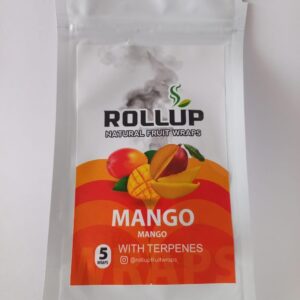
RollUp Natural Fruit Paper Wraps – Made With Fruit cellulose- No Artificial Flavours or Chemicals- Mango
$4.20 Buy Now -
Sale!

Roonin Smell Proof Box, Smell Proof Bag Case with Lock, Stash Containers, Small Lock Box Container, Smellproof Stash Bag for Accessories
$89.99Original price was: $89.99.$19.99Current price is: $19.99. Buy Now -
Sale!

roygra Foldable Rolling Tray with Cone Loader for King or 1-1/4 Size Pre Rolled Cones – 9 x 4 inch (Black)
$37.99Original price was: $37.99.$9.99Current price is: $9.99. Buy Now -
Sale!

roygra Rolling Tray, Metal Matte Decorative Tray with PVC Soft Magnetic Lid, 7 x 5.5 inch – Blue
$9.99Original price was: $9.99.$6.99Current price is: $6.99. Buy Now -

RUSPEPA Pink Kraft Paper Roll – 18 inches x 100 feet – Recyclable Paper Perfect for for Easter Crafts, Art, Wrapping, Packing, Postal, Shipping, Dunnage & Parcel
$21.99 Buy Now -

Russell Athletic Men’s Dri-Power Cotton Blend Sleeveless Muscle Shirts, Moisture Wicking Odor Protection UPF 30+, Sizes S-4X
$11.40 Buy Now -

Russell Athletic Men’s Dri-Power Cotton Blend Sleeveless Muscle Shirts, Moisture Wicking Odor Protection UPF 30+, Sizes S-4X
$10.56 Buy Now -

Russell Athletic Men’s Dri-Power Cotton Blend Sleeveless Muscle Shirts, Moisture Wicking Odor Protection UPF 30+, Sizes S-4X
$10.56 Buy Now -

Rustic Country Puzzles Mushrooms Hunting Girl Poster Stay Trippy Little Hippie Poster Home Smoke Cannabis Weed Living Decor Jigsaw Puzzles Family Puzzle Education Gift Intellective Game 500 Pieces
$16.99 Buy Now -

Sacred Eagle Herbal Smoking Blend (1 oz Bag)
$12.99 Buy Now -
Sale!

Salon Tray Cart on Wheels, Aluminum Tattoo Tray with Storage Platform, Adjustable Height Service Rolling Tray, Storage Tray Accessory for Salon Spa Dental Use, Rolling Tray Cart
$44.98Original price was: $44.98.$39.99Current price is: $39.99. Buy Now -

Salon Tray Cart Premium Aluminum Tattoo Tray on Wheels Salon Trolley Adjustable Height Storage Cart for Clinic Spa (36inch)
$41.99 Buy Now -
Sale!

Salon Tray Cart Premium Aluminum Tattoo Tray Rolling Trolley Adjustable Height Storage Utility Cart for Clinic Spa Rolling Tray (Black)
$44.98Original price was: $44.98.$43.99Current price is: $43.99. Buy Now -

Salon Tray Cart Premium Aluminum Tattoo Tray, Champagne Gold Salon Rolling Tray, Height Adjustable Utility Trolley, Salon Tray on Wheels for Spa Hairstylist Clinic Dental
$47.99 Buy Now -
Sale!

Salon Tray Cart with Storage Platform, Aluminum Tattoo Tray with Wheels Trolley Adjustable Height, Salon Tray Equipment Service Instrument Storage Tray Accessory for Salon & Spa Use, Black
$44.98Original price was: $44.98.$39.98Current price is: $39.98. Buy Now -
Sale!

Salon Tray Cart, Salon Color Tray with Adjustable Height, Salon Tray on Wheels, Salon Rolling Tray, Ideal Use As Tattoo Tray&Dental Tray
$46.79Original price was: $46.79.$44.45Current price is: $44.45. Buy Now -
Sale!

Salon Tray Cart,Aluminum Instrument Tattoo Trolley Tray with Wheels Adjustable Height,Height Adjustble Hair Color Storage Tray Cart
$52.99Original price was: $52.99.$47.99Current price is: $47.99. Buy Now -
Sale!

Salon Tray for Hair Stylist – Tattoo Tray Cart With Wheels, Rolling Trolley
$47.99Original price was: $47.99.$46.99Current price is: $46.99. Buy Now -
Sale!

Salon Tray on Wheels – Premium Aluminum Tattoo Tray Rolling Trolley – Adjustable Salon Service Rolling Tray Hairdresser Cart with Clinic Spa Rolling Tray Wheels (Bronze)
$52.79Original price was: $52.79.$47.99Current price is: $47.99. Buy Now -
Sale!

Salon Tray on Wheels-Height Adjustable Salon Rolling Tray-Color Tray for Hair Salon
$49.79Original price was: $49.79.$43.99Current price is: $43.99. Buy Now -
Sale!

Salon Tray on Wheels, Adjustable Hairstylist Rolling Tray with Wheels,Premium Aluminum Tattoo Tray,Suitable for spa Hairstylist Salon Trolley cart with Wheels-(Black)
$52.99Original price was: $52.99.$45.89Current price is: $45.89. Buy Now -
Sale!

Salon Tray on Wheels, Adjustable Tattoo Tray Salon Trolley Cart for Hair Stylist Salon Rolling Tray for Clinic, Spa and Barber(36inch-White)
$44.98Original price was: $44.98.$39.99Current price is: $39.99. Buy Now -
Sale!

Salon Tray on Wheels, Black Salon Tray Cart with Adjustable Height, Tattoo Rolling Tray, Metal Service Instrument Storage Tray for Salon&Home Use
$47.79Original price was: $47.79.$44.92Current price is: $44.92. Buy Now -
Sale!

Salon Tray on Wheels, Champagne Gold Metal Rolling Tray with Adjustable Height, Metal Service Instrument Storage Salon Cart for Salon&Home Use
$45.79Original price was: $45.79.$43.50Current price is: $43.50. Buy Now -
Sale!

Salon Tray on Wheels, Gold Salon Tray Cart with Adjustable Height, Metal Service Instrument Storage Tray for Salon&Home Use
$49.79Original price was: $49.79.$46.80Current price is: $46.80. Buy Now -

Salon Tray on Wheels, Rolling Tattoo Tray, Adjustable Hair Stylist Tray, Metal Mayo Stand Tray, Salon Color Tray Use As Medical Tray, No-Rusting
$47.79 Buy Now -
Sale!

Salon Tray on Wheels, Salon Rolling Tray with Adjustable Height, Hair Stylist Tray, Suitable for Tattoo Tray and Dental Tray
$49.47Original price was: $49.47.$43.99Current price is: $43.99. Buy Now -

Salon Tray Premium Aluminum Salon Trolley Tattoo Tray Mayo Tray Instrument Rolling Tray Silver Salon Station Tray with Wheels for Barber Salon SPA Tattoo Clinic
$46.44 Buy Now -
Sale!

Salon Tray Tattoo Tray Salon Cart for Hair Stylist Salon Trolley Cart with Wheels Salon Rolling Tray-Purple
$47.79Original price was: $47.79.$46.99Current price is: $46.99. Buy Now -
Sale!

Salon Tray, Adjustable Height Salon Rolling Tray Cart with Wheels, Aluminum Hairstylist Color Tattoo Tray with Wheels for Salon&Spa Use(36inch)
$43.99Original price was: $43.99.$39.99Current price is: $39.99. Buy Now -

Salon Tray, Champagne Gold Salon Rolling Tray with Adjustable Height, Hair Stylist Tray, Suitable for Tattoo Tray and Dental Tray
$47.98 Buy Now -
Sale!

Salon Tray, Golden Salon Tray, Tattoo Tray on Wheels, Metal Dental Rolling Tray, Services Tray Height-Adjustable, Tattoo Tray, Medical Tray, Dental Tray(Golden)
$52.79Original price was: $52.79.$46.79Current price is: $46.79. Buy Now -
Sale!

Salon Tray, Metal Feet Salon Rolling Tray Cart, Salon Color Tray, Tattoo Tray with Wheels, Instrument Tray for Salon&Spa Use Black…
$49.79Original price was: $49.79.$45.81Current price is: $45.81. Buy Now -
Sale!

Salon Tray, Salon Rolling Tray on Wheels, Salon Color Tray, Hair Stylist Tray, Allumium Salon Tray Height Adjustable Used As Tattoo Tray and Dental Tray
$47.79Original price was: $47.79.$43.97Current price is: $43.97. Buy Now -
Sale!

Salon Tray, Salon Rolling Tray with Adjustable Height, Salon Color Tray, Salon Tray on Wheels, Hair Color Tray and Hair Stylist Tray Non-Rusting
$69.79Original price was: $69.79.$49.79Current price is: $49.79. Buy Now -
Sale!

Salon Tray, Salon Rolling Tray with Adjustable Height, Salon Color Tray, Salon Tray on Wheels, Suitable for Tattoo Tray&Dentist Tray Use Black
$47.79Original price was: $47.79.$44.98Current price is: $44.98. Buy Now -

Salon Tray, Salon Rolling Tray with Adjustable Height, Salon Tray on Wheels, Salon Color Tray Ideal Use As Tattoo Tray, Medical Tray and Dental Tray
$45.79 Buy Now -
Sale!

Salon Tray, Silver Salon Tray, Tattoo Tray on Wheels, Metal Salon Rolling Tray, Salon Services Tray Height-Adjustable, Tattoo Tray, Medical Tray, Dental Tray(Silver)
$49.79Original price was: $49.79.$46.79Current price is: $46.79. Buy Now -
Sale!

Saloniture Aluminum Salon Instrument Tray, Heavy-Duty Metal Rolling Base
$95.00Original price was: $95.00.$54.99Current price is: $54.99. Buy Now -

Saloniture Rolling Salon Coloring Tray – Portable Hair Stylist Trolley with Magnetic Bowls, Black
$64.99 Buy Now -

Salt Mafia Curved Brim Water-Resistant Performance Snap Back Hat
$39.99 Buy Now -
Sale!

Sample set – 5 booklets King Size Slim papers – 161 papers – OCB RAW Rizla Elements
$7.99Original price was: $7.99.$6.99Current price is: $6.99. Buy Now -

Sandbaggy Biodegradable Landscape Fabric – Garden Paper for Weeds – Paper Mulch Rolls – Made in America (3 ft x 475 ft, 1)
$190.10 Buy Now -
Sale!

Santa Cruz Shredder x Cookies Tray – Smooth Rounded Edges, Spout for Easy Filling – Durable Design for Effortless Experience – Small
$16.84Original price was: $16.84.$12.95Current price is: $12.95. Buy Now -
Sale!

Sativa to Change The Things I Can-Indica to Accept The Things I Can’t Vintage Tin Sign Home Wall Decor Art Room for Home Office Bedroom Living Metal Funny Decoration Housewarming Gift 6″x 8″
$8.99Original price was: $8.99.$8.19Current price is: $8.19. Buy Now -

School Smart – 85485 Butcher Kraft Paper Roll, 40 lb, 36 Inches x 1000 Feet, White
$74.99 Buy Now -
Sale!

Scott Paper Towels, Choose-A-Sheet, 30 Double Rolls = 60 Regular Rolls (108 Sheets Per Roll)
$33.99Original price was: $33.99.$31.10Current price is: $31.10. Buy Now -
Sale!

Scotte 40 Pre Rolled Cones 1 1/4 Size Organic Cigarette Rolling Papers with Tips (78mm/3inch) (Yellow)
$22.78Original price was: $22.78.$8.19Current price is: $8.19. Buy Now -

Secrets of the Sticky Icky – Cannabis Cultivation Log – Weed Growing Journal: Marijuana Grow Book – Daily Tracker
$9.99 Buy Now -

Set Of 3 Cannabis Education ‘endocannabinoid System’ Poster, Home Decor Medical Office Decor, Medical Wall Art Poster And Canvas
$49.99 Buy Now -

SEUNMUK 15 Inch x 328 Ft Honeycomb Packing Paper Pack Wrap Roll, Eco-Friendly Recyclable Honeycomb Cushioning Packaging Wrap, Brown Kraft Packaging Cushioning Paper for Packing and Moving
$26.59 Buy Now -

Sexy Weed Lips Smoking Marijuana Joint Cannabis Lips PopSockets Swappable PopGrip
$14.99 Buy Now -

SHBC Smoker Smell Proof Container 8 Inch-The Stash Box Waterproof/Odor Resistant/Lockable Security Lid/Fits Pax 2/ Grinder/Containers -More Smoking Accessories Travel, Hidden and Storage
$19.99 Buy Now -

Sheet Labratory Grade PTFE Roll Solvent Resistant Alternative to Parchment Paper, 48×16
$27.00 Buy Now -

SheLucki Hawaiian Shirt for Men, Unisex Summer Beach Casual Short Sleeve Button Down Shirts, Printed Palmshadow Clothing
$19.99 Buy Now -

ShopSmartOnline (48 Rolls – 60GSM) 2 1/4 x 150 ft White Adding Machine Tape Paper Rolls Premium One Ply Register/Adding Machine/Calculator Paper Rolls Printing Calculator 10 Key
$41.99 Buy Now -

Show Me Your Doobies Weed Gift | Funny Marijuana Bud Stoner T-Shirt
$19.99 Buy Now -

SHW Mobile Height Adjustable Laptop Rolling Cart with Height Adjustment from 28″ to 33″, Black
$49.87 Buy Now -
Sale!

Simple Trending C Shaped End Table, Folding TV Tray Couch Side Table for Sofa on Wheels, Black
$45.99Original price was: $45.99.$39.97Current price is: $39.97. Buy Now -

SIQUK 2 Pieces Magnetic Dice Tray Rectangle Folding Dice Rolling Tray PU Leather Dice Trays Dice Holder Storage Box for D&D RPG Dice Games (Violet, Sky Blue)
$12.99 Buy Now -

SIQUK 2-Piece Dice Tray – PU Leather Folding Hexagon Dice Holder for RPG, DND and Other Table Games (Camel and Black)
$7.99 Buy Now -

SIQUK 4 Pieces Dice Tray Set Foldable Dice Trays Hexagon Dice Rolling Tray PU Leather Dice Holder for Dice Games Like RPG, DND and Other Table Games (Red, Black, Blue and Violet)
$14.99 Buy Now -

SIQUK 6 Pieces Dice Tray Hexagon Dice Rolling Holder Folding PU Leather Dice Trays for Dice Games Like RPG, DND and Other Table Games(Red, Blue, Violet, Black, Green, Yellow)
$19.99 Buy Now -
Sale!

SIQUK Magnetic Folding Dice Tray Rectangle Dice Rolling Tray PU Leather Dice Trays Foldable Dice Holder Dice Rolling Mat Storage Box for D&D RPG Dice Games, Violet
$12.99Original price was: $12.99.$8.99Current price is: $8.99. Buy Now -

SJT ENTERPRISES, INC. Just Want to Smoke Weed & Pet My Cat 2.5 x 3.5 inch Wood Magnet – Funny Quotable Magnet, Gift for Stoners (SJT00245)
$5.99 Buy Now -

Skeleton Playing Guitar Graphic Band Tees Rock And Roll Moon T-Shirt
$19.99 Buy Now -

Skeleton Smoking Weed Cannabis Lover 420 World’s Dopest Mom PopSockets Standard PopGrip
$14.99 Buy Now -

Skull Grinder, Spice Grinder Gift, 1.7 Inch
$13.99 Buy Now -
Sale!

Skunk Brand 1 1/4 Rolling Paper Bundle – 1 Pack of each flavour – Blackberry, Natural, Strawberry, Skunkalicious, Hawaiian
$18.57Original price was: $18.57.$9.95Current price is: $9.95. Buy Now -

Sky High 11 Piece Stash Box with Lock, Grinder, Airtight Jar, Double-Ended Pick, Storage Tube, Tray, Lighter Holder, Hemp Wick, Tobacco Storage, Black
$25.99 Buy Now -

Sleeveless Plaid Front Shirt for Men,Cowboy Button Down Shirts
$23.99 Buy Now -
Sale!

Sliding Tray for Coffee Maker – Solid Wooden Appliance Slider with 360° Smooth Rolling Wheels for Heavy Kitchen Appliances, Easy Under – Cabinet Access (Approach 13″x14″)
$32.99Original price was: $32.99.$31.34Current price is: $31.34. Buy Now -
Sale!

Sliding Tray for Coffee Maker, Appliance Slider Bamboo with Rolling Rubber Wheels for Heavy Kitchen Appliances, Coffee Pot Slider Tray for Countertop(16″D x 13″W)
$57.99Original price was: $57.99.$26.99Current price is: $26.99. Buy Now -
Sale!

Sliding Tray for Coffee Maker,Kitchen Countertop Appliance Slider,Coffee Pot Slider Tray for Countertop with Rolling Wheels and non-slip pads,Safe ABS Material Dishwasher Safe Non Slip Mat
$22.99Original price was: $22.99.$17.99Current price is: $17.99. Buy Now -
Sale!

Small Bag – Smell Proof – Water Resistant Mini Vanity Case Pouch with Carbon Filter System for Girl Women Travel Storage
$18.99Original price was: $18.99.$16.99Current price is: $16.99. Buy Now -
Sale!

Small Metal Tray with Magnetic Lid, Cute Decorative Tray, Ideal Storage for Home or Travel, 7 x 5.5 Inches (Black)
$9.99Original price was: $9.99.$8.99Current price is: $8.99. Buy Now -
Sale!

Small Metal Tray with Magnetic Lid, Decorative Tray, Ideal Storage for Home or Travel, 7 x 5.5 Inches (Blue)
$9.99Original price was: $9.99.$9.49Current price is: $9.49. Buy Now -
Sale!

Small Metal Tray with Magnetic Lid, Decorative Tray, Ideal Storage for Home or Travel,Black,7 x 5.5 Inches
$26.99Original price was: $26.99.$9.99Current price is: $9.99. Buy Now -

Small Metal Tray with Magnetic Lid, Decorative Tray, Ideal Storage for Home or Travel,Orange,7 x 5.5 Inches
$9.99 Buy Now -
Sale!

Small Metal Trays with PVC Soft Magnetic Lid Metal Tray with Lid Cover Small Cute Decorative Tray Ideal Storage for Home or on The Go, 7″ x 5.5″
$26.99Original price was: $26.99.$9.99Current price is: $9.99. Buy Now -
Sale!

Small Mini Rolling Tray Metal Decorative Tray Green with Round Edges 7″x4.9″
$9.99Original price was: $9.99.$7.99Current price is: $7.99. Buy Now -

Small Smell Proof Bag, Smell Proof Pouch Container,Tash Travel Storage Pouch Pocket (BLACK)
$7.95 Buy Now -

Small Smell Proof Container – Stash Jar Smell Proof – Stash Container – Scent Proof Bag – Odor Proof Container – Air Tight Containers (Gray-Gray)
$14.99 Buy Now -

SMART&CASUAL 15″ x 450″ (37.5′) Kraft Paper Roll for Art Craft Supplies Gift Wrapping Moving Packing Kids Painting Drawing Paint Easel Poster Chart Paper (Light Blue, 15″ W x 450″ L (37.5′))
$8.99 Buy Now -

SMART&CASUAL 17.8″ x 760″ (63′) Lake Blue Kraft Craft Paper Roll for Gift Wrapping Bulletin Board Bouquet Flower Kids Art Packing Parcel Table Covering 80GSM 55LB (Lake Blue, 17.8″ x 63′)
$8.99 Buy Now -

SMART&CASUAL 17.8″ x 760″ (63′) Medium Green Kraft Craft Paper Roll for Gift Wrapping Bulletin Board Bouquet Flower Kids Art Packing Parcel Table Covering 80GSM 55LB (Medium Green, 17.8″ x 63′)
$8.99 Buy Now -

Smell Proof Backpack with Lock,Water Resistant Smell Proof Bags Travel Laptop Backpack,Large Capacity Carbon Enduring Smell Proof Stash Bag with Lock for Men Women (Pink)
$30.99 Buy Now -

Smell Proof Bag – Large & Small Smell Proof bags + Lock & Odor Proof Bags – Smell Proof Pouch Container
$15.99 Buy Now -

Smell Proof Bag – Smell Proof Stash Box with Glass Jars,Grind,Multi-Functional Work Tray, Waterproof & Odor Proof Bag,Large Stash Box For Your Accessories,Travel Essentials for Men,Black
$21.99 Buy Now -

Smell Proof Bag – Smell Proof Stash Box with KS Tubes, Waterproof & Odor Proof Bag, Stash Box For Your Accessories,Travel Essentials for Men (Black)
$9.99 Buy Now -

Smell Proof Bag | Smell Proof Stash Box with Combination Lock | Portable Travel Storage Case for Your Accessories | Gift for Men/Women (Small)
$15.99 Buy Now -
Sale!

Smell Proof Bag Container with Lock, Small Stash Box, Portable Hard Case for Travel Storage(8 * 4Inch)
$16.99Original price was: $16.99.$15.29Current price is: $15.29. Buy Now -

Smell Proof Bag Containers with Lock, Small Stash Box, Portable Hard Body Case (7Inch Grey)
$18.99 Buy Now -

Smell Proof Bag Odor Proof Stash Bag with Combination Lock, Cool Travel Storage Case (CAMO)
$20.99 Buy Now -
Sale!

Smell Proof Bag with Combination Lock Odor Proof Bag Lockable Set, Smoking Tobacco Pipe Accessories Carbon Lining Durable Organizer Medicine Bag Odorless Pouch Great Gifts for Women(Green)
$38.98Original price was: $38.98.$29.69Current price is: $29.69. Buy Now -

Smell Proof Bag with Combination Lock Smell Proof Container Travel Medicine Lock Bag Carbon Lined Pouch Accessories Organizer Great Christmas Gift Set
$22.19 Buy Now -

Smell Proof Bag with Combination Lock, Airtight Zippers Carbon Lining & Removable Dividers, Odor Proof Container for Smoking Accessories, Odorless Travel Box Blocks Out Strong Odors
$19.99 Buy Now -

Smell Proof Bag with Combination Lock, Large Odor Proof Containers, Carbon Lined Pouch, Water Resistant, Airtight Zipper, Travel Storage Kit, Pink
$35.99 Buy Now -

Smell Proof Bag with Combination Lock, Large Smell Proof Containers, Carbon Lined Odor Proof Pouch Featuring Premium Accessories, Water Resistant Fabric and Airtight Zipper
$24.74 Buy Now -

Smell Proof Bag With Combination Lock, Large Stash Box, Odor Proof Container, Portable Travel Storage Case, Activated Charcoal, Purple
$23.99 Buy Now -

Smell Proof Bag with Combination Lock, Odor Proof Bag with Metal Tray and Mini Pouch Pocket, Stash Box for Storage and Travel, Portable and Easy to Use, Khaki
$17.99 Buy Now -
Sale!

Smell Proof Bag with Combination Lock, Odor Proof Pouch, Travel Storage Case 8.6 x 5 Inch
$18.99Original price was: $18.99.$9.99Current price is: $9.99. Buy Now -
Sale!
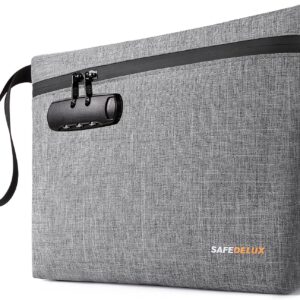
Smell Proof Bag with Combination Lock,11.5” x 8.6” Odor Proof Container Carbon Lining Smoking Tobacco Pipe Pouch, Odorless Durable Travel Organizer Cases (Gray)
$18.99Original price was: $18.99.$9.99Current price is: $9.99. Buy Now -
Sale!

Smell Proof Bag with Lock – Smell Odor Proof Pouch Case with Easy Grip Handle and Clapboard- for Travel Stash Storage – Large – Black
$35.99Original price was: $35.99.$15.99Current price is: $15.99. Buy Now -
Sale!

Smell Proof Bag with Lock 11″ x 9″, Smell Proof Container, Dog Tested Odor resistant Bags, Best Zipper odor sealing pouch for Herbs, Coffee & Travel Medicine, Scent resistent Containers
$75.00Original price was: $75.00.$19.99Current price is: $19.99. Buy Now -

Smell Proof Bag, Carbon Lined Smell Proof Stash Box, Smell Proof Container with Combination Lock, Odor Proof Bags for Portable Travel Storage (Black)
$19.99 Buy Now -

Smell Proof Bag, Christmas Gift Set for Friends, Smell Proof Bags with Combination Lock Scent Proof Smoking Tobacco Set, Odorless Rolling Tray Carbon Lining Organizer Travel Medicine Bags
$26.99 Buy Now -

Smell Proof Bags,Smell Proof Pouch,Smell Proof Stash Bag,Smell Proof Container,Odor Proof Pouch,Smell Proof Box,Upgrade Smellproof Bag,Smell Proof Case,Stash Storage Odor Proof Bags Kit(Green)
$18.99 Buy Now -

Smell Proof Box All in One, Stylish Smell Proof Case Travel-Friendly, Discreet Air Tight Containers, Waterproof Scentproof Case Gifts Black
$17.99 Buy Now -

Smell Proof Case with 4 Aluminum Tubes, Smell Proof Locking Container, Bag Storage with Lock, Metal Tubes Odor Proof Accessories (King Size)
$18.99 Buy Now -

Smell Proof Duffle Bag,130L Foldable Travel Duffel Bag Large Scent Odor Proof Sport Gym Overnight Weekender Bag,Big Capacity Smell Proof Stash Travel Duffel Bag With Carbon Lining
$89.99 Buy Now -
Sale!

Smell Proof Stash Box Bag With Rich accessories Combination Lock Box File Organizer Case Container Lock Box Travel Storage Case Blocks Out Smells And Strong Odors Great Gift for Friends
$35.99Original price was: $35.99.$25.99Current price is: $25.99. Buy Now -
Sale!

Smell Proof Storage Case with 4 Tubes, King Size Medicine Locking Bag Storage Container Fit in Pocket Great for Traveling Purple
$45.98Original price was: $45.98.$16.99Current price is: $16.99. Buy Now -
Sale!

Smell Proof Storage Pouch – Polyester Odor Resistant Container with Easy Grip Handle – Portable Storage Bag with Padded Lock – 3 Digit Combination Lock – Grey
$29.99Original price was: $29.99.$27.99Current price is: $27.99. Buy Now -

Smell Proof Wooden Storage Box with Lock and Key – Odorless Portable Storage Case for Accessories – Includes Lock and Key, Storage Jar and Tube, Tray, Resealable Bag, and More
$24.99 Buy Now -
Sale!

Smell resistant Bags with Combination Lock Storage Organization Container Tray, Jar, Tubes Seal Bags for Travel Gift for Men Women Home Storage Accessories(Gray)
$79.99Original price was: $79.99.$23.99Current price is: $23.99. Buy Now -
Sale!
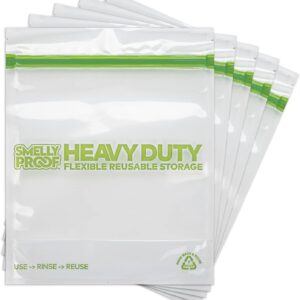
Smelly Proof HEAVY DUTY Reusable STAND-UP Ziplock Bags for Food Storage, USA Made, NO PEVA & BPA FREE, Reusable Freezer Bags, Dishwasher-Safe, Triple Zip, CLEAR 5-mils LRG Quart 8.5″ x 10″ – 5pk
$19.99Original price was: $19.99.$13.49Current price is: $13.49. Buy Now -

Smelly Proof Reusable Food Storage Container Bags, Reusable Freezer Bags US-Made BPA FREE, NO PEVA, 2 Gallon Bag, Easy Clean Dishwasher-Safe, NO SMELL Triple Zip BLACK 4 mils FLAT 12″ x 16″ – 5pk
$15.99 Buy Now -

Smelly Proof REUSABLE STORAGE BAGS, Extra Large HEAVY DUTY 5-mils US-Made, BPA FREE, NO PEVA, Dishwasher-Safe Ziplock Reusable Freezer Bags Triple Zip CLEAR FLAT XXL 2-Gallon 12″ x 16″ – 5pk
$16.95 Buy Now -
Sale!

Smoke Arsenal Premium Rolling Tray”BudzBunny 2″ – 5.5″ x 7″
$12.74Original price was: $12.74.$9.98Current price is: $9.98. Buy Now -

Smoke Arsenal Premium Rolling Tray”Dragonblunt” 5.5″ x 7″
$14.99 Buy Now -

Smoke Arsenal Rolling Tray”Lola Bunny” 11 x 7
$14.98 Buy Now -

smokebuddy Smoke Buddy
$16.49 Buy Now -

Smoko Premium Standard (84mm) Size Natural Pre-Rolled Rolling Paper – 72 Pack – Slow Burning Pre-Rolled Papers made of Natural Material with Tips & Packing Tubes Included.
$5.88 Buy Now -
Sale!

SofPull Centerpull Regular Capacity Premium Paper Towel, White, 28124, 324 Sheets Per Roll, 6 Rolls Per Case
$58.55Original price was: $58.55.$54.99Current price is: $54.99. Buy Now -

Soil pH Meter, MS02 3-in-1 Soil Moisture/Light/pH Tester Gardening Tool Kits for Plant Care, Great for Garden, Lawn, Farm, Indoor & Outdoor Use (Green)
$9.99 Buy Now -
Sale!

SPACELEAD 3 Tier Rolling Cart with Wheels, Storage Craft Art Trolley Organizer Serving, 3 Hanging Baskets Easy Assembly, for Office, Living Room, Kitchen, Black
$26.99Original price was: $26.99.$19.99Current price is: $19.99. Buy Now -
Sale!

Spartan Industrial – 2” X 3” (1000 Count) 2 Mil Clear Reclosable Zip Plastic Poly Bags with Resealable Lock Seal Zipper
$16.00Original price was: $16.00.$12.98Current price is: $12.98. Buy Now -

Spice Grinder
$9.99 Buy Now -

Spice Grinder 3-in-1 Hand Crank Loader Roller Crusher Filler Flower Buds Milling Grinding Storage with Magnetic Lid
$22.88 Buy Now -
Sale!

ST5730 Generic Paper Rolls – Steris Amsco Recording Paper P-129359-008/14230-650 (5 Pack)
$39.99Original price was: $39.99.$27.31Current price is: $27.31. Buy Now -
Sale!

Standard 2-Pack 32 Gallon Yard Garden Bags (D18, H30 inch) with Gardening Gloves for Yard Waste,Debris Bags,Recycling Bin,Camping Trash Container,Laundry Bag,Lawn Grass Clippings,Leaf Bag w/ 4 Handles
$20.99Original price was: $20.99.$19.99Current price is: $19.99. Buy Now -
Sale!

Start Your Own Cannabis Business: Your Step-By-Step Guide to the Marijuana Industry (Startup)
$22.99Original price was: $22.99.$20.69Current price is: $20.69. Buy Now -

Stash Bag – Smell Proof Carrying Bag with Lock – Odor Free Container – Durable Construction With Lock – Secure and Stylish Storage for Home or Travel – Heather Gray – 9 ½” x 4 ½” x 4″
$12.99 Buy Now -

Stash Box with Built in Combination Lock – Includes all Accessories – 2 Glass Jars, Rolling Tray – Wooden Stash Box with Lock – Matte Black
$52.99 Buy Now -
Sale!

Stash Box with rolling tray – Air-Tight Storage Stash Box with Bamboo Tray – Portable Decorative Box for Herbs (8inch)
$124.99Original price was: $124.99.$14.99Current price is: $14.99. Buy Now -
Sale!

STASHLOGIX SMELL CONTROL BAG with Combination Lock Smell Free Storage Bag: The Silverton
$75.00Original price was: $75.00.$48.99Current price is: $48.99. Buy Now -
Sale!

Stoner Avenue Street Sign Vintage Rustic Retro 4×16 inch Tin Sign
$7.99Original price was: $7.99.$6.99Current price is: $6.99. Buy Now -

Storage Bag with Combination Lock 11″ x 7.5″ Money Cosmetic Organizer Medicine Lock Bag Travel Storage Case Pouch Great Christmas Gift for Women Leopard
$16.99 Buy Now -

Storage Bag with Combination Lock and Accessories Travel Medicine Bag Container Money Cosmetic Organizer Great Christmas Gifts for Women Leopard
$37.99 Buy Now -
Sale!

Storage Bag with Combination Lock Cosmetic Money Organizer Pouch Travel Medicine Lock Bag Case
$43.99Original price was: $43.99.$37.69Current price is: $37.69. Buy Now -

Storage Bag with Combination Lock Large Cosmetic Organizer Container Medicine Lock Case with Accessories
$37.89 Buy Now -
Sale!

Storage Bag With Combination Lock, Carbon Lining Locking Storage Bag Lockable Organizer Cases Removable Dividers Water Resistant Zipper Great Choice for Travel (Blue)
$33.99Original price was: $33.99.$23.69Current price is: $23.69. Buy Now -
Sale!

Storage Box with Buckle, Premium Wooden Stash Box Combo Kit with 2 Storage Jars, Tray Set, 5 Small Bags and Others Accessory -Gift Kit for Kitchen
$25.99Original price was: $25.99.$21.99Current price is: $21.99. Buy Now -
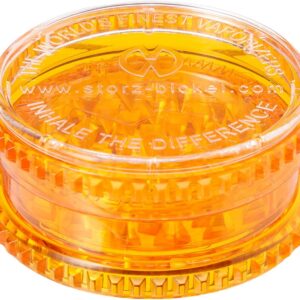
Stortz & Bickle Volcano Plastic Herb Grinder, 2.3, Orange
$9.88 Buy Now -

STUs 100 Pack Mylar Bags 5.5 x 7.9 Inch Resealable Smell Proof Bags with Clear Window Foil Pouch Bag Flat Bag Matte Black
$19.89 Buy Now -

STUs 100 Pack Mylar Stand-Up Bags 5.5 x 7.9 Inch Smell Proof Bags Foil Pouch Double-Sided Mylar Bag Matte Black
$23.89 Buy Now -

STUs 100 Pack Smell Proof Stand-Up Bags 4 x 6 Inch Resealable Mylar Bags Foil Pouch Double-Sided Bag Matte Black
$17.89 Buy Now -

Sun Lunar Rolling Tray with Magnetic Lid, 7×5.5 – Small Whimsigoth Decorative Tray Cute – Ideal for Home& Travel, Celestial Aesthetic Metal Tray – Mystical Gifts for Spiritual Hippie, Astrology, Tarot
$11.99 Buy Now -

Sun Moon Rolling Tray with Magnetic Lid, 11”x7” – Large Storage Decorative Tray – Ideal for Home & Travel, Celestial Aesthetic Metal Tray Set – Mystical Gifts for Spiritual Hippie, Astrology
$16.99 Buy Now -

Sunflower Weed Leaf Marijuana Cannabis T-Shirt
$13.38 Buy Now -

Sunset Vintage Marijuana Weed Cannabis Leaf St Patricks Day T-Shirt
$13.93 Buy Now -

SUPERBEE Beeswax Wrap Roll XL, Reusable Beeswax Wrap for Food, Wrap Roll, Reusable Bees Wrap Paper for Wrapping Vegetables, Cheese Paper, Bowl Covers and Sandwich Wrapping Paper, Hexagonia – 35×13″
$16.99 Buy Now -
Sale!

Sweetcrispy Small Mobile Standing Desk, Rolling Laptop Computer Carts, Portable Laptop Desk with Wheels, Adjustable Height Table for Home Office, White
$69.98Original price was: $69.98.$53.96Current price is: $53.96. Buy Now -

SYAIMN Unisex 3D Printed Shirts Funny Design Tees Colorful T-Shirts Summer Tops for Men Women
$14.99 Buy Now -

T-Shirt
$18.99 Buy Now -

Tarot Card The Stoner Funny Cannabis Wiccan Marijuana T-Shirt
$15.99 Buy Now -

Tarot Card The Stoner Weed Lover Skeleton Cannabis 420 T-Shirt
$16.99 Buy Now -

TASALON Ultimate Salon Station Cart 6 Lockable Trays & 2 Tray Holders
$129.99 Buy Now -

Terpene Coloring Book
$14.95 Buy Now -
Sale!

Terpenes for Well-Being: A Comprehensive Guide to Botanical Aromas for Emotional and Physical Self-Care (Natural Herbal Remedies Aromatherapy Guide)
$18.95Original price was: $18.95.$16.69Current price is: $16.69. Buy Now -
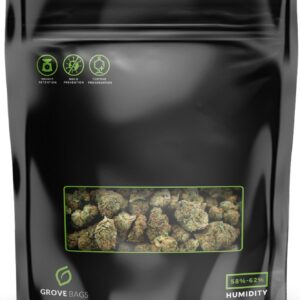
Terploc Curing Cultivation Pouch 8 Ounce (1/2 Lb) Single
$7.40 Buy Now -

TGBJE THC Molecule Necklace CBD Molecule Necklace Pot Lovers Gift Cannabis Molecule Gift 420 Science Gift Chemistry Gift
$12.89 Buy Now -

THC Molecule Marijuana Funny Cannabis Weed Stoner PopSockets Swappable PopGrip
$12.95 Buy Now -

THC POT LEAF INK STAMP Cannabis Medical Marijuana T-Shirt
$16.99 Buy Now -

The Art Of Breeding Cannabis: Creating Unique Strains For Personal Use
$3.99 Buy Now -

The Boxery Honeycomb Packing Paper 15”x16800” (1400’)-1 Roll Cushioning Wrap, Box Filler, Void Filling, Shipping & Moving Supplies, Alternative to Plastic Bubble|Eco Friendly-Small Business.
$69.50 Buy Now -
Sale!

The Boxery Kraft/Brown Kraft Paper Roll, 24” x 5520” (460’)-70lb. Thickness Extra-Heavy Duty Brown Wrapping Paper,Natural Kraft Packing Paper,Void Fill,Arts and Crafts,Bulletin Boards, Gift Wrapping
$37.95Original price was: $37.95.$36.50Current price is: $36.50. Buy Now -

The Budtender’s Guide: A Reference Manual for Cannabis Consumers and Dispensary Professionals
$29.99 Buy Now -

The Business of Cannabis: Blueprint To a High Income
$18.95 Buy Now -
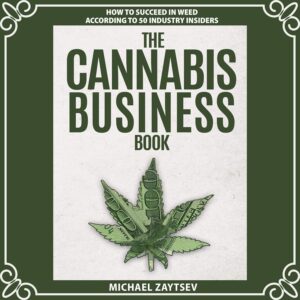
The Cannabis Business Book: How to Succeed in Weed According to 50 Industry Insiders
$0.00 Buy Now -
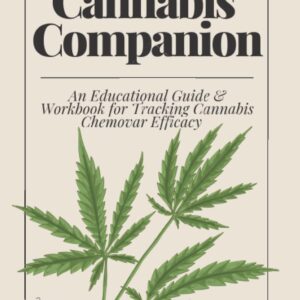
The Cannabis Companion: An Educational Guide & Workbook for Tracking Cannabis Chemovar Efficacy
$16.99 Buy Now -
Sale!

The Cannabis Craze: A Practical Guide for Parents and Teens
$16.99Original price was: $16.99.$11.70Current price is: $11.70. Buy Now -
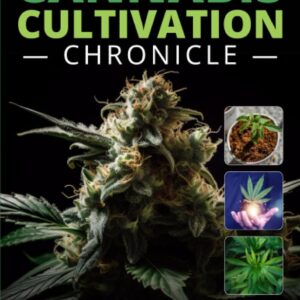
The Cannabis Cultivation Chronicle: Marijuana Growth Guide for Medicinal and Recreational Use
$15.99 Buy Now -

The Cannabis Encyclopedia: Cannabis Sativa 101 Strains: The Marijuana Almanac: The Definitive Guide to Cannabis Sativa Strains for Cultivation and Consumption of Marijuana
$12.99 Buy Now -
Sale!

The Cannabis Encyclopedia: The Definitive Guide to Cultivation & Consumption of Medical Marijuana
$70.00Original price was: $70.00.$50.38Current price is: $50.38. Buy Now -
Sale!

The Cannabis Encyclopedia: The Definitive Guide to Cultivation & Consumption of Medical Marijuana
$50.00Original price was: $50.00.$37.71Current price is: $37.71. Buy Now -
Sale!
![The Cannabis Gardener: A Beginner's Guide to Growing Vibrant, Healthy Plants in Every Region [A Marijuana Gardening Book]](https://mscannabiz.com/wp-content/uploads/2024/05/91UELs73A6L._SL1500_-300x300.jpg)
The Cannabis Gardener: A Beginner’s Guide to Growing Vibrant, Healthy Plants in Every Region [A Marijuana Gardening Book]
$22.99Original price was: $22.99.$15.45Current price is: $15.45. Buy Now -

The Cannabis Grow Bible: A Comprehensive Cannabis Cultivation Handbook with the best Techniques, Strategies for Mastering Profitable Indoor and Outdoor Cannabis Cultivaton.
$9.99 Buy Now -

The Cannabis Grow Bible: Growing Marijuana For Beginners How to Grow Marijuana Indoor & Outdoor, The Definitive Guide – Step by Step, Cannabis Strains
$19.89 Buy Now -
Sale!

The Cannabis Grow Bible: The Definitive Guide to Growing Marijuana for Recreational and Medicinal Use
$40.00Original price was: $40.00.$36.00Current price is: $36.00. Buy Now -

The Cannabis Grow Bible: The Indoor Horticultural Business of Cultivation for Chronic Pain, Anxiety and Medical / Recreational Use: 21st Century Cannabis
$0.00 Buy Now -

The Cannabis Health Index: Combining the Science of Medical Marijuana with Mindfulness Techniques To Heal 100 Chronic Symptoms and Diseases
$24.50 Buy Now -

The Cannabiz Owner’s Bible: Cultivating Leadership in Cannabis Retail
$5.99 Buy Now -

The Chronic Chronicles – Cannabis Cultivation Log: Marijuana Growing Journal -8.5 x 11 Daily Log Book to Track Grow Conditions
$8.99 Buy Now -
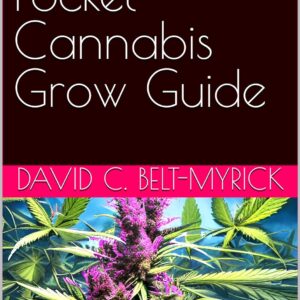
The Definitive Pocket Cannabis Grow Guide
$2.99 Buy Now -

The Definitive Pocket Cannabis Strains Guide: Volume One: Indica
$2.99 Buy Now -
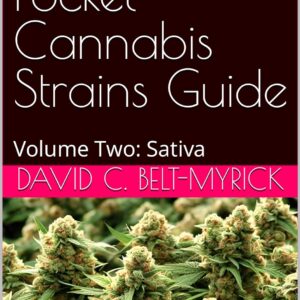
The Definitive Pocket Cannabis Strains Guide: Volume Two: Sativa
$2.99 Buy Now -
Sale!

The Emperor Wears No Clothes: A History of Cannabis/Hemp/Marijuana
$34.95Original price was: $34.95.$33.09Current price is: $33.09. Buy Now -

The Everything Marijuana Book: Your complete cannabis resource, including history, growing instructions, and preparation (Everything® Series)
$5.99 Buy Now -

The God Of Cannabis: The Ultimate Cannabis Grow Guide: All Strains of Cannabis Cultivation Indoor/Outdoor Techniques
$4.99 Buy Now -

The Gorilla Grower’s Guide: An Informative Handbook for Stealth Cannabis Cultivation: Cultivating Cannabis in the Shadows
$2.99 Buy Now -

The Grow Journal
$9.99 Buy Now -

The Handbook of Cannabis Therapeutics (Haworth Series in Integrative Healing)
$79.95 Buy Now -
Sale!
![The Herbal Remedies & Natural Medicine Bible: [5 in 1] The Ultimate Collection of Healing Herbs and Plants to Grow and Use for Tinctures, Essential Oils, Infusions, and Antibiotics](https://mscannabiz.com/wp-content/uploads/2024/05/71Fkk7grfXL._SL1293_-300x300.jpg)
The Herbal Remedies & Natural Medicine Bible: [5 in 1] The Ultimate Collection of Healing Herbs and Plants to Grow and Use for Tinctures, Essential Oils, Infusions, and Antibiotics
$24.97Original price was: $24.97.$22.47Current price is: $22.47. Buy Now -

The Hydroponic Grower’s Handbook: – Cannabis Edition -: Everything You Need to Know (The Hydroponic Grower – Cannabis Edition Book 1)
$2.99 Buy Now -
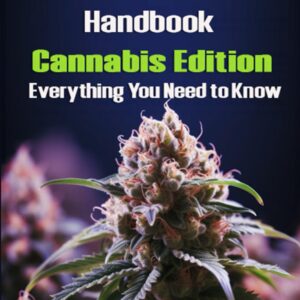
The Hydroponic Grower’s Handbook: – Cannabis Edition -: Everything You Need to Know (The Hydroponic Grower – Cannabis Edition)
$22.99 Buy Now -

The Little Black Book of Marijuana: The Essential Guide to the World of Cannabis
$3.99 Buy Now -
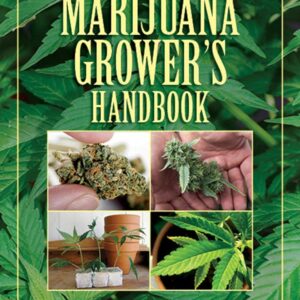
The Marijuana Grower’s Handbook: Practical Advice from an Expert
$16.99 Buy Now -
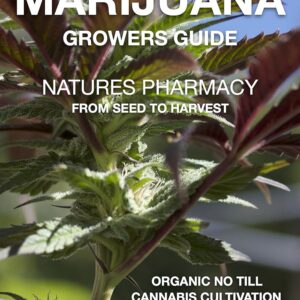
The Medical Marijuana Growers Guide. NATURES PHARMACY.: Organic no-till Cannabis Cultivation. From Seed To Harvest.
$9.85 Buy Now -

The New Sensational 2024 Cannabis Strain Bible: The Detailed Guide Book About Cannabis Strain
$11.99 Buy Now -

The OG Storage Box (Brown)
$79.00 Buy Now -
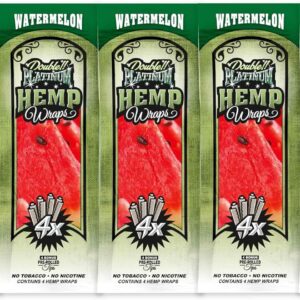
The Original Double Platinum Papers – Non GMO – 4 Sheets & Filters per Pack – 5 Pack – 20 Sheets total (Watermelon)
$8.99 Buy Now -

The Reefertilizer Beginner’s Guide to Cannabis Cultivation: Learn the basics to home cultivation and grow healthier happy plants
$16.95 Buy Now -

The Stoner Retro Style 420 Cannabis Weed Skeleton Tarot Card T-Shirt
$17.99 Buy Now -

The Stoner Tarot Card Skeleton Cannabis Weed Lover Marijuana T-Shirt
$16.96 Buy Now -

The Sun is High and So Am I Sunflower Cannabis Design Hats Mens Black Hat Pigment Black Baseball Hat Gifts for
$14.99 Buy Now -

The Ultimate Cannabis Grow Journal
$9.99 Buy Now -
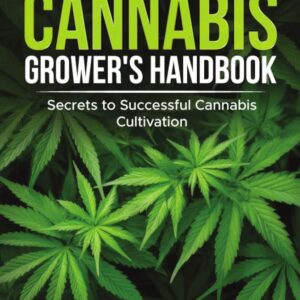
The Ultimate Cannabis Grower’s Handbook: Secrets to Successful Cannabis Cultivation
$9.99 Buy Now -

Three Ladies Brand Spring Roll Rice Paper Wrapper (2 Packs) Round, 22cm
$12.51 Buy Now -

Three Opossum Moon | 3 Possum Moon Funny Weird Cursed Meme T-Shirt
$19.99 Buy Now -

Throw Pillow Cover Green Bong Marijuana Kawaii Cartoon Pack Weed Smoke Leaf Pot Cannabis Decorative Throw Pillow Cushion Case for Home Couch Living Room Bed Sofa Car 18 x 18 Inch Pillowcase
$9.99 Buy Now -

TIDI 618 Avalon Papers Chiro Headrest Roll, Fluid and Barrier Protection, Absorbent Crepe Paper, White, 8.5″ Width, 125′ Length, Pack of 25
$40.60 Buy Now -

Tina TN Green Cannabis Leaf with 420 Numbers Unisex Adult Slouchy Beanie Skull Cap Cute Chemo Hat
$8.50 Buy Now -
Sale!

TISFA Pink Pre rolled Cones 60 Pack Rolling Papers King Size Rolling Cones with Packing Sticks
$8.59Original price was: $8.59.$8.09Current price is: $8.09. Buy Now -

Today Good Mood Is Sponsored By Weed Cannabis Funny T-Shirt
$13.38 Buy Now -
Sale!

Toker Poker Lighter Case – Turquiose
$11.99Original price was: $11.99.$9.99Current price is: $9.99. Buy Now -
Sale!

TOMLOV DM602 Flex 2024 Digital Microscope, 10.1″ HDMI Soldering Microscope for Electronic Repair, 2K Coin Microscope with Ring Light,Adults LCD Video Microscope, Flexible Arm for PCB Watch+AM04
$389.98Original price was: $389.98.$359.99Current price is: $359.99. Buy Now -
Sale!

TOMLOV DM602 Flex 2024 Digital Microscope, 10.1″ HDMI Soldering Microscope for Electronic Repair, 2K Coin Microscope with Ring Light,Adults LCD Video Microscope, Flexible Arm for PCB Watch+BL01
$349.98Original price was: $349.98.$319.99Current price is: $319.99. Buy Now -
Sale!

TOMLOV DM602 Flex 2024 Digital Microscope, 10.1″ HDMI Soldering Microscope for Electronic Repair, 2K Coin Microscope with Ring Light,Adults LCD Video Microscope, Flexible Arm for PCB Watch+SP01
$329.98Original price was: $329.98.$309.99Current price is: $309.99. Buy Now -

Top Cigarette Paper
$33.92 Buy Now -

Top Cigarette Rolling Papers by DeLaCruzV (4 Packs) + Top Rolling Machine 70MM, Raw Black Clipper and Small DoobTube.
$13.99 Buy Now -
Sale!
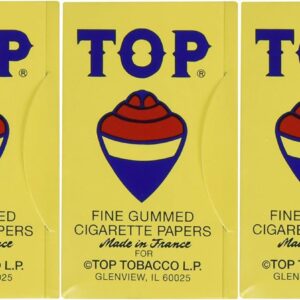
Top Cigarette Rolling Papers, 3 packs
$7.95Original price was: $7.95.$6.79Current price is: $6.79. Buy Now -

Top Premium Cigarette Filter Tips King Size 18mm 200 Pack
$6.09 Buy Now -
Sale!

TOP Rolling Papers, 6 Pack Bundle, 600 Cigarette Paper Leaves Total
$11.79Original price was: $11.79.$9.99Current price is: $9.99. Buy Now -
Sale!

Tork Mini Jumbo Toilet Paper Roll White T2, Advanced, 2-Ply, 12 x 751′, 12024402
$68.00Original price was: $68.00.$48.00Current price is: $48.00. Buy Now -

Tow Hitch Cover for 2″ Receiver Tow Truck Trailer SUV Heavy Duty Metal (Black/Silver) (Weed Leaf)
$29.99 Buy Now -

Trendy Apparel Shop Rasta Marijuana Leaf Weed 3D Embroidered Flat Bill Snapback Cap
$24.99 Buy Now -

Trendy Apparel Shop Skull Bandana Embroidered Snapback with Paisley Print Flatbill Cap
$24.99 Buy Now -

Trendy Apparel Shop Tie Dye Printed Mesh Back Flat Bill Snapback Cap
$17.99 Buy Now -

Trenz Shirt Company Weed Happy Face Marijuana Cannabis Men’s Mesh Back Trucker Hat Baseball Cap
$27.99 Buy Now -

Trim-Daddy Trim Tray Bin | Trimming Pollen Sieve Sifter Trimmer Trays with 150 Micron Screen | Protective Cover | 2 Scissors | Magnifying Glass | Pollen Brush
$34.99 Buy Now -
Sale!

Trimming Tray for Buds, Ergonomic Design Trim Tray with 150 Micron Mesh Pollen Screen and Pollen Box, Herb Dry Sifter Trim Tray with Screen
$64.90Original price was: $64.90.$39.99Current price is: $39.99. Buy Now -

Trip Clear 1.25 Cigarette Rolling Papers, 4 Packs
$6.45 Buy Now -
Sale!

Trip2 {5 Packs} Trip 2 Clear 1 & 1/4 Rolling Papers
$29.99Original price was: $29.99.$7.18Current price is: $7.18. Buy Now -
Sale!

TRIP2 Clear Cellulose King Size Rolling Papers – 3 Packs!
$7.99Original price was: $7.99.$7.03Current price is: $7.03. Buy Now -

Trippie Day King size Pre Roll Cones, Smooth af | 50 Pack | Classic Pre Rolled papers with tips | Includes Packing Sticks
$5.99 Buy Now -

Trippie Day Lil’ Pinkies | 50 Pack | Single size Pre rolled cones (70/26mm) | Vegan & Non GMO | No chemical colors used | Puff Puff Puff
$8.99 Buy Now -
Sale!

Trippie Day Pink 1/4 Size Pre Rolled Cones in an Eco friendly Box | Vegan & Non GMO | Includes 10 Packing Sticks | Pink 84mm
$9.99Original price was: $9.99.$6.99Current price is: $6.99. Buy Now -

Trippie Day Single Size Dogwalker Pre Rolled Cones | 75 Pack | Classic Pre Rolled papers with tips | Includes Packing Sticks | (70/26 mm)
$9.99 Buy Now -

Trippy Bucket Hat Colorful Hat Summer Travel Sun Hat Unisex Beach Hat Fisherman Hats
$17.99 Buy Now -

True Classic Active Polo Shirts for Men, Premium Fitted Golf Shirts for Men. Mens Polo Shirts Short Sleeve.
$27.99 Buy Now -

True Classic Active Polo Shirts for Men, Premium Fitted Golf Shirts for Men. Mens Polo Shirts Short Sleeve.
$34.99 Buy Now -

True Classic V Neck Mens T Shirt, Premium Fitted Soft Men’s T-Shirts
$99.99 Buy Now -

True Classic V Neck Mens T Shirt, Premium Fitted Soft Men’s T-Shirts
$99.99 Buy Now -
Sale!

TV Tray Table, TV Dining Table with Casters for Small Spaces, Solid Wood End Table, Sofa Couch Side Table Removable Snack Tray for Coffee Bed Sofa Eating Writing Reading Living Room Bedroom
$64.99Original price was: $64.99.$59.99Current price is: $59.99. Buy Now -

Twisted Teas and 420 Hat, Richardson Hat, Beer Hat, Marijuana Hat, Cannabis Cap, Richardson Cap, Richardson 112, Heather Grey Black
$20.99 Buy Now -
Sale!

Two-Way Appliance Rolling Tray,16.9″x12.8″x0.9″ Sliding Tray with 8 Wheels Load 110LBS, Extra Large Appliance Slider for Heavy Duty Stand Mixer Air Fryer Coffee Maker and Blender
$31.99Original price was: $31.99.$20.99Current price is: $20.99. Buy Now -

UBUNG | 400 Tips | Ø7mm Pre Rolled Tips | Unbleached Rolling Paper Joints | Suitable for Pre Rolled Cones Rolling Papers | Suitable for most Rolling Machine Filter Tips
$9.99 Buy Now -

UBUNG | 420 Tips | Ø7mm Pre Rolled Tips | Filter Tips Made with Unbleached Paper | Suitable for Most Pre Roll Machine and Rolling Papers
$9.99 Buy Now -

UBUNG 100 Pcs 11/4 Size Cones, Brown Pre Rolled Cones with Tips, 84mm Cones Rolling Papers with Tips
$11.99 Buy Now -

UBUNG 50 Pcs 98 Size Cones, Brown 98 Special Size Pre Rolled Cones With Tips Includes Loader Funnel And Push Rod, 98 mm Slow Type Brown Rolling Papers
$8.99 Buy Now -

UBUNG Brown Cones, 300 Pcs King Size Brown Pre Rolled Cones With Tips, Slow Type Rolling Paper, Length 4.25 in / 108 mm, Including 1 Cone Loader And 1 Push Rod
$26.99 Buy Now -

UBUNG CONES | 50 Pack | King Size Purple Pre Rolled Cones with Tips | 108mm Slow Type Purple Rolling Paper with Cone Loader
$9.99 Buy Now -

UBUNG King Size Black Pre Rolled Cones, 50 Pcs with Tips, 108mm Slow Type Black Rolling Papers, Includes Cone Loader and Push Rod
$9.99 Buy Now -
Sale!

UBUNG King Size Rolling Papers, A total of 800 sheets of paper, 25 Booklets with 32 Papers per Booklet, 108 mm * 44 mm, Suitable for most Rolling Machine
$19.07Original price was: $19.07.$8.99Current price is: $8.99. Buy Now -
Sale!

UBUNG Purple Cones, 200 Pcs King Size Purple Pre Rolled Cones with Tips, 108mm Slow Type Purple Rolling Papers, Including 1 Cone Loader And 1 Push Rod
$46.99Original price was: $46.99.$18.99Current price is: $18.99. Buy Now -

UBUNG Rainbow Cones 100 Pcs, King Size Colorful Pre Rolled Cones with Tips(5 Colors), 108mm Slow Type Rolling Papers, Including 1 Cone Loader And 1 Push Rod
$13.99 Buy Now -

UBUNG Tips 420 Pack Ø7mm Pre Rolled Tips in 11 Colors | These Multiple Colored Filter Tips Are Suitable For Most Pre Roll Machine And Rolling Papers
$9.99 Buy Now -

UFO Starry Night Alien Van Gogh Sky Painting Art UFO Alien T-Shirt
$19.99 Buy Now -

UGOS Organic Beeswax Food Wraps Roll – Reusable Bees Wax Paper Wrap (Green Avocado)
$14.99 Buy Now -
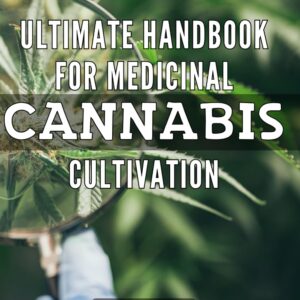
Ultimate Handbook for Medicinal Cannabis Cultivation: Master the Art of Growing Medicinal Cannabis: The Complete Guide for Cultivators and Enthusiasts
$12.95 Buy Now -

Unbleached Parchment Paper Roll for Baking, 13 in x 242 Ft, 249 Sq.Ft, Baklicious Non-stick Baking Parchment Paper for Baking, Cookies, Bread, Oven, Air Fryer, Steamer, Baking paper
$19.79 Buy Now -
Sale!

Unbleached Pre-Rolled Tips, Unrefined Filters, Ø8mm Slim Rolling Paper Tips (120 Tips)
$7.99Original price was: $7.99.$6.98Current price is: $6.98. Buy Now -

Understanding the Basics of Cannabis Cultivation: Complete Quick Guide
$5.99 Buy Now -
Sale!

Uni-Sex Post Shoulder Surgery Shirt & Rehab Shirt with Stick On Fasteners, Convenient and Quick (X-Large, Black)
$27.99Original price was: $27.99.$25.99Current price is: $25.99. Buy Now -

Unisex Backwoods Hats Sun Hats Hip Hop Hats Bucket Hats Fishermans Hats Summer Hats Outdoor Travel Beach
$10.99 Buy Now -
Sale!

Unisex Beanie Caps 3D Green Marijuana Leaf Weed Smoking Skull Knit Hat Skull Cap Winter Summer Warm Womens Mens Hats
$10.99Original price was: $10.99.$9.99Current price is: $9.99. Buy Now -

USmania Marijuana Cannabis Embroidered hat Washed Cap Cotton hat dad Cap dad hat
$15.95 Buy Now -
Sale!

Usoway Bamboo Storage Box With Colored LED Lights – 358 Kinds Cool Light Effects, Premium Decorative Wooden Box With Combination Lock, Storage Box Set With Sliding Tray and Accessories (Black)
$69.99Original price was: $69.99.$49.99Current price is: $49.99. Buy Now -
Sale!
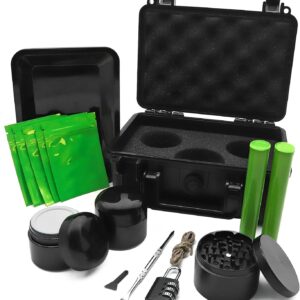
Vakuny Smell Proof Storage Box – ABS Plastic Storage Container with Lock – Portable Waterproof Box – Black Padded Storage Box – 14 Piece Accessories Kit Set Suit for Travel Gifts
$124.99Original price was: $124.99.$29.99Current price is: $29.99. Buy Now -
Sale!

Valentine’s Day Rolling Tray Set with One Accessories, Love Heart Metal Rolling Tray Combo Kit Ideal for Gifts, Easy to Carry
$15.99Original price was: $15.99.$14.99Current price is: $14.99. Buy Now -

Vanhench 30″ x 2520″ (210′) Black Wrapping Paper, Solid Color Art Kraft Paper for Bouquet Flower Crafts Packing, Poster, Bulletin Board, Floor Covering & Table Runner
$34.99 Buy Now -

Vanhench Brown Large Kraft Paper Roll 17.8″x 2400″, Craft Paper Roll for Bulletin Board Kids Arts Crafts Packing Wrap Moving Shipping Poster Floor Covering Crafting Drawing Craft Table
$16.99 Buy Now -

VATPAVE Mens Front Pocket Hawaiian Shirts Casual Floral Shirts Short Sleeve Button Down Beach Tropical Shirts
$25.99 Buy Now -

VATPAVE Mens Front Pocket Hawaiian Shirts Casual Floral Shirts Short Sleeve Button Down Beach Tropical Shirts
$25.99 Buy Now -
Sale!

Vaunn Medical Adjustable Overbed Bedside Table With Wheels (Hospital and Home Use)
$99.98Original price was: $99.98.$64.99Current price is: $64.99. Buy Now -
Sale!

VEVOR Lab Cart, Stainless Steel Mayo Tray Stand 18 x 14 in Trolley Mayo Stand, Adjustable Height 32-51 in Instrument Tray with Removable Tray & 4 Omnidirectional Wheels, Ideal for Home Equipment
$59.99Original price was: $59.99.$55.30Current price is: $55.30. Buy Now -

Victor Thermal Paper Roll For Printing Calculators & Cash Registers, 3 Pack, 165 ft (70803)
$9.97 Buy Now -

Vin Scully Baseball Hall of Fame Broadcaster Men’s T-Shirt
$19.95 Buy Now -

Vintage Cigarette Roller, Brass Cigarette Rolling Machine, Pure Copper Joint Roller Machine, Solid Brass Roller, Use with 70 mm Papers, Elegant and Luxurious Tobacco Roller for Men and Women
$29.98 Buy Now -

Vintage Puzzles for Adults Cannabis and Into The Garden Jigsaw Puzzles Family Puzzle to Enjoy Adult Decompression Education Gift for DIY Intellective Educational Game Gift for Girls Boys 500 Pieces
$16.99 Buy Now -
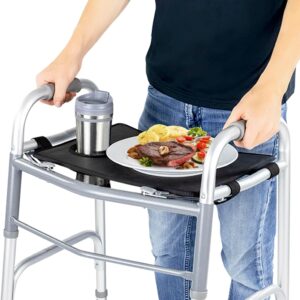
Vive Walker Tray for Folding Walker – (w/Cup Holder) – Adult Mobility Accessories – Fits Standard Walkers – Medical Table for Seniors Non Slip Mat for Food – Removable & Easy Assembly (Black)
$24.99 Buy Now -
Sale!

VIVOSUN 1-Pair 1/8 Inch Adjustable Grow Light Hanger, Heavy Duty Rope Hanger with Reinforced Metal Gears, 8Ft. Long and 150 lbs Weight Capacity Rope for Grow Light, Inline Fan, Filters
$7.99Original price was: $7.99.$7.49Current price is: $7.49. Buy Now -
Sale!

VIVOSUN Heavy Duty 2-in-1 Trimming Tray, Dry Sift Screen Set with 150 Micron Fine Mesh Screen and 2 Trimming Scissors, Blue
$64.99Original price was: $64.99.$54.99Current price is: $54.99. Buy Now -

Vlando 2 Tier Bracelet Holder 0rganizer with Tray – Leather Jewelry Stand Organizer for Women – Jewelry Holder Display for Necklace, Watches, Rings, Earrings, Bangle, Scrunchie – White
$17.99 Buy Now -
Sale!

Vusnud Rolling Tray Resin Mold, Large Silicone Epoxy Resin Mold Tray, Epoxy Molds for Resin Casting
$49.99Original price was: $49.99.$8.99Current price is: $8.99. Buy Now -
Sale!

Vxchkerm Skull and Crossbones Baseball Cap for Men Women, Funny Adjustable Washed Denim Cotton Embroidered Skeleton Hat
$19.99Original price was: $19.99.$17.99Current price is: $17.99. Buy Now -

Waking Up to Weed: How Cannabis Can Be Key to Feeling and Aging Better —A Guide to New Uses and Benefits of Marijuana for Your Body, Mind & Life
$17.95 Buy Now -
Sale!

Walnut Rolling Tray 11″x7″ Tray Rolling Tray Set with Funnel *4, Cleaning Brush and Scoop Card – Accessories for Rolling Papers, Grinders – Tray with Smooth Rounded Edges
$59.99Original price was: $59.99.$23.98Current price is: $23.98. Buy Now -

WARNING Behind This Door I may be GETTING HIGH – Enter At Yor Own Risk – Marijuana Cannabis Funny Metal Sign for garage, man cave ideas, yard stuff or wall. 420 blaze it friendly gift by Custom Kraze
$11.99 Buy Now -

Weed Abraham Lincoln Funny 4th Of July 420 Stoner Marijuana PopSockets Standard PopGrip
$14.99 Buy Now -

Weed Bear Herb Bear Don’t Care Funny Bear Marijuana Cannabis T-Shirt
$17.99 Buy Now -

Weed Cannabis 420 Baseball Cap THC Healthcare Dad Hats for Women Graphic Denim Baseball Cap Adjustable
$13.99 Buy Now -

Weed Cannabis 420 Bucket Hat Bucket Hat Packable Women Hat for Fishing Accessories for Travel Must Haves Wash Black
$16.99 Buy Now -

Weed Cannabis Healthcare Medical THC Marijuana Stoner Gift T-Shirt
$15.90 Buy Now -

Weed Emoji Phone Accessories for 420 Stoners and Potheads PopSockets Swappable PopGrip
$15.85 Buy Now -

Weed Fairy Marijuana Fantasy Leaf Stoner Pot Smoker Cannabis T-Shirt
$14.99 Buy Now -

Weed Funny Cannabis Marijuana Leaf Heartbeat Stoner Tie Dye T-Shirt
$13.38 Buy Now -

Weed Heartbeat Marijuana Cannabis Men’s Mesh Back Trucker Hat Baseball Cap
$27.99 Buy Now -

Weed Leaf Cannabis Boob T Shirt Cute Sexy
$14.99 Buy Now -

Weed Leaf Heartbeat Marijuana Leaf Cannabis Heartbeat 420 T-Shirt
$13.98 Buy Now -

Weed Marijuana Accessories for Cannabis Stoner Blue Tiger PopSockets Swappable PopGrip
$14.99 Buy Now -

Weed Octopus – Marihuana Kraken – Cannabis Accessories PopSockets Swappable PopGrip
$14.99 Buy Now -

Weed Pot Leaf Marijuana Cannabis Men’s Mesh Back Trucker Hat Baseball Cap
$27.99 Buy Now -

Weed Purple Stoner Marijuana Cannabis Pot Gift PopSockets PopGrip: Swappable Grip for Phones & Tablets
$14.95 Buy Now -

Weed smoking caterpillar and Alice In Wonderland PopSockets PopGrip: Swappable Grip for Phones & Tablets
$14.99 Buy Now -

Weed Smoking Turtle Turtley High THC CBD Marihuana Stoner PopSockets Swappable PopGrip
$14.99 Buy Now -

Weed Snapback Hat, Pot Leaf Hats, Marijuana Leaf Cap, Cannabis Flat Bill Baseball Caps, Weed Gifts for Stoners
$9.99 Buy Now -
Sale!
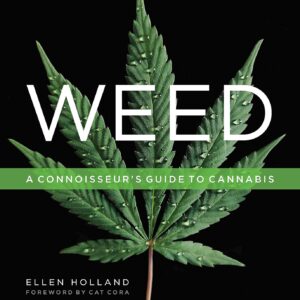
Weed: A Connoisseur’s Guide to Cannabis
$40.00Original price was: $40.00.$28.03Current price is: $28.03. Buy Now -
Sale!

Weed: Cannabis Culture in the Americas
$18.99Original price was: $18.99.$11.70Current price is: $11.70. Buy Now -
Sale!

Weewooday 2 Pcs Leaf Makeup Bags Funny Might Be Makeup Might Be Weed Bag Cosmetic Zipper Purse Weed Gifts for Women Vacation Travel
$6.99Original price was: $6.99.$5.99Current price is: $5.99. Buy Now -
Sale!

WEIGHTMAN Digital Scale Gram, 200g/0.01g Pocket Scale Gold Titanium Plating, LCD Backlit Display, Mini Jewelry Scale with 6 Units, Auto Off, Tare Function for Food, Coins, Battery Included
$19.99Original price was: $19.99.$9.99Current price is: $9.99. Buy Now -

What’s Wrong with My Marijuana Plant?: A Cannabis Grower’s Visual Guide to Easy Diagnosis and Organic Remedies
$19.99 Buy Now -

White Butcher Paper 36″ x 2160″ (180 feet) – Natural Butcher Paper Roll for Meat and Fish – Uncoated, Unwaxed & Food-Grade Material for Smoker, Grilling & BBQ by IDL Packaging
$39.95 Buy Now -

White Kraft Butcher Paper Roll – 18” x 150′ – Versatile & Durable – Ideal for Packaging, Grilling, Smoking Meat and BBQ – Unwaxed & Uncoated Butcher Paper for Sublimation – Made in USA
$14.97 Buy Now -

White Kraft Paper Roll 15″x 590″ Wrapping Packing Paper Roll
$6.99 Buy Now -

White Weed Marijuana Leaf Cannabis 420 Sweatshirt Hoodie Hoody
$27.95 Buy Now -
Sale!

White Wrapping Paper Craft Paper Kraft Paper Roll 15″ x 450″, Bulletin Board Paper, Arts & Crafts, Gift Wrapping Packing Painting Drawing Paint Easel Poster Chart Decorative Paper, Kids Art Supplies
$6.99Original price was: $6.99.$5.94Current price is: $5.94. Buy Now -
Sale!

Wolfteeth Mini 4.7 inch Smell Proof Holder, Vapor Carrying Case, Small Travel Case, Black (Empty)
$14.99Original price was: $14.99.$6.89Current price is: $6.89. Buy Now -

Women Plus Size Pride Shirts Gay Pride Mom Tshirt LGBT Equality tees Rainbow Flag Proud Ally Letter Print Tops(2-5X)
$19.99 Buy Now -

Womens Plant Mom Tshirt Funny 420 Marijauana High Cannabis Mothers Day Graphic Novelty Tee
$12.99 Buy Now -
Sale!

Wood Appliance Sliders with 360′ Wheels, Sliding Tray for Coffee Maker & Heavy Kitchen Appliances,Countertop Appliance slider for Kitchen Appliance, Premium Wood Rolling Tray,No Assemble (Wide-Large)
$45.99Original price was: $45.99.$39.99Current price is: $39.99. Buy Now -

Wood Rolling Tips for Cigarette or Pre Rolling Cones (Total-10pcs, 8mm)
$5.99 Buy Now -
Sale!

Wooden Rolling Tray – 3 in 1 Folding Design Set with Magnetic Lid – Big & Small Trays + Removable Metal Tray – Portable Accessory Kit for Car, Travel & Home – Premium Acacia Wood
$59.99Original price was: $59.99.$44.99Current price is: $44.99. Buy Now -
Sale!

Wooden Storage Box with Rolling Tray – Decorative Box Set – Wooden Container with Buckle – Storage Wood Box and Accessories – Box Kit with 2 Storage Jars
$49.94Original price was: $49.94.$17.99Current price is: $17.99. Buy Now -

WRAPAHOLIC Kraft Floral Wrapping Paper Roll – Mini Roll – 17 Inch x 9.8 Feet – Spring Summer Garden Flower Design Perfect for Wedding, Bridal Shower, Birthday
$6.99 Buy Now -
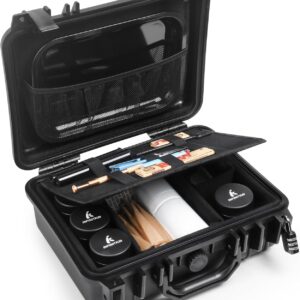
XL Smell Proof Box | Lockable Smell Proof Stash Box – Airtight, Waterproof & Crushproof for Home, Travel & Camping, Great Gift Choice
$68.99 Buy Now -

XXL Size Hemp Wraps 2 Count Per Sleeve Pack of 25 (Sour Apple)
$19.67 Buy Now -

XYIYI Cute Bucket Hat Beach Fisherman Hats for Women, Reversible Double-Side-Wear
$14.92 Buy Now -
Sale!

Yaheetech Rolling Salon Tray – Aluminum Trolley Cart Equipment on Wheels & Adjustable Height Mobile Beauty Salon Spa Stools Service Instrument Storage Tray w/Accessory Caddy – Black
$49.79Original price was: $49.79.$49.49Current price is: $49.49. Buy Now -
Sale!

YASONIC 3 Tier Rolling Cart – Metal Utility Cart with Wheels, Hanging Cups, Hooks, Heavy Duty Mesh Rolling Storage Cart Organizer, Craft Cart for Kitchen Office, Lightweight and Sturdy
$36.96Original price was: $36.96.$30.99Current price is: $30.99. Buy Now -

Yep I Talk To Chickens Shirt | Cute Chicken Buffs Tee Gift T-Shirt
$21.99 Buy Now -
Sale!

YouCopia RollOut Fridge Caddy BPA-Free Clear Rolling Refrigerator Organizer Bin with Adjustable Dividers and Handles, 9″ Wide
$29.99Original price was: $29.99.$19.99Current price is: $19.99. Buy Now -

YRYM HT White Kraft Butcher Paper Roll -18 inch x 2100 inch (176 ft) Food Grade White Wrapping Paper for Meats of All Varieties – Unbleached Unwaxed and Uncoated
$17.99 Buy Now -

zazzy Smell Proof Backpack with Lock Carbon Fiber Backpack with Combination Lock Odor Proof Bags Travel Backpack for Men & Women
$40.99 Buy Now -

Zen Cigarette Filter Tips Bundle – 5 Bags – 1000 Filter Tips – Regular
$9.26 Buy Now -
Sale!

Zen Roll Your Own Cigarette Paper Filter Rolling Tips (5)
$22.99Original price was: $22.99.$5.35Current price is: $5.35. Buy Now -

ZHOOGE Hairstylist Rolling Cart, Salon Trolley With Storage Platform and Hair Separator Stand, Coloring Tray With Dye Bowls and Tools, Black
$49.98 Buy Now -

Zig Zag Green Box of 100 Rolling Paper Books
$25.35 Buy Now -

Zig Zag Ultra Thin Cigarette Rolling Papers, 1 1/2 Sizes, 3pk
$14.47 Buy Now -

Zig Zag White Single Wide Rolling Papers (32 Leaves per Book) 24pk Display
$62.32 Buy Now -
Sale!

ZIG-ZAG 1 ¼-Inch Pre Rolled Cones – 100 Pack – Natural Unbleached Rolling Papers – Easy to Use & Convenient Bulk Pack- prerolled
$19.99Original price was: $19.99.$18.99Current price is: $18.99. Buy Now -

ZIG-ZAG 1 ¼-Inch Pre Rolled Cones – 50 Pack – Natural Unbleached Rolling Papers – Easy to Use & Convenient Bulk Pack- prerolled
$9.99 Buy Now -

Zig-Zag 70mm Ultra Thin Pre Rolled Cones – 24 Pack Box | Premium Quality | Slow Burn | Easy to Fill | Versatile Rolling Papers | 24 Rolling Papers
$6.92 Buy Now -

ZIG-ZAG Hemp Rolling Papers 1¼ – Limited Edition Vintage (24 Booklets) – 32 Sheets Each
$24.99 Buy Now -

ZIG-ZAG Hemp Rolling Papers 1¼ Size (6 Bookets) – 32 Sheets Each
$9.84 Buy Now -

ZIG-ZAG Hemp Rolling Papers King Size (24 Booklets) – 32 Sheets Each
$28.99 Buy Now -

ZIG-ZAG Hemp Rolling Papers King Size (6 Booklets) – 32 Sheets Each
$9.99 Buy Now -

ZIG-ZAG Hemp Wraps 25-Pack – Natural (2 Wraps Per Pack) 100% Natural, Slow-Burning Hemp Wraps
$16.99 Buy Now -

ZIG-ZAG Hemp Wraps 6-Pack – Island Vibes (2 Wraps Per Pack) 100% Natural, Slow-Burning Hemp Wraps
$6.99 Buy Now -

ZIG-ZAG King Size Pre Rolled Cones – 75 Pack – Natural Unbleached Rolling Papers – Easy to Use & Convenient Bulk Pack – Prerolled
$9.99 Buy Now -

Zig-Zag King Size Rolling Papers – Original Premium, Slow Even Burn, Consistent Seal – 6 Booklets (32 Sheets/Booklet)
$9.99 Buy Now -

ZIG-ZAG Large Metal Rolling Tray – Vintage White – Elegant Design, Sleek Finish, Smooth Rounded Corners
$12.94 Buy Now -

ZIG-ZAG Large Metal Rolling Tray – White, 13.4″ x 10.8″ – Durable and Stylish
$10.74 Buy Now -

Zig-Zag Mini Palm Rolls (5 Pack) – Blueberry Flavor – Natural Pre Wrap Palm Leafs Pre Rolled Cones – Palm Cones
$6.49 Buy Now -

ZIG-ZAG Pre Rolled Cones – King Size, Natural Unbleached – Bulk Pack of 100 – Easy & Convenient – Prerolled
$19.99 Buy Now -

ZIG-ZAG Pre Rolled Cones – King Size, Natural Unbleached – Bulk Pack of 50 – Easy & Convenient – Prerolled
$9.99 Buy Now -

ZIG-ZAG Pre Rolled Cones – Ultra Thin Cones 1 1/4 Size – 24 Cones
$6.94 Buy Now -
Sale!

ZIG-ZAG Pre Rolled Cones – Ultra Thin Cones 1 1/4 Size – 24 Pack (6 Cones Per Pack) 144 Cones
$28.99Original price was: $28.99.$24.20Current price is: $24.20. Buy Now -

ZIG-ZAG Rolling Paper Combo Unbleached – 1 1/4 Size – 24 Pack (50 Sheets & Tips) – Slow Burning Rolling Papers with Filter Tips
$25.99 Buy Now -

ZIG-ZAG Rolling Paper Combo Unbleached – 1 1/4 Size – 5 Pack (50 Sheets & Tips) – Slow Burning Rolling Papers with Filter Tips
$8.99 Buy Now -

ZIG-ZAG Rolling Paper Hemp Combo – 1 1/4 Size – 24 Pack (50 Sheets & Tips) – Slow Burning Hemp Rolling Papers with Filter Tips
$25.99 Buy Now -

ZIG-ZAG Rolling Paper Hemp Combo – 1 1/4 Size – 5 Pack (50 Sheets & Tips) – Slow Burning Hemp Rolling Papers with Filter Tips
$8.99 Buy Now -

ZIG-ZAG Rolling Papers – Original Kutcorner – 70mm – Easy to Use – Natural Gum Arabic – Slow Burning (6 Pack)
$9.99 Buy Now -
Sale!

ZIG-ZAG Rolling Papers – Original White 70 mm Paper – Natural Gum Arabic – Thin Glue Sealing Line – 6 Booklets with 32 Papers per Booklet,32 Count (Pack of 6)
$12.99Original price was: $12.99.$9.99Current price is: $9.99. Buy Now -

Zig-Zag Rolling Papers – Unbleached Filter Tips – Original Size – 5 Pack (50 Tips/Pack)
$3.99 Buy Now -

ZIG-ZAG Rolling Papers 1 ½ Ultra Thin Blue (24 Booklets) – 32 Sheets Each (Pre-Priced at $0.99 Each)
$24.99 Buy Now -

ZIG-ZAG Rolling Papers 1 ¼ Ultra-Thin (6 Booklets) – 32 Sheets Each – Slow Burning Rolling Papers
$9.99 Buy Now -

ZIG-ZAG Rolling Papers 1¼ French Orange – Limited Edition Vintage (5 Booklets) – 32 Papers Each
$9.99 Buy Now -

ZIG-ZAG Rolling Papers 1¼ Unbleached (24 Booklets) – 32 Sheets Each
$28.99 Buy Now -

ZIG-ZAG Rolling Papers 1¼ Unbleached (6 Booklets) – 50 Sheets Each
$8.99 Buy Now -

ZIG-ZAG Rolling Papers Combo – French Orange 1 1/4 (5 Booklets) – 32 Sheets Each & Tips
$8.99 Buy Now -
Sale!

ZIG-ZAG Rolling Papers French Orange 1 1/4 ( 6 Booklets)
$13.99Original price was: $13.99.$8.94Current price is: $8.94. Buy Now -
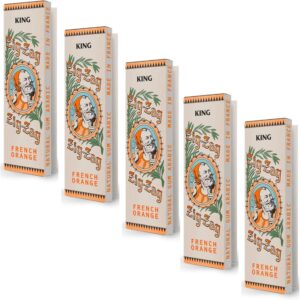
ZIG-ZAG Rolling Papers King Size French Orange – Limited Edition Vintage (5 Booklets) – 32 Papers Each
$9.99 Buy Now -

ZIG-ZAG Rolling Papers King Size Unbleached (24 Booklets) – 32 Sheets Each
$27.55 Buy Now -

ZIG-ZAG Rolling Papers Kutcorners – Limited Edition Vintage (5 Booklets) 70MM – Premium Rolling Papers
$9.99 Buy Now -

ZIG-ZAG Rolling Papers Original White – Limited Edition Vintage (5 Booklets) 70MM – Premium Rolling Papers
$9.99 Buy Now -
Sale!

Zig-Zag Small Metal Rolling Tray – Classic Design, 10.75″ x 6.5″ – Perfect for Enthusiasts
$9.47Original price was: $9.47.$6.99Current price is: $6.99. Buy Now -

Zig-Zag Ultra Thin Pre Rolled Cones, King Size, Bulk Pack of 800, Easy to Fill, Prerolled
$73.79 Buy Now -

Zig-Zag Ultra Thin Pre Rolled Paper Cones, 1 1/4 Size, 36 Packs (6 Cones Each), Prerolled
$41.99 Buy Now -

Zig-Zag Unbleached Pre Rolled Cones – 70mm, 24 Pack Box & Bulk Carton (288 Cones) | Premium Quality, Slow Burn, Easy Fill | prerolled
$6.94 Buy Now -

Zig-Zag Unbleached Pre Rolled Paper Cones – 1 1/4 Size (84mm) – 24 Packs of 6 (144 Total Cones) – Prerolled
$27.79 Buy Now -

Zig-Zag Unbleached Rolling Paper Tips – Wide Size, Natural Fiber, 5 Pack (50 Tips Each)
$3.99 Buy Now -

ZIG-ZAG, 8 booklets x Green Cut Corners Regular Size 70mm Multipack of Papers
$9.93 Buy Now -

ZJXHPO Funny Marijuana Weed Leaf Makeup Cosmetic Bag Let’s Get High Makeup Bag Weed Gift 420 Gift (BL Let’s get high)
$12.99 Buy Now -

Zmart Funny Gifts Plant Succulent Sunflower Pot Leaf Yoga Lovers, Novelty Plant Succulent Sunflower Pot Leaf Yoga Socks
$9.99 Buy Now -
Sale!

Zmart Funny Weed Gift For Men Women, Marijuana Gift Cannabis Gifts 420 Gifts For Stoners Pot Leaf Gift, Weed Socks Marijuana Socks Pot Leaf Socks
$11.99Original price was: $11.99.$9.99Current price is: $9.99. Buy Now -

Zuoyouzi Men’s Short Sleeve Casual Slim Fit Polo Shirts Basic Designed Classic Cut Cotton Shirts
$17.99 Buy Now -
Sale!

ZVOHOW Classic Pre rolled Cones 50 PACKS – King Size (108mm) Pre Rolling Papers With Tips and Kraft Paper Stick – Classic Rolled Cones Rolling Papers (Brwon 50Pack)
$6.59Original price was: $6.59.$5.99Current price is: $5.99. Buy Now
Under SB 5, which a Senate committee unanimously advanced last week and is set to be taken up by the full chamber in coming days, consumable hemp products with any amount of THC would be illegal. Even mere possession would be punishable as a Class B misdemeanor, carrying up to 180 days in jail and a $2,000 fine.
Only products with two specific cannabinoids—CBD and CBG—would be allowed under the Senate proposal.
Reform advocates have hoped that, as happened during the regular session this year, House lawmakers might revise SB 5 to regulate, rather than ban, hemp products containing THC.
While that could still happen, Rep. Gary VanDeaver (R) on Monday introduced HB 5, which is effectively identical to SB 5. It had not yet been scheduled for a hearing as of Monday afternoon. VanDeaver chairs the House Committee on Public Health.
Heather Fazio, director of the Texas Cannabis Policy Center, told Marijuana Moment that the group was “surprised to see Chairman VanDeaver introduce HB 5, which appears to be a carbon copy of SB 5,” emphasizing that the proposals don’t align with Abbott’s stated goals for hemp regulation.
“Both of these bills strictly ban and criminalize any amount of THC and nearly all non-impairing cannabinoids. This means even full spectrum CBD oil would be off the market,” Fazio said. “These bills are unreasonable and do not reflect the governor’s position. Governor Abbott has called on lawmakers to regulate THC. He recently reiterated this position and called for low THC limits, but he confirmed that he does not support an outright ban.”
(Disclosure: Fazio supports Marijuana Moment’s work via a monthly Patreon pledge.)
SB 5, meanwhile, was on the Senate calendar for Monday but the body convened and quickly adjourned without taking action on any bills. Senators are next scheduled to meet on Wednesday.
Ahead of the special legislative session, Abbott specifically asked lawmakers to prioritize hemp regulatory issues. He reiterated his opposition to enacting a blanket prohibition on hemp products, which he called “a lawful agricultural commodity,” and called on the legislature to make two chief reforms.
One of Abbott’s requests was that lawmakers pass legislation “making it a crime to provide hemp-derived products to children under 21 years of age.”
Another sought a measure “to comprehensively regulate hemp-derived products, including limiting potency, restricting synthetically modified compounds, and establishing enforcement mechanisms, all without banning a lawful agricultural commodity.”
In his interview with The Texan last week, Abbott reiterated his opposition to an outright ban on consumable hemp products.
“I’m not in favor of a total ban,” he said, adding that he does support restrictions on synthetic cannabinoids and youth access to hemp products.
“I am, to be clear, in favor of a ban for those under the age of 21,” the governor explained. “I am in favor of a ban of any type of synthetic that can be added to these products that would make the product more dangerous. I am in favor of a ban of any hemp-based product that reaches an intoxication level, and that is more than three milligrams of THC.”
As Abbott has done in other interviews around the hemp bill, he again gave a somewhat confusing explanation of what he views as allowable THC limits in hemp, variously saying there should be a “three percent” or “three milligram” cap, which is a meaningful difference.
—
Marijuana Moment is tracking hundreds of cannabis, psychedelics and drug policy bills in state legislatures and Congress this year. Patreon supporters pledging at least $25/month get access to our interactive maps, charts and hearing calendar so they don’t miss any developments.![]()
Learn more about our marijuana bill tracker and become a supporter on Patreon to get access.
—
He said in a separate recent interview with FOX 4 that “every law enforcement official I’ve talked to has said the same thing, and that is, they don’t have the resources to regulate it,” but added that “If they’re measuring the hemp product not based upon the current methodology, 0.3 percent THC, but on the milligram basis, it’s a whole lot easier to be able to measure it.”
At last week’s Senate committee hearing on SB 5, most law enforcement speakers said they supported an all-out ban on hemp products containing any THC rather than attempts at regulation. Some later added, however, that they felt the state’s limited medical marijuana program, known as the Texas Compassionate Use Program (TCUP), should be expanded to ease access by patients—especially military veterans—who could benefit from therapeutic cannabis.
Notably, Abbott in June signed a bill into law that expanded the state’s list of medical cannabis qualifying conditions, adding chronic pain, traumatic brain injury (TBI), Crohn’s disease and other inflammatory bowel diseases, while also allowing end-of-life patients in palliative or hospice care to use marijuana.
SB 5 and companion HB 5 are among a small handful of bills introduced for the new special session to address consumable hemp products.
Among other proposals are measures to require extensive product warning labels and limit how hemp products are packaged.
Two other newly introduced bills are HB 160 from Rep. Charlene Ward Johnson (D) and SB 39 from Sen. Judith Zaffirini (D).
The former would require a number of warning labels to be carried on hemp products with any more than trace amounts of THC, cautioning that the products can cause “cannabis poisoning that can be life-threatening to children,” harm brain development in youth, increase “risk of mental disorders like psychosis and schizophrenia” and lead to anxiety, depression and substance abuse disorders.
SB 39, meanwhile, would prohibit hemp products from being packaged or marketed “in a manner attractive to children,” limiting packaging shaped like humans, animals, fruit, cartoons or “another shape that is attractive to minors” as well as packaging that looks similar to legal products already marketed to children, for example candy or juice. It would also outlaw misleading product packaging. Violations would be a Class A misdemeanor, carrying up to a year in jail and a $4,000 fine.
Separately, last week Rep. Nicole Collier (D) introduced a one-page bill, HB 42, designed to protect consumers in the state from criminal charges if what they believed was a legal hemp product turned out to contain excessive amounts of THC, making it illegal marijuana. It would prevent the criminalization of someone found in possession of a product that’s labeled as hemp but is determined to contain “a controlled substance or marihuana.”
In order for the person to obtain the legal protection, the product would need to have been purchased “from a retailer the person reasonably believed was authorized to sell a consumable hemp product.”
Another bill—HB 195, introduced on Thursday by Rep. Jessica González (D)—would legalize marijuana for people 21 and older, allowing possession of up to 2.5 ounces of cannabis, with no more than 15 grams of that amount being in concentrated form.
Yet another proposal would order state officials to conduct a study on testing for THC intoxication.
As for what Texans themselves want to see from their representatives, proponents of reining in the largely unregulated intoxicating hemp industry in Texas shared new polling data on Wednesday indicating that majorities of respondents from both major political parties support outlawing synthetic cannabinoids, such as delta-8 THC.
The survey also found that respondents would rather obtain therapeutic cannabis products through a state-licensed medical marijuana program than from a “smoke shop selling unregulated and untested hemp.”
Ahead of the governor’s veto last month of SB 3—the earlier hemp product ban—advocates and stakeholders had delivered more than 100,000 petition signatures asking Abbott to reject the measure. Critics argued that the industry—which employs an estimated 53,000 people—would be decimated if the measure became law.
Image element courtesy of AnonMoos.

Author: mscannabiz.com
MScannaBIZ for all you Mississippi Cannabis News and Information.
You may like
-


Ky. Governor urges President Trump to oppose blocking cannabis rescheduling
-


Gap in cannabis education leaves medical providers in the dark
-


FDA Commissioner Links Use Of Cannabis Products To Heart Problems And Psychosis
-


New York Cannabis Regulators Messed Up Dispensary Location Guidance; 152 Stores Impacted
-


Richard Lee, Who Made Cannabis Legalization Inevitable, Has Died. His Mission Lives On
-


GOP Senator Successfully Blocks Federal Hemp THC Ban In Key Spending Bill
featured
FDA Commissioner Links Use Of Cannabis Products To Heart Problems And Psychosis
Published
23 minutes agoon
July 29, 2025
Asked about the widespread availability of intoxicating cannabinoid products, such as delta-8 THC, the head of the U.S. Food and Drug Administration (FDA) warned on Tuesday that the use of cannabinoids can lead to cardiac problems and psychosis.
“I personally, in my writings, in my statements—and also the Department of Health and Human Services—have expressed serious concerns about people using these cannabis products,” FDA Commissioner Marty Makary said in response to a question from a Wall Street Journal reporter.
“We don’t want kids to use them,” Makary replied. “Cannabis use disorder is a real thing, and as you appropriately mentioned, there are now studies linking it to psychosis and even cardiovascular problems.”
The FDA chief’s comments came at a press event at which he and other federal health officials announced plans to take action to restrict a separate substance: 7-hydroxymitragynine (known as 7-OH-MIT or simply 7-OH), an opioid-like compound that is produced in small amounts by the kratom plant.
Makary said the matter of reining in cannabis products is “an important issue” but described it “an entirely separate public health campaign” from plans to restrict 7-OH.
As for that substance, FDA is recommending that the Drug Enforcement Administration (DEA) schedule the compound under the federal Controlled Substances Act.
“There are no FDA-approved 7-OH drugs, 7-OH is not lawful in dietary supplements and 7-OH cannot be lawfully added to conventional foods,” FDA said in a press release about the planned move.
FDA says the proposed scheduling action would specifically target 7-OH, which it described as “a concentrated byproduct of the kratom plant.”
The agency says the action “is not focused on natural kratom leaf products,” which contain relatively little 7-OH. In botanical kratom, the primary active ingredient in is another chemical, mitragynine.
“Today, we’re taking action on 7-OH as a critical step in the fight against opioid addiction,” Health and Human Services (HHS) Secretary Robert F. Kennedy Jr. said in a statement. “We will protect the health of our nation’s youth as we advance our mission to Make America Healthy Again.”
FDA noted that last month, it issued warning letters to seven companies that the agency claims was illegally distributing 7-OH products, “including tablets, gummies, drink mixes and shots.” The agency
Officials also unveiled new guidance for healthcare professionals on Tuesday as well as a warning to consumers about 7-OH products “hiding in plain sight.”
“The time to act is now,” the consumer warning says. “We can and must prevent the next wave of the opioid crisis.”
At least some in the kratom industry are applauding the newly announced scheduling action.
The American Kratom Association, for one, said in an email to supporters, that it “applauds this bold, science-driven action as a critical milestone in protecting public health and consumer safety.”
“These 7-OH products are not kratom,” said Mac Haddow, a senior fellow on public policy at the trade group. “They are chemically altered substances that carry potent opioid-like effects and pose an imminent threat to consumers. This move sends a clear and long-overdue message: the safety of the American public comes first.”
Secretary Robert F. Kennedy and FDA Commissioner Dr. Marty Makary took the bold and needed step today to protect consumers from chemically manipulated 7-OH products that pose an eminent threat to consumers.
Specifically, HHS and FDA will schedule 7-OH as an “illicit substance.”…
— Mac Haddow (@HaddowMac) July 29, 2025
As for hemp-derived products, meanwhile, a Republican U.S. senator this week successfully blocked a proposed ban on hemp THC products that was included in a key spending bill, giving the industry a win amid contentious discussions around intoxicating cannabinoids.
Following intensive debates around the language—which would have prohibited hemp products with any quantifiable amount of THC—Sen. Rand Paul (R-KY) stood his ground with a threat to procedurally hold up the appropriations bill covering Agriculture, Rural Development, Food and Drug Administration (Ag/FDA). And to that end, he prevailed in getting the section removed.
Sen. Mitch McConnell (R-KY), who championed the federal legalization of hemp and its derivatives under the 2018 Farm Bill, wanted to see the hemp ban proceed through the process. But on Tuesday, Sen. John Hoeven (R-ND), chair of the appropriations subcommittee of jurisdiction, told reporters it was ultimately stripped from the legislation.
Under the legislation that advanced through the Senate Appropriations Committee earlier this month, consumable hemp products with any “quantifiable” amount of THC would be banned.
Paul told Marijuana Moment late last month that the proposal—which largely mirrors provisions of a House version of the spending bill, championed by Rep. Andy Harris (R-MD)—would “completely destroy” the industry.
On the House side, while Harris amended report language attached to the chamber’s bill clarifying that it’s not the intent to stop people from accessing “industrial or non-intoxicating hemp-derived cannabinoid products with trace or insignificant amounts of THC,” the bill itself still says that products containing any “quantifiable” amounts of THC couldn’t be marketed. And it’s rare to find CBD items without any natural traces of THC.
Paul recently filed a bill that would go in the opposite direction of Harris’s ban, proposing to triple the concentration of THC that the crop could legally contain, while addressing multiple other concerns the industry has expressed about federal regulations.
The senator introduced the legislation, titled the Hemp Economic Mobilization Plan (HEMP) Act, in June. It mirrors versions he’s sponsored over the last several sessions.
Harris, for his part, told Marijuana Moment that he’s not concerned about any potential opposition in the Senate—and he also disputed reports about the scope of what his legislation would do to the industry.
The Congressional Research Service (CRS) released a report last month stating that the legislation would “effectively” prohibit hemp-derived cannabinoid products. Initially it said that such a ban would prevent the sale of CBD as well, but the CRS report was updated to exclude that language for reasons that are unclear.
The hemp language is largely consistent with appropriations and agriculture legislation that was introduced, but not ultimately enacted, under the last Congress.
Hemp industry stakeholders rallied against that proposal, an earlier version of which was also included in the base bill from the subcommittee last year. It’s virtually identical to a provision of the 2024 Farm Bill that was attached by a separate committee last May via an amendment from Rep. Mary Miller (R-IL), which was also not enacted into law.
A leading alcohol industry association, meanwhile, has called on Congress to dial back language in the House spending bill that would ban most consumable hemp products, instead proposing to maintain the legalization of naturally derived cannabinoids from the crop and only prohibit synthetic items.
Wine & Spirits Wholesalers of America (WSWA) President and CEO Francis Creighton said in a press release that “proponents and opponents alike have agreed that this language amounts to a ban.”
Separately, key GOP congressional lawmakers—including one member who supports marijuana legalization—don’t seem especially concerned about provisions in the bill despite concern from stakeholders that it would put much of the hemp industry in jeopardy by banning most consumable products derived from the plant.
Miller, of the U.S. Hemp Roundtable, told congressional lawmakers in April that the market is “begging” for federal regulations around cannabis products.
At the hearing, Rep. James Comer (R-KY) also inquired about FDA inaction around regulations, sarcastically asking if it’d require “a gazillion bureaucrats that work from home” to regulate cannabinoids such as CBD.
A report from Bloomberg Intelligence (BI) last year called cannabis a “significant threat” to the alcohol industry, citing survey data that suggests more people are using cannabis as a substitute for alcoholic beverages such a beer and wine.
Last November, meanwhile, a beer industry trade group put out a statement of guiding principles to address what it called “the proliferation of largely unregulated intoxicating hemp and cannabis products,” warning of risks to consumers and communities resulting from THC consumption.
Regarding THC use and psychosis, meanwhile, some federal officials in the Trump administration have been playing up the apparent link—though experts say it’s unclear whether there’s any causal connection between the two.
DEA in May claimed marijuana could be more likely to cause psychosis than is methamphetamine, promoting a recent article where a psychiatrist indicated that the jury is out on the question.
While DEA has long been known to promote sensational claims about the risks of cannabis use, it appears there’s been a stepped-up push to reinforce that message, particularly for youth.
For example, DEA recently teamed up with an anti-marijuana organization to mark “National Prevention Week,” promoting a campaign that encourages people to share memes with dubious claims about the effects of cannabis—including the theory that it is a “gateway drug” to using other substances.
Notably, a 2023 study published by the American Medical Association found that despite increases in cannabis consumption by adults in recent years, states where marijuana was legal experienced “no statistically significant increase” in psychosis-related diagnoses.
Separately, a cannabis researcher at Johns Hopkins University said on a federal Substances and Mental Health Services Administration (SAMHSA) earlier this month that the causal link between cannabis and developing psychosis is “questionable.”
There is “undoubtedly a strong correlation between heavy cannabis use and earlier onset of psychosis, and psychosis severity” said Ryan Vandry, an experimental psychologist and professor, but “the causality on someone who would not otherwise develop psychosis is still questionable.”
In a 2023 op-ed for Marijuana Moment, the deputy director for the advocacy group NORML noted that claims that marijuana could cause “incurable insanity” stretch back nearly a century in the U.S. and helped support Congress’s blanket ban on cannabis in 1937.
“In reality, acute cannabis-induced psychosis is rare, and those who experience it are typically either predisposed to psychosis or have a pre-existing psychiatric disorder,” wrote Paul Armentano, pointing to studies out of Europe and Canada.
Armentano argued at the time that “the establishment of a regulated market designed to keep cannabis products away from young people, and that provides clear warnings to those specific populations who may be more vulnerable to its effects—coupled with a policy of consumer education—is the best way to protect public health and mitigate consumers’ risks.”

Author: mscannabiz.com
MScannaBIZ for all you Mississippi Cannabis News and Information.
featured
New York Cannabis Regulators Messed Up Dispensary Location Guidance; 152 Stores Impacted
Published
1 hour agoon
July 29, 2025
The New York Office of Cannabis Management (OCM) issued a proximity correction on July 28 that impacts 105 licensed dispensaries and at least 47 pending applicants related to their distances from schools.
The OCM determined that its staff erred in approving locations for these 152 retailers/aspiring retailers through guidance that the office established in 2022, which includes measuring the state’s entrance-to-entrance distance between a dispensary and school. Under state law, cannabis dispensaries must be at least 500 feet from schools.
However, OCM officials said this week that their 2022 entrance-to-entrance guidance is not consistent with the Marijuana Regulation and Taxation Act (MRTA) that former Gov. Andrew Cuomo signed into law in March 2021. Instead, they said, the distance must be measured from a dispensary’s main entrance to the “nearest property line boundary of a school’s ground.” This is a straight-line measurement.

“Reading these sections of law together, a cannabis retail dispensary cannot be within 500 feet of a school’s property line,” according to the OCM’s July 28 overview of the correction. “The office has contacted impacted licensees and applicants by phone and by letter/email with detailed information about the practice correction and timeline.”
The impacted businesses/applicants are primarily located in New York City, including 88 of 105 licensees and 39 of the 47 pending applications, according to the OCM.
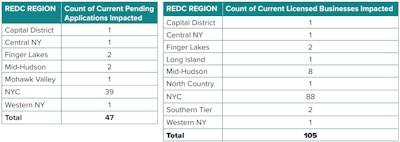 New York Office of Cannabis Management
New York Office of Cannabis Management
As of July 25, there were 436 licensed adult-use dispensaries in the state, including 177 in the smallest geographic region: New York City.
OCM Acting Executive Director Felicia Reid notified state regulators that the affected businesses include 60 dispensaries that are already open, with the other 45 impacted licensees actively working toward opening their doors, The New York Times reported. The Times received a copy of Reid’s communications with her staff and the impacted businesses.
“To give you this news, and for the weight of it, I am incredibly sorry,” Reid wrote to those impacted.
While the Times initially reported that the OCM is “forcing” 152 cannabis retailers to find new locations after the administrative review of its 2022 guidance, the OCM disputed that word choice.
“Facts matter. This is not accurate,” OCM officials wrote on X. “The office is not forcing 152 cannabis retailers to find new locations.”
The OCM and Gov. Kathy Hochul’s office will be proposing and “aggressively pursuing” a legislative fix for licensed dispensaries whose locations conflict with state law, according to the OCM’s correction overview.
“This legislation would permit licensees to remain at their present licensed location,” according to the overview. “Importantly, passage of proposed legislation is the prerogative of the New York State Legislature and is not a guarantee.”
In the absence of that legislative fix, the OCM cannot renew permits for the 105 already licensed retailers. In the meantime, dispensaries can remain open until their licenses are up for renewal, according to the OCM.
In other words, the OCM is attempting to grandfather in dispensaries that are already open, but only state lawmakers can make that call.
Meanwhile, the OCM is requiring the 47 pending applicants who are impacted by the office’s miscue to find new locations before moving forward in the application process.
To “lessen the burden” of the OCM’s correction, the office is working with Hochul’s office and the Empire State Development to create a $15 million relief program, from which the applicants can seek up to $250,000 each in coverage to help find new locations or to make capital improvements to their original locations.
“Applicants will still be able to pursue licensure, even if they participate in the [relief] program, but they must find a new location before moving ahead in the application process,” according to the OCM.
The office will also work with these applicants through provisional licenses and extensions on current provisional licenses, according to the OCM.
Damian Fagon, the OCM’s former chief equity officer, who resigned in November following an investigation of unsubstantiated allegations against him, took issue with the $15 million relief program for license applicants, the Times reported.
“A politically motivated rule reversal is now diverting another $15 million from the very communities the law was written to help repair,” he said.
OCM officials said that as their analysis continues, they could identify additional applicants or retail licensees who will be impacted by their correction. If so, the office will contact them directly.

Author: mscannabiz.com
MScannaBIZ for all you Mississippi Cannabis News and Information.
featured
Richard Lee, Who Made Cannabis Legalization Inevitable, Has Died. His Mission Lives On
Published
2 hours agoon
July 29, 2025
By Dale Sky Jones, Angela Bacca & Etienne Fontan
With profound sorrow, Oaksterdam University announced the sudden and unexpected passing of its founder, Richard Lee, considered the leader who sparked the wave of global cannabis legalization in the 2010s. He passed away in Houston, Texas, on Sunday, July 27. He was 62 years old. A pioneer, visionary, and fearless advocate for justice, Richard reshaped cannabis policy, coined the term “cannabis industry,” and formalized the first quality training in the world.
Born in Houston, Texas, on October 7, 1962, Richard developed an early interest in music and worked at concert venues in his 20s. While working on lighting as a roadie for Aerosmith in 1990, he suffered a workplace injury that left him paraplegic. He discovered cannabis as a treatment for the resulting chronic nerve pain and quickly became a passionate advocate.
In 1992, he co-founded Legal Marijuana—The Hemp Store in Houston, one of the first hemp retail stores in the U.S. He also converted his conservative Christian parents to cannabis advocacy, beginning a lifelong mission of shifting hearts and minds.
In 1997, Richard moved to Oakland, California, for safe legal access to cannabis and began providing cannabis to the Oakland Cannabis Buyers’ Cooperative (OCBC). He co-founded the Hemp Research Company, conducting early research on sustainable cannabis horticulture. Working closely with OCBC founder Jeff Jones, they helped establish “Oaksterdam” as a safe cannabis district in downtown Oakland.

In 1999, Lee opened the Bulldog Coffeeshop. In 2003, he founded the Oakland Civil Liberties Alliance, which passed Oakland’s Measure Z, deprioritizing cannabis enforcement and laying the groundwork for city taxation and regulation. From 2005 to 2007, Lee published the Oaksterdam News, which had a circulation of over 100,000, further cementing the city’s position as the hub of the cannabis reform movement.
In 2007, Richard founded Oaksterdam University, the first cannabis college in the U.S. His revolutionary vision was to formalize cannabis education and destigmatize the plant. He believed in advertising and real estate – filling empty storefronts with cannabis-related businesses to revitalize his community. Lee opened his doors to media, regulators, and policymakers, making cannabis education accessible, professional, and transparent.

In 2010, Richard became the face and co-proponent of Proposition 19, the first statewide initiative to legalize adult-use cannabis in California. He invested over $1.3 million of his own funds and used his businesses to support the campaign. Though it failed narrowly, it paved the way for future victories around the country and internationally.
On April 2, 2012, four federal agencies raided Oaksterdam University, Richard’s home, and other businesses. Though no charges were filed, the raid was believed to be politically motivated. He stepped back from leadership, passing the torch to Dale Sky Jones. Despite the setback, the university endured and evolved under her stewardship. It now offers online professional and workforce development training, with over 100,000 graduates from 116 countries, many of whom are today’s business and community leaders.
“Richard’s courage to fight when it wasn’t easy, when it wasn’t safe, and when few others dared, led to a domino effect of global change that we are still witnessing today,” says Dale Sky Jones. “He didn’t wait for the system to catch up; he worked relentlessly to make it right.”
Jeff Jones, Richard’s longtime collaborator and co-founder of OCBC, added, “Richard Lee assumed monumental risks for over a decade, publicly taking charge of the Oaksterdam mission and taking it to new heights, pushing political boundaries beyond what most could imagine possible.”
Beyond his public legacy, Richard was a mentor, a fighter, a godfather, and a true friend. He was generous, selfless, and driven by belief in the potential of others. He demanded the best because he saw the best in us. Donald Lee, Richard’s youngest brother, shared, “Richard was an inspiration to so many. No less so for his family. That inspiration will never fade.”

Richard relocated to Houston to care for his mother, Ann Lee, co-founder of Republicans Against Marijuana Prohibition. He remained active in advocacy and stayed close to family. Richard is survived by his mother, Ann; brothers Don, Michael, and Bobby; and several nieces and nephews. He was preceded in death by his father, Bob Lee, and his eldest brother, Jim Lee.
Known as Rev, he always said, “Keep the Faith.” We certainly will, Richard. His memory will live on through every Oaksterdam graduate, every policy change he inspired, and every community freed from injustice because of his work. His legacy is one of freedom, justice, and hope. Donations may be made to the Richard Lee Memorial Fund to help with costs and continue to honor his legacy.
Photos courtesy of Oaksterdam University
This article is from an external, unpaid contributor. It does not represent High Times’ reporting and has not been edited for content or accuracy.

Author: mscannabiz.com
MScannaBIZ for all you Mississippi Cannabis News and Information.

Ky. Governor urges President Trump to oppose blocking cannabis rescheduling

Gap in cannabis education leaves medical providers in the dark

FDA Commissioner Links Use Of Cannabis Products To Heart Problems And Psychosis

New York Cannabis Regulators Messed Up Dispensary Location Guidance; 152 Stores Impacted

Richard Lee, Who Made Cannabis Legalization Inevitable, Has Died. His Mission Lives On

GOP Senator Successfully Blocks Federal Hemp THC Ban In Key Spending Bill

RollPros Launches Blackbird XXL: The First-Ever Automated Blunt Rolling Machine

Ozzy Osbourne, Parkinson’s and the Promise of Magic Mushrooms: Could They Have Helped?

Pennsylvania: Reading City Council Adopts Municipal Decriminalization Ordinance

VIDEO: Guest Smokes Weed on Mario Kart After Attraction Breaks Down At Universal Studios Hollywood

Federal Report Shows Youth Marijuana Use ‘Remained Stable’ Even As More States Legalized In Recent Years

Cannabis ballot initiative brings lawsuit to Menominee

Proposed DOJ Rule Says Marijuana Users Likely Wouldn’t Be Eligible To Have Gun Rights Restored

Kentucky medical marijuana cultivator brings in half-grown plants to speed harvest

Federal Researchers Claim First-Ever Detection Of Cannabinoids In Human Breath After Use Of Marijuana Edibles

BREEDING FOR BIG BUDS (1986)

New DEA Admin Sidelines Cannabis Rescheduling Despite Earlier Promises

New Rules in New Zealand Place Strict Guidelines on Medical Cannabis ‘Advertising’

South Beloit blood donors get marijuana products for their contribution

Oklahoma Campaign to Legalize Adult-Use Cannabis Will Begin Collecting Signatures Next Month

Bellbrook leaders pass ordinance banning marijuana sales

PackworldUSA Highlights Versatile, Precision-Driven 3400 Series Heat Sealer for Cannabis Applications

Federal Court Sides With Safe Drug Consumption Site, Saying Religious Protections Apply

Trump’s New DEA Administrator Omits Cannabis Rescheduling From Top Priorities

Alert: Department of Cannabis Control updates data dashboards with full data for 2023

Connecticut Appoints The US’s First Cannabis Ombudsperson – Yes there is a pun in there and I’m Sure Erin Kirk Is Going To Hear It More Than Once!

5 best CBD creams of 2024 by Leafly

EU initiative begins bid to open access to psychedelic therapies

Free delta-9 gummies from Bay Smokes
New Study Analyzes the Effects of THCV, CBD on Weight Loss

5 best autoflower seed banks of 2024 by Leafly

May 2024 Leafly HighLight: Pink Runtz strain

Curaleaf Start Process Of Getting Their Claws Into The UK’s National Health System – With Former MP (Resigned Today 30/5/24) As The Front Man

Mississippi city official pleads guilty to selling fake CBD products

Discover New York’s dankest cannabis brands [September 2024]

Horn Lake denies cannabis dispensary request to allow sale of drug paraphernalia and Sunday sales | News

Press Release: CANNRA Calls for Farm Bill to Clarify Existing State Authority to Regulate Hemp Products

Local medical cannabis dispensary reacts to MSDH pulling Rapid Analytics License – WLBT

Nevada CCB to Accept Applications for Cannabis Establishments in White Pine County – “Only one cultivation and one production license will be awarded in White Pine County”

5 best THC drinks of 2024 by Leafly

The Daily Hit: October 2, 2024

6 best CBD gummies of 2024 by Leafly

5 best delta-9 THC gummies of 2024 by Leafly

Weekly Update: Monday, May 13, 2024 including, New Guide for Renewals & May Board meeting application deadline

People In This State Googled ‘Medical Marijuana’ The Most, Study Shows

PRESS RELEASE : Justice Department Submits Proposed Regulation to Reschedule Marijuana

Thailand: Pro-cannabis advocates rally ahead of the government’s plan to recriminalize the plant

Press Release: May 9, STIIIZY and Healing Urban Barrios hosted an Expungement Clinic & Second Chance Resource Fair
Trending
-

 California Cannabis Updates1 year ago
California Cannabis Updates1 year agoAlert: Department of Cannabis Control updates data dashboards with full data for 2023
-

 Breaking News1 year ago
Breaking News1 year agoConnecticut Appoints The US’s First Cannabis Ombudsperson – Yes there is a pun in there and I’m Sure Erin Kirk Is Going To Hear It More Than Once!
-

 best list12 months ago
best list12 months ago5 best CBD creams of 2024 by Leafly
-

 Business10 months ago
Business10 months agoEU initiative begins bid to open access to psychedelic therapies
-

 Bay Smokes1 year ago
Bay Smokes1 year agoFree delta-9 gummies from Bay Smokes
-

 cbd1 year ago
cbd1 year agoNew Study Analyzes the Effects of THCV, CBD on Weight Loss
-

 autoflower seeds10 months ago
autoflower seeds10 months ago5 best autoflower seed banks of 2024 by Leafly
-

 California1 year ago
California1 year agoMay 2024 Leafly HighLight: Pink Runtz strain




